DAWN
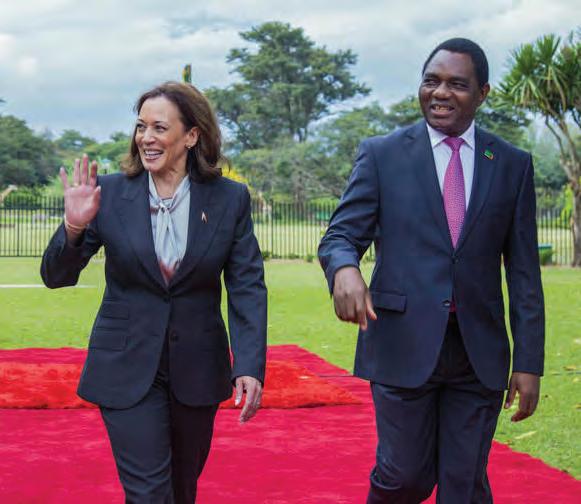
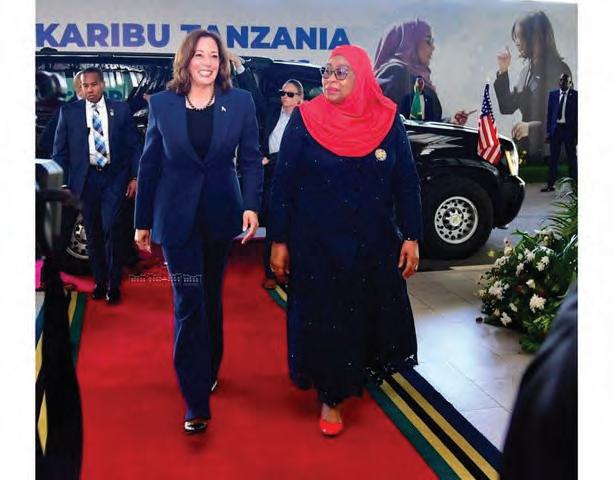
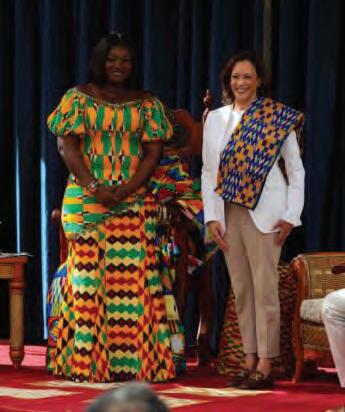






 Vice President Kamala Harris Visits Africa, March 2023
Vice President Kamala Harris Visits Africa, March 2023
Page 53, 68 - March-April 2023
8 Publisher's Message
6 Thinking About the 55th Anniversary of the Assassination of Dr. Martin Luther King, Jr. Business

12 From Street Hawking to Founding one of Africa’s Top Homegrown Luxury Watch Brands, Meet Ghana’s Anthony Dzamefe
14 Telfar’s Radical New Pricing System is the Ultimate Anti-luxury Move
18 The Black Unicorn: Changing the Game for Inclusivity in Retail
22 The Importance of Forging Connections at Work
24 Turn Employees into A-Players with the 10x Practice Rule
26 Kigali to Host Africa Soft Power Summit 2.0
28 A Year of African Opportunities: Africa House at 2023 World Bank IMF Spring Meeting
30 M-PESA Eyes Global Remittances Market’s Multi-trillion Dollar Surge

32 Microsoft Calls for 'Coalition' to Improve Congo's Informal Cobalt Mines
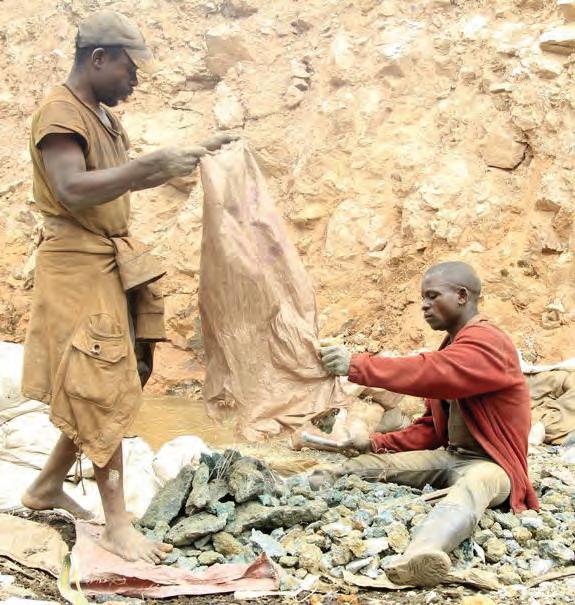
34 Mobile Shopping Apps are the Key to Winning Brand Loyalty
36 Ami Colé Founder has Only Just Begun to Take the Beauty Industry by Storm Development
41 REPORT: Led by Africans, Immigrants Now Make up 1 of Every 10 Blacks in America

42 JEMS by PENSOLE, One of the First BlackOwned U.S. Footwear Factories
44 Solar Panels Floating on Reservoirs Could Provide a Third of the World’s Electricity
46 How ALX is Creating a New Generation of Problem Solvers in Ethiopia
50 MacKenzie Scott to Give Away $250M Agriculture
52 Cory Booker Wants to Empower a New Generation of Black Farmers
53 VP Harris Tours Panuka Farm Health
54 1 in 4 People in the World Do Not Have Access to Clean Drinking Water, the U.N. Says Governance
56 President Azali Assoumani of the Union of Comoros, Takes Over as the New Chairperson of the African Union (AU) for 2023
CONTENTS-March-April2023
2 March-April 2023 DAWN www.africabusinessassociation.org 134 32
30
59 Who is Nigeria’s new President-elect Bola
History Buying White-owned Bank
114 Report Shows Black Investors are Laying the Foundation for a More Inclusive VC Industry, but They Could Use Some Help Technology/Science
116 Google Meet’s 360-degree Virtual Backgrounds

122 Fearless Foundation and Amazon's Black Business Accelerator Award $1 Million Dollars for Their Black Women Entrepreneurs Grant Program
Lifestyle/Culture

124 SELF-MADE: African Self-Taught Chef Awarded Star by Michelin Guide

125 Pharrell Williams Succeeds the Late Virgil Abloh as the Men's Creative Director for Louis Vuitton
126 Amal Clooney, Melinda French Gates, and Michelle Obama Share 3 Ways to Help End Child Marriage
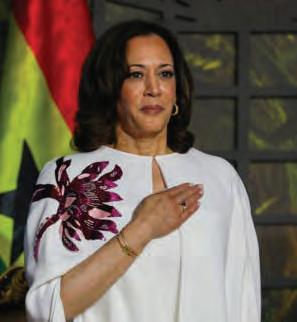
129 Eve L. Ewing Becomes First Black Woman to Write Main ‘Black Panther’ Comic Series
130 Cool New Experiment Explains Why We Evolved Curly Hair
132 Excitement as Rwanda Receives NBA Africa Sports Facility
134 Ruth Carter’s ‘Wakanda Forever’ Costumes are a Masterclass in Female Vulnerability and Strength
138 BAL 2023: ‘Africa Shouldn’t only Export Basketball Talent’ - Amadou Gallo Fall
140 America’s First Celebrity Chefs Were Black
144 Chef Marcus Samuelsson Elevates Diversity of Culinary World History
147 The Untold Stories of the Women Who Led Slave Revolts
Tinubu?
UN Announces New
Participation in Global
Operations 64 About the Permanent Forum on People of African Descentt
Launch of Reparations Commission in Illinois USA
U.S. Military Conducts First Maritime Drills with West African Forces 68 Kamala Harris Starts Africa Tour in Ghana 90 Black History Booms as States Restrict It 91 Gov. DeSantis: State NAACP Travel Advisory Proposal ‘A Joke’ Investment 93 African Stock Exchange/Bourse 94 Black-Owned Fintech Esusu Hits Unicorn Status With SoftBank-Led Round 95 Idris Elba and Mo Abudu Partner to Help Develop African Film, TV Industry 96 Two New Investment Funds: Kanary's Inc. and Phenomenal Ventures 98 Pressley and Booker Reintroduce Baby Bonds Bill, Attempt to Close Racial Wealth Gap 100 This Kenyan Woman is Making Waves in the Fintech Industry 102 A $300 Billion Opportunity: Serving the Emerging Black American Consumer 108 Cobalt Red: How the Blood of the Congo Powers Our Lives 111 SoLo Funds Becomes First Black-Owned Personal Finance Platform With One Million Registered Users
Bernice King, Other Black Investors Make
60 Africa Gears up to Keep More of the Profits from Lithium Boom 63
Grant to Boost Women’s
Peace
66
67
112
3 March-April 2023 DAWN www.africabusinessassociation.org 67 68


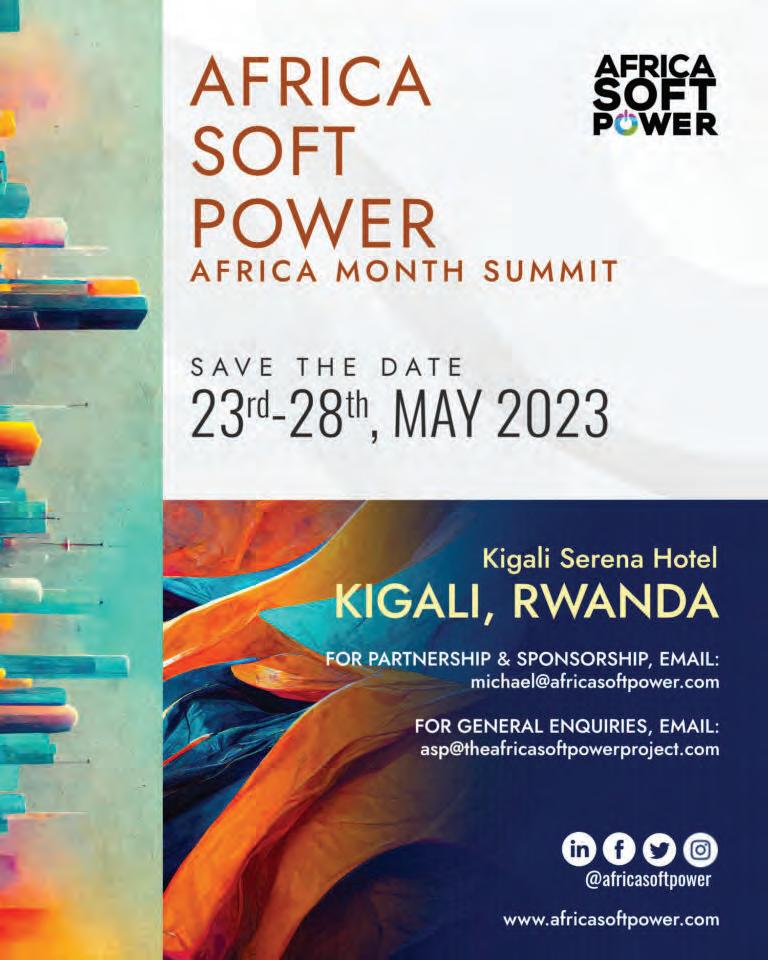
4 March-April 2023 DAWN www.africabusinessassociation.org
www.africasoftpower.com asp@theafricasoftpowerproject.com @africasoftpower
Not Sure Which African Market is Best for You??
Learn About the Eight Most Promising African Markets by joining the "Access Africa Now Webinar Series"
Every Second Wednesday 12:00 - 1:00 p.m. ET Virtual
February 8, 2023 - Kenya
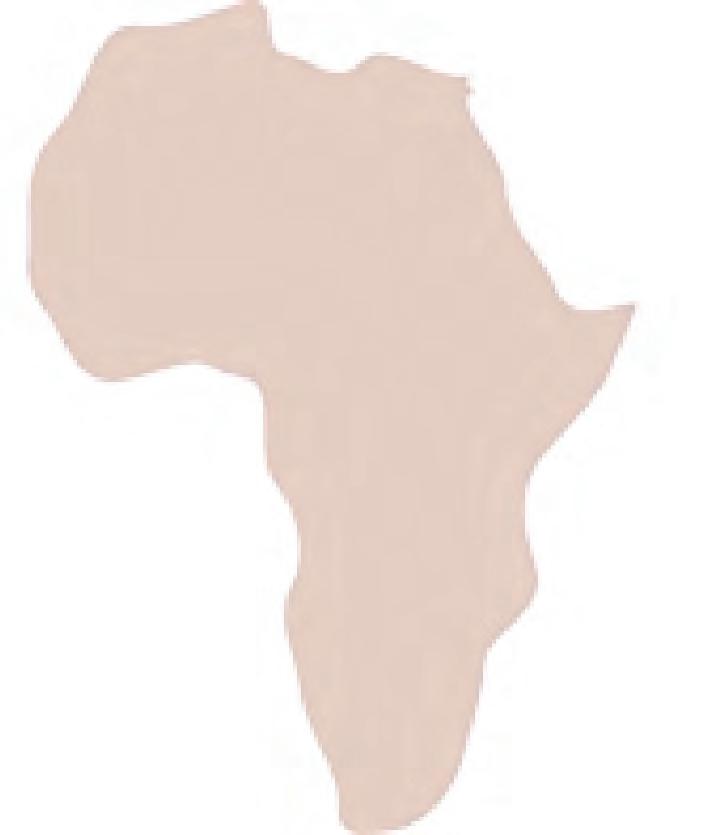
March 8, 2023 - South Africa
April 12, 2023 - Ghana
May 10, 2023 - Nigeria
June 14, 2023 - Mozambique
July 12, 2023 - Tanzania
August 9, 2023 - Angola
September 13, 2023 – Ethiopia
Learn More/Register for the Access Africa Webinar Series
Learn About South Africa, Ghana, Nigeria first hand by joining the August 6th-15th
Trade Mission: O fficial Executive-Led GDEI Business Development Mission to South Africa, Ghana, and Nigeria
Learn More & Apply for the Mission

5 March-April 2023 DAWN www.africabusinessassociation.org
Thinking About the 55th Anniversary of the Assassination of Dr. Martin Luther King, Jr.
 From Carl West,
From Carl West,
Tales of Two Black Surgeons


"Let me put this in context: Dr. Selwyn Rogers has become a dear friend. He first arrived in Chicago as the lead surgeon to head the University of Chicago Medicine newest Trauma Center, which the south side of Chicago's activists and residents fought for decades to secure. He came with impressive credentials and was immediately the right man for the job. Handpicked by Brenda Battle, along with others within UChicago's executive ranks, Dr. Rogers has been nothing short of outstanding.
"Now, it's hard to fathom someone being superior in their profession when it relates to saving or preserving the lives of the many young colored men who travel through the Trauma Center after either being shot, stabbed, or other serious incidents. But if there was one person who has the compassion to attend for every person that unfortunately comes through those doors, Dr. Rogers would care for them as though they were his family and closest friends. When Dr. Rogers forwarded me this article, it was obvious what he wanted me to do. So, please read carefully, as many have traveled this road to nowhere." - Carl West
Correspondents:
Dr. Orlando Kirton & Dr. Selwyn Rogers
AS THE 55TH ANNIVERSARY of the assassination of Dr. Martin Luther King, Jr., approaches, and having recently celebrated another Black History Month, we believe it’s
essential to ask how much progress we have made as a nation on the promise of the Civil Rights Act. Where are we on the journey to achieving, in Dr. King’s words, a “beloved community”?
At the most recent fall meeting of the American College of Surgeons (ACS), the largest surgical meeting in the United States, I (O.K.) was dressed in my usual work uniform: a crisp white shirt, elegant sports coat, tailored slacks, and signature bow tie. Like the other attendees, I wore a lanyard with the ACS logo. As I waited for an Uber by the hotel entrance, a White man, perhaps in his 30s, approached me holding a ticket in his outstretched hand. “Can you get my car?” he asked. Stunned, I waved off the confusion. The man doubled down, asking, “Aren’t you the valet?”
Later that night at dinner, I recounted the scene to my colleague and friend (S.O.R.), a younger Black surgeon, and his wife. He was nonplussed. His wife was aghast. Two days later, S.O.R. was preparing to lead an early-morning panel session on addressing social determinants of health in surgical care. He had arrived at the meeting room early to make sure that everything was ready. He, too, wore the attendee “uniform”: freshly ironed white shirt, sports coat, tailored slacks, and a designer

Guest Editorial
6 March-April 2023 DAWN www.africabusinessassociation.org
Dr. Selwyn O. Rogers, Jr.Dr. Orlando Kirton
tie, with the same ACS lanyard around his neck.
As he sat at the desk in prep mode, another surgeon with the same ACS lanyard approached him and asked, “Are you the AV guy?” We are two Black surgeons with a combined five decades of professional experience between us. One of us is a current chair of surgery; the other is a past chair of surgery and an assistant dean of a medical school. We are both graduates of Harvard Medical School and professors of surgery. We have seemingly climbed the ladder of meritorious success.
Yet we are constantly reminded that we have not traveled a great distance as Black men in the United States. Our memories of our own childhoods contrast starkly with the lives of many Black boys and girls in urban America today. Although some Black boys and men are fortunate to escape the killing fields of poverty and gun violence, we can’t help but ask why all Black and Brown boys and girls don’t get a fair start.
Why is there an often impenetrable societal ceiling of low intellectual expectations? Often, Black boys, especially, are seen only through the lens of their physical attributes. How tall are they? How fast can they run? How much can they bench press? Their physicality becomes the currency that America values. They — and many boys and girls who are Black, Indigenous, or people of color —
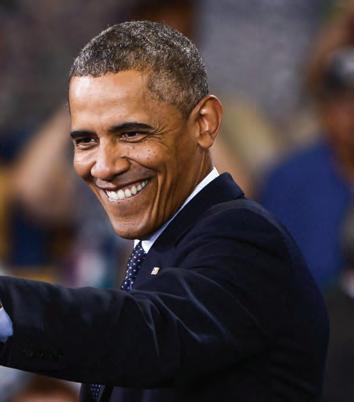
are not allowed the grace and space to develop to their fullest intellectual potential.
The parallel is powerful between the Black professional mistaken for a valet and a young Black high school or college student recognized only for his athletic skill. At the core, society fails to recognize racism’s e ffects on the ways we relate to one another. U.S. society at large has not had the courage to admit that the legacy of chattel slavery is everyone’s problem. We must all accept the discomfort of engaging in these conversations, especially with people with whom we may disagree.
Today, in the United States, it is as if there are two different scripts being loudly declaimed simultaneously, trying to drown each other out. The ever-escalating chant “Black Lives Matter!” is countered by the drumbeat of cancel culture and White supremacy. “Aren’t you the valet?” “Are you the AV guy?” Though we might assume we know which script the speakers were reading from, we must all remember that we do not know what we do not know.
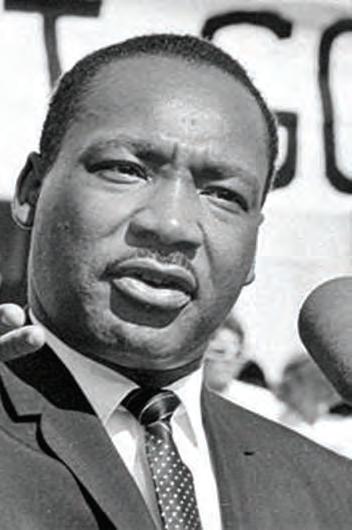
Each side can simply be angry with the other, or we could look at the interaction as an opportunity for us both to learn. As the great philosopher Sansa Stark on Game of Thrones said, “I’m a slow learner, it’s true. But I learn.” We do hope the two men we encountered at the meeting learned something from our interactions with them. Sadly, we know we did.
(Orlando Kirton, M.D., M.B.A., Thomas Jefferson University, Philadelphia, PA and Selwyn O. Rogers, Jr., M.D., M.P.H., University of Chicago Medicine, Chicago, IL. This article was first published in The New England Journal of Medicine)
http://truthbtoldwithcarlwest.blogspot.com/

Image
7 March-April 2023 DAWN www.africabusinessassociation.org
credit: wsbs.com, The Boston Globe
Publisher's Message
THE VISIT TO GHANA, Tanzania, and Zambia by USA Vice President Kamala Harris is truly historical given her connection to Africa and her being the first African American woman vice president of the United States of America to visit the continent.
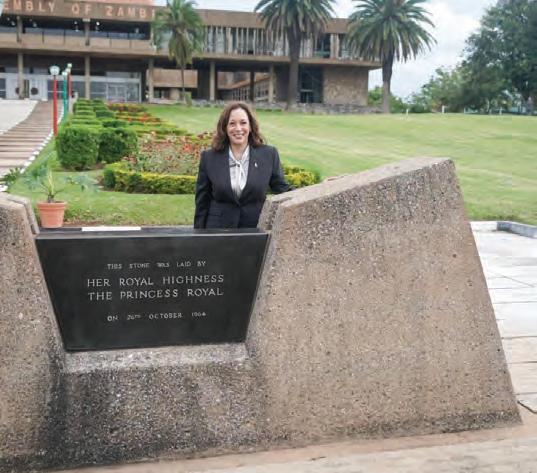
To put into context the first African American President of the USA had roots in Kenya and now the first African American woman Vice President does have some vivid history in Zambia.

The seriousness of these connections by these prominent American leaders points to the significance that Africa still plays subliminally in the success of this most prosperous country on the planet.
As a culturally diverse continent, Africa and all its people should look into the future with significant confidence knowing full well that among them lie leaders for America and the continent. It is therefore important that Africa and its people invest in the long-term strategic relationship with the United States of America, it's ally and future Strategic partner.
WAKE UP AFRICA!
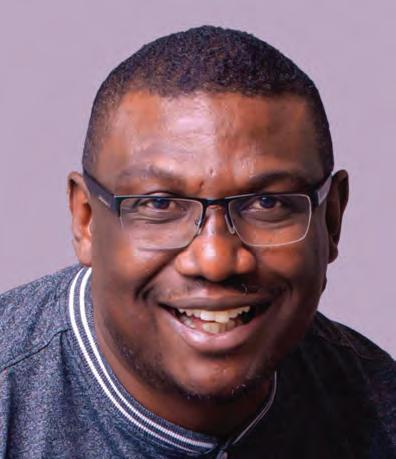
8 March-April 2022 DAWN www.africabusinessassociation.org Publisher's Message
Ricky Katsuya
Kamala Harris at Zambia's Parliament Building as a little girl (L) and as U.S. Vice President in 2023










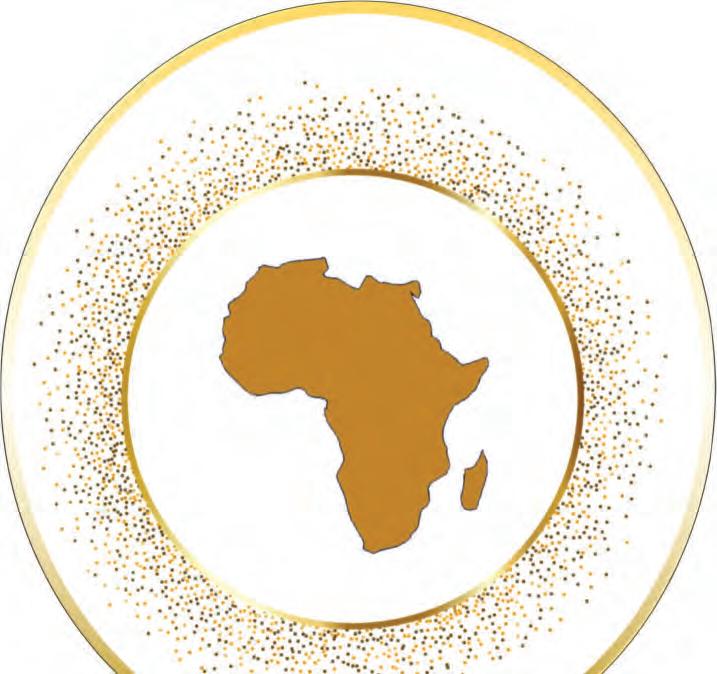

9 March-April 2023 DAWN www.africabusinessassociation.org Agriculture - Business - Commentary - Development - Education - Governance History - Investment - Lifestyle/Culture - Technology/Science
About the Africa Business Association
The Africa Business Association is an independent international business development organization. We offer access to the latest resources, information, and best practices in advocacy and communications for the African Diaspora and the African entrepreneurs in Africa.

We work to help you have access to news and events as starting points for constructive conversations and calls to action. We seek to cut through the froth of the political spin cycle to underlying truths and values. We want to be so focused on progress that together we can provide a credible and constructive generation of Africans that take seriously our previous generations and act upon all their wishes, our hopes and aspirations to make lasting change for all future generations.
Africa Business Association "DAWN"
PUBLISHER/PRESIDENT
Ricky Katsuya
ADVISORY BOARD
Earl 'Skip' Cooper, II, CEO, Black Business Association
H.E. Kone L. Tanou, Ambassador
CONTRIBUTING WRITERS
Ricky Katsuya
LAYOUT/TYPESETTING
Lion Communications
AFRICA BUSINESS ASSOCIATION NEWS
6564 LOISDALE COURT, SUITE 600 Springfield, VA 22150 USA 1-240-467-6811
aba@africabisinessassociation.org
dawn@africabusinessassociation.org
www.africabusinessassociation.org
Copyright © 2022
by Africa Business Association News
All Rights Reserved.
The posting of stories, commentaries, reports, documents and links (embedded or otherwise) on this site does not in any way, shape or form, implied or otherwise, necessarily express or suggest endorsement or support of any of such posted material or parts therein.
Image credits: Cover-pinterest, Reuters, Blavity, Statehouse
10 March-April 2022 DAWN www.africabusinessassociation.org
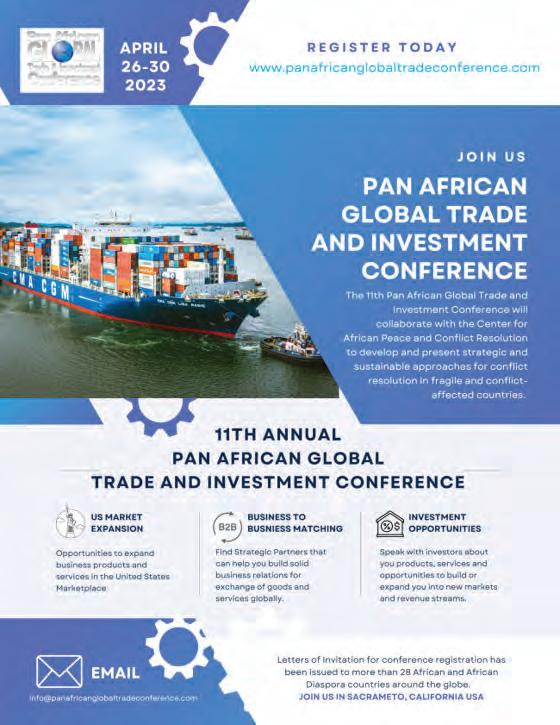
Join Us In Sacramento, CA USA - info@panafricanglobaltradeconference.com 11 March-April 2023 DAWN www.africabusinessassociation.org
From Street Hawking to Founding one of Africa’s Top Homegrown Luxury Watch Brands, Meet Ghana’s Anthony Dzamefe
By Abu Mubarik
ANTHONY MENSAH DZAMEFE is a Ghanaian entrepreneur and the founder of one of Africa’s top watch brands called Caveman. His entrepreneurial journey dates back to days he used to accompany his mother to the market to buy items to stock her provision shop in the Volta region of Ghana.
The episode was not only a bonding time for him as he also picked up some entrepreneurial traits from his mother without even knowing it. This, in addition to his background in science and business administration, has come in handy for him in his current endeavor.
“I practiced entrepreneurship without knowing it,” he told Face2Face Africa. “Because when I sit back and remember that I had done a lot of selling in the past when I was a kid…I would go to the market to sell water and all other things.”
Nonetheless, Dzamefe didn’t know what entrepreneurship was. In fact, he never aspired to be one until the later stages of his life. Before launching Caveman, he operated a shop where he sold different brands of watches.
Dzamefe’s affair with watches is one that fits the line “from hate to love.” According to him, he never liked watches and never understood the concept since he could tell the time on his phone. However, it was not until 2015 that he decided to buy one for himself. It is unclear what changed for Dzamefe but he told Face2Face Africa that doing watches was accidental.
“So 2015, I had no job. For the first time in my life I wanted to buy a watch so I walked into a shop and I couldn’t afford what they had in the shop. So I saw somebody else’s online selling a watch for less than $10,” he narrated. “I just called the person and bought the watch. So I put the watch on my wrist
to take a picture and someone took an interest and asked if I was selling it and I said ‘yeah.’”
“I mean, I was a jobless guy looking for opportunities anywhere I could find one,” he continued. “So somebody showed interest in that watch and I sold it. I made profit off that sale and that was the moment I started putting ‘two and two together.’ Maybe I could make business out of this. So it was in 2015 I walked into a shop to buy a watch for the first time in my life.”
Touching on his work, Dzamefe said the design process is his favorite. Like his siblings, he draws, a gift he said he picked from his mother. At high school, he said, many thought he should have been reading visual arts instead of general science.
“But I think my artistry has come to help me very much. The design process is what I love. How to put the elements of a good design together [while] respecting the watch making principles. And then the craftsmanship required.”

To make his watch, he relies on other companies for different parts although he makes some inhouse. Some of the companies are Ghanaian owned. Everything then comes in-house where the assembling is done and all the necessary tests are done before the watch hits the market.
Caveman recently hit the Nigerian market. Nigeria is Africa’s biggest economy and any acceptance

Business 12 March-April 2023 DAWN www.africabusinessassociation.org
of a brand produced in Africa means that the product is of high quality. The brand also has a partnership with DHL to deliver purchases to international clients. Some of his international markets, aside from Nigeria, predominantly include the UK, the USA, China, South Korea and The Netherlands.

Dzamefe has five siblings and was raised by “strict parents” who did not compromise on education. He had his basic education at Mawuli School and went to St. Pauls for his secondary education. He holds a Diploma in Business Administration and a degree in Business Management from the University for Professional Studies in Ghana.
https://www.msn.com/en-us/money/ smallbusiness/from-street-hawkingto-founding-one-of-africa-s-tophomegrown-luxury-watch-brandsmeet-ghana-s-anthony-dzamefe/ ar-AA16ZMXs
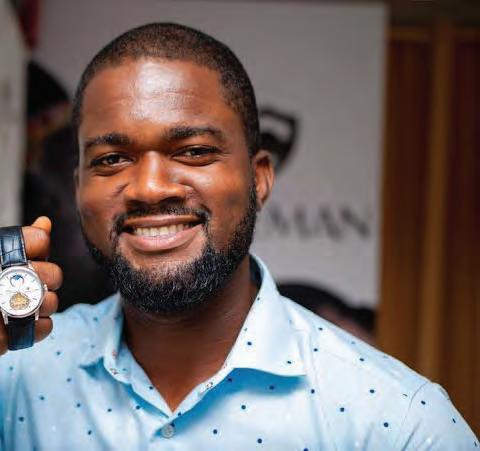

Video Interview: https://youtu.be/dAjpHkG7IQ
Image credit: https://www. cavemanwatches.com/




13 March-April 2023 DAWN www.africabusinessassociation.org
Anthony Mensah Dzamefe
Telfar’s Radical New Pricing System is the Ultimate Anti-luxury Move
By Elizabeth Segran
Telfar Clemens wants you to decide how much his clothes cost. And if that sounds crazy—well, that’s the point
Around March 27th, when his eponymous fashion label drops its latest unisex clothing collection online, Clemens will also launch a radically new pricing model. When customers start shopping, they’ll find that prices aren’t fixed. Instead, there will be a dynamic pricing tool on the website that ensures the most popular, fastest-selling products are cheaper. The whole experience is designed to flip the script on the fashion industry, where brands tend to charge more for popular items. And it reinforces Clemens’ mission of making his products affordable, so they are accessible to anybody who wants them.
“Many brands use price as a barrier to entry,” says Clemens. “I never wanted that for my brand.”
THE ANTI-LUXURY BRAND
These days, Clemens is one of the hottest names in fashion. Big names including Alexandra OcasioCortez, and Dua Lipa have carried his logoembossed tote bags—priced between $157 and $250, depending on size. They’re now ubiquitous on the streets of New York and Los Angeles, selling out within seconds online, and going for nearly double their retail price on secondhand sites like Rebag. Even Beyoncé is a fan. In her latest album, Renaissance, she drops a lyric about how she’s putting her Hermès bags in storage in favor of her Telfar tote.

Clemens could easily try to position his label as a luxury brand and charge higher prices. After all, he won the fashion industry’s most prestigious award, the CFDA/Vogue Fashion Fund, in 2017 and has
shown his collections alongside Louis Vuitton and Givenchy at fashion weeks in Paris and Florence.
But from the time Clemens launched his brand as a teenager in 2005, he’s been committed to affordability. Over the years, he’s chosen to partner with brands the fashion industry considers lowbrow. While most designers seek sponsorship from beauty brands or credit card companies, Clemens asked Kmart to sponsor his 2014 fashion show. He designed the uniforms for White Castle employees in 2017. Last year, he did an in-person shopping event at Rainbow, a store known for selling cheap, trendy clothes in low-income neighborhoods.
This latest pricing model is an extension of his ideology. Clemens came up with the idea with Babak Radboy, his creative director, about a year ago. The two of them were trying to figure out the prices of an upcoming collection, and it dawned on them that pricing clothes was somewhat arbitrary. Radboy stared at a hoodie and realized the brand could charge $100 or $600 for it. Most brands charge the highest possible price they think consumers will be willing to pay, and they often try to charge more for
14 March-April 2023 DAWN www.africabusinessassociation.org
Business
items they think will be popular. But Radboy says this goes against Telfar’s fundamental ethic. “If we charge $600 for the hoodie, then only one class of person would buy it—the person who can afford it,” Radboy says.
Radboy thought a fairer and more logical way to determine price was to figure out exactly how popular the hoodie was. If they knew there would be a lot of demand for certain products, they could place larger orders with the factory for future collections and negotiate a cheaper price, and then pass on the savings to the customer. “The more we thought about it, the more it became clear that the pricing model in fashion doesn’t make any sense,” says Radboy.
will give us information about how much of each product we should order in the future,” Radboy says. “And the larger the order, the cheaper it costs to manufacture.”
If the whole system seems confounding, that’s partly because it’s so different from what we’ve come to expect from the fashion industry. “It’s the opposite of a sale,” Clemens explains. By that, he means most brands start the season with their highest prices, then as time goes on, they sell any extra inventory at a discount. Here, Telfar is starting with its lowest prices, which will rise over time.
THE FUTURE OF PRICING
For now, Clemens and Radboy expect this dynamic pricing system to be an experiment that will run on all new clothing drops through April 24. The goal is to help them determine pricing on future collections. But besides being a practical way to collect data, it is, on some level, a stunt designed to show how broken the fashion industry’s traditional pricing model is.
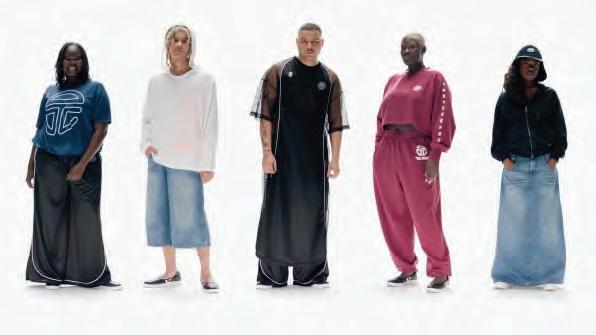
This is something that fashion experts have talked about for years. Many brands don’t have an accurate sense of how much inventory to order, and as a result, they discount heavily as the season goes on. This dilutes the brand. It is also bad for the planet because it floods the market with product that customers don’t really want.
After that conversation, Radboy and Clemens hired engineers to develop a new pricing tool. When customers arrive on the website next week, every item will be at the wholesale price, but the price will go up over time, at a rate of about one cent every 20 minutes or about $10 to $20 every week, according to Radboy. And importantly, Radboy says that the final price at which it sells out will remain the price for all subsequent collections. “The sell-out price will be the forever price,” he explains.
In some ways, the real point of the pricing model was to help gather data about demand. As customers swarm the site, it will become obvious how quickly products sell out, and items that sell out within 30 seconds are clearly more popular than those that sell out within a minute. “This
Telfar’s dynamic pricing model is yet another way for Clemens to push back against the imposed boundaries of the fashion industry. But it is also a little wacky and complicated. It’s unclear whether his customers will fully understand the broader philosophical objective of the exercise, but they’ll no doubt be excited to snag Telfar merchandise for lower prices than ever before. And that’s equally important to Clemens. “I want people who want my clothes—and will look cool in it—to be able to get it,” he says.
https://www.fastcompany.com/90866746/ exclusive-telfars-radical-new-pricing-system-isthe-ultimate-anti-luxury-move Image credit: telfar.net
15 March-April 2023 DAWN www.africabusinessassociation.org
Queen Latifah's ‘Queen Collective’ is Opening Doors for Black Women Filmmakers
By Stacy Jackson
THIS IS WHY SHE’S THE “QUEEN.”

Queen Latifah is opening up more opportunities for women filmmakers of color to tell their stories through the Queen Collective, a program developed in partnership with Procter & Gamble Flavor Unit Entertainment, and Tribeca Studios.

According to Forbes, the program offers women filmmakers of color the opportunity to develop and showcase their short films in an effort to amplify gender, racial equality, and representation in the industry.

“We created this partnership, the Queen Collective, to give women of color an opportunity to create, produce, direct, and have financing for their short film and distribution. We’ll take care of everything from beginning to end and allow them to create their vision,” Latifah said.
Launched in 2019, the Queen Collective provides mentorship, production support, distribution opportunities, and essential financial resources to the innovative filmmakers, some to include the program’s most recent featured directors: Imani Dennison, Luchina Fisher, Contessa Gayles, Idil Ibrahim, Vashni Korin, and Jenn Shaw
“We’ve seen our directors [would] hire over 50% people of color, over 50% women in their crews, and it created that experience that people needed, it started to build that pipeline that we need. If you want to hire someone, you want to hire the best person; the best person needs to be trained [and have] experience, so if we’re not even getting the experience, how will we be the best?” she said.
Variety reported that the Queen Collective has helped around 100 people find employment in the industry, noting that 75% were people of color.
“I’m not just impressed with the directors, but with the crews they hired because I know all those folks can go on and get jobs in those positions,” Latifah added.
The Queen Collective short films are now available on demand and can be accessed through BET platforms including BET, BET HER, BET SOUL, BET JAMS, and PLUTO TV. Viewers can also find them on the P&G website.
https://www.blackenterprise.com/queen-latifahsqueen-collective-opens-doors-for-black-womenfilmmakers/
Image credit: Queen Collective
16 March-April 20232 DAWN www.africabusinessassociation.org Business
.” re e r rs s h he e ed e, nd m or nd rt nd he of e,
BLACK-OWNED BUSINESSES are dropping their creative magic at Disney.
Disney is collaborating with Black-owned businesses to create new merchandise for fans.
According to WESH, the partnership features new apparel, beauty items, food and beverage products, and toys.

CurlCap Founder, Brittney Sade, is one of the Black businesses partnering with Disney on the merchandise.
According to the CurlCap’s Instagram, Sade made history “as the first black owned apparel company to have their own authorized Disney merchandise.”
“Those who may not have been reflected always in the products or the films and so on, it’s wonderful to have a mirror, have an example to showcase something you can be, something you maybe didn’t even dream of,” Michelle Stepney, a representative from Disney’s consumer products team said.
Stepney said working with brands like Sade’s, which was inspired by an experience with psoriasis causing Sade to start over in her hair journey, can be life-changing. Sade made a sample of her caps that were made with natural hair in mind.
Disney took notice of Sade’s satin-lined, backless CurlCaps, and picked up the product.
“When they reached out, it was like the magic
Curlcap Becomes First Black-Owned Apparel Company With Authorized Disney Merchandise
 By Stacy Jackson
By Stacy Jackson
of Disney was all over my life and … a full-circle moment,” Sade said. “This relationship, this collaboration, it’s been beautiful.”
Over 100,000 Disney-themed CurlCaps have been sold.
“Representation is what helps to empower people. This is what encourages children to be brave to step out and say, ‘I might be different, but this is acceptable. I’m still loved.’ Coming on with minimal experience and shining, getting the attention of Disney, has been absolutely magical,” Sade said.
Disney has also partnered with other Blackowned businesses that include sports fashion brand Actively Black, BLK & Bold coffee, and Young King Hair Care. Additionally, a re -designed line of Disney’s classic princess dolls launched in collaboration with CreativeSoul Photography
Disney fans can expect more partnerships to produce new fan favorites, including merchandise set to release in May, for the new Little Mermaid live-action film, starring singer and actress Halle Bailey.
https://www.blackenterprise.com/curlcapbecomes-first-black-owned-apparel-companywith-authorized-disney-merchandise/ Image credit: Screenshot via YouTube/WKMG News 6 ClickOrlando
17 March-April 2023 DAWN www.africabusinessassociation.org
Business
The Black Unicorn: Changing the Game for Inclusivity in Retail
By McKinsey & Company
In a sign of what’s to come, 90% of Gen Zers (those born after 1995), believe companies should address racial equality, and Gen Zers are 1.4 times more likely to say that inclusivity is one of the most important factors in their buying decisions.
A survey of US consumers this year showed that Black consumers are far more likely to say that the products and services available today do not meet their needs, particularly in the personal care, financial, healthcare, and food industries. In the beauty industry, 92% of Black consumers say that supporting Black-owned brands is important to their buying decisions. Black respondents also noted that they did not see themselves in marketing campaigns, and that many companies lack a commitment to social justice. Survey results indicate that Black consumers are willing to shift about $260 billion of their annual spending to companies that better meet their needs.

Supply of Black brands is lagging due to systemic challenges
IN THE AGE of the inclusive consumer, harnessing the power of retail can increase demand for Blackowned brands.
Consumer demand for Black brands is rising
The age of the inclusive consumer is here. Nearly half (45%) of consumers in the United States agree that companies should pledge to support Black-owned brands, suppliers, and vendors. Sixty-eight percent say their social values shape their shopping choices. This sentiment is matched by the growing support for Black-owned brands by trendsetting publishers: nearly every leading fashion magazine, from Vogue to Teen Vogue, publishes lists of top Black brands and designers.
The rising demand for inclusivity on retail shelves is more pronounced when we look at the coveted Gen Z consumers, who influence over $800 billion on retail each year, as well as Black households, with consumer expenditures of around the same.
Despite rising demand and a clear consumer call for change, Black brands encounter outsize challenges to scaling and meeting the demand. While Black Americans are more likely to start businesses than any other ethnic group, they are up against tougher challenges from the get-go, with capital of only about $35,000, on average, compared with $107,000 for White entrepreneurs. Only one percent of venture-capital funding goes to Black founders, and many say they lack the social capital and networks they need to tap flexible capital to invest in technology, R&D, and innovation. Convincing partners and investors that products by Black-owned brands are for everyone is a battle that Black entrepreneurs face daily.
Too often, these and other barriers lead to shortfalls: just 4% of Black-owned businesses are still in operation after three and a half years, compared with an average of 55.5% for all businesses. Of the “unicorns” that have emerged in the last decade, less than 2% have Black founders. The last decade saw only two Blackfounded unicorns in consumer retail—Pat McGrath Labs and Savage X Fenty—both brands riding the tailwinds of celebrity.
With retail disruption in full swing post-
18 March-April 2023 DAWN www.africabusinessassociation.org Business - Commentary
COVID-19, leading retailers are starting to act
COVID-19 has provided a once-in-a-generation opening to reimagine how retail meets evolving consumer preferences, such as representation and inclusivity in retail. Margin pressures are rising in the retail industry, and while the pandemic has raised the stakes, it has also required retail brands to revisit strategies, marketing approaches, product and service portfolios, and more. Without the ability to lean on business as usual, retail leaders are taking steps to experiment and invest for the long term. To close the gap between supply and demand for Black-owned brands, for example, some are moving upstream to find brands instead of waiting for brands to come to them.
Amazon launched the Black Business Accelerator program in June 2021, committing to provide $150 million along with mentorship, marketing, and promotional support to Black-owned thirdparty sellers. Sephora invited eight brands with Black, Indigenous, and People of Color (BIPOC) founders to participate in the company’s six-month Accelerate Incubator Program, which includes “an intensive boot camp” to help participants master business skills.
These retailers are leading the way by taking hands-on approaches to help Black founders scale to meet rising consumer demands.
Competing for tomorrow: Actions retailers can take
Improving representation and diversity in the retail industry is paramount; however, finding a path to partnership that addresses systemic inequalities requires bold action across the value chain. While we focus on Black-owned brands, the following principles are applicable to other underrepresented entrepreneur populations as well. To change the game for inclusivity, retailers can take action in four main areas.
Action 1: Publicly communicate specific, tangible commitments to support Black brands
Public commitments draw a line in the sand by demonstrating seriousness and making senior leaders more accountable for results. Strong commitments can also position the organization at
the front of the pack, challenging competitors to keep pace and even shifting industry dynamics. Commitments are noticed by consumers, who are savvier than ever in seeking out companies that share their values. Seventy-seven percent of Gen Zers are likely to research if a company is helping or hurting society and the environment.

However, commitments without followthrough can backfire. Without concrete nearterm goals, timelines, and measurable progress, companies risk being labeled as “diversity washing.” Similar to greenwashing, where organizations are criticized for being misleading on sustainability claims by setting goals far into the future (such as 2050), articulating vague targets (such as using “responsible” materials), and foregoing transparency (such as having opaque supply chains), inclusion commitments are susceptible to pitfalls like overly broad goals, lack of urgency, and narrow confinement to HR. Companies that declare their inclusion commitment, articulate measurable goals, and publish their progress have a greater chance of success. Internally, they should define how each department will contribute to that commitment and be held accountable across the organization. While the vision is overarching, it should be supported with a mix of specific internal goals, such as increasing organizational diversity, and external goals, such as setting targets for increasing business with Black-owned suppliers and ensuring diversity in advertising.
Action 2: Take a holistic, proactive approach rather than wait and see
Setting trends takes courage, imagination,
19 March-April 2023 DAWN www.africabusinessassociation.org
see page 20
Download the article to review Exhibits and Notes and/or to Listen to the Article:
retail/our-insights/the-black-unicornchanging-the-game-for-inclusivity-inretail
Howevercommitments witho t ut f l ollloww-
https://www.mckinsey.com/industries/
and hard work, but the alternative—moving with the herd at the pace of systemic change—is the path to irrelevance in a retail marketplace that’s changing faster than ever. This isn’t just about shelf space; rather, it is about actually meeting the rising consumer demand for inclusivity.

Many Black-owned businesses and brands are start-ups—they are not the large mass brands that retailers know how to work with. As such, forcing the same approaches and requirements on them will be ineffective. A partnership with Blackowned brands requires flexibility. And if retailers don’t anticipate and address known barriers to engagement, they will set up budding relationships to fail—a costly outcome for all involved.
Recurring themes in challenges to partnership include bias around viewing Black-owned brands as primarily providing products for Black consumers (thereby narrowing the potential audience and scope for partnership); Black entrepreneurs’ disproportionate lack of access to information about the explicit and implicit howtos of working with a large retailer; and penalties associated with performance metrics. Combined, these factors lead to lagging confidence that a partnership would be for mutual gain.
Formalizing a partnership is just the beginning. As one director of sales put it, “You can get in, but the biggest issue is staying in. If metrics are not met, you will be removed from the shelves. The penalties of that process can take you out of business.”
Once a partnership begins, setting it up for success requires putting benchmarks in place that are not only ambitious and fair but also realistic given a brand’s context with measurement support. Blanket application of specific benchmarks with the threat of hefty fines leads to premature failure of partnerships—and can erode a retailer’s reputation, alienating future partners.
Effective partnerships also require commitment, as the timeline and path for brands to reach high sell-through numbers are different. Retailers need to invest marketing dollars, premium shelf space, and organizational support to consistently realize the rewards.
A holistic, proactive approach is required for effectively partnering with Black-owned brands to answer to the 45% of consumers who believe companies should support Black companies. It begins with anticipating the challenges and initiating a collaborative approach to addressing them.
Action 3: Mitigate capital constraints
For years, Black entrepreneurs have started with less capital, on average, than their non-Black competitors and had difficulty getting financing to start or grow a business. Even today, as previously noted, they start with onethird the amount of capital, are more than twice as likely to be denied financing, and are three times more likely to say that their lack of access to capital affects profitability. In 2019, even before the pandemic, almost 30% of Black-owned businesses spent more than half of their revenues servicing debt.
The lack of sufficient capital makes rapid growth impossible—even when an organization is profitable. Small businesses have two primary types of capital needs. The first, working capital, is cash to support the organization’s expenses from production to sales to payment. The second, innovation and growth capital, is cash to invest in new products, strategic organizational roles, and exponential growth.
Large retailers can play a meaningful role in mitigating the capital constraints by offering both

20 March-April 2023 DAWN www.africabusinessassociation.org Business - Commentary
The Black Unicorn from page 19
▲Pat McGrath Labs
educational and financing programs to suppliers.
For working capital, retailers can consider providing a portion of the payment up front, shortening the payment cycle, or supporting suppliers in accessing a range of loan options. Leading retailers may want to consider a supplychain financing program, which allows suppliers to tap into advance payment based on the retailer’s promise to pay, without cost to the retailer.
For innovation and growth capital, any accelerator program should incorporate capital and introductions to investors, lenders, and local business networks. Black entrepreneurs have the drive, talent, and will to scale—but a great strategy without capital can go just so far.
Action 4: Don’t go at it alone
A traditional customer–supplier relationship can force smaller businesses to pursue inefficient, disjointed efforts that consume time and money and reduce the chances of success. Partnership, in contrast, can lead to more knowledge sharing and trust between large retailers and Black-owned companies and brands.
Seed investors are stepping up to help underserved entrepreneurs, and more brand owners are coming to the table expecting to have a voice—and are willing to decline deals with the wrong partners. And some new organizations and
visionaries are rising to convene, build common ground and trust, and share counsel and best practices between retailers and brands.
A nonprofit called the Fifteen Percent Pledge, for example, has led major retailers to “take the pledge” to advance the representation of Blackowned brands in retail revenue, shelf space, and supplier spending. Launched in 2020, the organization offers accountability support and advice to advocate for equitable, effective partnerships between Black-owned businesses and retailers. To date, the nonprofit has helped 385 Black-owned brands reach retailers’ shelves— delivering more than $10 billion in sales in just the first six months of 2021.
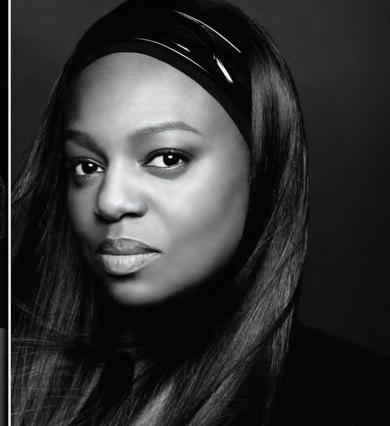
As a member of the ecosystem, retailers can take a leadership role and take decisive action in response to what consumers and the broader society demand. Retailers can post their commitment, proactively remove barriers to engagement, mitigate lack of access to capital, and partner with others in the industry to drive impact. By joining together, retail can forge a new system—one that is inclusive and fosters the talent of Black and diverse founders.
As the consumer call for inclusivity in retail rises, companies have an opportunity to harness the power of retail to catapult Black-owned brands to success. Effectively doing so requires adapting the playbook—from what works with large suppliers to what works for Black-owned start-ups that daily face inequities and systemic barriers to growth. The hard work required for this effort starts with making specific and ambitious commitments, revisiting the partnership process, unlocking access to capital, and tapping resources across the industry.

https://www.mckinsey. com/industries/retail/ our-insights/the-blackunicorn-changing-thegame-for-inclusivity-inretail
Image credit: https:// shutterstock.com/ BlackGirlMagic/ FreeTrial, blogspot. com, amazon.com

21 March-April 2023 DAWN www.africabusinessassociation.org
SavageXFenty
The Importance of Forging Connections at Work
By Lauren Wickstead, Forbes Communications Council
the lessons we learned to emerge stronger over the months and years ahead.
THER E’S NO WAY to sugarcoat it: The last couple of years have been challenging
The good news is that after those long years, it feels like we’re finally in a good place.
The panic of the pandemic is subsiding, if not completely in the rearview mirror, and we’re more freely and more frequently interacting with colleagues and connections in person. At the risk of stating the obvious, it feels like normalcy has returned.
Many leading trade shows and industry conferences have indicated they expect record turnout at their events, and studies predict business travel will rebound this year. That is positive news and a clear sign that business travel is returning.
It stands to reason, as connections are the foundation of business and there is power in human interaction. However, we haven’t focused as much on forging connections over the past few years.
It’s time to change our approach and build on
Heed the lessons learned.
The pandemic was challenging for everyone. While we don’t want to go back, we can learn from this challenge and use those learnings to propel us forward.
First and foremost, we learned that remote work was no longer a theoretical possibility but a practical solution. We made and maintained longdistance connections, and even if it felt like we were going through the motions some days, technology enabled us to maintain our productivity.

While much of the world is returning to in-person meetings, events and work, remote and hybrid work is here to stay, and organizations shouldn’t try eliminating it. However, it’s worth noting that while working remotely is a powerful alternative, if it is not managed properly, it can lead to silos and leave team members feeling isolated.
But it also taught us that the in-person connections we forge are meaningful. And it taught us that when we’re not in the same room, we

22 March-April 2023 DAWN www.africabusinessassociation.org Business - Commentary
need to connect with our colleagues not as coworkers but as fellow humans
The pandemic also taught us—or perhaps reinforced—there is no one-size-fits-all approach to how we connect. In modern times, even the smallest interactions can be powerful, whether grabbing coffee or connecting over a casual lunch.
Technology is an enabler of relationships; it’s not a replacement for making deep connections. While we can’t automate our ability to connect, we can use technology to build and nurture relationships until we meet in person.
Why connect? Why now?
We’ve known for some time how important building a robust network is for career development. Unfortunately, many of us had to put our in-person connections on hold.
In 2020, we had to develop new ways to work to maintain productivity despite the challenges. It was admirable, but we must remember the tried-andtrue methods that worked before the pandemic.
Whether it’s attending trade shows or industry events, sales kickoff meetings or professional networking, connecting can pay dividends
As I mentioned in my last post, for many people, the past few years have been a time of change that resulted in rethinking—and often changing—career paths. From starting a new business to moving
across the country to embracing remote work, many people experienced significant personal and professional changes.
Connections make those changes possible.
Connecting—or reconnecting—with those who moved, changed jobs or experienced even greater personal and professional change can pay dividends and provide a new perspective. Consider a chat with a former colleague you haven’t spoken with in a few years; perhaps they can offer new insights into a professional challenge, help you find the next great talent for your team or simply expand your community.
The possibilities are limitless.
The biggest opportunity is for leaders to make the work experience less transactional. By doing so, they can make the experience more meaningful and build a sense of community within their organization.

It’s been said often that a team is only as strong as its weakest link. As employees increasingly seek value and purpose in their roles, forging intra-team connections can help build stronger teams.
In an era of uncertainty, with concerns ranging from the economy to the ability to recruit and retain team members, this notion of a community could be the difference between success and failure. It’s hardly surprising that many reassessed their priorities in response to the pandemic.
We have the power to forge new connections We don’t need to ask permission, and we certainly don’t need to wait for someone to grant it to us; we just need to seize the opportunity and do once more what we used to do naturally.
Do you feel empowered to connect? If not, what is holding you back?
https://www.forbes.com/sites/ forbescommunicationscouncil/2023/02/27/ the-importance-of-forging-connections-atwork/?sh=555c932a7496
Image credit: edumaxi.com, echoholoser.weebly. com
23 March-April 2023 DAWN www.africabusinessassociation.org
Turn Employees into A-Players with the 10x Practice R
 By Tommy Mello
By Tommy Mello
YOU SHOULD ONLY HIRE A-PLAYERS, right?
After all, most people will say: "A-players are the best!!" Listen, I love A-players too, but here's why you should also hire B- and C-players.
You can nurture them into superstars, and it's not as hard as you think. I've seen many B- and C- players become A-players in my business, A1 Garage. And it all comes down to a simple word: Training.
How I became a believer in training
In middle school, I used to play football. I would give myself a 6 out of 10, and that's on a good day. But the training and coaching I received from a man named Mr. Dulinar changed everything for me. He was able to take me, a 6/10 player, all the way up to a 10. How?
We practiced 10 times to play one game. Two practices a day, five days a week--just to play one game. We worked out, we did our drills, and we practiced, over and over.
I call this the 10x Practice Rule
Why the 10x Practice Rule is so underrated
Becoming a top performer is about repetition and consistency. Repetition creates consistency. Consistency creates excellence.
As I wrote in this article, it's:
Recite, recite, recite
Role-play, role-play, role-play
Do it again, do it again, do it again
You want to be able to do the same thing, the same way, every single time. This might seem obvious, but I can tell you this is NOT the case for most companies, especially in the home services industry. It's almost like they're saying:
"Hey, you're hired! This is the person you're working with for the next two months. Hopefully, you pick up some of their good habits, maybe you don't, and then you're on
your own forever.... have a good one! Maybe I will see you around!"
So, are there any great examples of companies applying the 10x Practice Rule? Here's my favorite: McDonald's. Some people hate them, but I don't care--I'm a fan. Why? McDonald's is obsessed with training:
They have a system to make sure employees wash their hands consistently!
If you want to own a McDonald's franchise, you need to first attend the McDonald's school and go through six months of training.
Knowing how important training is, I made a big investment last year.
Why I spent $700,000 on a new building
I spent $700,000 last year to build a brandnew training center so we can build million-dollar technicians. We get employees to practice with each other and in front of me so they are confident when talking to any customer. We also teach
24 March-April 2023 DAWN www.africabusinessassociation.org Business
social skills like making eye contact and using the right words, so they know exactly what to do and say, step-by-step.
And most important, we apply the 10x Practice Rule all the time. Training never stops at A1!
Every morning at 7:30 a.m., they have a field supervisor call.
At 7:45 a.m., we have a Morning Mojo call: part of the call includes sales role-playing with team members.
Every Thursday, they get an hour of training.
Every single week, there are ride-alongs, where technicians can go out with our top performers and learn from them on the job.
All of this investment has paid off--the majority of our top technicians just came out of training.
Why don't more leaders invest in training?
Here's the fear that I see in some leaders: "What if I train, and they leave?" But they never think

about it this way: What if you don't train, and they stay?
Here's what Henry Ford said:
The only thing worse than training your employees and having them leave is not training them and having them stay.

Ask yourself:
What's the cost of having untrained employees in your business? How will that hurt your bottom line and reputation?
What's the impact of having well-trained employees--employees who can overdeliver consistently? How much more will your business grow as a result?
https://www.inc.com/tommy-mello/turnemployees-into-a-players-with-10x-practice-rule. html
Image credit: Color of Change, endasportswear. com, pnorthfitness.com
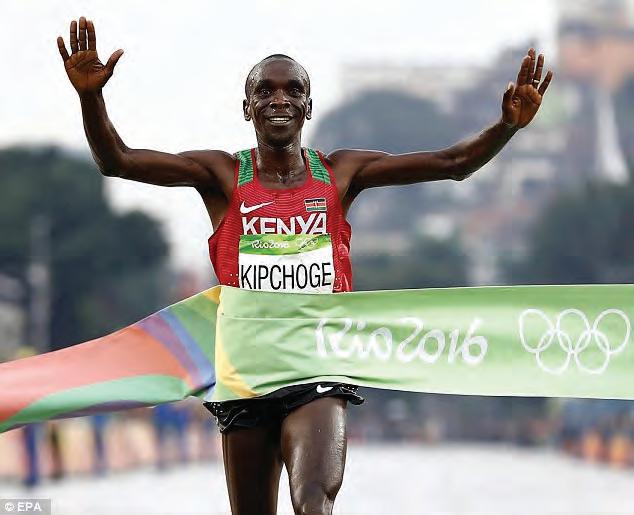
25 March-April 2023 DAWN www.africabusinessassociation.org
Rule
Kigali to Host Africa Soft Power Summit 2.0, Showcase Continent’s Growing Influence
By Waliat Musa
KIGALI, RWANDA IS SET TO HOST the Africa
Soft Power Summit, an event that will showcase the continent’s growing influence on the world stage.
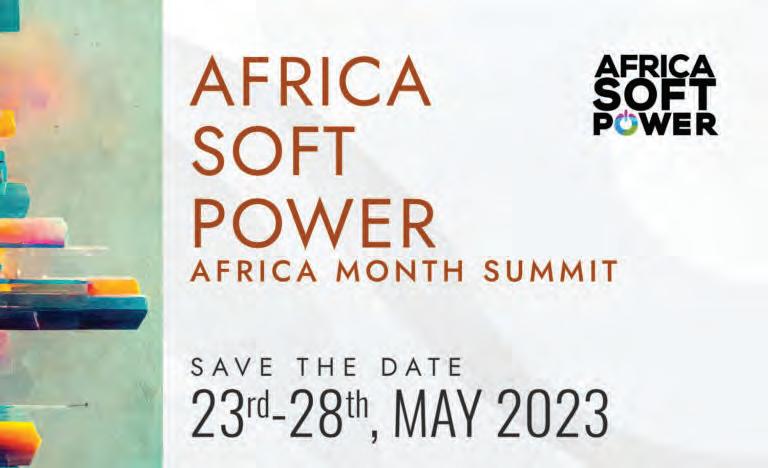
The summit, which will be held from May 23 to 28, 2023, seeks to celebrate Africa’s unique creative, knowledge and digital industries, combining sessions, networking activities and local events.
The announcement was made in Lagos, at a partners’ forum to introduce the summit.
The project is focused on harnessing the continent’s creative, cultural and knowledge industries and ginger Africa to propel herself forward, while championing the inclusion of African and Diaspora voices, in global discourse.
According to the founder, of Africa Soft Power, Nkiru Balonwu, Africans need to build more confidence in their abilities. “We need to go beyond the public and private sectors and look at stronger support for homegrown talent, business and technology,” she said.
She commended the partners, which include Bellanaija, TechCabal, BusinessDay, FilmOne Entertainment, African Women on Board (AWB), and ASP Global, among others, noting that the focus of the initiative is about balancing uniqueness
with collaboration.
“The African creative and cultural economies can act in much the same way, bringing unique outputs but operating efficiently as a continent, and in collaboration with the wider world,” she added.
The summit will feature the women’s division, creative division, gala, and awards night with a variety of panels and workshops, which will focus on topics, such as the use of technology to promote African soft power, the role of African media in soft power, and the importance of strategic communication in African diplomacy.
Balonwu further said the summit is about propelling Africa’s creativity, technology, top leadership, and Africa-led growth conversation
The summit is expected to attract a wide range of African leaders, including heads of state, ministers, and representatives from civil society and the private sector, hoping that it would help strengthen Africa’s soft power and help the continent become a more influential player in global affairs.
https://guardian.ng/news/kigali-to-host-africa-softpower-summit-2-0-showcase-continents-growinginfluence/
Image credit: Africa Soft Power

26 March-April 2023 DAWN www.africabusinessassociation.org Business
Executive-Led Trade Mission to Africa
August 6-15, 2023 | South Africa, Ghana, Nigeria
The U.S. Commercial Service is pleased to announce that U.S. Deputy Secretary of Commerce Don Graves will lead the Global Diversity Export Initiative (GDEI) trade mission to South Africa, Ghana, and Nigeria. The Nigeria stop is optional.
If you are a GDEI company in the automotive, consumer goods, ICT, or safety/ security industries, join us to gain market insights, make industry contacts, solidify business strategies, and advance your specific projects in Africa.
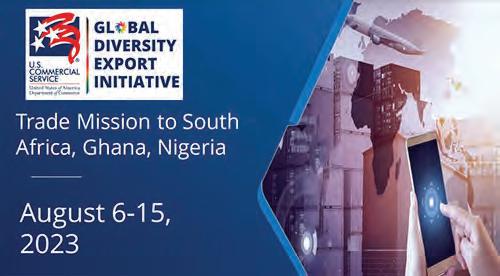
Participating in a trade mission led by a high-level federal government official can enhance a company's ability to secure meetings and gain greater exposure in international markets.
Apply today! Space is limited & applications are being reviewed on a rolling basis.
Learn More & Apply for the Mission - Click Here
Not Sure Which African Market is Best for You??
Register for our 8-market webinar series “Access Africa Now.”
Every Second Wednesday, February to September 12:00 - 1:00 p.m. ET | Virtual
Learn More/Register for the Access Africa Webinar Series - Click Here
Sponsorships Are Available. Learn More
27 March-April 2023 DAWN www.africabusinessassociation.org
AYearofAfricanOpportunities: Africa House Brings Together Global Leaders During 2023 World Bank IMF Spring Meeting
By Press release content from EIN Presswire



AFRICA HOUSE, the action platform for Africa, is proud to announce that it will be hosting a worldclass summit during the World Bank Group (WBG) the International Monetary Fund (IMF) spring meeting in Washington D.C. in April 2023. Building on a hugely successful event at the recent World Economic Forum meeting in Davos, Switzerland. The summit, titled “A Year of African Oppor tunities: Accelerating Africa’s Recovery & Development,” will bring together top leaders, experts, and influencers from the African continent and around the world to discuss the most pressing issues and opportunities facing the continent today.
With an exciting lineup of panels, spotlights, and a cultural soirée, the Africa House D.C. Summit will feature a diverse range of topics, from improving the state of African economies in a fast-changing world to leveraging global climate action for Africa’s prosperity. The event will also showcase the best in African creative industries, highlight the role of philanthropists in unlocking Africa’s potential, and explore the opportunities and challenges presented by the Fourth Industrial Revolution.
“We are excited to be hosting this event during the World Bank IMF spring meeting in Washington D.C. in April 2023,” said Prof. Landry Signé, CoFounder & Executive Chairman of Africa House. “We are confident that this Summit will be a truly unique and transformative experience for all who attend.”
As Africa House continues to make its mark on the global stage, the non-profit Foundation based in Switzerland is gearing up for an exciting schedule of events in 2023. This includes the Milken Summit in May, UNGA in September, and COP28 in November. These events provide a platform for Africa House to connect with global leaders,
share their vision for Africa’s future, and showcase the continent’s rising stars in innovation, entrepreneurship, health, trade, and sustainability.
“We are thrilled to be leading the charge for African innovation and to be showcasing the best of the continent to the world,” said Nima Elmi, CEO of Africa House. “Our goal is to create a vibrant, inclusive community that will help bring about positive change and drive economic growth for Africa, Africans and beyond.”
Stay tuned for more updates from Africa House as it continues to blaze a trail for Africa on the world stage: www.myafricahouse.com
About Africa House
Africa House is a platform to spearhead Africa’s rising by bringing the best and brightest entrepreneurs, initiatives, and opportunities to leaders across industry and government attending Davos. Africa House is powered by The Giving Back Fund as a non-profit project and supported by a team of experts that bring together a combined 100+ years of experience on the continent and leading African initiatives.
Hyatt Antognini Amin
Project Africa House
https://myafricahouse.com
+1 202-846-4742
email us here
https://apnews.com/press-release/ein-presswirenewsmatics/district-of-columbia-business-einpresswire-newsmatics-international-monetary-fundworld-bank-290fea629b10f5bce431f4d4362 ffe67
28 March-April 2023 DAWN www.africabusinessassociation.org Business
t b l di th h f
Kick off World Trade Month with America's Export Experts
O ffering Virtual Informational & Training Sessions
Join the U.S. Commercial Service
- AMERICA'S EXPORT EXPERTSfor a series of virtual tradecraft & industry-focused seminars during Export Week 2023 May 1-5.

Sign up for one or more of these sessions.
Specially designed for exporters of all experience levels.



IN 20+ SESSIONS, WE'LL COVER THESE AREAS AND MORE:
Industry-specific Exporting Guidance
Sales & Marketing
Export Finance
Export Compliance & Documentation
Export Bootcamp en Espanol
Learn More & Register
The U.S. Commercial Service is the trade promotion arm of the U.S. Department of Commerce's International Trade Administration. U.S. Commercial Service trade professionals in over 100 U.S. cities and in more than 75 markets help U.S. companies get started in exporting or increase sales to global markets.


If you are ready to begin exporting or expand to additional global markets, please contact your nearest U.S. Commercial Service office or access exporting resources
image credit: Vecteezy
M-PESA Eyes Global Remittances Market’s Multi-trillion Dollar Surge
WITH GLOBAL REMITTANCES set to reach US$5.4 trillion by 2030, according to a specialised UN agency, African fintech darling M-PESA wants to grab a piece of the pie. The Kenya fintech behemoth is ramping up an ambitious expansion drive to woo markets in the global North.
According to the UN specialised agency, International Fund for Agricultural Development (IFAD), in the 2021/22 forecast period, remittance flow (US$605 billion) was more than triple the total amount of official international development assistance (US$178.6 billion).
With forecasts showing global money transfer markets will cross the trillion dollar mark as soon as next year, players in this space are now keen to ring-fence their slice of the pie.
According to Aly-Khan Satchu, Economist and CEO of the investment advisory firm Rich Management Ltd, M-PESA is effectively targetting a two-way flow with a recently announced partnership with Amazon.
“With respect to inward remittances, I think M-PESA has to look at charges if it is to capture a significant market share and a more sophisticated domestic platform which provides a suite of investment opportunities for inward remittances. Safaricom has the platform and point-to-point advantage and the scale to make this all come together,” he said.
The move into new markets is a natural -and needed – progression for M-PESA, which has already established a strong track record of innovation and growth in Africa.
The platform has made financial services accessible to millions of people who previously lacked access to traditional banking services and has transformed how people in Africa handle their money.
Internationally, however, it will need to first wrestle the lucrative market dominated by traditional players such as Western Union and MoneyGram and banks in new countries.
Already, the virtual banking system run by
telecommunications giant Safaricom has limited partnerships with Western Union, Money Gram, World Remit and Remitly, the mobile-first provider of remittances and financial services for immigrants.
Plans are now afoot for M-PESA to split from Safaricom, its giant telecommunications babysitter, allowing it to run as a standalone financial service.
“I think the overall Safaricom share price is now a drag on the M-PESA valuation and that a spinoff will create value for shareholders, attract a new class of international shareholders and allow for efficient capital allocation into M-PESA,” said Satchu.
A divorce from Safaricom would give MPESA more headroom to pursue international ambitions as a fintech service and could allow it to list on new stock markets, expand its fintech service offering globally and solidify its position as a leading player in the rapidly growing international money transfer market.
One strategy for global expansion could be centred around partnerships with local banks and mobile operators, who will help to provide the platform in new markets.
Early in February, Nala, a Tanzanian fintech startup, and M-PESA inked a deal to expand its International Money Transfer (IMT) services to the European Union (EU).
Tellingly, last year, Safaricom and Visa launched the ‘M-PESA GlobalPay’ virtual card that enables customers to use M-PESA to shop at more than 100 million merchants across 200 countries for the first time
At the same time, M-PESA wants to be the platform of choice for Africans in the diaspora, sending billions back home. Last year, Africans living abroad sent US$54 billion back home.
This approach will allow the service to build on its existing expertise and relationships while leveraging the knowledge and resources of local partners to ensure a smooth roll-out.
However, the European market represents a
30 March-April 2023 DAWN www.africabusinessassociation.org Business
different challenge altogether. With highly developed financial systems and stringent regulations, M-PESA will need to invest heavily in research, development, and marketing to win over customers and convince regulators of the value of its services.
One of the keys to M-PESA’s success will be its ability to adapt to the unique needs and requirements of each market.
For example, in Europe, where many countries have well-established banking systems and high levels of financial literacy, M-PESA will need to emphasise the convenience, security, and speed of its services.
In addition, the company will need to comply with complex regulations, data protection laws, and anti-money laundering requirements to operate in the region.
Another critical factor in M-PESA’s expansion into Europe will be its ability to build strong partnerships with local banks and stakeholders.
This will help the company gain a better understanding of local markets, overcome any regulatory hurdles, and build a network of trusted and loyal customers.
Despite these challenges, M-PESA’s potential to revolutionise European financial services could be immense, especially the payments services.
M-PESA could ride on the trust of Vodafone and Vodacom, Safaricom’s global shareholders to penetrate stubborn European markets. But it will face pushback from banks.
With its innovative technology, extensive network, and proven track record of success, the company is poised to make a big impact in the region and change how people think about money and financial services.
One way that M-PESA could also drive its expansion into new markets is by double-listing on international stock exchanges.
By going public, the company could raise capital and gain access to new investment opportunities,
which could help it to grow its operations and expand into new markets.
In addition, listing on a major stock exchange could increase M-PESA’s visibility and credibility, making it easier for the company to attract new customers and build its brand.


Overall, an expansion by M-PESA into new markets can be a game-changer for the company and the financial services industry as a whole.
By leveraging its partnerships with international money transfer services and potentially listing on international stock exchanges, M-PESA could reach new heights and revolutionise financial services worldwide.
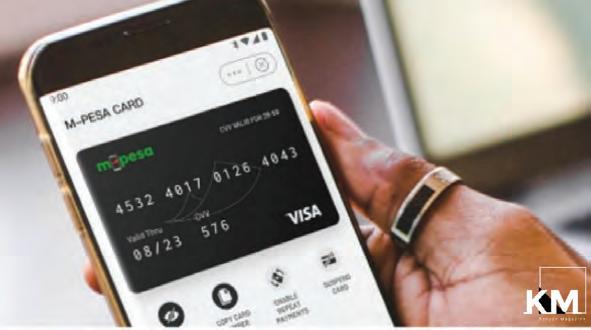
https://theworldnews.net/ug-news/m-pesa-eyesglobal-remittances-market-s-multi-trillion-dollarsurge
SOURCE: Seth Onyango, bird story agency
Image credit: samrack.com, kenyanmagazine. co.ke, cellular.net.in
31 March-April 2023 DAWN www.africabusinessassociation.org
Microsoft Calls for 'Coalition' to Improve Congo's Informal Cobalt Mines
By Reuters
MICROSOFT VISITED an artisanal cobalt mine in Democratic Republic of Congo in December as part of attempts to jump-start formalisation of the little-regulated and dangerous industry that experts say is key to meeting global demand for the battery material.
Congo accounts for three-quarters of the world's mined cobalt supply. Industrial mines produce most of Congo's cobalt, but "artisanal" miners, who dig by hand and often die when tunnels cave in, account for up to 30% of production, though that fluctuates depending on price.
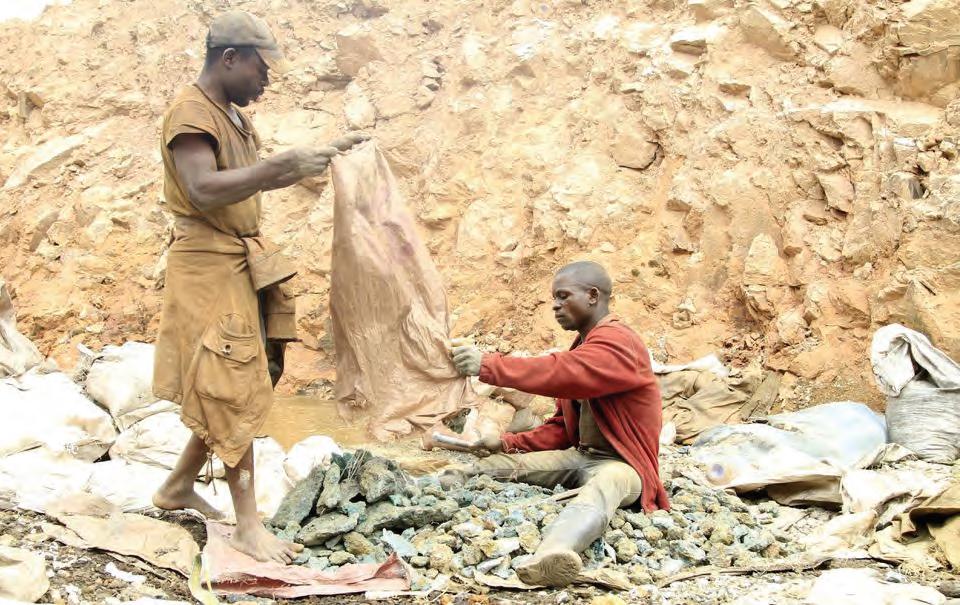
In the first known visit by a Microsoft (MSFT.O) executive to an artisanal cobalt site in Congo, chief of staff for tech and corporate responsibility Michele Burlington met miners at Mutoshi, where commodities trader Trafigura had helped run a formalisation scheme that ended in 2020.
Companies that use cobalt in products from electric cars to smartphones should work to improve conditions at artisanal mines instead of seeking to cut artisanal cobalt out of their supply chains, an independent report on the visit argued on Wednesday.
32 March-April 2023 DAWN www.africabusinessassociation.org Business
Artisanal miners work at a cobalt mine-pit in Tulwizembe, Katanga province, Democratic Republic of Congo, November 25, 2015. REUTERS/Kenny Katombe/File Photo
"Electric vehicle manufacturers and electronics companies are operating with one eye open and one eye closed," said Dorothee Baumann Pauly, director of the Geneva Center for Business and Human Rights, who wrote the report.
"In practice it is virtually impossible for them to completely exclude artisanal cobalt, especially when it is sent to smelters and refiners in DRC and China."
Microsoft declined to reply to Reuters' questions about the visit or about its strategy on artisanal cobalt. In the report, Microsoft said that it is "committed to responsible and ethical sourcing".
"We are continuing to work on this problem. It's an issue that will take a coalition to solve," the $1.9 trillion computer manufacturer and software company said.
As consumers become more concerned that the products they buy are tainted by poor working conditions or child labour, global tech firms and carmakers have been using less mined cobalt in their batteries by increasing recycling and switching to lower-cobalt chemistries. read more Apple, for example, aims to massively reduce its use of all materials sourced directly from mines, and has said that 13% of the cobalt shipped in its products in 2021 came from recycling.
The issues around artisanal mining are an
Women separate and wash rock containing cobalt at the Mutoshi mine.
existential threat to the cobalt industry, according to Marina Demidova, head of communications at the Cobalt Institute. "If we get this wrong, cobalt probably will cease to be in batteries in 20 years' time."
So far, attempts to formalise the industry have fallen flat.
Trafigura and Congo mining firm Chemaf's formalisation scheme at Mutoshi, launched in 2018, ended abruptly in March 2020 with the coronavirus pandemic. Now diggers work in deep tunnels with no personal protective equipment, and women miners said they make less money than before, according to the report.
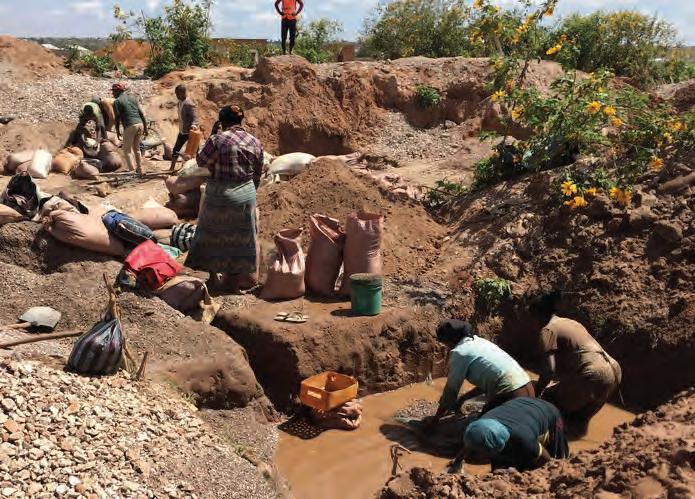
Entreprise Generale du Cobalt, a unit of state mining company Gecamines, was granted a monopoly on artisanal cobalt by government decree. EGC signed a supply deal with Trafigura in November 2020 and published a sourcing standard, but has yet to start buying cobalt due to political wrangling.
"Greater stakeholder engagement, including from global buyers, will help to overcome this impasse," Baumann-Pauly said.
https://www.reuters.com/markets/commodities/ microsoft-calls-coalition-improve-congosinformal-cobalt-mines-2023-02-08
Related video: https://www.msn.com/en-us/ money/news/miners-in-congo-escape-fromcollapsed-gold-mine/vi-AA199h5k
See related story on page 60, 108
33 March-April 2023 DAWN www.africabusinessassociation.org
PHOTO: SCOTT PATTERSON/THE WALL STREET JOURNAL
Mobile Shopping Apps are the Key to Winning Brand Loyalty
By Phil Granof
IN CASE YOU HAVEN’T NOTICED, the retail industry has been transformed by digital technology, and more and more consumers are turning to mobile shopping apps to purchase products. However, it turns out that only 33% of retailers currently offer this capability, according to a recent assessment of the solutions and services of 300 brands.
Last year, data.ai found that consumers spend more than four hours per day using mobile apps. Therefore, it isn’t hard to understand why people prefer to shop via smartphone. While there's a clear disconnect between consumer shopping preferences and the experiences retailers provide, that's not the only issue. For the brands that do offer an app, most are a carbon copy of the website in mobile form.
But it doesn't have to be this way. When done right, mobile shopping apps can create a unique experience that drives customer loyalty. In fact, an app is the most powerful tool a retailer can use to foster and maintain a brand following among its most loyal customers.
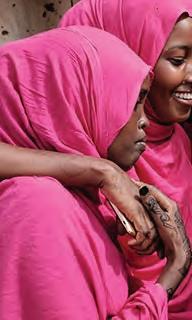
Why? Mobile shopping apps are the best way to offer a tailored and convenient shopping experience. They also allow retailers to stay connected with their customers. Plus, mobile shopping apps can provide valuable data and insights into customers' behaviors
To be ignored at your peril, here are the five strategies any direct-to-consumer brand should keep in mind when rolling out an app to ensure it appeals to its most loyal customers (or, you know, just make
it more than a watered-down version of their website). Following these guidelines will help retailers create the best possible mobile shopping experience that drives both loyalty and sales:
O ffer an engaging, seamless, and userfriendly app experience. A poorly designed or difficult-to-use app can quickly turn users off.
Retailers should focus on creating a clean, intuitive and easy-to-navigate UX that provides an inspirational, seamless shopping experience. This can build loyalty by making shopping with the brand as enjoyable and hassle-free as possible. Look at the Nordstrom app's success, which offers a userfriendly interface and interactive features.

Personalize the shopping experience.
Personalized recommendations and offers can go a long way in building loyalty among a brand's most dedicated customers. Retailers should use the data and insights they gather through their app to provide a customized shopping experience that caters to each customer's unique needs and preferences. Retail giants like Amazon.com and Target excel at this, offering personalized product recommendations and exclusive deals to app users.
Incorporate rewards and incentives.
Retailers can use their mobile shopping apps to offer loyalty programs, rewards and other incentives
34 March-April 2023 DAWN www.africabusinessassociation.org Business
to encourage their most loyal customers to continue shopping with the brand. This could include special discounts, free shipping, or early access to new products. Brands like Sephora and Starbucks have mastered the art of using their apps to offer rewards and incentives, and they have the engagement numbers to prove it.
Communicate with customers Mobile shopping apps provide a convenient way for retailers to stay in touch with their most loyal customers. Retailers should use their app to send personalized notifications about sales, new products, and other promotions to keep customers engaged and interested in shopping with the brand. Companies like The Honest Company and Warby Parker excel at using their apps to communicate with customers through personalized notifications and exclusive content.
Think omnichannel. A mobile shopping app cannot act independently from a retailer's other channels. Consumers want to shop when, where and how they want, anytime, anywhere. To create mobile experiences that resonate with loyal customers, brands must invest in apps that bridge the gap between online and in-store systems. This will allow customers to have a seamless experience no matter where or how they choose to shop. Brands like Neiman Marcus and Walgreens have success-
fully created omnichannel experiences through their mobile apps.
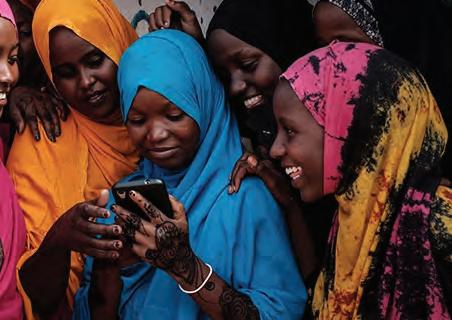
ALL OF THIS combined not only makes the shopping experience more enjoyable for the consumer but also keeps the brand top of mind and encourages customers to keep coming back. And at a time when customer acquisition costs are higher than ever, this has never been more important. That said, the decision to invest in a mobile app shouldn't happen in a vacuum. Brands must consider how their app can coexist with current offerings and amplify them. An app that offers unique benefits, funnels customer activity toward sales, and connects to physical store locations sets retail brands apart from competitors that treat their apps as just a less convenient version of their website. By focusing on their most loyal customers and creating a mobile shopping app that provides a personalized, convenient and rewarding experience, retailers can win brand loyalty and drive sales.
https://www.mytotalretail.com/article/mobileshopping-apps-are-the-key-to-winning-brand-lo yalty/#ne=4a21b9167bf658408191e7c4914 0a9aa&utm_source=total-retail-report&utm_ medium=newsletter&utm_campaign=2023-02-24
Image credit: weetracker.com, usglc.org, Shutterstock

35 March-April 2023 DAWN www.africabusinessassociation.org
Ami Colé Founder, Diarrha N’Diaye-Mbaye, has Only Just Begun to Take the Beauty Industry by Storm
By Chloe Castleberry
FOR AS LONG as she can remember, Diarrha (pronounced “Gia-rha Jaye”) N’Diaye-Mbaye has loved all things beauty. She would spend her childhood days at her mother’s braiding salon in her native city, Harlem, New York. Yet, beauty was much more than a business, it represented N’Diaye-Mbaye’s family’s “language and livelihood.” N’Diaye-Mbaye explains, “If I wasn’t at the babysitter’s, I was at the shop [Aminata African Hair Braiding] with my mother.” The shop, a longtime neighborhood staple, sits in the heart of Harlem’s style epicenter on the world-famous 125th street. “For me, it was some of my earliest experiences, seeing women getting their hair done, feeling good, and communing through beauty,” N’Diaye-Mbaye fondly recalls.
Despite her early and frequent exposure to the

hair salon, N’Diaye-Mbaye didn’t realize how much she loved the beauty industry until she tried another career path. Before founding Ami Colé, her skincare beauty line created in the fall of 2020, which she named after her Senegalese-born mother, she went to school to be a pediatrician — an unusual choice given her self-described hatred of blood. After graduating from Syracuse University N’Diaye-Mbaye realized her true calling dated back to her mother’s business and the lessons she learned from those early days in the salon.
“My mother says the customer is always right,” N’Diaye-Mbaye, who became a new mother herself this year, persuades. “Not in a cliché way, but she will literally bite her tongue knowing they are wrong. It was so important for that customer to come, but also come back and tell their friends.”
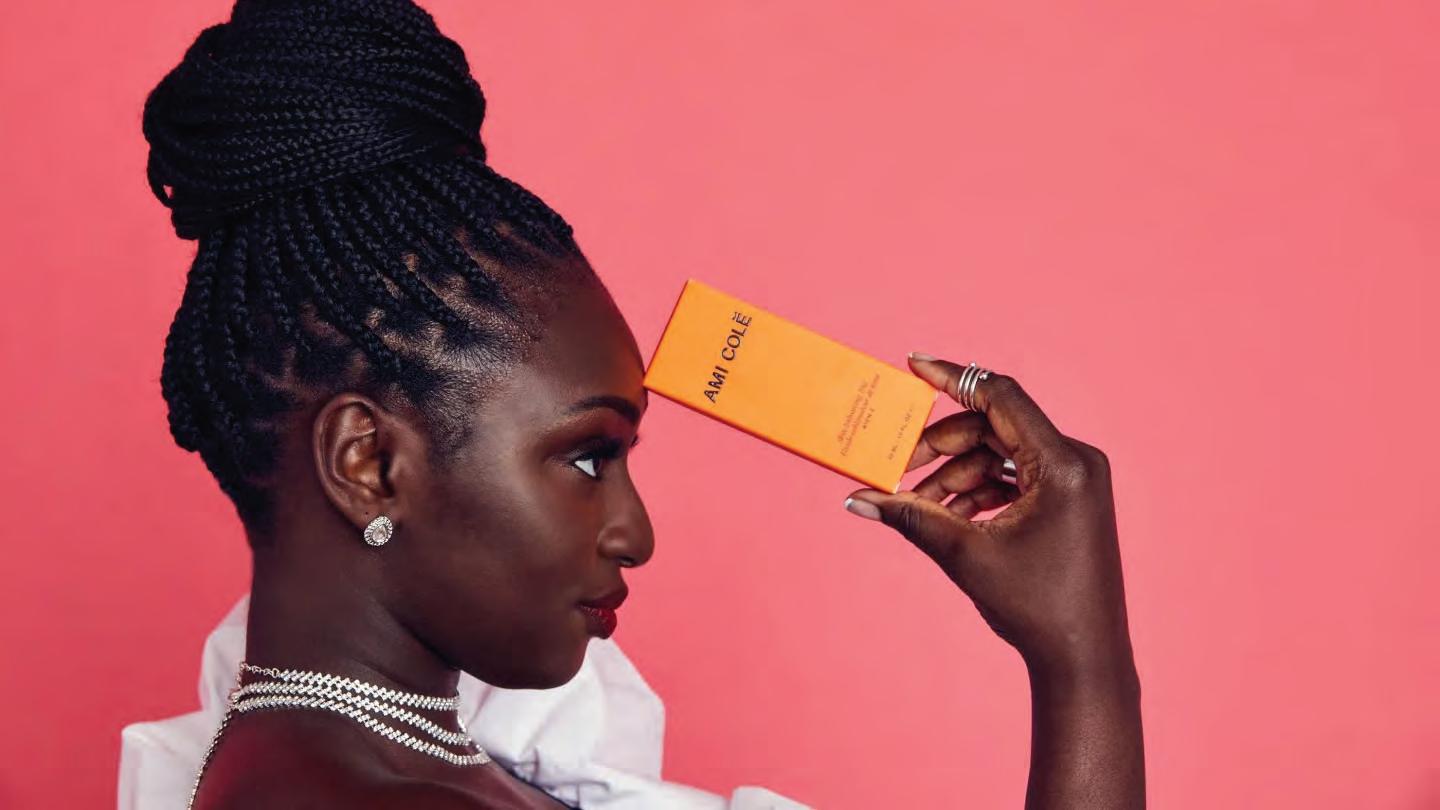
36 March-April 2023 DAWN www.africabusinessassociation.org
Business
This lesson instilled the importance of word-ofmouth marketing in N’Diaye-Mbaye, or essentially, social media before it was mainstream.
N’Diaye-Mbaye, now 32, applied these lessons to founding Ami Colé, using this communitycentric approach to build her clean beauty brand. She hired models from Harlem where she grew up to promote her brand and heavily incorporated her Senegalese heritage into product development, which focuses on tinted concealers, darker-toned foundations, lip treatment oil, uniquely designed facial brushes, and more.
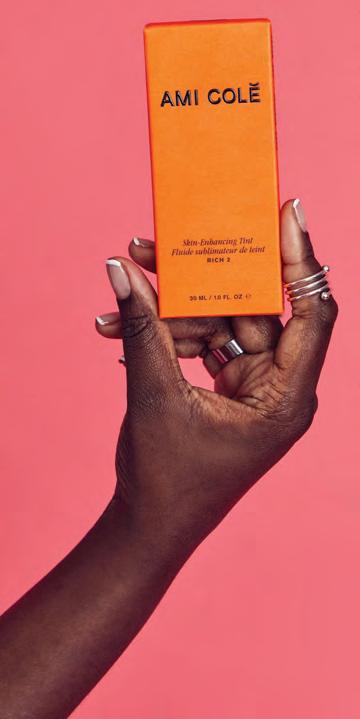

“It’s the fabric of what we do,” she says wholeheartedly. “I’m an African woman so it’s important to me to have my culture represented in my work.” That cultural representation included everything from the models she uses to the music she listens to (she loves Afrobeats) and wants others to experience it as well.
“When we work with agencies, I give them a playlist because I want them to be immersed in the world,” she implores. But more than that, she wants Ami Colé to be a celebration and safe
space for Black women to have fun with beauty – something she says this community doesn’t always have the permission to do. “With serious runway makeup, women get the very ‘I’m fierce’ Tyra Banks approach to beauty. I’m very much like the girl next door.”
N’Diaye-Mbaye is telling a story through her brand. A story that historically has excluded darker skin tones as the main character. But she’s writing a new narrative. “When I was younger, maybe 12 or 13, there was no space to tell a Black story that was beautiful,” she says. “It was always the ugly duckling story where a Black girl would have to change something about herself.”
Fortunately, N’Diaye-Mbaye never battled beauty insecurities – mainly due to her father always reminding her she was beautiful in her own skin. “He always made me feel like I was the white tiger grazing the land, asking me, ‘how rare is it that your skin is this dark?’” And N’Diaye-Mbaye wants to do that for others now.
Having once worked at VIBE magazine as the see page 38
37 March-April 2023 DAWN www.africabusinessassociation.org
Ami Colé from page 37
brand’s social media director in the early ‘10s and at beauty institutions like TEMPTU, L’Oréal, and Glossier, N’Diaye-Mbaye was no stranger to the beauty industry when she started Ami Colé. She remembers seeing the women coming into her mom’s salon, living in Harlem, being around her aunts in Senegal, and thinking how beautiful they are. But despite her childhood experiences with her mom and professional experience in the industry, she still faced challenges when starting her business.

“I’m like ‘Why is no one talking about this? Maybe they just don’t know.’ I thought I would go into these spaces and incite change and be able to share it with them, but when I found out it was a little bit intentional, I was like, ‘Wait, I wasn’t invited here.’ I just happened to be here,” she states. “To understand that and come to terms with it, because there’s also a mourning that happens when you love something so much and it doesn’t love you back, is tough.”
But N’Diaye-Mbaye didn’t turn her back on beauty, she simply changed it.
“When I think of what I’m trying to do and the feeling I’m trying to evoke, it’s like that one moment when you find that perfect match or the perfect jean,” she says. “I want Ami Colé to be that thoughtful experience when it comes to beauty. When you put on that skin tint that actually matches and it’s really clear the person that made it thought about you.”
N’Diaye-Mbaye recalls a trip to Thailand where she went to her hotel room after a day of water sports and couldn’t use the hotel blow dryer because it didn’t work for her type. “It was too weak, didn’t have the nozzle to do my hair and I thought, ‘what if I walked in here and all the amenities here actually worked for me?’ I’m talking about luxury spaces where I’m not even considered. So, what happens when we as a brand give you a luxury experience and make [it] accessible?”
According to Beauty Independent, Ami Colé is projected to generate $2.5 million in revenue by the end of 2022. There’s clearly a market for the brand, which already has accomplished so much
since it first launched in May 2021. Even with the early success, N’Diaye-Mbaye recalls the early rejection she faced when launching her brand. “I knew I was prepared, but people kept telling me no,” N’Diaye-Mbaye says. “I heard, ‘you look like Hourglass,’ ‘Fenty already exists’ and ‘you’re a random girl from Harlem, who do you think you are?’
It was disheartening for sure – there are only so many no’s one person can hear, especially when

Business 38 March-April 2023 DAWN www.africabusinessassociation.org
you’re factoring in pitching to 100 people back-to-back in a pandemic, you have no job, no savings because everything you have is going back into the company, and you’re running on empty with zero inspiration because the only example of success at the moment is Fenty – a conglomerate.
But N’Diaye-Mbaye kept telling herself that Ami Colé needs to exist.
Blink to 2020 when Black Lives Matter hit, and investors had the epiphany that yes, Black-owned brands [are here] and no, they don’t have money for funding. “Suddenly everyone has money. Suddenly everyone is answering emails. And suddenly people are flooding the gates to invest in Ami Colé,” she lists.
It’s a bittersweet moment. On one hand, N’Diaye-Mbaye now has the opportunity to turn her vision into a reality, but on the other, why did it take the murder of a Black man for some people to understand that racism is still happening in America? N’DiayeMbaye notes that even when an entrepreneur secures capital, it’s still an uphill battle. “You’re still breaking down that systematic mindset because they never trusted you,” she says.
“You’re not the nephew they can trust because he went to boarding school and they golf with their father on the weekends and have a house in the Hamptons. Here you are a Black woman by yourself in Harlem, trying to learn the language and trying to understand contract sheets. And once you’re at the table, you’re by yourself.”
According to the Harvard Business Review, Black women are more likely to start their own business but received only 0.43% of the $166 billion in venture capital funding given out in 2020.

“Every step of the way, you feel crazy. Even
today, as you continue to raise and you continue to look into new distribution, you’re going up against the behemoths. The playing fields are not even –there are a lot of head starts, but as we do we prevail, especially Black women,” N’Diaye-Mbaye steadfastly. “It continues to be very challenging, but it’s also inspiring.”
While N’Diaye-Mbaye may be an inspiration to Black women (myself included), her inspiration comes from a not-so-unlikely source. “I’m still forever inspired by-product,” she says. “When I go to Sephora and I’m walking down those aisles and I’m seeing new trends, I get so excited. I have an amazing product person on my team and she and I get reinvigorated by things. I also get inspired by getting my makeup done or talking to my makeup artist friends and asking them what they’re working on. They’re like, ‘Wouldn’t it be cool if you do this or that?’ and I’m excited again.”
Thinking about Ami Colé’s future also gives N’Diaye-Mbaye something to be excited about. Imagining where it could go and who could be impacted by it, makes her more determined. Since the brand’s launch, its product lineup expanded from the Skin-Enhancing Tint, the Light-Catching Highlighter, and the Lip Oil Treatment to include brushes, powder, concealer, and an array of other items. That’s just the beginning. N’Diaye-Mbaye plans to add new products, including merchandise this fall.
“Imagine in a couple of years when we’re able to bring the heat and meet our girl where she is in London, Canada, and on the continent,” she says. “We’ve only just started.”
https://www.vibe.com/features/digital-covers/amicole-founder-diarrha-ndiaye-mbaye-she-mediavoty-story-1234670503/
Image credit: Meredith Jenks – Photography
Video: https://www.fastcompany.com/video/ ami-cole-is-is-breaking-barriers-in-black-beauty/ h2vk8HBg

39 March-April 2023 DAWN www.africabusinessassociation.org
By Nicole Duncan
THE BLACK IMMIGRANT demographic is growing at lightning speed. Fueled chiefly by an influx of people coming to the continent from Africa, over the past 40 years the number of Black immigrants in the United States has sextupled.
1 in 10 Black people living in the United States are immigrants. The organization used data from the 2020 U.S. Census Bureau and the University of Minnesota as the basis of their study, and determined over the next 50 years, that number will double.
In 1980, approximately 800,000 Black immigrants lived in the country. Census Bureau figures indicate that by 2019 that number had increased to 4.6 million. The study predicts that the number will continue to swell and by 2060 9.5 million Black people in the U.S. will have been foreign-born.
The study defines Black immigrants (for the purpose of this research) as individuals who selfidentify as Black including single-race Black, multiracial Black, and Black Hispanic people. Many of these immigrants that have grown the
number are Africans. Data collected reveals that between 1980 and 2019, these people have grown the Black population by 19%.
Research conducted before the pandemic reveals that 43% of African-born Black immigrants immigrated to the U.S. from 2010 to 2019. This rate is considerably higher than Black immigrants from the Caribbean (21%), Central America (18%, and South America (24%) during that segmented period.
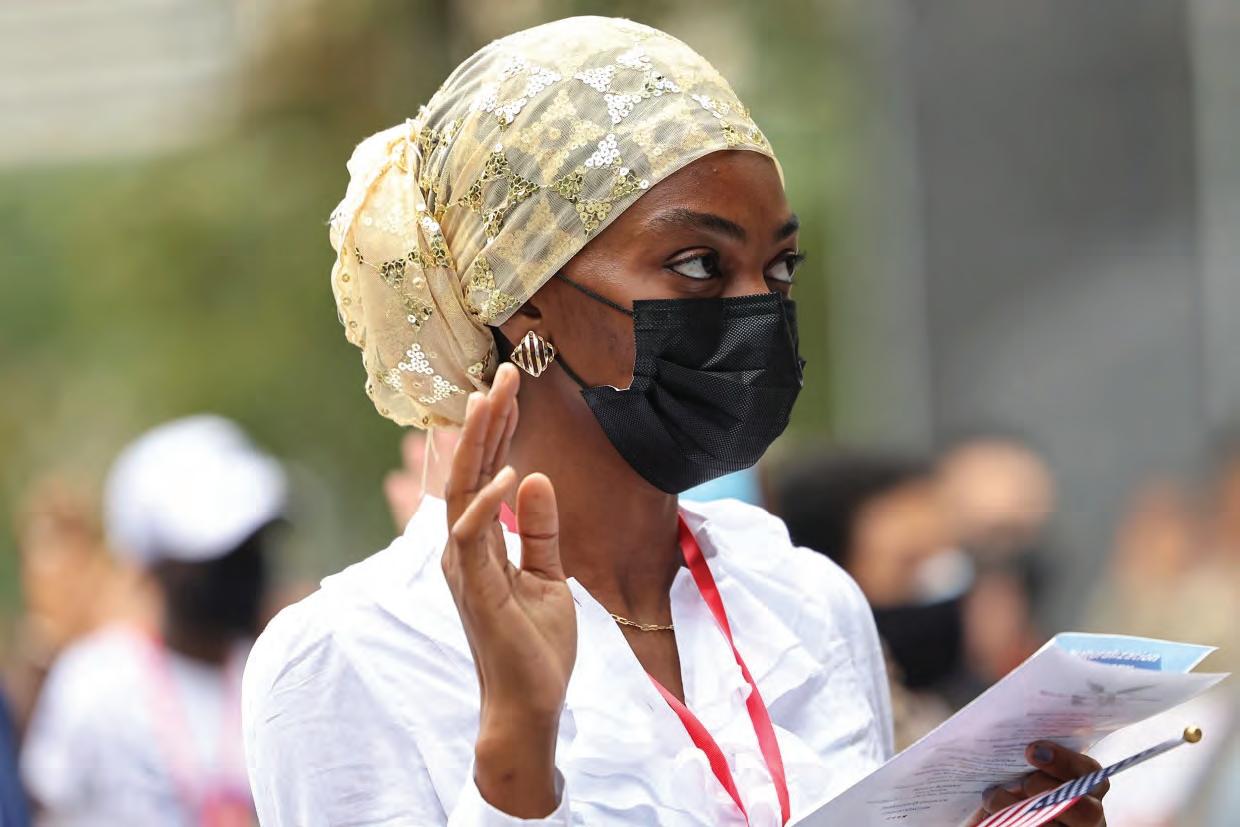
The African-American population, consisting of those whose families are third-generation American or longer, is predicted to grow 29% between 2020 and 2060. In that same duration, Black immigrants are expected to grow by 90%. This means that in less than 40 years, foreign-born Blacks will make up about a third of the national Black population, outpacing U.S.-born Blacks in population growth.
Immigration across the board has gone up since the 1980s and that has been attributed to the redesign of U.S. policy toward refugees, undocumented immigrants, temporary immigrants,
40 March-April 2023 DAWN www.africabusinessassociation.org
Aisha Mohammed, originally from Ghana, takes the oath of allegiance during a naturalization ceremony on Sept. 17 in New York City. Michael M. Santiago / Getty Images file
REPORT: L Makeup1 o
Development
LedbyAfricans,ImmigrantsNow ofEvery10BlacksinAmerica
n-Smith
and those gaining permanent status under the Immigration and Nationality Act and the Immigration Reform and Control Act.
Additional research further shows that Black immigrants experience the same racial adversity as U.S.-born Blacks. They experience the same skin-based discrimination, are less likely to own a home than or to live beyond the poverty line when compared to white immigrants.
Forbes suggests it might be worse. While Black immigrants may experience a similar amount of over-policing and incarceration as American-born Blacks, they also have to worry about accent bias and being deported.
Abraham Paulos, the Deputy Director of Policy and Communications for the Black Alliance for Just Immigration, told NBC News that his company exists to fight that same racism, criminalization, and the threat of deportation that seems to shadow many Black immigrants.
His Brooklyn-based nonprofit also “advocates for temporary protected status, which is granted to foreign-born individuals unable to return to their country of origin because of circumstances such as civil war or environmental disasters.”
Paulos said his battle is two-fold, “We fight for two things: racial justice and migrant rights …We fight for Black people.”
Despite racial divides that Black immigrants might experience, white-skinned Americans and immigrants displaying bigotry based on their dark skin, this robust population, specifically those from Africa, oftentimes finds themselves in conflict with Black Americans. Experts associate the negative opinions about each other embedded in internalized racism.
“I think there can be a lack of understanding from both ends,” Fieven Amare, a second-generation Eritrean-American, explained to psychologist Adaobi C. Iheduru in his 2012 doctoral dissertation. “Many Black Americans feel that Africans who
migrate to America have a superiority complex and feel the need to delineate the differences among us.”
Phillip Gay, a former professor of sociology at San Diego State University said in the Los Angeles Times that he believes some of the division is based on the disconnect Blacks have from Africa
“The overwhelming majority of Black Americans are, at the very least, six or seven generations culturally removed from Africa,” Gay stated. “They speak no African language. Their religious beliefs and practices are non-African. Their daily cuisine is non-African. Their marital and family structures are typically non-African. They have no relatives in Africa, and they have never themselves been to Africa.”
Perhaps, though the assessment was made in 1989, that is it in a nutshell. The stripping of Africa from African-Americans has created a divide that at least on the surface level prevents people of the diaspora from recognizing their sameness.
Jennifer V. Jackson and Mary E. Cothran in their study about the social distance within the relationships between Africans, AfricanAmericans, and African-Caribbeans, write that even though these groups while in the U.S. have “similar interracial struggles that create some semblance of common bonds, they fail to appreciate their common heritage” and have participated in derogatory messaging about each other because they believe “myths, misconceptions, ignorance, and stereotypes” propagated by white supremacy. Blackness, particularly in terms of nationality and ethnicity, is complicated and defined by nuances. Still, though not a monolith, Black Americans and Black immigrants are connected by the color of their skin and common struggles.
https://atlantablackstar.com/2022/02/25/reportled-by-africans-immigrants-now-make-up-1-ofevery-10-blacks-in-america/
41 March-April 2023 DAWN www.africabusinessassociation.org
Development Designer Brands and Pensole Lewis College of Business & Design Unveil JEMS by PENSOLE, One of the First Black-Owned U.S. Footwear Factories
By Designer Brands Inc.

DESIGNER BRANDS INC., one of the world's largest designers, producers and retailers of footwear and accessories, today unveiled the newest milestone achieved together with Pensole Lewis College of Business & Design – the ribbon-cutting of JEMS by PENSOLE, located in Somersworth, New Hampshire, as one of the first Black-owned footwear factories in the United States.
The development and opening of the factory represent the culmination of Designer Brands' $2 million investment into advancing action-oriented Diversity, Equity & Inclusion through its partnership with Detroit-based PLC, the first and only Historically Black College & University (HBCU) in Michigan and the first HBCU with a focus on design. Dr. D'Wayne Edwards, legendary footwear designer and President of PLC, will serve as the first designer to create a collection of shoes to be released by the factory. LeCrown Shoes Industry Co., LTD with decades of footwear development experience has also invested $1 million.
"JEMS by PENSOLE's opening marks a major achievement in improving representation by people of color in the footwear and design industries," said Bill Jordan, President of Designer Brands. "We are excited to see the initial shoe designs brought to life by PLC graduates in the new factory, with the future products to be sold exclusively at DSW stores. By honoring the legacy of Black entrepreneurs, we aim to inspire future designers by providing a powerful path for
educational, career and retail success. When we work to advance diversity in the world of fashion brands, our business succeeds and everyone wins."
"JEMS by PENSOLE is a firm step for promising careers for Black leaders in footwear, who as a group represent less than five percent across all design industries," said Dr. Edwards. "With our factory now open, we'll quickly advance PLC graduates to training for product pre-production all the way to creation of our first sneakers. Our partnership with Designer Brands and DSW makes all this possible and celebrates Black business innovators in important and meaningful ways."
JEMS stands for "Jan Ernst Matzeliger Studio" – itself named in honor of the Black footwear pioneer who in 1883 received a patent that revolutionized footwear manufacturing, a
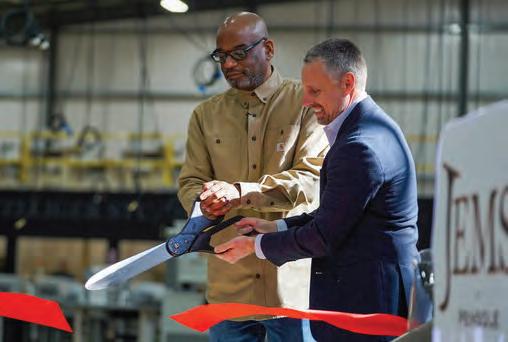
42 March-April 2023 DAWN www.africabusinessassociation.org
Dr. D'Wayne Edwards, president of Pensole Lewis College of Business & Design and Bill Jordan, president of Designer Brands Inc (NYSE: DBI) officially open the new JEMS by PENSOLE shoe factory.
process that inspired methods the industry still uses today.
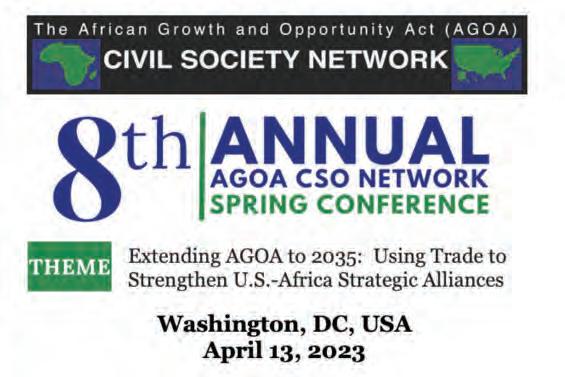
About Designer Brands
Designer Brands is one of the world's largest designers, producers and retailers of the most recognizable footwear brands and accessories, transforming and defining the footwear industry by inspiring self-expression across every facet of its enterprise. Through its portfolio of world-class owned brands, led by the industry-setting Vince Camuto brand, Designer Brands delivers on-trend footwear and accessories through its robust directto-consumer omni-channel infrastructure, featuring a billion-dollar digital commerce business and nearly 650 stores across the U.S. and Canada. Its retailing operations under the DSW Designer Shoe Warehouse and The Shoe Company banners deliver current, in-line footwear and accessories from most of the largest national brands in the industry and hold leading market share positions in key product categories across Women's, Men's and Kid's in the U.S. and Canada. Designer Brands also distributes its owned brands through select wholesale relationships while leveraging its design and sourcing expertise to build private label
product for national retailers. Designer Brands is also committed to being a difference maker in the world, taking steps forward to advance diversity, equity, and inclusion in the footwear industry and supporting our global community and the health of our planet through donating more than six million pairs of shoes to the global non-profit Soles4Souls. More information can be found at www.designerbrands.com.
About Pensole Lewis College of Business and Design (PLC)
Pensole Lewis College of Business & Design is the pipeline for career education and professional development in the design industry. We are the source for creative vision and progress; bearing the torch to push the culture forward — beyond what's visible. At Pensole Lewis College, we offer a new path to break into the world of product creation. We prepare the largest talent pool of designers to enter the industry empowering them to make it better for the next generation, leaving our industry better than when we entered it. For more information, please visit www.pensolelewiscollege.com.
https://www.prnewswire.com/news-releases/ designer-brandsjoins-pensole-lewiscollege-of-business-design-for-ribboncutting-of-jems-bypensole-one-of-thefirst-black-ownedus-footwear-factories-301776520. html
43 March-April 2023 DAWN www.africabusinessassociation.org Register Here
SolarPanelsFloatingonReservoirsCould ProvideaThirdoftheWorld’sElectricity
By Edd Gent
SOLAR POWER IS GOING to play a major role in combating climate change, but it requires huge amounts of land. Floating solar panels on top of reservoirs could provide up to a third of the world’s electricity without taking up extra space, and also save trillions of gallons of water from evaporating.

So called “floating photovoltaic” systems have a lot going for them. The surface of reservoirs can’t be used for much else, so it’s comparatively cheap real estate, and it also frees up land for other important purposes. And because these bodies of water are designed to service major urban centers, they’re normally close to where the power will be needed, making electricity distribution simpler.
By shielding the water from the sun, floating solar panels can also significantly reduce evaporation, which can be a major concern in the hot dry climates where solar works best. And what evaporation does occur can actually help to cool the panels, which operate more efficiently at lower temperatures and therefore squeeze out extra power.
Just how promising the approach could be had remained unclear, as so far analyses had been limited to individual countries or regions. A new study in Nature Sustainability has now provided a comprehensive assessment of the global potential of floating solar power, finding that it could provide between a fifth and half of the world’s electricity needs while saving 26 trillion gallons of water from evaporating.
The new research was made possible by combining several databases mapping reservoirs around the world. This allowed the researchers to identify a total of 114,555 water bodies with a total area of 556,111 square kilometers (214,716 square miles).
They then used a model developed at the US Department of Energy’s Sandia National Laboratory that can simulate solar panel performance in different climatic conditions. Finally, they used regional hydrology simulations to predict how much the solar panels would reduce evaporation based on local climate data.
In their baseline study, the researchers assumed that solar panels would only cover 30% of a reservoir’s surface, or 30 square kilometers (11.6 square miles), depending on which is lower. This was done to take into account the practical difficulties of building larger arrays and also the potential ecological impact of completely covering up the body of water.
Given these limitations, the researchers
44 March-April 2023 DAWN www.africabusinessassociation.org
-
Development
an opportunity
Visit thegrio.com/heroes to cast your nominations for TheGrio Heroes 2023!
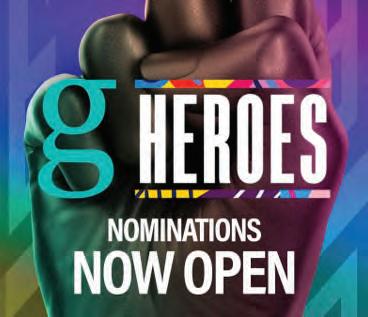

TheGrio Heroes are about the everyday Black heroes in our world dedicated to the community and the culture. Some have been working unheralded for years, and others are emerging. They are all determined to significantly impact our communities and humanity.
TheGrio Heroes have demonstrated outstanding goodwill and achievements for the benefit and welfare of Black people, leading by example through service and finding solutions with compassion, dedication, and determination. Tell us about the people in your community who impact and change lives every day and our distinguished panel of judges will select the top heroes to win special prizes and promote their mission across all theGrio channels and platforms. More information about TheGrio Heroes, including eligibility and frequently asked questions, can be found at https://thegrio.com/heroes.
Submissions will be accepted through May 1, 2023 at 11:59PM ET
calculated that the global generating potential for floating solar panels was a massive 9,434 terawatthours a year, which is roughly 40 percent of the 22,848 terawatt-hours the world consumes yearly, according to the International Energy Agency’s latest figures.
If the total coverage was limited to a much more reasonable 10%, the researchers found floating solar power could still generate as much as 4,356 terawatt-hours a year. And if the largest reservoirs were allowed to have up to 50 square kilometers (19 square miles) of panels then the total capacity rose to 11,012 terawatt-hours, almost half of global electricity needs.
The authors note that this capacity isn’t evenly distributed, and some countries stand to gain more than others. With more than 25,000 reservoirs, the US has the most to gain and could generate 1,911 terawatt-hours a year, almost half its total consumption. China, India, and Brazil could also source a significant amount of their power this way.
But most interestingly, the analysis showed that
as many as 6,256 cities could theoretically meet all of their electricity demands with floating solar power. Most have a population below 50,000, but as many as 150 are cities with more than a million people.
It’s important to note that this study was simply assessing the potential of the idea. Floating solar panels have been around for some time, but they are more expensive to deploy than land-based panels, and there are significant concerns about what kind of impact blocking out sunlight could have on reservoir ecosystems.
But given the need to rapidly scale up renewable energy generation, and the scarcity of land for large solar installations, turning our reservoirs into power stations could prove to be a smart idea.
https://singularityhub.com/2023/03/20/solarpanels-floating-on-reservoirs-could-provide-athird-of-global-energy
Image credit: Jagran
45 March-April 2023 DAWN www.africabusinessassociation.org
Leading from Within: How ALX is Creating a New Generation of Problem Solvers in Ethiopia
By ALX
HOW DOES A YOUNG MAN from rural Ethiopia, raised in poverty, become the Chief Technology Officer of a new startup? It is when talent meets opportunity, access and exposure – three elements that ALX is extending to a wave of young people across Africa.
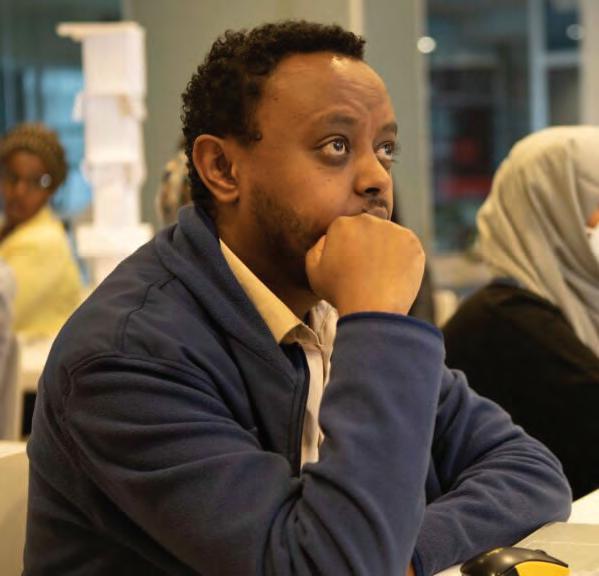
While the rest of the world is rapidly evolving towards highly digitised societies, Africa has an open road ahead for how it wants to shape the future of the continent. With 70% of the African population under the age of thirty, the future is being crafted as we speak. ALX has dared to step outside of the status quo of aid dependency to solve local problems. Instead, it is owning Africa’s setbacks by looking inwards and creating a generation of leaders and problem solvers.
Activating Africa’s youth with the skills necessary to compete in today’s growing digital society is necessary to propel the continent into a prosperous future. ALX is trailblazing this transformation by developing skills for the fourth industrial revolution, such as software engineering, data science and cloud development, and through The ROOM – its community of top tech talent.
Humans, unlike any other species, can innovate and consciously modify the environment in which we live. We have evolved from hunting and gathering societies to postindustrial societies, more commonly known as the information technology age. This has shaped, and continues to reshape, how we do business, consume news, food, music, etc. Production is increasingly becoming highly automated and more digitised, changing the type of workforce in demand. Today’s digital transformation, or the fourth industrial revolution, is demanding digital, tech and analytics skills. ALX in Ethiopia is training and equipping young Ethiopians with these in-demand skills of the future.
Some of our recent graduates share the impact of their training with ALX, and what it means to be part of The ROOM’s lifelong talent community, below.
The Self-taught Computer Whizz
Dawit Hagos is a 28-year-old Software Engineer in the bustling city of Addis Ababa, where he is the CTO of a booming SaaS company. Born into humble and rocky beginnings in rural Desse, Dawit’s first exposure to computers was at the local photocopy and printing shop. There, he would play with the computers, study the commands, and make games out of troubleshooting until eventually, at 12 years old, the shop owner was calling on him to fix the computers when issues would arise. One day, an NGO that allowed people in the area to use computers connected to the internet for two
46 March-April 2023 DAWN www.africabusinessassociation.org Development
|
Dawit Hagos’ Story
hours per day came into town. That was the first time Dawit explored the world wide web from the hillsides of Desse.
“In 10th grade I took my first formal IT class, but funny enough, I hated it! We were learning things at a very slow pace. For instance, we would learn how to ‘copy’ one day, then how to ‘paste’ the following day. There were about 3 to 4 of us sharing one computer; I wasn’t challenged at all. I was really into spy movies where computer gurus would sit behind computers coding or decoding something, and often thought to myself, ‘That’s exactly what I want to do.’ I was fascinated by how they could understand the computer’s language and how they had the power to command the computer to do as they wished. To me, that was magical,” he said.
Years down the line, Dawit ended up moving to the capital, Addis Ababa, and had a series of jobs before landing a job as a high school IT teacher. “I would often go outside of the curriculum and try to get the students into software engineering, and not just cutting or bolding text. Eventually, I established an extracurricular club called GreenCode, where I taught the students programming. I wanted to teach them about modern technology and equip them with what they would need when they went out into the real world for employment or to work on projects of their own,” he explained.
impressive achievement, he simply replied: “I feel like I am just getting started.” He has ambitions of starting his own company that focuses on solving societal problems.
“Some of the greatest entrepreneurs in the world are sitting here on this continent and the only thing they need is someone to believe in them,” said Fred Swaniker, founder of ALX and The ROOM. Dawit is one of many young people who combined their talent and drive with the opportunity, access and exposure ALX provided to untap their potential and work towards solving problems in society.
Software Engineering: The Art of Problem Solving | Yosef Ayele’s Story
“Some of the greatest entrepreneurs in the world are sitting here on this continent and the only thing they need is someone to believe in th em.” –
Fred Swaniker
As a self-taught IT professional, Dawit got his first laptop at the age of 22. He would go to internet cafes to fetch and download instrumental PDFs and study them offline. After he left his teaching job, he took a series of contract jobs developing several platforms, landing pages etc. and teaching himself along the way. When he learned about the ALX SE programme in a Telegram advertisement a friend shared with him, he harnessed the opportunity to get formal training, and has been climbing the ladder of success ever since.
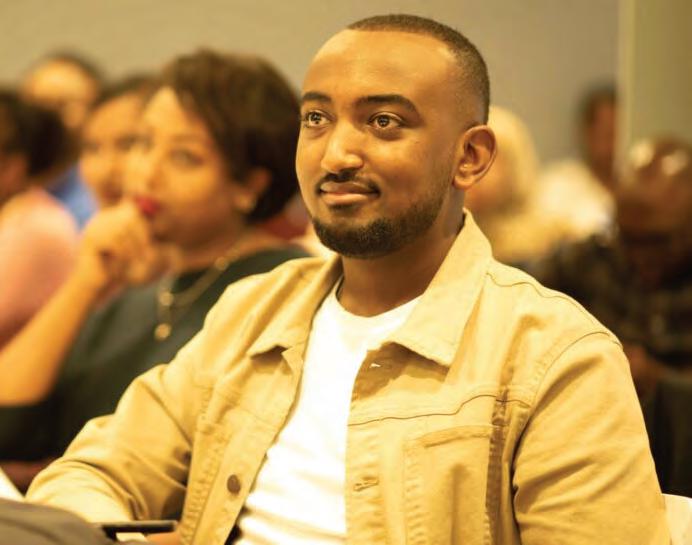
Dawit is now the CTO of BeU Delivery, the fastest food delivery service in the country with an average of 60,000+ orders per month, creating over 300 jobs thus far. Asked about his thoughts on this
Yosef Ayele is another Software Engineer who catapulted himself into an upward trajectory by pairing his own motivation with the tools that the SE programme at ALX equipped him with. “Software engineering is more of a mentality than it is coding,” said Yosef. “Problem solving skills are more important than the ability to purely write code. ALX created a habit loop of researching, learning, then applying” he shared. In that loop, debugging is an area that the SE programme prioritised.
“Coding isn’t an art that flows organically. Problems are bound to occur, and we should expect them to. Facing a new problem is a good thing because you’re both learning something new as well as learning a new solution. It would take me all day to understand what one error message
see page 48
47 March-April 2023 DAWN www.africabusinessassociation.org
Problem Solving Generation from page 47
meant, but I learned several new things in that process. Then I started building a log of errors which helped me solve issues more quickly in the future” explained Yosef.
The SE programme is a project-based course that incorporates a minimum of two group projects per sprint. With the groups consisting of students across Africa, it has allowed for people in different countries to build connections across boundaries, share their experiences, and gain exposure to other country’s challenges and successes. “That, combined with the deadline-driven projects, created a time crunch mentality that pushed us to code at a high-level, international standard. Learning to write code is one thing, but writing code that is readable by any software engineer anywhere in the world for the purpose of maintenance and building is another thing entirely. Engineers who can do that are the ones you want on your team,” explained Yosef.
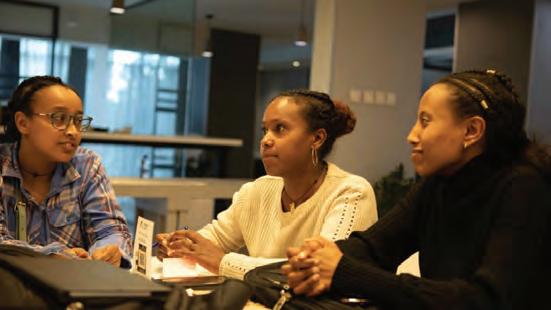
fintech company. “I don’t want us to be a cashbased society any longer. As long as you have a smartphone, you should be able to move money around. I don’t even think we need to go through spending unnecessary resources and capital on the debit card system. We can remove the cost of producing cards and scanning machinery and have 100% digital payments,” said Yosef.
Practice Made Her Perfect
| Kalkidan Berta’s Story
“Problem solving skills are more important than the ability to purely write code. ALX created a habit loop of researching, learning, then applying… That, combined with the deadline-driven projects, created a time crunch mentality that pushed us to code at a high-level, international standard.“ –
Yosef Ayele
The ALX SE programme strives to blur the barriers between academic life and work life. When Yosef began the SE programme, he was working as an intern with the Orange Digital Center in the ICT park in Addis Ababa. He was tasked with building a mobile application that transcribes Amharic voice into text. “I had to dig through lots of documents to understand how to tackle this project with my partner. I handled the language processing and modelling side of things while she handled the android interface part,” he explained. To develop the language processing and modelling, he used the same language that he was learning in the ALX programme – the C programme language. “I was learning through ALX and applying what I was learning at my internship. We successfully built the application and submitted the project to the Ministry of Innovation and Technology (MiNT)”. In the future, Yosef plans to start his own
Kalkidan Berta is another ALX SE programme graduate who elevated her career path. “ALX definitely enhanced my software engineering skills by providing structure around learning software development methods and providing ample practice to thoroughly absorb the modules,” she said. “I studied Computer Science in college, and there wasn’t much time in between learning the modules and being tested on them. What I love about ALX is that we are given several tasks to practise and apply the modules,” she explained.
“ALX definitely enhanced my software engineering skills by providing structure around learning software development methods and providing ample practice to thoroughly absorb the modules.” – Kalkidan Berta
When Kalkidan began the SE programme, she was working in the job creation department of the local municipality doing basic data entry, but yearning to do more, earn more, and apply more of herself. Today, she’s a software developer for a growing digital banking platform in a positive and challenging work environment with dreams of starting her own SaaS company one day. She credits ALX for encouraging her to set a goal and
48 March-April 2023 DAWN www.africabusinessassociation.org Development
CLOSING THE GAP
Making up less than 4% of tech roles, Black professionals are highly unrepresented in the industry; thus, leaving them with fewer avenues toward success in their careers. Identifying the need for increased representation and access to resources, The Executive Leadership Council (ELC) has created a unique development opportunity for and by Black tech professionals.
The ELC and Google have collaborated to present DECODED 2.0, an immersive three-day boot camp designed specifically for Black tech professionals.
The event will host in-person events at Google Locations across the following cities and dates:
• Cohort 1: FULL
• Cohort 2:Virtual: June 6-8 (Optional InPerson Experience in Atlanta)
• Cohort 3:Virtual: August 8-10 (Optional InPerson Experience in Chicago)
The ELC invites new and experienced professionals, entrepreneurs, and practitioners across various sectors to build, connect and unlock new pathways for Black people in the world of tech!
WHAT TO EXPECT
All cohorts will experience 12 hours of live virtual instructor-led sessions, 3 hours of insightful 1-on1 coaching with an ICF-certified professional, the opportunity to engage fireside chats with Black senior executives at Google, and much more.
Aside from developmental aspects, the boot camp will facilitate urgent dialogue around the themes of racial bias, inequities, and collective approaches to addressing the needs of Black professionals in tech.
DECODED 2.0 is a golden opportunity for Black tech professionals to equip themselves with the necessary tools for developing their personal brands in the industry while securing the future of rising professionals.
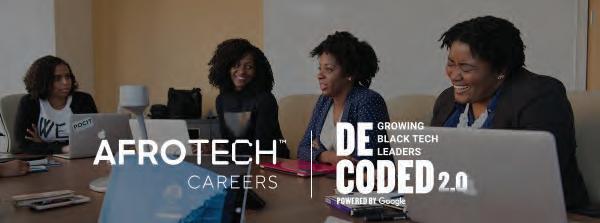
REGISTRATION
The deadline to register for DECODED 2.0 is June 8, 2023. To learn more about conference fees, schedule, and special guests click HERE.
go after it relentlessly. “Anyone can apply to this programme. Seventy hours a week may seem like a lot, but while you’re doing the projects, time flies by. If you’re someone who likes solving problems, then this is a fun programme to be in, and I highly recommend it!” said Kalkidan.
“Never doubt that a small group of thoughtful committed leaders can change the world; indeed, it’s the only thing that ever will,” said American anthropologist Margaret Mead. With all of the
untapped talent that lies in Ethiopia and throughout the African continent, ALX is knocking down barriers in building the future of talent, cultivating a generation of young people who are harnessing the opportunities of the digital age and creating ripple effects that will drive prosperity for many generations to come.
https://www.alxafrica.com/leading-from-within-alxethiopia/
Image credit: ALX
49 March-April 2023 DAWN www.africabusinessassociation.org
MacKenzie Scott to Give Away $250M in Funding to Small Nonprofits
By Amanda L. Cole
MACKENZIE SCOTT’S Yield Giving will provide 250 $1 million unrestricted operating gifts to small nonprofits. The application process is now open, with awardees expected to be announced early next year. Scott will also provide $500 gifts through her donor-advised fund for each eligible applicant that satisfactorily completes the required peer-review step of the process.
Acknowledging the disproportionate amount of giving going to larger organizations, Scott’s open call, announced this week, aims to reach smaller nonprofits with the greatest need and access to the fewest foundational resources and opportunities.
Lever for Change, a nonprofit affiliate of the John D. and Catherine T. MacArthur Foundation that has influenced more than $1 billion in grants to 145 organizations, is managing the effort.
"This Open Call is designed to empower and strengthen communities across the United States that are often overlooked," Cecilia Conrad, CEO of Lever for Change, said in a statement. "We are looking for organizations that are making a meaningful difference in people’s lives. The awards will recognize teams that demonstrate the potential to make progress toward reducing disparities in health, education, economic outcomes, and other critical issues."
This is the first time Scott is seeking direct input from nonprofits. Her team previously researched potential nonprofit awardees quietly. Her gifts were only made public when nonprofits announced them — that is until she released a database to improve transparency around her giving, which has totaled more than $14 billion since 2020.
The internal research on Scott’s end was done, in part, to limit the burden on the organizations she sought to fund. While the open call application is required to be considered for her upcoming round of $1 million unrestricted gifts, there is no financial or narrative reporting required after receiving the
award. Scott has become known to do her due diligence up front and then trust the organization to make the best decision for how the money is spent.
“We are excited to be partnering with Lever for Change to create this new pathway to support for organizations making positive change in their communities,” Scott said in a statement. “Teams on the front lines of challenges have insights no one else can offer, so there are three big headlines here in my heart: Community changemakers can nominate themselves. Community changemakers get feedback from their peers. Community changemakers have a powerful role in funding decisions.”
Open Call Eligibility and Guidelines
U.S. nonprofits and territories with an annual operating budget ranging from $1 million to $5 million in at least two of the past four fiscal years are eligible to apply. However, organizations, as well as affiliates of those organizations, that previously received gifts from Scott are not eligible. Organizations also must have been in existence for at least three years and do 90% of their work within the U.S. and its territories.
Organizations will be judged based on a predetermined scoring process that aims to reduce assessment bias. The scoring rubric focuses on equity, track record, community leadership and team capacity.
Scott is aiming to benefit organizations whose mission aids in improving individuals, families and communities by providing access to healthcare, affordable housing, education, job training and employment, asset ownership or civic engagement. Those in need may include people who are:
From marginalized, historically oppressed racial and ethnic groups.
Immigrants and migrants.
Development 50 March-April 2023 DAWN www.africabusinessassociation.org
Affected by justice system involvement.
Survivors of crime, abuse, conflict, war and/or disasters.
LGBTQ.
From marginalized gender identities.
Disabled.
Income-constrained.
Experiencing poverty in areas with low economic mobility and access to supporting resources.
In its frequently asked questions, Yield Giving cautioned that the strongest applicants will be organizations providing its constituents with services, resources and opportunities that allow them to substantially improve their wellbeing.

“Organizations that work primarily to meet community members’ basic needs, including providing food, clothing, shortterm emergency relief, and/or temporary shelter are unlikely to be a good fit for this Open Call,” according to Yield Giving.
Open Call Timeline
May 5, 2023. Interested nonprofits must complete a short, approximately 15-minute registration process by May 5 at 4 p.m. CDT.
June 12, 2023. Interested nonprofits must submit an application, which Yield Giving estimates could take 10 hours or more, by June 12 at 4 p.m. CDT. The application includes succinct descriptions of the nonprofit’s work; community; approach; team; community involvement; diversity, equity and inclusion; impact projection; and more. It also requires a 90-second or shorter video and a financial picture, including an audited financial statement.
June to July 2023. Submitted applications will be reviewed to confirm eligibility.
July to August 2023. Other applicants will be required to score five fellow applicants, but for each organization satisfactorily completing those
assessments, Scott will recommend a $500 donoradvised fund contribution.

September to October 2023. An external evaluation panel consisting of consultants, educators, foundation staff, among others, will evaluate the top 1,000 peer-reviewed finalists this fall. Each application will receive at least five assessments.
November to February 2024. Scott and her team will select up to 250 awardees from among the highest rated.
March 2024. The awards will be announced.
Find Yield Giving’s Open Call registration and application here
https://www.nonprofitpro.com/article/mackenziescott-to-give-away-250m-in-funding-to-small-no nprofits/#ne=4a21b9167bf658408191e7c4914 0a9aa&utm_source=nonprofit-pro-today&utm_ medium=newsletter&utm_campaign=2023-03-23
Image credit: childrensdefense.org
51 March-April 2023 DAWN www.africabusinessassociation.org
Cory Booker Wants to Empower a New Generation of Black Farmers
By Ashia Aubourg
IN 1920, NEARLY 1 MILLION Black farmers existed in the U.S., making up about 14% of the national farming community. Today, less than 2% remain. But Sen. Cory Booker from New Jersey hopes to change all that with the Black Farmers Act of 2023.
The legislation, a press release explained, will tackle discriminatory practices within the USDA while aiming to protect current Black farmers and pave the way for future Black growers.
The act was first introduced in 2020 by Booker and later introduced again in 2021. Unfortunately, both bills did not get implemented. The legislation is likely to become a part of the 2023 Farm Bill, according to TriplePundit, which is up for negotiation this year. (The Farm Bill is a patchwork of policies that impacts all aspects of the food that lands on our plates. The Black Farmers Act of 2023 will likely represent a massive piece of the racial equity work that desperately needs addressing.)
Booker shared in a press release, “There is a direct connection between discriminatory USDA policies and the enormous land loss we have seen among Black farmers over the past century.”
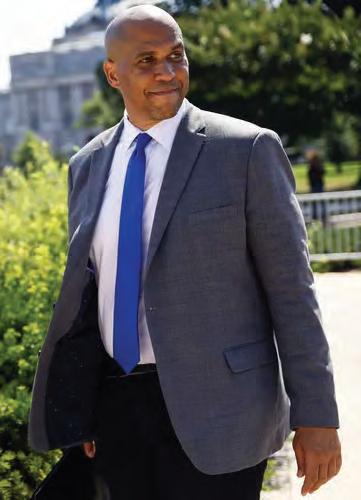
To combat this, The Black Farmers Act of 2023 contains seven priorities: end discrimination in the USDA, a federal department that has been sued for racial discrimination, predatory lending, and other unfair practices; protect Black farmers from land loss; restore land base lost by Black farmers; create a Farm Conservation Corps; empower nonprofits who serve Black farmers; assist all socially disadvantaged farmers and ranchers; and enact widespread system reform.
The Oklahoma Black Historical Research Project, Inc (OBHRPI) shared with Food & Wine, it endorsed
the Black Farmers Act of 2021, as it is entirely too familiar with racist actions toward Black farmers.
“As an advocate for Black farms and through all of the discrimination and things that have happened to Black farmers, this was what I thought was going to be an equitable way to help farmers sustain equity and sustainability on their farms, as well as a pathway to the future for them in farming,” Willard Tillman, executive director at OBHRPI, said.
While there is still a long road ahead for achieving justice for Black farmers, the committee supporting the legislation remains hopeful. Senator Booker will be joined by lawmakers Kirsten Gillibrand, Tina Smith, Reverend Raphael Warnock, Elizabeth Warren, Bernie Sanders, and Richard Blumenthal on the act. Senator Booker added, “I am proud to reintroduce this landmark legislation alongside my colleagues as we work to right these wrongs and empower a new generation of Black farmers.”
52 March-April 2023 DAWN www.africabusinessassociation.org Agriculture
climate/ Image credit: Yting Shen/Bloomberg via Getty Images
https://www.wired.com/story/crispr-gene-editing-
Panuka Farm Passes its Greatest Corporate Litmus Test: Hosting the Vice President of the United StatesKamala Devi Harris
 By Panuka Farm April 2, 2023
By Panuka Farm April 2, 2023
YESTERDAY, THE 1ST OF APRIL 2023, we passed the greatest litmust test of our corporate existence. We hosted the U.S Vice President Kamala Devi Harris at Panuka Farm. Our CEO, one Mr Panuka welcomed the U.S Vice President and led her through the farm tour and other engagements. She was at the farm for a straight 2 hours (not 10 minutes), which was certainly a lions share of her visit to Zambia.
Much as the visit to Panuka Farm was tagged as a private visit, her visit was part of her schedule for the week-long trip to Africa (Ghana, Tanzania, and Zambia). Her focus on this trip was economic development, climate change, food security, and a rising youth population.
The name of the Farm, "Panuka," is a Tonga word that means being clever, innovative, and open to knew ideas. In other Zambian local languages, Panuka means Galamukani (east), Salapuka(north), and Shapuka (west). So the U.S. Vice President basically came to appreciate the "Panuka" concept of the farm. Hope those who have been flooding social media wondering why she visited such a tiny farm and not large commercial farms can appreciate this nuance.
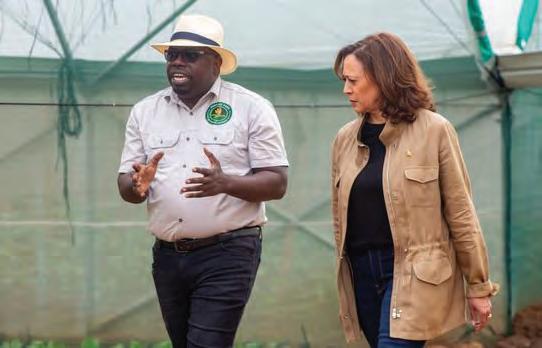
In his other life, our CEO, one Mr Panuka is a practising international environmental finance expert working in the biodiversity conservation and climate change finance space. Panuka Farm
see page 54
53 March-April 2023 DAWN www.africabusinessassociation.org Agriculture
Panuka Farm from page 53
is thus his "laboratory" to test and showcase the practical side of what green finance practitioners discuss in air-conditioned boardrooms.
You may be aware that in December 2021, Zambia was selected as eligible for the development of the Second Compact by the Millennium Challenge Corporation (MCC), a United States of America Government Agency. The MCC Compact is a grant program that supports investments aimed at reducing poverty through economic growth in select developing countries. In 2018, Zambia completed the implementation of the first Compact that facilitated investments of US $355 million in water, sanitation, and drainage infrastructure in select areas of the city of Lusaka.
MCC and the Zambian Government have since commenced work towards the development of the second Compact. Agriculture and agro processing have been identified as the growth path to Zambia’s growth, and the following three binding constraints to economic growth and poverty reduction have been prioritised by the Government of Zambia:
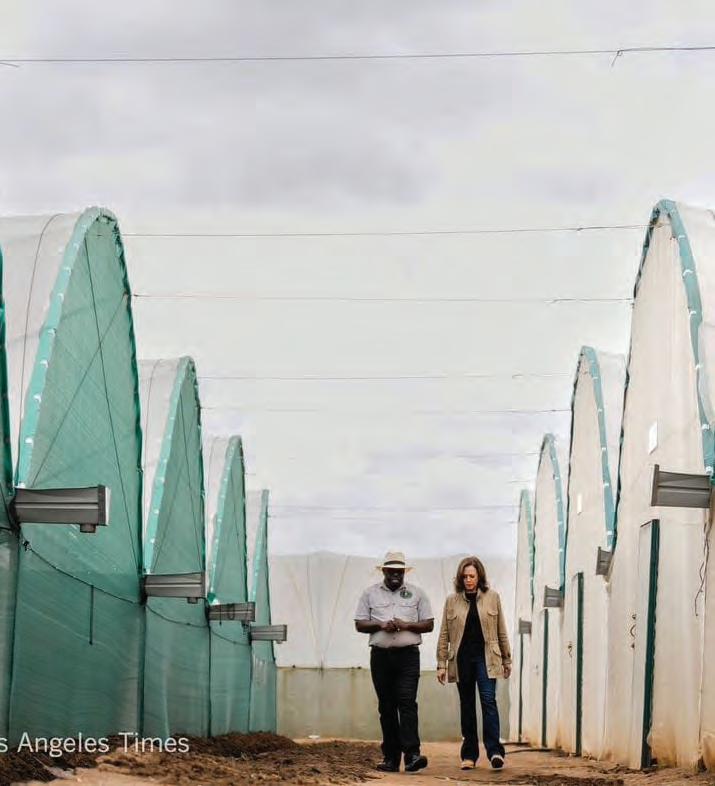
1. Agriculture inputs and policies
2. Poor Roads and Transport
3. Low access and reliability of power
And so, in hosting the U.S. Vice President, Panuka Farm was merely being a good corporate ambassador to our motherland, Zambia. Our CEO, Mr Panuka has on two occasions met with the Millenium Challenge Corporation team from Washington DC helping Zambia to prepare for this new Compact. As he took the U.S. Vice President around the farm yesterday, he showcased some of the ideas on how best to structure the programme, and she liked what she saw at our farm. Please follow this link to see my historical engagements related to the new Millenium Challenge Compact.
The U.S. Vice President 's interest in Panuka Farm was thus centred around the farm's environmental and social footprint and seeing how best to design and structure agricultural interventions in the US7Bn funding package she announced. She also wanted to appreciate how to practically climate proof emerging farming enterprises.
To fully appreciate why we were the host as a tiny farming enterprise and not the large farms which
some "key board worriers" felt were perhaps more deserving than us, we would implore you to read on two concepts i.e the "Food-Water-Energy" Nexus as well as what is called "ESG Integration" Nexus into a farming enterprise. This will help dust off some intellectual "cobwebs" and make the key board worriers fully appreciate why she came to see this little farm. So here are a few insights in relation to these two concepts:
1. Food Security and Deforestation Nexus
Zambia is reported to be losing around 300,000 ha of forests per annum, and the leading driver is agriculture. In the quest to increase yield, most farmers have resolved to land extensification by cutting more trees to create new fields. That unfortunately exacerbates deforestation. She was thus interested to see how an emerging farmer can farm commercially in a small space without the need to cut more trees as a proxy to increase yields. We are one of the main suppliers of Shoprite on sweet pepper and english cucumbers , yet our production area for these two crops is barely under 7,000 square metres which is less than a hectare (10,000 sqm). Of course, we have some open field production, but she was particularly interested in the productivity of our greenhouse and shadenet production.
2. Water Nexus
54 March-April 2023 DAWN www.africabusinessassociation.org
Agriculture
We demonstrated how efficient our water use is from a combination of drip irrigation, the use of gravity, and our ongoing project towards rain water harvesting from the roofs of our greenhouse complex.
3. Energy Nexus
We demonstrated that an emerging farming enterprise can be run completely offgrid. We have been running our enterprise 100% on solar since 2017. You may recall that yesterday we had a heavy cloud cover, which offered us an opportunity to show her that solar intermittency is exaggerated. Our irrigation systems remained functional despite the heavy cloud cover that we witnessed yesterday.
4. Social Footprint Nexus
We run a 6 months graduate trainee programme where we train fresh graduates from agricultural colleges and universities as part of our corporate social responsibility. The graduates from our second cohort graduated last month in March 2023. 95% of our workforce are also sourced from the surrounding villages. Other than our CEO, the rest of the Panuka management team are youths, and she met and talked to each of them. The Panuka Farm CEO is so proud of the team for the hard work. Glad to proud such kind of exposure to our youth and our employees.
Hope this write-up helps to put into context the
U.S. Vice President's visit to our tiny farm. It is our sincere hope that we were good ambassadors to all.
To our corporate friends, apologies that you were not physically invited to this event. It was tagged as a private event with heavy security. We could not also tell you in advance due to its nature.
Thanks a lot to the U.S. Embassy Zambia for believing in us as a team to host the U.S. Vice President. Such a huge honour. Our collaboration with the Zambia National Service (ZNS) to fix the roads was also a huge milestone that has left an indelible benefit to the local community.
Zambia Police and all other security wings in Zambia were exemplary.
The precision of the White House team, especially the press, was mind-blowing. We will, on another day, talk about lessons on how to prepare for such events and the lessons we got from the event.
This write-up would be incomplete if we didn't mention how mind-blowing the operations of the Secret Service was. There are no details for obvious reasons, but all we can say is that some staff you watch on movies are not an exaggeration.
The icing on the cake was that Mr Panuka's office was actually designated as her holding room for the various onsite briefings after each activity run. Literally, his office was out of bounds for about 48 hours.
We hope this event helps others to realise that it's not about size but the quality and uniqueness of what you do that will provide you with an opportunity to dine with global icons.
Thanks a lot also to our corporate brand kingpins and queenpins HotPrints Limited and Clear Advertising Zambia for all the great work in the branding us.
It felt so good to be alive yesterday, thanks to God for the blessing of life, intellect, and tenacity to rise to the big stage without flinching.
https://www.facebook.com/Panukafarms/ Image credit: Panuka Farm, Los Angeles Times
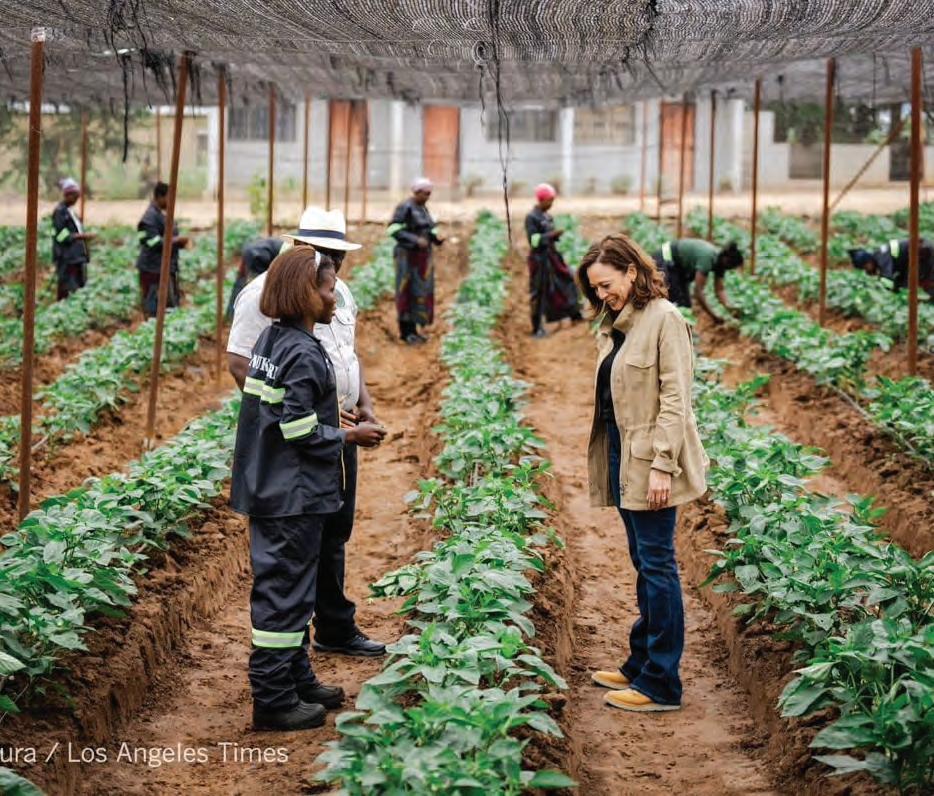
55 March-April 2023 DAWN www.africabusinessassociation.org
President Azali Assoumani of the Union of Comoros, Takes Over as the New Chairperson of the African Union (AU) for 2023
Press Release
THE HEADS OF STATE and Government of the African Union (AU) have elected H.E Azali Assoumani, President of the Union of Comoros, as the new Chairperson of the African Union for the year 2023. The event took place on, Saturday 18 February 2023 during the official opening of the Thirty-Sixth (36th) Ordinary Session of the Assembly of the Union, holding at the AU Headquarters in Addis Ababa.
President Azali of Comoros, is taking over the baton of command from H.E. Macky Sall, President of the Republic of Senegal, who has concluded today his term as the Chairperson of the African Union for the year 2022. The symbolic ceremony took place in the presence of the Chairperson of the AU Commission, H.E. Moussa Faki Mahamat, the Deputy Chairperson of the AUC, H.E Dr. Monique Nsanzabaganwa, Secretary General of the United Nations (UN), representatives of the Regional Economic Commission, dignitaries and invited guests as well as the AU staff.
The composition of the new bureau of the Assembly of the Heads of State and Government of the African Union for 2023 as presented by the Dean of the Permanent Representative Committee (PRC) is as follows:
1. Chairperson of the African Union (AU) – H.E Azali Assoumani Union of Comoros (East African region)
2. First Vice Chair of the Union – (Northern Region), consultations are still ongoing;
3. Second Vice Chair of the Union – Republic of Botswana, (Southern Region);
4. Third Vice Chair of the Union – Republic of Burundi, (Central Region); and
5. Rapporteur – Republic of Senegal – (West African region);
In his handing over speech, President Macky Sall, wished the new AU Chairperson, a successful Chairmanship and thanked the Heads of States of AU Member States as well as the AU outgoing bureau, for their support during the tenure of his mandate which he said, was marked by the prevailing sanitary crisis caused by the COVID19 pandemic. President Sall highlighted some of the achievements under his chairmanship of the Union notably, the economic empowerment of the women and youths, the enhancement of democracy and good governance, among other development programs under Agenda 2063.
The outgoing Chair of the Union thanked the AUC Chairperson, H.E Moussa Faki Mahamat for his leadership and support, including all the members of the Commission. “Serving our continent has been a privilege and a great pride, because I believe in a united Africa, an Africa standing up, an Africa at work, an Africa in peace and confident in its future”. Underlined President Macky Sall. Adding that, this has made him to be more determine and even more motivated, “at the front of the fight for
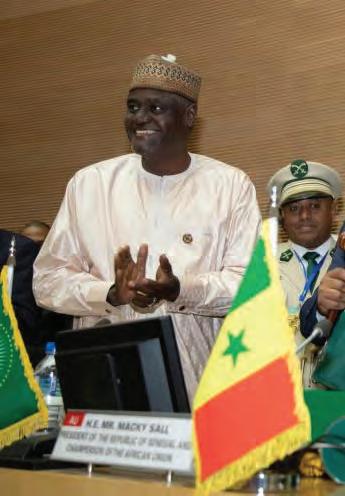
56 March-April 2023 DAWN www.africabusinessassociation.org Governance
(Left) H.E Azali Assoumani and (Far R
Africa, everywhere, for everything and all the time; because it is the responsibility conferred on us by the heritage of the pan-Africanism, to realize the dream of the Founding Fathers and the aspirations of our peoples”. Concluded President Sall.
In his acceptance speech, President Azali Assoumani said he appreciates the honor coupled with the responsibility and the trust invested in his person, and the members of the new Bureau, to lead the destiny of the Organization for the next one year., “I thank you and assure you of our commitment to work together with all member countries in the exercise of our mandate” indicated the incoming Chair of the Union. “I pay tribute to the founding fathers of the Organization. Six decades later, their luminous vision continues to inspire our living together and to illuminate our united march towards the ideal of African integration” He added.
President Azali Assoumani further stated that, it is with great emotion, thanking the members of the Bureau of the African Union who have just done a great honor to his country, the Union of the Comoros, by “entrusting in Comoros for the first time in its history, the destinies of our continental Organization”. He also thanked colleagues, brothers and sisters from the countries of East Africa for having supported his candidature for this noble function and more particularly “My Dear Brother, President William RUTO who had the elegance to withdraw the candidacy of his beautiful country, Kenya, for this position, which today allows the historic accession of the Union of
the Comoros to this noble function. By allowing the Union of the Comoros to lead the African continent, our Organization has just proved to the world its conviction that all countries have the same rights and enjoy the same freedoms”. Underscored the incoming Chair of the Union. “Thus, in succeeding, in this sacred place, to my brother President Macky SALL, as current President of the African Union, it is with the weight of the continental responsibility on my shoulders, that I intend to assume, as of today, the functions of President of the African Union, in this 36th Ordinary Session.
“It will not be easy to succeed him, but I will do my best to continue his work and, among other things, by favoring as he has always been able to do, dialogue, listening and gathering, essential conditions to make this mandate, that of the success of our Continent” Concluded the newly elected Chair of the Union.
About the African Union:
The African Union spearheads Africa’s development and integration in close collaboration with African Union Member States, the Regional Economic Communities and African citizens.
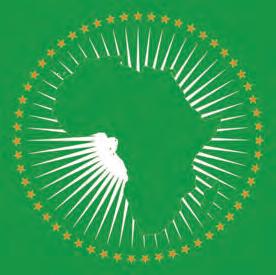
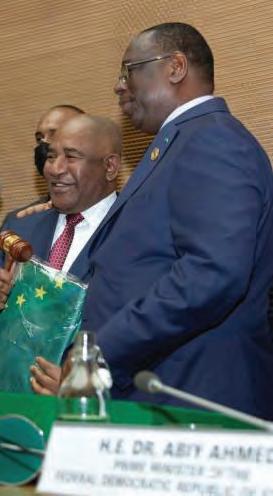
The AU Vision is to accelerate progress towards an integrated, prosperous and inclusive Africa, at peace with itself, playing a dynamic role in the continental and global arena, effectively driven by an accountable, efficient and responsive Commission.
https://au.int/en/pressreleases/20230218/ president-azali-assoumani-union-comoros-takesover-new-chairperson

Press Release: https://au.int/sites/default/files/ pressreleases/42653-pr-PR-_ELECTION_OF_ NEW_AU_BUREAU_006-3.pdf
Image credit: Pinterest
57 March-April 2023 DAWN www.africabusinessassociation.org
Right) ” President Macky Sall
BOLA AHMED TINUBU has emerged the winner of a closely fought contest for Nigeria’s presidency. But who is the man who will lead Africa’s largest economy – as well as inherit its plethora of economic and security crises?
Tinubu, who turns 71 later this month, was governor in Lagos between 1999 and 2007, where he is credited with pioneering reforms that led to transformation of the state, now Nigeria’s economic hub.
He will become Nigeria’s fifth president since the country returned to democratic rule in 1999, emerging as winner for the country’s top job on his first attempt.
However, opposition parties have rejected the results and say they will challenge it in court. The election was marred by reports of voter suppression, and outbreaks of violence, particularly in Tinubu’s stronghold Lagos. Voters also faced lengthy delays and some election officials failed to turn up to polling stations.
Tinubu has gone from grass to grace after a
Who is Nig Bola Tinub
By Nimi Princewi
rocky start. He left Nigeria for the US to study in Chicago and was sometimes forced to wash dishes to make ends meet, according to the Bola Tinubu library.
Upon returning to Nigeria, Tinubu worked in the oil sector before venturing into politics. He was elected into the Nigerian senate in 1992 and served until the next year when the military seized power. He fled the country in 1994 after the prodemocracy group he co-founded failed to sway the military to relinquish power.
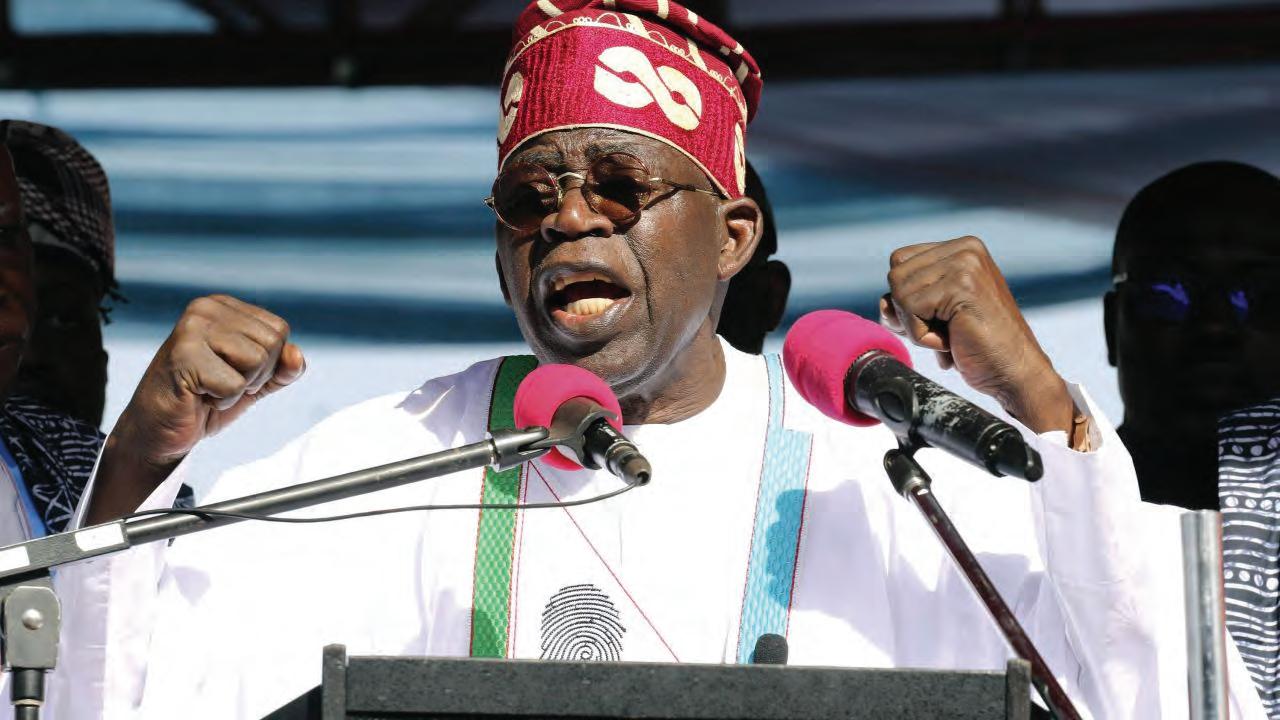
Known as ‘Jagaban’ – ‘warrior of warriors’ – by his followers, Tinubu has shackles emblazoned on his trademark woven caps, to symbolize a time he lost his freedom when he was forced into exile by the dictator Sani Abacha.
He returned to Nigeria after four years and was successful in his bid for the top job in Lagos following Nigeria’s return to democracy in 1999.
Corruption allegations
Tinubu was dogged by allegations of corruption
58 March-April 2023 DAWN www.africabusinessassociation.org Governance
Bola Ahmed Tinubu, Presidential candidate of the All Progressives Congress, Nigeria ruling party speaks during the flag off campaign ahead of the 2023 Presidential election in Jos, Nigeria, Tuesday, Nov. 15, 2022. (AP Photo/Emmanuel Osodi)
geria’s new President-elect bu?
ill and Stephanie Busar
throughout the campaign trail which he strongly denies. Tinubu is enormously wealthy and he has interests in many sectors including real estate and media.
He once had a bullion van at his home in an affluent area of Lagos during the 2019 elections. “I keep money wherever I want,” Tinubu said in response.
Critics say he did not convincingly address concerns about his health, and, at times, appeared confused and incoherent on the campaign trail. He also made gaffes that have made him the butt of jokes and viral memes on social media.
Tinubu was also criticized for abstaining from presidential debates and delegating questions about his manifesto to members of his team during a recent outing at the UK think tank Chatham House.
A practicing Muslim like his predecessor, Muhammadu Buhari, Tinubu has six children and is married to Oluremi Tinubu, a senator in Lagos.
During his acceptance speech, Tinubu joked that his wife would no longer be heading back to the senate as she would now be his “housewife and First Lady.” It was a joke that has not gone down with many Nigerian women, who still struggle to gain foothold in politics.
Now he has to get on with the serious task of uniting a country fractured along religious, ethnic and generational lines as well as a host of problems including insecurity, an economy on the brink of collapse, as well as fuel, cash and power shortages.
He will also have to work hard to shake off the association with the ruling party, under which many Nigerians have suffered untold hardships.
“I am not the party,” he said during the campaign.
“My track record should speak for me.”
‘My turn to be president’
His supporters call Tinubu a master strategist and ‘king of the long game’ who has been planning his ascent to the throne for years.
“He didn’t just become a governor of a major state like Lagos, he also built a succession plan. He used his clout and enormous resources to build leaders and establish political influence, first in the southwest … and then extended to the north of Nigeria,” says Nigerian political analyst Sam Amadi.
Tinubu wields significant influence in the southwest where he is seen as a political godfather and kingmaker. He has handpicked every Lagos governor since since leaving office in 2007 and was instrumental in the election of Buhari to the presidency on his fourth attempt in 2015.
After decades as a political puppet master, Tinubu declared it was now his turn to emerge from the shadows into the presidency; his campaign slogan was “Emi Lokan,” which translates to “it is my turn,” in his native Yoruba language.
Tinubu was essentially calling in the favor with the slogan, explains Amadi.
“Nigerian politics is an arrangement, it’s turn by turn…. Buhari could get all the votes in the north but he couldn’t get two-third majority of votes anywhere in the south, and Tinubu turned the southwest to him. This tells us that there’s a sense in which Nigerian politicians feel that access to power is an entitlement … what they think they deserve because of investment of finance or investment of goodwill that they’ve put into the system,” Amadi said.
https://www.cnn.com/2023/03/01/africa/bolatinubu-nigeria-profile-intl/index.html
59 March-April 2023 DAWN www.africabusinessassociation.org
Africa Gears up to Keep More of the Profits from Lithium Boom
By Clara Denina and Wendell Roelf
LITHIUM-RICH AFRICAN COUNTRIES
, including Zimbabwe and Namibia, are trying to develop processing and refining industries to capture more of the profits of global demand for the battery material.
As the auto industry shifts towards electric vehicles (EVs) - spurred by proposed bans on fossil-fuel cars beginning at the end of the decade - lithium prices and demand have soared.
China, the world's top lithium refiner and a leading producer dominates the supply chain, but Western governments and international companies are trying to challenge that and see Africa's lithium reserves as an opportunity.
For their part, African countries are determined to retain more of the value of their resources than they have in the past, which means not just mining them but processing them before export, which economically is referred to as beneficiation.
"We are saying to ourselves, if you have got the
minerals that everybody wants now, you need to make sure that at least you probably mine those minerals differently and not in the usual manner," Namibia's Mines Minister Tom Alweendo told Reuters in an interview at the Investing in African Mining Indaba in Cape Town.
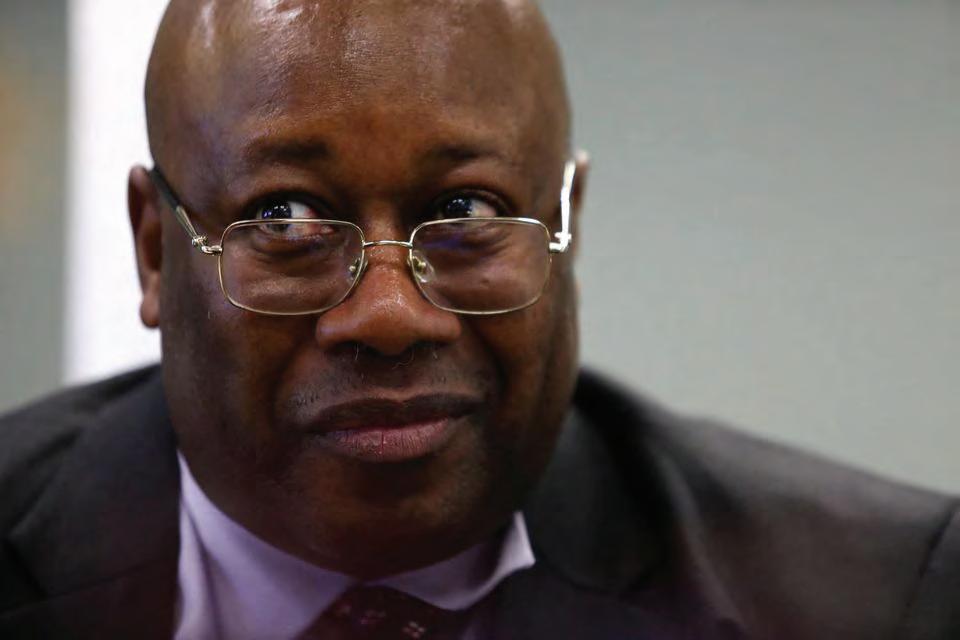
"We are going to insist that all lithium mined within the country has to be processed in the country." Africa's lithium production is set to rapidly increase this decade. From 40,000 tonnes this year, the continent will likely produce 497,000 tonnes in 2030, commodities trader Trafigura estimates, with the bulk of that coming from Zimbabwe.
Prices for lithium more than doubled last year as demand from the electric vehicle industry outstripped supply.
Zimbabwe in December imposed a ban on raw lithium exports, a measure aimed at stopping the smuggling of lithium ore and spurring mines to process in the country.
"We made plans to only allow the export of concentrates," the country's Mining Minister Winston Chitando told Reuters. "Because of the ban, other investors have come in wanting to mop up lithium ores and develop them to concentrate stage."
'POISON OF GREED'
Governance
DAWN www.africabusinessassociation.org
60 March-April 2023
Zimbabwe Mines Minister Winston Chitando speaks to Reuters at the Investing in African Mining Indaba 2023 conference in Cape Town, South Africa, February 8, 2023. REUTERS/Shelley Christians/File Photo
Mining has often been linked to the exploitation of workers or environmental degradation by foreign powers. In his visit to Democratic Republic of Congo, Pope Francis at the end of January condemned the "poison of greed" for mineral resources that has exacerbated conflict in the country's east.
The latest effort by African governments is far from the first time they have resolved to retain more of the value of their mineral wealth, which ultimately should boost tax revenue, encourage new businesses and add jobs.
The global transition away from fossil fuels is giving a sense of urgency, although many obstacles remain, notably insufficient electricity supply.
As companies and investors around the world focus on goals to reduce carbon emissions and increase supplies of the minerals that should help, companies and investors are reconsidering projects they may have previously overlooked.
"These are really unique times we are living in, with this whole transition to a clean energy future and Ghana could be part of this story," Len Kolff, interim Chief Executive O fficer at Atlantic Lithium , said.
The company's Ewoyaa mine project is set to be the first lithium producer in the West African country. U.S. firm Piedmont Lithium has signed a deal to get 50% of the lithium produced.
"Everybody's approaching us, like the whole who's who on the Chinese list and now it's all the Western OEMs [original equipment manufacturers]," Kolff said.
In Mali, Leo Lithium's Goulamina mine plans to take advantage of high prices to export two 30,000-tonne shipments of lithium ore by the end of this year, managing director Simon Hay said.
The proceeds would help to develop the project to allow domestic processing, Hay said, with first production expected in the middle of next year to be sent to China's Ganfeng Lithium.
($1 = 0.9319 euros)
https://www.reuters.com/markets/commodities/ africa-gears-up-keep-more-profits-lithiumboom-2023-02-09
See related story on page 32, 108
Nations Reach Accord to Protect Marine Life on High Seas
 By Christina Larson and Patrick Whittle
By Christina Larson and Patrick Whittle
FOR THE FIRST TIME, United Nations members have agreed on a unified treaty to protect biodiversity in the high seas - representing a turning point for vast stretches of the planet where conservation has previously been hampered by a confusing patchwork of laws.
The U.N. Convention on the Law of the Sea came into force in 1994, before marine biodiversity was a well-established concept. The treaty agreement concluded two weeks of talks in New York.
An updated framework to protect marine life in the regions outside national boundary waters, known as the high seas, had been in discussions for more than 20 years, but previous efforts to reach an agreement had repeatedly stalled. The unified agreement treaty, which applies to nearly
see page 62
DAWN www.africabusinessassociation.org 61 March-April 2023
F h b t c c c w a Y t k f r u Governance
A sea turtle swims over corals on Moore Reef in Gunggandji Sea Country off the coast of Queensland in eastern Australia on Nov. 13, 2022 (AP Photo/Sam McNeil, File)
High Seas Treaty from page 61
half the planet’s surface, was reached recently.
“We only really have two major global commons — the atmosphere and the oceans,” said Georgetown marine biologist Rebecca Helm. While the oceans may draw less attention, “protecting this half of earth’s surface is absolutely critical to the health of our planet.”
Nichola Clark, an oceans expert at the Pew Charitable Trusts who observed the talks in New York, called the long-awaited treaty text “a oncein-a-generation opportunity to protect the oceans — a major win for biodiversity.”
The treaty will create a new body to manage conservation of ocean life and establish marine protected areas in the high seas. And Clark said that’s critical to achieve the U.N. Biodiversity Conference’s recent pledge to protect 30% of the planet’s waters, as well as its land, for conservation.
Treaty negotiations initially were anticipated to conclude Friday, but stretched through the night and deep into Saturday. The crafting of the treaty, which at times looked in jeopardy, represents “a historic and overwhelming success for international marine protection,” said Steffi Lemke, Germany’s environment minister.
“For the first time, we are getting a binding agreement for the high seas, which until now have hardly been protected,” Lemke said. “Comprehensive protection of endangered species and habitats is now finally possible on more than 40% of the Earth’s surface.”
The treaty also establishes ground rules for conducting environmental impact assessments for commercial activities in the oceans.
“It means all activities planned for the high seas need to be looked at, though not all will go through a full assessment,” said Jessica Battle, an oceans governance expert at the Worldwide Fund for Nature.
Several marine species — including dolphins, whales, sea turtles and many fish — make long annual migrations, crossing national borders and the high seas. Efforts to protect them, along with human communities that rely on fishing or tourism related to marine life, have long proven difficult for international governing bodies.
“This treaty will help to knit together the different regional treaties to be able to address threats and concerns across species’ ranges,” Battle said.
That protection also helps coastal biodiversity and economies, said Gladys Martínez de Lemos, executive director of the nonprofit Interamerican Association for Environmental Defense focusing on environmental issues across Latin America.
“Governments have taken an important step that strengthens the legal protection of two-thirds of the ocean and with it marine biodiversity and the livelihoods of coastal communities,” she said.
The question now is how well the ambitious treaty will be implemented.
Formal adoption also remains outstanding, with numerous conservationists and environmental groups vowing to watch closely.
The high seas have long suffered exploitation due to commercial fishing and mining, as well as pollution from chemicals and plastics. The new agreement is about “acknowledging that the ocean is not a limitless resource, and it requires global cooperation to use the ocean sustainably,” Rutgers University biologist Malin Pinsky said.
https://apnews.com/article/un-oceans-biodiversitytreaty-0b024fa07e8c1947236d8b8491ebf92c

62 March=April 2023 DAWN www.africabusinessassociation.org Governance
Guiana dolphins swim in Guanabara Bay, in Rio de Janeiro, Brazil, July 15, 2022 (AP Photo/Sam McNeil, File)
UN Announces New Grant to Boost Women’s Participation in Global Peace Operations
THE ZAMBIA POLICE FORCE is set to receive nearly $1 million to boost women’s participation in global peace operations, a UN Women-hosted trust fund announced recently.
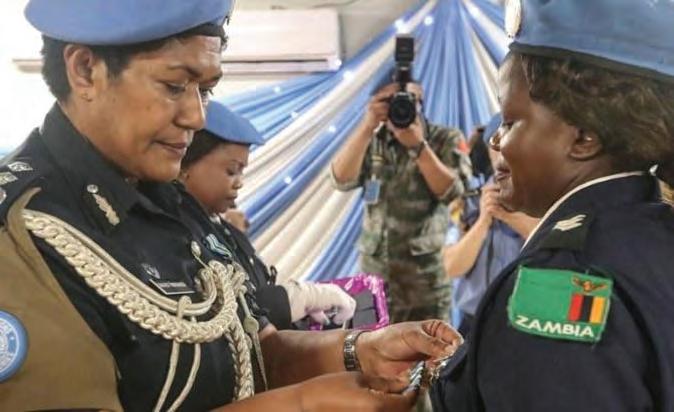
“My Command appreciates the recognition of female officers as a catalyst of systematic change within the Zambia Police Service,” said the Inspector General of Police Lemmy Kajoba. “We take our role in driving policy reforms very seriously, ensuring gender mainstreaming and accountability for gender equality and women’s empowerment within our institution.”
The new project aims to help overcome existing gender barriers to women’s participation in UN peace operations, supported by a $932,072 grant from the Elsie Initiatives for Uniformed Women in
Peace Operation and in line with Security Council efforts, including its landmark resolution 1325 (2000). The Zambia project envisions creating a roster of more than 100 women elected to deploy as peacekeepers.
Canada established it in 2019 to level the peacekeeping playing field and help to meet UN gender parity targets; the fund partners with national authorities and UN operations in the area.
The partners work with the UN Development Programme (UNDP), which implements various projects in Zambia.
hhttps://www.amazonswatchmagazine.com/ happenings/un-announces-new-grant-to-boostwomens-participation-in-global-peace-operations/
63 March=April 2023 DAWN www.africabusinessassociation.org
Governance
About the Permanent Forum on People of African Descent
By UN Office of the High Commissioner for Human Rights
ON 2 AUGUST 2021, the General Assembly adopted its resolution 75/314, in which it formally operationalized the Permanent Forum as "a consultative mechanism for people of African descent and other relevant stakeholders as a platform for improving the safety and quality of life and livelihoods of people of African descent, as well as an advisory body to the Human Rights Council, in line with the programme of activities for the implementation of the International Decade for People of African Descent and in close coordination with existing mechanisms".
The General Assembly had earlier decided, in its resolution 69/16 of 18 November 2014 entitled "Programme of activities for the implementation of the International Decade for People of African Descent" to establish such a body.
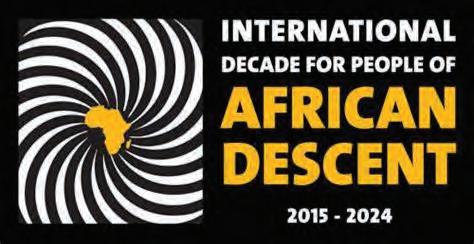
The first session of the Permanent Forum on People of African Descent (PFPAD) was held from 5 to 8 December 2022, in Geneva.
PFPAD2
The Office of the United Nations High Commissioner for Human Rights (OHCHR) is pleased to announce that the second session of the Permanent Forum on People of African Descent will take place from 30 May to 2 June 2023 at the United Nations Headquarters in New York, United States of America.
Important follow up meetings will be held at the UN in New York City during PFPAD2, the Forum's rapidly approaching 2nd Session.
Delegates will take the opportunity again, to learn and contribute crucial information on how to ensure justice, dignity, self determination, and full reparations for people of African ancestry, leveraging the human rights global to local framework. Plans are underway to explore the rich history of Black cultural influences/African peoples' significant contributions to NY (and the world) while there. ICSWG members and allies, whether onsite or virtually, will again supplement the main PFPAD schedule and agenda with invaluable "side event" formal discussions, to connect and envision the future we as people of African descent / ancestry want and deserve.
Registration to participate
All stakeholders advancing the rights of people of African descent are welcome to participate in the second session of the Permanent Forum. Member States, United Nations specialized agencies and bodies, national human rights institutions, equality bodies, civil society representatives, and organizations of people of African descent are especially invited to attend and contribute to the discussions.
All
individuals must register in advance to participate. Please register here
Please be advised that registration to participate in the second session of the Permanent Forum on People of African descent does not entitle participants to receive any financial assistance.
Call for inputs
articipants to rec i eive any
OHCHR invites civil society actors, non-

DAWN www.africabusinessassociation.org Governance
64 March-April 2023 s r o e e t o
n
The ICSWG intends to continue to mobilize civil society as vigorously as possible to ensure continued engagement with the PFPAD and the advancement of our goals via the PFPAD.
Nigeria has Launched a $672 Million Fund for Startups After the Collapse of Three US Banks
By Faustine Ngila
NIGERIA HAS LAUNCHED a $672 million fund to support its tech startups amid the upheaval caused by the recent collapse of three key US banks.
The fund was launched on March 14 under the government’s Digital and Creative Enterprises Programme (DCEP). Its corpus will include $170 million in contributions from the African Development Bank (AfDB), $116 million from the Agence Francaise de Developpement, $70 million from the Islamic Development Bank, and $271 million from the country’s private sector. The government itself will provide $45 million.
Africa’s biggest economy has been the quickest in the continent to react to the crisis, aiming largely to reduce the dependence on startup funding from the US. The three now-defunct US-based lenders, Silicon Valley Bank (SVB), Silvergate Bank, and Signature Bank, had been supporting tech-focused venture capitalism in Africa. Their collapse spells a dark moment for that ecosystem.
Cushioning startups against collapse
Nigeria wants to cushion its startups against the kind of situation that Chipper Cash, a victim of the

governmental organizations, academics, experts on issues related to people of African descent, and all other relevant stakeholders to submit inputs on topics to be considered for discussion during the second session of the Permanent Forum on People of African Descent.
Written inputs should be sent in Word format to pfpad@un.org by 20 March 2023. Please see the call for inputs
What an excellent start! Yet the work continues... with important decisions on May30-June2. See you in New York!
https://www.ohchr.org/en/permanent-forum-peopleafrican-descent

fall of SVB and the bankruptcy of cryptocurrency exchange FTX, finds itself in. The battered fintech firm is now considering selling itself out.
Venture capital firm Y-Combinator has said the reduced cash flow since the fall of the US banks will hit more than 10,000 startups. Its president Garry Tan tweeted saying “30% of YC companies exposed through SVB can’t make payroll in the next 30 days.” The accelerator, which funds 80 African startups, has cut nearly 20% of its own workforce.
Nigeria’s new fund, which targets founders aged between 15 and 35, has, therefore, been created to help its tech industry avoid growth contractions.
AfDB’s funding is expected to attract direct investments in more than 200 tech startups in the west African nation and also provide non-financial services to some 450 small and medium digital technology enterprises.
For the second year running in 2022, Nigeria was Africa’s most funded country, with 180 startups receiving up to $976 million, almost 30% of the $3 billion the continent received.
https://qz.com/nigerias-launches-672-million-fund-forstartups-1850231603
Image credit: afdb.org
MANDATE: https://www.ohchr.org/en/permanent-forumpeople-african-descent/mandate
PFPAD background and 1st Session testimony: https://www.ohchr.org/en/events/forums/2022/1stsession-permanent-forum-people-african-descent
ICSWG Working Group report: https://ccrjustice. org/sites/default/files/attach/2023/02/International%20 Civil%20Society%20Working%20Group%20for%20 the%20Permanent%20Forum%20on%20People%20 of%20African%20Descent_0.pdf
International Decade for People of African Descent (2015-2024): https://www.unesco.org/en/decades/ people-african-descent
Image credit: UN News Centre
DAWN www.africabusinessassociation.org 65 March-April 2023
Governance
Launch of Reparations Commission in Illinois USA
By MG Media
THE ILLINOIS DEPARTMENT of Central Management Services (CMS) announced the launch of a website for the African DescentCitizens Reparations Commission (ADCRC). As part of the Economic Opportunity Bill, the ADCRC was established to bring an equity focus on African American communities and residents that have been disproportionally impacted by longstanding disinvestment due to direct and systemic repercussions of slavery.
The ADCRC has been tasked with developing and recommending measures to ensure equity, equality, and parity for African American descendants of slavery. As part of their scope, the Commission, authorized by 20 ILCS 405/405540, will be reviewing and recommending actions geared towards the preservation and growth of African American neighborhoods and communities. The Commission will be working to study and remedy enduring economic inequities through a series of outlined methods, including building and developing a vocational center for People of African Descent-Citizens, ensuring proportional economic representation in all State contracts, and creating and enforcement of an Illinois Slavery Era Disclosure Bill.
The ADCRC will educate the public about the subject of reparations through a series of public hearings and other engagement methods. To this end, the Commission has established a website, adcrc.illinois.gov, as the official repository of information about its goals and work. The site includes an overview of the ADCRC mission and governing statutes, the makeup of the Commission membership, educational resources referencing reparations work that is being spearheaded in other parts of the United States, and information about past and future meetings. The site will continue to evolve with the work of the ADCRC and provide information about multiple ways to engage with the
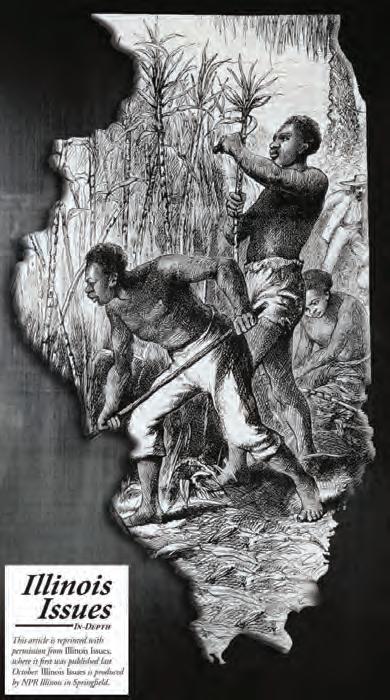

Commission and this pioneering work. This includes information about how to provide public comment at a future commission meeting and a registration form to be added to a distribution list for updates on the ADCRC’s work as well as upcoming events. "I am looking forward to the engaging and innovative work that will be done by the Commission to help remedy long-standing inequities in black communities across the state,” said ADCRC Commissioner and State Representative Sonya Harper (D-Chicago), “I encourage residents to follow along to learn and provide feedback as we figure out what reparations for descendants of slavery looks like in Illinois."
The ADCRC is actively seeking engagement throughout all areas of the State of Illinois and looking to expand. Illinois residents with education or background in reparations work, particularly African American descendants of slavery, are encouraged to apply for consideration to serve on the ADCRC, as resident voices play a vital role in promoting efficient, effective, and honest government.
For more information about Illinois' Boards and Commissions, including the ADCRC, eligibility requirements, and application process, interested individuals should visit appointments.illinois.gov. Information about the work of the ADCRC is available at adcrc.illinois.gov or you can contact Cathy Kwiatkowski at Cathy.Kwiatkowski@illinois. gov.
Image credit: npaper-wehaa.com
66 March-April 2023 DAWN www.africabusinessassociation.org Governance
U.S. Military Conducts First Maritime Drills with West African Forces
By Cooper Inveen
THE WEST AFRICAN TROOPS silently pulled their small boats up to a rust-stained ferry and swarmed up its sides on grappling hooks to disarm the mock kidnappers onboard.
The drill in Ghana's Volta river on Saturday was carried out during the first ever maritime exercises organised by the U.S. military under its long-running Flintlock programme to bolster the skills of West African forces.

The sea-based training in the first half of March culminated with soldiers holding their guns aloft as they braved neck-high waves before storming a beach resort to defuse a staged hostage crisis. Military bigwigs and diplomats watched from nearby.
Admiral Milton Sands, commander of the U.S. Special Operations Command for Africa (SOCAF), said the programme had expanded to help coastal nations in the region cope with maritime threats such as piracy and illegal fishing.
Unauthorised fishing "is a significant one that we're really trying to work with our partners to get our arms around slowing down," he told Reuters on Tuesday.
He said illegal fishing not only robbed the region of a key food source, but fuelled other criminal activity including drugs and human trafficking.
Around 350 troops took part in the drills including servicemen from Ivory Coast, Ghana and Nigeria on the Gulf of Guinea. The area has become a global piracy hotspot in recent years although cases have fallen there since 2021, according to the U.N. Security Council.
Illegal, unreported and unregulated (IUU) fishing has spread along West Africa's coasts, sapping an estimated $9.4 billion per year through illicit financial flows, according to a 2022 report by
the Financial Tr ansparency Coalition of nongovernmental organisations.
Of the top 10 companies they
found involved in IUU fishing in the region, eight were Chinese and a third of all vessels sported Chinese flags, it said.
Commodore Godwin Livinus Bessing, commander of Ghana's Naval Training Command, said tackling IUU fishing had become a top priority, citing a lack of resources to deal with the foreign boats stealing from Ghana's waters.
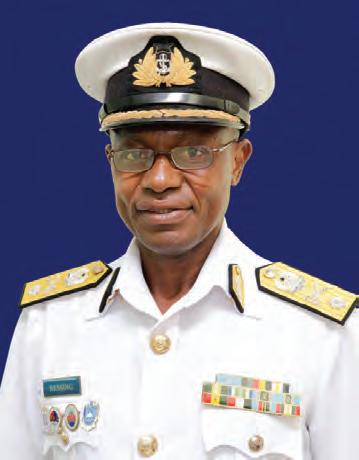
"They continue to flout our regulations because of our enforcement capabilities," he said. "That is one of the biggest problems. If we had enough ships out there and they knew we were monitoring the place, we would be able to curb the situation."
https://www.reuters.com/world/africa/us-militaryconducts-first-maritime-drills-with-west-africanforces-2023-03-16/
Image credit: navyonline.mil.gh
67 March-April 2023 DAWN www.africabusinessassociation.org
Governance
Commodore Godwin Livinus Bessing
Kamala Harris Starts Africa Tour in Ghana, Announces Security Aid
By Francis Kokoroko
THE UNITED STATES will provide $100 million to Ghana and four other West African countries to help them deal with violent extremism and instability, Vice President Kamala Harris said on Monday during a visit to Ghana.

Harris was in Accra at the start of a week-long, three-nation African tour, the latest in a series of visits by senior U.S. officials as Washington seeks to counter growing Chinese and Russian influence on the continent.
"President Biden and I have made clear the United States is strengthening our partnerships across the continent of Africa," she said during a joint news conference with Ghana's President Nana Akufo-Addo.
China has invested heavily in Africa in the last two decades, particularly in infrastructure, mining, timber and fishing, while Russian private military contractor Wagner Group is providing security assistance in several countries.
Akufo-Addo reiterated that he was concerned about Wagner's presence in West Africa.
"It raises the very real possibility ... that once again our continent is going to become the playground for great power conflict," he said, standing alongside Harris.
Several countries across West Africa and the Sahel region have been struggling to quell Islamist insurgencies that have caused humanitarian disasters and fuelled discontent -- contributing factors to military coups in Mali and Burkina Faso.
"We appreciate your leadership in response to recent democratic back-sliding in West Africa," Harris told Akufo-Addo.
"To help address the threats of violent extremism and instability, today I am pleased to announce $100 million in support of Benin, Ghana, Guinea, Cote d'Ivoire and Togo," she said.
That is in addition to $139 million in bilateral assistance that the United States intends to provide to Ghana in the fiscal year 2024, according to Harris's office.

LGBT RIGHTS
Harris was asked during the news conference whether she would be promoting LGBT rights during her tour, including in Ghana where a bill that would severely restrict those rights is going through parliament.
"I have raised this issue," Harris said, adding that
68 March-April 2023 DAWN www.africabusinessassociation.org Governance - Harris
U.S. Vice President Kamala Harris meets with Ghana's President Nana Akufo-Addo in Accra, Ghana March 27, 2023. REUTERS/ Francis Kokoroko
U.S. Vice President
Kamala Harris addresses the press in Accra, Ghana March 27, 2023.
REUTERS/Francis Kokoroko
she felt very strongly about supporting freedom and equality for all people, and that LGBT rights were a human rights issue.
Ghana's draft bill would make it a crime to be gay, bisexual or transgender. Gay sex is already punishable by up to three years in prison under Ghanaian law, though no one has been prosecuted in years.
The new bill would lengthen jail terms and force people to undergo "conversion therapy", practices intended to change their sexual orientation. Parliament held public hearings on the bill starting in 2021. It is unclear when it will be put to a vote.
Akufo-Addo responded to a question about the bill from a U.S. reporter by saying that it was not official government policy but rather had been put forward by legislators acting in a private capacity.
He also said the country's attorney-general had submitted views to a parliamentary committee examining the bill about "the constitutionality or otherwise of several of its provisions".
"My understanding ... is that substantial elements of the bill have already been modified as a result of the intervention of the attorney-general," he said, without giving details.
"I have no doubt that the parliament of Ghana will show as it has done in the past ... its sensitivity to human rights issues as well as to the feelings of our population, and will come out with a responsible response to the proposed legislation."
https://www.reuters.com/world/africa/usvice-president-harris-announce-139-mln-aidghana-2024-2023-03-27/

Video: https://www.msn.com/en-us/news/politics/ harris-husband-draped-in-kente-cloth-in-ghana/viAA19c5tx
Vice President Kamala Harris at State Banquet in Ghana
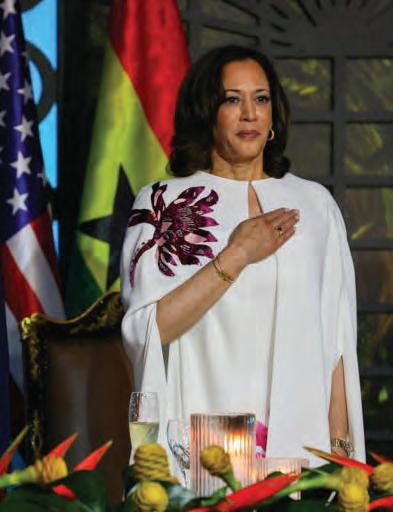
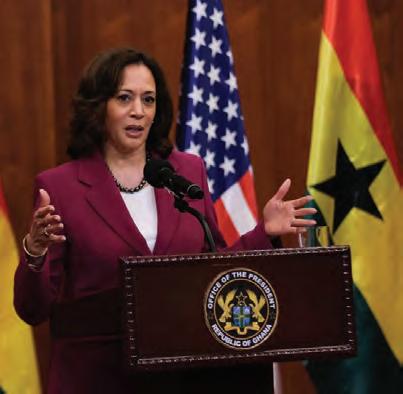
Story by Kristopher Fraser
ACCOMPANIED BY Ghana’s president Nana
Akufo-Addo, Vice President Kamala Harris attended a state banquet at the Jubilee House in Accra, Ghana, on Monday, wearing an ethereal ensemble.
In honor of her diplomatic visit, the vice president wore a custom Monique Lhuillier white gown with a matching white statement cape with an image of a purple flower on her right shoulder. Harris accessorized her look with a gold sequin clutch bag.
https://www.msn.com/en-us/lifestyle/lifestylebuzz/vice-president-kamala-harris-donscustom-monique-lhuillier-dress-at-statebanquet-in-ghana/ar-AA19bLPI
69 March-April 2023 DAWN www.africabusinessassociation.org
Kamala Harris Visits Ghana 'Slave Castle,' says 'History Mus
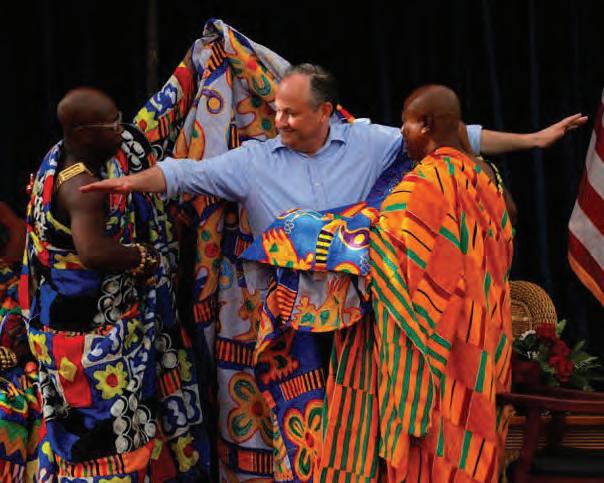
 By Cooper Inveen
By Cooper Inveen
U.S. VICE PRESIDENT KAMALA HARRIS delivered a speech to thousands of young Ghanaians on Tuesday in Accra on women's empowerment, and toured a coastal building that was the last stop for Africans sold into the transatlantic slave trade.
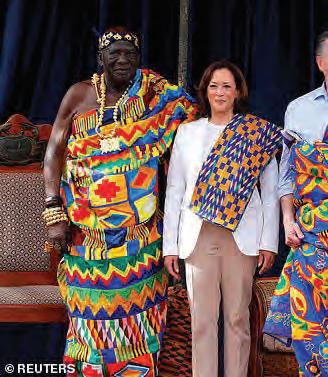
Harris used the stop to promise American partnership, exhort African nations to do more for women, and to speak about the importance of learning difficult history, in an apparent reference to recent Republican push to strike some lessons from U.S. classrooms.
In a speech in front of Black Star Gate, a monument built on the site where Ghana declared independence from Britain in 1957, Harris said that by the middle of the century, one in four people in the world will be African.

"That of course means what happens on this continent impacts the entire world," she said.
Citing examples such as the pioneering of mobile phone payments in Kenya or healthcare deliveries by drone in Rwanda before such services existed in the United States, Harris said innovation would be key to Africa's future success.
"We must invest in the African ingenuity and
creativity, which will unlock incredible economic growth and opportunities, not only for the people of the 54 countries that make up this diverse continent, but for the American people and people around the world," she said.
Harris underlined deep gender disparities in Africa, saying the United States would work alongside African partners to close those gaps.
"On the continent of Africa we know women grow a majority of the food, yet they are less likely to own the land they farm. They represent a majority of frontline healthcare workers, but face disparities in health outcomes," she said.
"Women are entrepreneurs, yet have limited
Governance - Harris 70 March-April 2023 DAWN www.africabusinessassociation.org
U.S. Vice President Harris leaves bouquet at Cape Coast slave castle
Kamala Harris hoff are draped they meet with Kwesi Atta II an Emintsimadze March 28, 2023
access to capital and markets. They are peacemakers and bridge builders, yet continue to be under-represented at the table where decisions are made."
To cheers, she said that the economic empowerment of women would benefit not only themselves but also their children, families, communities and the entire economy.
The U.S. can also partner on digital inclusion and good governance and democracy, Harris said. She described the latter as "a work in progress, including in my own country", an apparent allusion to the turbulence seen in U.S. politics and elections in recent years.
TOUR OF SLAVE CASTLE
Later, Harris and her husband, Doug Emhoff, toured a 17th-century slave fortress in Cape Coast, one of many coastal buildings active during the transatlantic slave trade that forcibly removed 12.5 million people, mainly from Central and
West Africa, and sent them to work across the Americas, Europe and the Caribbean.
She appeared moved during the tour, taking several deep breaths, according to a pool reporter traveling with her. She laid flowers in the female slave dungeon and went through the so-called "Door of no Return" where slaves were shipped out. Emhoff wiped his eyes, according to the pool reporter.
"Being here was -- was immensely powerful and moving, when we think about how human beings were treated by the hundreds of thousands in this very place that we now stand, the crimes that happened here, the blood that was shed here," Harris said from Cape Coast Castle.
"They came to this place of horror -- some to die, many to starve and be tortured, women to be raped -- before they were then forcibly taken on a journey thousands of miles from their home to be sold by so-called merchants and taken to the Americas, to the Caribbean to be an enslaved people."
Harris said the horror of what had happened there must be remembered. "It cannot be denied. It must be taught. History must be learned," she said.
Republican-led states, including Florida, Georgia and Texas, have enacted new laws to limit teaching about the role of racism in the United States.
https://www.msn.com/en-us/news/world/kamalaharris-visits-ghana-slave-castle-says-history-must-belearned/ar-AA19dOAN
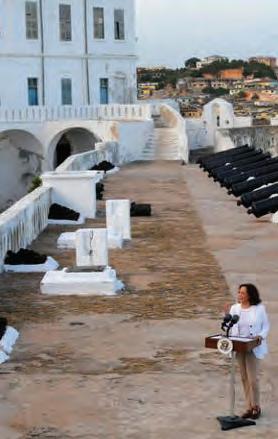
Image credits: Thomson Reuters
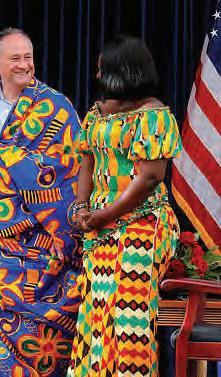
st be Learned ' 71 March-April 2023 DAWN www.africabusinessassociation.org
Cape Coast slave castle
and her husband Doug Emd in traditional kente cloth as the Oguaa chief Osabarimba nd community leaders, at the Palace in Cape Coast, Ghana 3 © Provided by Daily Mail
Kamala Harris Announces Tanzania Trade Initiatives on Africa Tour
By Aljazeera
Wednesday, March 29, 2023 [Ericky Boniphace/AP]
UNITED STATES VICE PRESIDENT KAMALA HARRIS announced plans to boost trade with and investment in Tanzania during a visit there on Thursday, part of an African tour aimed at strengthening ties with a continent where the influence of China and Russia is on the rise.
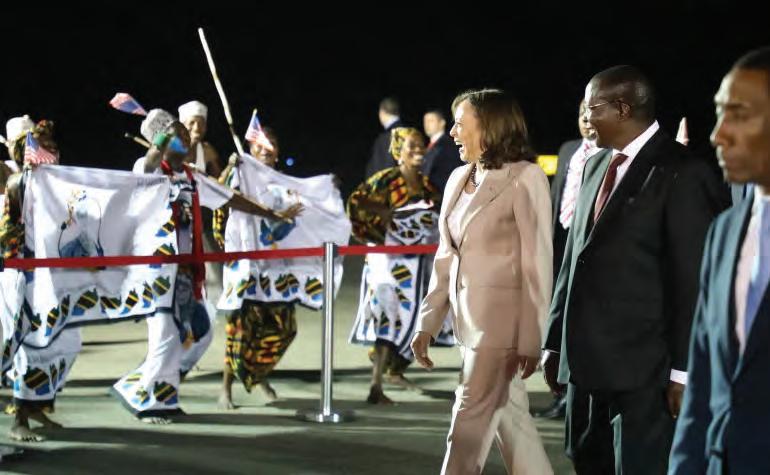
The tour began on Sunday in Ghana before she flew late on Wednesday to Tanzania’s commercial capital Dar es Salaam, where she met President Samia Suluhu Hassan on Thursday. The two women gave short statements to the media before going into a longer session of private talks.
“Working together, it is our shared goal to increase economic investment in Tanzania and strengthen our economic ties,” Harris said, listing a number of initiatives.
They included a new memorandum of understanding between the Export-Import

Bank of the United States (EXIM) and the government of Tanzania.
That will facilitate up to $500m in financing to help US companies export goods and services to Tanzania in sectors including infrastructure, transportation, digital technology, climate and energy security and power generation.
Harris also mentioned a new partnership in 5G technology and cybersecurity, as well as a USsupported plan by LifeZone Metals to open a new processing plant in Tanzania for minerals that go into electric vehicle batteries.
“This project is an important and pioneering model, using innovative and low-emission standards. Importantly, raw minerals will soon be processed in Tanzania, by Tanzanians,” she said, adding that the plant would deliver battery-grade nickel to the US and the global market from 2026.

Governance - Harris 72 March-April 2023 DAWN www.africabusinessassociation.org
U.S. Vice President Kamala Harris, third right, welcomed by Tanzania's Vice President Philip Mpango, second right, on their arrival at Julius Nyerere International Airport in Dar es Salaam
(L) US Vice President Kamala Harris w STATE HOUSE
China has invested heavily in Africa in the last two decades, and last November, Hassan met China’s President Xi Jinping during a state visit to Beijing.
Trade and investment featured heavily on their agenda, with the leaders agreeing to “elevate twoway trade and further expand the trade volume” and China saying it would explore providing market access to more Tanzanian goods.
Political Rights
On Thursday, President Hassan said her “most important request” was to improve the visa process between the US and Tanzania, as both countries would benefit from a “long-duration visa” that would increase trade and tourism.
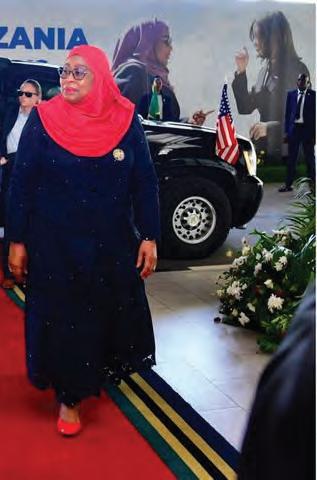
Under Hassan, Tanzania has returned to international engagement after a period of isolationism enforced by her predecessor John
People welcome U.S. Vice President Kamala Harris on her arrival in Tanzania
Magufuli, who cancelled all his ministers’ foreign trips and discouraged travel.
She has won praise internationally for restoring political rights suspended by Magufuli, who died in office in 2021.
“Madam president, under your leadership Tanzania has taken important and meaningful steps and President Joe Biden and I applaud you,” Harris said, standing alongside Hassan.
Magufuli had banned political rallies by anyone other than elected officials, cracked down on Tanzania’s LGBT community and arrested dozens of opposition supporters. He had also rejected COVID-19 vaccines and urged Tanzanians to put faith in prayer and treatments such as steam inhalation.
Hassan reversed the policies upon coming to power and earlier this month, Tanzania passed the milestone of fully vaccinating 50% of its population against the coronavirus.
But human groups have said violations continue, including government targeting of online media outlets. Hassan’s education minister also banned a series of children’s books from schools last month for allegedly promoting homosexuality.
Harris, the latest of several high-profile figures from the US administration to visit African countries in recent months, is due to stay in Tanzania until Friday, when she will depart for Zambia, the final stop on her tour.
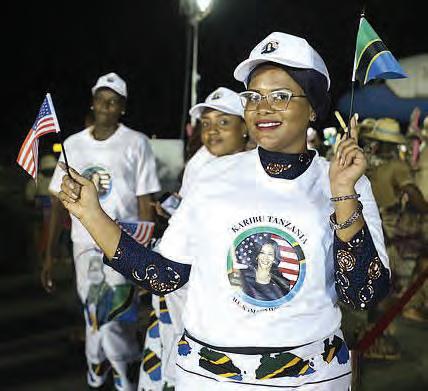
Both women first met in April 2022 when Harris hosted Hassan at the White House in Washington.
https://www.aljazeera.com/news/2023/3/30/ kamala-harris-announces-tanzania-tradeinitiatives-on-africa-tour
73 March-April 2023 DAWN www.africabusinessassociation.org
with Tanzania President Samia Suluhu Hassan.
© AP photo Provided by Daily Mail
Kamala Harris Vows to Send Country Billions From US
By Andrea Cavallier for DailyMail.Com and WIRES
U.S. VICE PRESIDENT Kamala Harris has told China to cancel Zambia's debt as she vowed to send the country billions from the US.
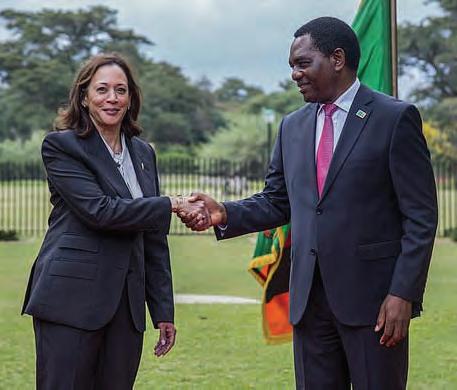
The VP touched down at a $1bn airport in Lusaka on Thursday built by Beijing which serves as a reminder for the vast influence that China holds over the African state.
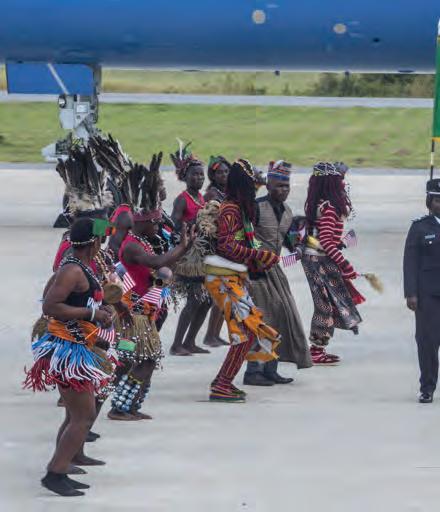
Harris said the government in Lusaka had put in place measures to strengthen its economy and should be supported with debt relief. She was speaking at the start of a two-day visit to Zambia on the last leg of her week-long tour of Africa.
The VP also took time to visit the site of her maternal grandfather's home in Lusaka, where he lived as an Indian public servant in the 1960s.
Zambia has been looking to restructure its debt
since becoming the first African country to default during the COVID-19 pandemic in late 2020. Its debts crept higher at the end of last year, figures published by the finance ministry this week showed. China is its largest bilateral creditor.
'We are continuing to reiterate our call on official bilateral creditors to provide meaningful debt reduction to Zambia,' Harris said at a press briefing when asked what the United States was doing to push China to restructure Zambia's debt.
Africa has emerged as a focus for Washington as it aims to position itself as a partner to countries in the region amid competition with China, which has sought to expand its influence by funding infrastructure projects on the continent.
Harris said her visit to Zambia was intended

Governance - Harris 74 March-April 2023 DAWN www.africabusinessassociation.org
Harris is greeted by Zambian President Hakainde Hichilema in Lusaka, Zambia, on Friday © AP Photo
US vice president Kamala Harris receives warm welcome to Zambia.
© AP Photo
to strengthen existing relations between the two countries and not to counter the Chinese presence in Africa.
'Let me be clear. Our presence here is not about China. It's about our independent understanding of intertwined histories of our nations,' said Harris, who also spoke warmly of visiting her grandfather while he was working in Zambia when she was a child.
Speaking at the same briefing, Zambian President Hakainde Hichilema said delays to debt restructuring were hurting the economic gains that Zambia had made.
Good relations with the United States did not preclude good relations with China and vice versa, he added.
'When I'm in Washington, I'm not against Beijing. Equally, when I'm in Bejing, I'm not against Washington,' he said.
When Harris arrived in Zambia on Friday, she touched down at an airport that´s doubled in size
and features glittering new terminals.
Rather than a symbol of promising local development, it's a reminder of China´s deep influence. Beijing financed the project, one of many that has expanded its footprint on a booming continent that's rich in natural resources, often generating goodwill among its citizens.
The global rivalry between the United States and China has been a recurring backdrop for Harris' journey, and nowhere has that been more apparent than Zambia and her previous stop in Tanzania.

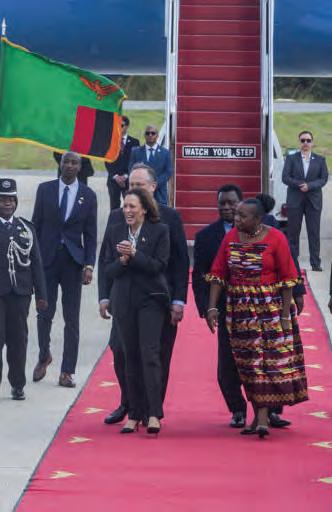
Besides the airport, China built a 60,000-seat stadium in Lusaka, plus roads and bridges around the country. Zambia is on the hook for all of the development with billions of dollars in debt.
Tanzania is a major trading partner with China, and it has a new political leadership school funded by the Chinese Communist Party.
The developments have alarmed Washington, and President Joe Biden´s administration is worried that Africa is slipping further into Beijing´s
75 March-April 2023 DAWN www.africabusinessassociation.org
VP Harris and Emhoff visit an office building that records indicate is on the plot of land where the house used by her grandfather P. V. Gopalan when he was serving as a Indian Civil Servant Los Angeles Times via Getty Images
US Vice President
Kamala Harris (L) and Zambian President
Hakainde Hichilema (R) are seen at the State House in Lusaka on March 31, 2023 during a press conference AFP via Getty Images
sphere of influence.
Harris has played down the issue on her trip, preferring to focus on building partnerships independent of geopolitical competition.
However, she has acknowledged there´s limited time for the U.S. to make inroads on the continent, telling reporters earlier in the trip that there is a 'window' that is 'definitely open now' for American investments.
The VP paused Friday during the whirlwind diplomatic swing for something much more personal: A visit to the site of her maternal grandfather´s home in Lusaka.
P.V. Gopalan was working with the newly independent Zambia government six decades ago on refugee resettlement and lived at 16 Independence Ave., where Harris visited as a little girl.
The home no longer exists; rather, an office building now stands on the plot of land. The location was identified using plot numbers in public records and land surveys, according to a White House official.
Harris on Friday said it was 'very special' to go back, and she described her grandfather as 'one of my favorite people' with a lasting influence on her life.
'He believed in the nobility of public service, he

believed in fighting corruption,' she said. 'These are things he would talk about a lot, and I don´t think until I was older I realized how that subconsciously influenced the way I think.'
Officials at the U.S. Embassy in Lusaka pored through public records, spoke with Zambian and Indian authorities, and reached out to former Zambian government officials to identify the precise location of Gopalan's home.
Harris' family members also offered memories about the home, which helped with the embassy's search, the White House official said.
The confirmation came just in time for Harris' weeklong trip to Africa; the U.S. embassy identified the location while Harris was in Ghana, the first stop of her visit to the continent, a few days ago.
The Zambian Ministry of Lands confirmed that 16 Independence Ave. was indeed Gopalan's home, through a March 9, 1967 public lands document.
As Harris toured the location, U.S. embassy official Elizabeth Norikane told the vice president that she had been searching for the precise spot for a year.
Zambia has celebrated Harris' childhood ties to the country. On the drive from the airport into the city, Harris was greeted by signs that read: 'Welcome back to Zambia.'
https://www.dailymail.co.uk/news/ article-11925681/Kamala-Harris-tells-Chinacancel-debt-Zambia-vows-send-country-billionsUS.html
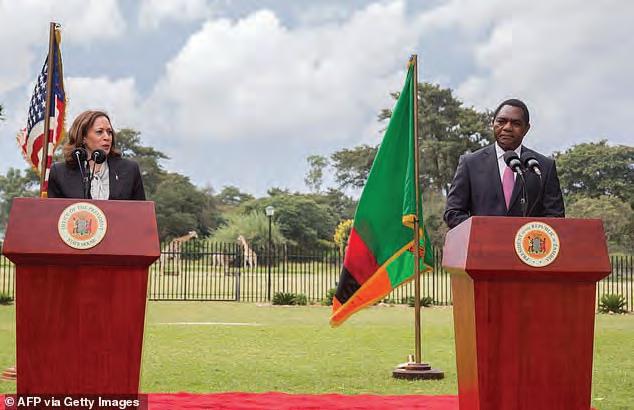
Governance - Harris
VP Harris in Zambia from page 75
IDRIS
ELBA, BLACK SHERIF, Sheryl Lee
Ralph and other celebrities joined Vice President Kamala Harris in Ghana as she visited the Vibration studio at the freedom skate park in Accra, Ghana. Harris visited the community recording studio with the stars as part of her weeklong tour of Africa. The visit was a step towards highlighting the growth, talent and evolution of African creatives and the creative industry in Africa. Other notable figures who joined Harris on the tour included Baaba J, Ria Boss, and Moses Sumney.
In the past, British actor Elba, whose mother is Ghanaian, has been vocal about the West supporting and investing in African creatives. Earlier in March, he joined forces with Nigerian media mogul Mo Abudu to launch a joint film and TV venture that would support new projects from rising African talent in the continent and the diaspora.
While talking with the press, the “Luther” actor said that he and his wife first met Harris at the U.S.-Africa Leaders Summit last year.
“[Harris] said, ‘Hey, I really want to come to Africa. And we said we’d love to do that,’” Elba told
Idris Elba, Black Sherif and Sheryl Lee Ralph Join Kamala Harris in Ghana
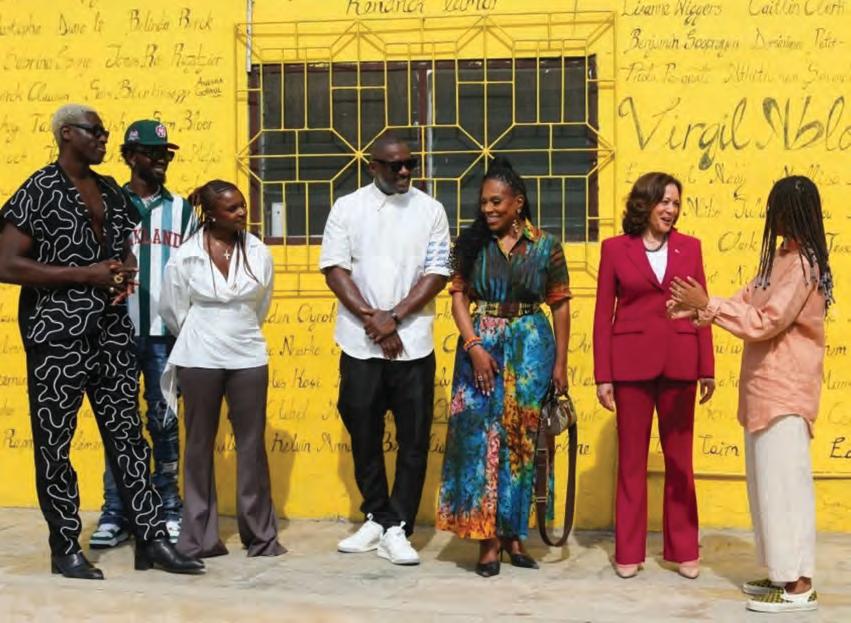 By Sughnen Yongo
By Sughnen Yongo
White House press reporters in Ghana, according to The Hill.
“If you ever go to Africa, let me know,” Elba said. “So here we are.”
The Golden Globe winner also mentioned that the creative talent pool in Africa is rich, and it was a good idea that Harris had visited.
“I think it’s a great signal for VP to come to Ghana, to come to Africa and be that interface to show the rest of the world that actually it is a fantastic place to sort of look at in terms of partnership and investment,” said Elba.
During the event, which gathered a crowd of creatives, Lee sang “Endangered Species,” after which she addressed the attendees.
“You must invest in yourself, in your art, first. And then you birth it out to the world,” Ralph said.

After her visit to Ghana, Harris will make a stop in Tanzania and then wrap up her African tour in Zambia.
https://www.okayafrica.com/celebrities-joinkamala-harris-in-ghana/
Governance - Harris
Image credit: Photo by Nipah Dennis.
Kamala Harris Warmly Embraced on African Trip: ‘Like a Homecoming’

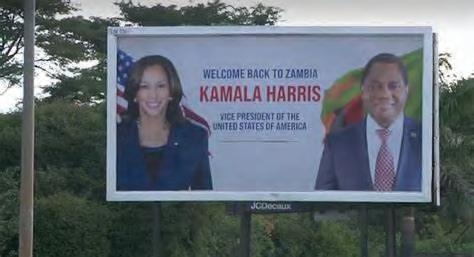 By Associated Press
By Associated Press
VICE PRESIDENT KAMALA HARRIS may have traveled halfway around the world to reach this corner of Africa, but she was welcomed as a “daughter of our own country” when she sat down with Zambia’s leader.
The visit, President Hakainde Hichilema said, was “like a homecoming.”
It was a reference to a childhood trip to Zambia when Harris’ grandfather worked here, but she heard similar refrains throughout her weeklong trip to Africa that ended Saturday.
In Ghana, President Nana Akufo-Addo told Harris “you’re welcome home.” In Tanzania, a sign in Swahili told Harris to “feel at home.”
“She is the ambassador we need at the moment,” said Tracy Sharpley-Whiting, who chairs African American and Diaspora Studies at Vanderbilt University. “That’s a joyous thing.”
Harris’ background did not spare her from difficult conversations about U.S. foreign policy and she was pressed in Africa about visas, private investment and funding to deal with climate change. There’s also skepticism over whether the United States will follow through with its commitments and over its attempts to rival China’s own influence in Africa.
But at every stop, Harris was warmly embraced.
“Kamala Harris! Kamala Harris!” young girls shouted on the tarmac when she landed in Lusaka on Friday. She approached them with her hand on her chest in gratitude. “The VP is here! The VP is here!”
The trip to Africa was largely overshadowed by a cascade of U.S. news, including a school shooting in Nashville, Tennessee, and the indictment of former President Donald Trump.
The greetings were a reflection of the enduring connections between the African diaspora in the United States and Africans themselves, something that America’s first Black vice president fostered during her trip. Although her historic status has led to extreme scrutiny and extraordinary expectations in Washington, it was a source of excitement over the past week.
But anyone tuning in would have seen Harris hanging out with actor Idris Elba and actor-singer Sheryl Lee Ralph at a recording studio in Accra, Ghana’s capital, or collecting business cards from young entrepreneurs in Dar es Salaam, Tanzania, or walking through rows of peppers at a farm outside of Lusaka. Sometimes she

Governance - Harris
78 March-April 2023 DAWN www.africabusinessassociation.org
U.S. Vice Pre Saturday Apr
felt comfortable enough to discard her prepared remarks, a rarity for a politician who sticks closely to the script in Washington.
Although Africa remains a poor continent with almost half the population lacking access to electricity, Harris’ itinerary was aimed at portraying it as young, dynamic, innovative — and primed for American business opportunities, particularly with leaders from the diaspora.
The most glamorous event was a state banquet at the Ghanaian presidential palace known as the Jubilee House, where Black American celebrities, business people and civil rights activists gathered.
In her toast, Harris paid tribute to attendees who “represent the glorious beauty of the African diaspora” and she spoke about “our shared destiny.”
Akufo-Addo, the president, honored Harris with a local touch.
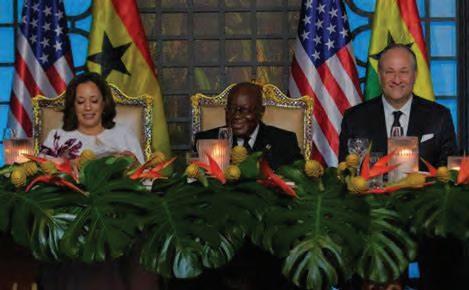

“Since you were born on a Tuesday, I’m sure you would not mind the Ghanaian name Abena, the Akan name for all Tuesday born females, to your name,” he said.
Raising his glass, AkufoAddo toasted “the honorable Kamala Devi Abena Harris.”
Marc Morial, president of the National Urban League, said there was a “festive and family” atmosphere to be there with the first Black vice president in U.S. history.
“It’s a moment of pride,” he said. “And it’s a moment of opportunity.”
The trip could be Harris’ last foray overseas before the 2024 campaign begins in earnest.
see page 80
79 March-April 2023 DAWN www.africabusinessassociation.org
esident Kamala Harris visits Panuka farms outside Lusaka, Zambia, il 1, 2023. (AP Photo/Angela Nandeka news-herald.com)
Ghana's President Nana Akufo-Addo hosts the U.S. Vice President Kamala Harris and Second Gentleman Douglas Emhoff, during a state banquet in Accra, Ghana March 27, 2023.
REUTERS.ibtimes.com
President Joe Biden is expected to announce his reelection run, and Harris will be a prime target for Republican attacks.
Some of that is the result of Biden’s age — he would be 82 when starting a second term in 2025 — and Harris’ status a heartbeat away from the presidency.
But like President Barack Obama before her, Harris has faced racism and questions when it comes to her heritage.
Her father was born in Jamaica, where most Black citizens trace their heritage to Africa through the slave trade, making it likely that Harris’ own ancestors were enslaved.
Her mother was born in India, and the vice president was raised in California, contributing to a multicultural background that defies easy characterization. (It was her mother’s Indian father who worked in Zambia decades ago, helping to settle refugees in the newly independent African country.)
But Harris wrote in her book, “The Truths We Hold,” that her mother was clear-eyed about what it meant to raise two daughters in the United States. “She knew that her adopted homeland would see Maya and me as black girls, and she was determined to make sure we would grow into confident, proud black women,” Harris wrote.
Harris wrote that when she arrived at Howard University in Washington, a predominantly Black institution that has educated generations of Black political and cultural leaders, she thought, “This is heaven.”
“There were hundreds of people, and everyone looked like me,” Harris wrote. “The campus was a place where you didn’t have to be confined to the box of another person’s choosing.”
Harris was San Francisco’s district attorney while Obama was running for president, and she defended him when his racial identity was questioned. He’s the son of a white American mother and a Kenyan father, and he spent part of his youth in Indonesia.
She told the San Francisco Chronicle that Obama “is opening up what has been a limited
perspective of who is an African American.”
“We are diverse and multifaceted,” Harris said. “People are bombarded with stereotypical images and so they are limited in their ability to imagine our capacity.”
Harris faced the same strain of commentary during her own presidential campaign in 2020.
“I think they don’t understand who Black people are. I’m not going to spend my time trying to educate people about who Black people are,” she said in a radio interview at the time.
The relationship between the African diaspora and Africans on the continent has been complicated by the history of slavery. African Americans often aren’t sure of their roots because their ancestors were kidnapped and traded. According to the vice president’s office, Harris hasn’t traced her heritage back here, either.
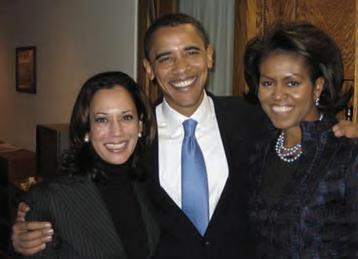
Nevertheless, Sharpley-Whiting said the bond to Africa remains strong for many Black Americans.
“They recognize it as the place where their ancestors started, and they recognize the resilience of those ancestors,” she said.
Harris confronted that history when she visited Cape Coast Castle in Ghana, one of dozens of forts in West Africa where enslaved Africans were imprisoned and then loaded onto ships bound for the Americas. The Caribbean — including Jamaica — was one of the destinations.
“I’m still processing a lot of it,” she told reporters

Governance - Harris 80 March-April 2023 DAWN www.africabusinessassociation.org
Kamala Harris D.A. of San Francisco with President Bar Obama and First Lady, Michelle Obama. Los Angeles Sentin
"Like a Homecoming" from page 79
the following day. She lingered on the experiences of pregnant women who were imprisoned there — their babies were taken from them and the women were sent off across the ocean.
“The brutality, the inhumane treatment of human beings is profound,” she said. “And the lasting trauma of that cannot be denied.”
But she soon turned to another topic when asked what she wanted Black Americans to take away from her trip to Africa.
The message, she said, wasn’t just about “how the diaspora came to be.”
It’s about “the resilience, the strength, fortitude, the brilliance, the excellence.”
https://www.msn.com/en-us/news/world/kamalaharris-warmly-embraced-on-african-trip-like-ahomecoming/ar-AA19nP70
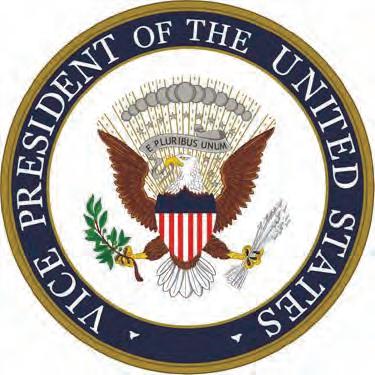

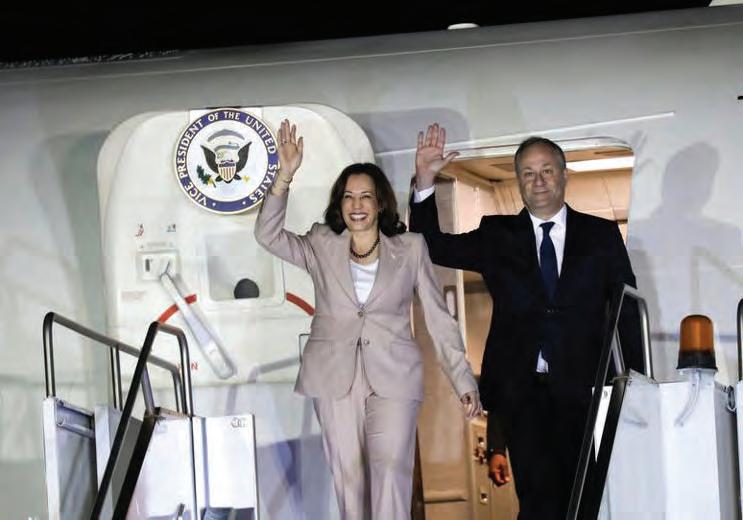
Harris tour recap video: www.youtube.com/ watch?v=LRnwKVUKMjs

ack nel 81 March-April 2023 DAWN www.africabusinessassociation.org
U.S. Vice President Harris arrives in Tanzania © Thomson Reuters
Vice President Harris Launches Global Initiatives on the Eco Empowerment of Women, Totaling over $1 Billion
By PRESS RELEASE
PROMOTING GENDER EQUITY AND EQUALITY is a cornerstone of U.S. foreign policy in Africa and around the world. Advancing the economic status of women and girls is not only a matter of human rights, justice, and fairness—it is also a strategic imperative that reduces poverty and promotes sustainable economic growth, increases access to education, improves health outcomes, advances political stability, and fosters democracy.
In particular, the digital gender gap undermines women’s full participation in the 21st century economy. Globally, approximately 260 million more men than women were using the internet in 2022— and this gap has increased by 20 million in the last three years. The gap is especially acute across Africa, where International Telecommunication Union data show that sixty-six percent of women do not use the internet.
To address this disparity, the Biden-Harris Administration will continue to work with other governments, private sector, foundations, and multilateral organizations to help close the digital divide, improve meaningful access to equitable digital finance and other online services, and address social norms that prevent women from participating fully in the digital economy. More broadly, the Biden-Harris Administration will continue to promote the economic empowerment of women.
In support of these goals, in Accra, Ghana, the Vice President is announcing a series of investments and initiatives—from the U.S. government, and in response to her call for investment from the private sector, and philanthropic community. The Vice President is also making a series of announcements on behalf of the Biden-Harris Administration to foster women’s political, economic, and social inclusion
in Africa, building upon initiatives launched at the U.S.-Africa Leaders Summit in December 2022, including the Digital Transformation with Africa (DTA) Initiative.
» $60M to Launch the Women in the Digital Economy Fund: The U.S. Agency for International Development and the Bill & Melinda Gates Foundation are announcing a new fund to accelerate closing the gender digital divide, with a combined investment of $60 million, at least half of which will focus on Africa.
» Nearly $400M in Private Sector Commitments to Support Closing the Gender Digital Divide: These commitments, totaling nearly $400 million, support the key pillars guiding the work of the U.S. government to close the Gender Digital Divide.
» $528M in Private Sector Commitments to Support of Women’s Economic Empowerment in Africa: These commitments, totaling over $528 million, support gender programming more broadly.
» $47M U.S. Government Initiatives to Advance Gender Equality Across Africa: These initiatives, totaling over $47 million, represent new announcements and initiatives on behalf of the Biden-Harris Administration to foster women’s political, economic, and social inclusion in Africa, building upon initiatives launched at the U.S.-Africa Leaders Summit in December 2022.
WOMEN IN THE DIGITAL ECONOMY FUND
The U.S. Agency for International Development and the Bill & Melinda Gates Foundation are announcing the Women in the Digital Economy Fund, a joint effort toward closing the gender digital divide. USAID will commit $50 million and

82 March-April 2023 DAWN www.africabusinessassociation.org Governance - Harris
the Gates Foundation will commit $10 million respectively by 2026, with at least half of these resources focused on Africa.
This new Fund will accelerate progress to close the gender digital divide by scaling evidencebased, proven solutions that improve women’s livelihoods, economic security, and resilience. The Fund will support programs that advance digital access and affordability; develop relevant products and tools; provide digital literacy and skills training; promote online safety and security; and invest in gender-disaggregated data and research.
USAID will mobilize its commitment to this effort, subject to the availability of funds, alongside additional U.S. government initiatives focused on advancing gender equality and digital connectivity in Africa as part of the DTA.
ADDITIONAL PRIVATE SECTOR AND PHILANTHROPIC COMMITMENTS TO SUPPORT CLOSING THE GENDER DIGITAL DIVIDE
The Vice President is announcing nearly $400 million in private sector and philanthropic commitments, made in response to the Vice President’s call to support the key pillars of the Women in the Digital Economy Fund:
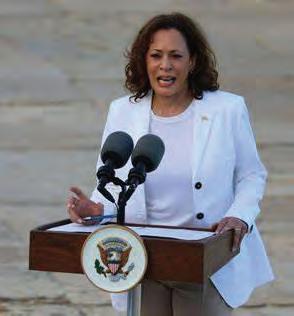
»The Bill & Melinda Gates Foundation has committed to invest, in addition to its commitment to the Women in the Digital Economy Fund, $40 million toward closing the digital gender divide in Africa and South Asia.
» Delphos International, Ltd., a financial advisory firm , has committed to mobilize $250 million by 2027 to advance women’s economic security across Africa, including $100 million for projects to advance digital gender equality and women’s clean energy contributions, such as through products particularly benefitting women customers or supporting women-led
enterprises.
» InfraCredit has committed to provide local currency guarantees to unlock up to $68.6 million of domestic debt capital, with the support of development partners, in order to finance private sector enterprises providing solar powered mobile network access to unserved and underserved areas across Nigeria. It will deploy up to 2,000 rural mobile network stations, which will generate up to 1 million jobs by 2030. This is expected to increase the digital connectivity of up to 4 million women across Nigeria by 2030.
» Vista Bank and Cybastion Institute of Technology have committed to invest $20 million to build a gender-diverse cybersecurity workforce in Francophone Africa by providing digital technology and cyber security training and certifications to at least 100,000 women by 2026 from low-income and under-represented communities in Francophone Africa through the Vista-Cybastion CyberWomen Immersion Program.
» Betacube, a technology consulting company, has committed to invest $15 million to support 80 African-led tech start-ups per year by 2025, of which half will be women-led. Through
see page 84
onomic 83 March-April 2023 DAWN www.africabusinessassociation.org
upcoming editions of its TechAfricanWomen program, Betacube will support African women entrepreneurs to launch strong tech startups, ready for market and investment, targeting 16 African countries in 2023, 32 African countries in 2024, and 50 African countries in 2025.
» Visa Foundation expects to support women’s participation in the digital economy with a $5 million commitment in grants and impact investments. Visa Foundation’s support would focus on increasing access to financial solutions and other services for women entrepreneurs in Sub-Saharan Africa, in order to drive equitable digital financial access as countries continue to digitize.
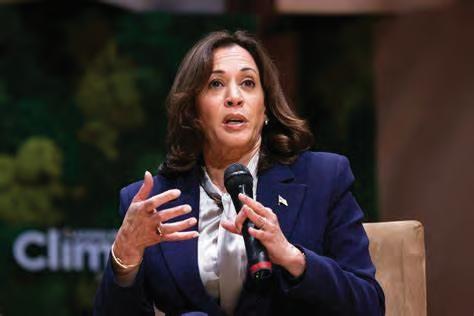
» CARE has committed $5 million to advance digital gender equality across Africa. This includes $3 million—as they aim to raise $2.5 million on top of $500,000 raised in seed funding—to expand the reach of the Digital CARE Package to 1 million people in Rwanda, Uganda, and across Africa by 2028, unlocking equitable access to the internet and all its benefits. CARE has committed $2 million to provide 30,000 women members of village savings and loans associations across Tanzania with access to “Chomoka” digital platforms that enable them to build digital
identities and access digital financial services.
» The International Trade Center has committed to invest $3 million by 2025 to enable over 5,000 micro, small, and medium-sized enterprises (MSMEs) led by women across Africa to improve their competitiveness in digital trade, and 3,000 MSMEs led by women to transact international business using digital means.
» Yeleen Enterprises, a social impact company, has committed to invest $300,000 to pilot a digital payments program for its African shea butter suppliers, equipping at least 100 women suppliers in Ghana with cell phones and onboarding them to digital payments systems to receive mobile money transfers by the end of 2025. The program will expand to Chad, Mali, Morocco, Senegal, South Sudan, and Uganda within the next 10 years.
»The Pfizer Foundation has committed an additional $100,000 to support Living Goods in Kenya to use digital technology to empower frontline community health workers—with women at the center, as both healthcare providers and recipients of care. Living Goods’ Smart Health app equips community health workers to deliver on-demand, life-saving care to families in need—treating sick children, supporting pregnant mothers, counseling women on modern family planning choices, educating families on better health, and delivering high-impact medicines. In addition, Pfizer has committed to develop a “Women Living with Cancer in Africa” app, which will be free for users to help reduce the stigma and increase women’s ability to learn about cancers, treatments, and ultimately living with cancer.
» Microsoft Corporation has committed to train and certify at least 1 million women

84 March-April 2023 DAWN www.africabusinessassociation.org Governance - Harris
1 Billion in Global Initiatives from page 83
across Africa by June 2025 through its Skills for Jobs program. To achieve this goal, Microsoft Corporation and the International Labor Organization have committed, through the Women in Business partnership, to reach 30,000 women globally–with an initial focus on Egypt, Kenya, Nigeria, Senegal, and South Africa–with in-demand digital skills training, business coaching and mentorship, and stipend funding to pursue jobs and livelihood opportunities in the digital economy. In addition, Microsoft Corporation, together with Africa Tikkun, a South African non-profit organization, have committed to provide cybersecurity training and employment support to over 3,000 young jobseekers in South Africa, the majority of whom will be women.
» Microsoft Corporation has committed to integrate gender equality programming across its Airband partnerships globally, including in Africa, with the aim of training and empowering women entrepreneurs and increasing women’s opportunities for employment and trade using connectivity and access to affordable devices. This will include, for example, Liquid Intelligent Technologies and ViaSat joining with Microsoft to invest in gender equity programming in their ongoing effort to provide internet access to 25 million underserved people across Africa by the end of 2025.
»Towards the Microsoft Corporation’s commitment to catalyze internet access for 100 million people in Africa, Microsoft Corporation and Mawingu Networks have committed to expand their partnership in Kenya and enter new markets in Tanzania and Uganda, in order to provide internet access for 20 million underserved people by the end of 2025. The project will prioritize connectivity for women entrepreneurs and will include additional programs to advance digital gender equality.
» Mastercard has committed to register
30 million people to its Community Pass platform by 2027, with a focus on registering 15 million people across Africa, including women in underserved and remote communities, increasing their access to digital commerce, agricultural markets, healthcare services, and humanitarian benefits, by providing digital identities and a digital acceptance network. Recognizing that across Africa, women smallholder farmers systematically produce less output than their male counterparts because they have less access to inputs, credit, and other critical services, Community Pass connects these farmers to service providers to help make farming a more sustainable livelihood.
» HP has committed to accelerate digital equity for 2.5 million people in Africa in 2023, with a focus on those most likely to experience the digital divide, including women and girls, people with disabilities and aging populations, historically excluded and marginalized groups, and teachers and healthcare practitioners. This commitment will include help for three South African nonprofits to scale their efforts to advance social and economic equality in their local communities through a Digital Equity Accelerator, which provides funding, hardware solutions, and capacity-building support.
» Procter & Gamble has made a commitment to increase its annual spend with womenowned businesses in Sub-Saharan Africa by 30 percent by the year 2025. This will build on P&G’s work with its partners to lead annual conferences and workshops across Africa focused on upskilling women-led businesses and equipping them with the right skills and strategies needed to become part of multinational’s supply chains.
»The World Economic Forum’s EDISON Alliance is committed to expanding its
see page 86
85 March-April 2023 DAWN www.africabusinessassociation.org
1 Billion in Global Initiatives from page 85
Lighthouse Network—which aims to close the digital divide, particularly for women—by bringing on three new countries in Africa by the end of this year, to support its goal of improving the lives of 1 billion people through affordable access to digital services by 2025. This includes increased attention to addressing the barriers women face in accessing and using digital connectivity. Launched in 2022, with Bahrain, Bangladesh, and Rwanda, the Lighthouse Network provides a platform for countries to showcase success stories, facilitate peer to peer exchange, and crowd in the partners and resources needed to meet their national digital inclusion goals, including on digital gender equality.
» myAgro, a mobile layaway platform for agriculture, has committed to provide 500,000 West African women farmers by 2025 support in using mobile phones to access its digital savings tool in order to purchase seeds, fertilizers, and modern agricultural training. Through its platform, myAgro expects women farmers to invest $70 million in their farms, enabling them to double their food production and increase their agricultural income by 35%.
» Arizona State University’s Thunderbird

Schoolof Global Management, in partnership with the U.S. Department of State’s Bureau of Educational and Cultural Affairs (ECA), has announced a five-year partnership to offer the Francis and Dionne Najafi100 Million Learners Global Initiative curriculum through the Academy for Women Entrepreneurs (AWE). The AWE program is currently implemented by 20 U.S. missions in sub-Saharan Africa, and ECA expects AWE to grow to an additional four African countries: Cameroon, Eswatini, Lesotho, and Somalia.
PRIVATE SECTOR COMMITMENTS TO SUPPORT WOME N’S ECONOMIC SECURITY IN AFRICA
To build upon support for the Women in the Digital Economy Fund, and in response to the Vice President’s call to promote women’s economic security across Africa, the following five companies and organizations collectively announced $528 million in major new commitments today:•
» The Tony Elumelu Foundation has announced its $500 million Coalition for African Entrepreneurs to support 100,000 young African entrepreneurs, including 50,000 women, by 2033, focusing on fragile states, women’s entrepreneurship, and green entrepreneurship. The Coalition is open to development agencies, the private sector, philanthropic organizations and governments to collaborate in empowering Africa’s next generation.
» Kuramo Capital Management, an investment management firm, in collaboration with The Ford Foundation and 2X Global, has committed to invest $140 million in capital by 2028 to catalyze the growth of women-led and owned private equity and venture capita funds and deliver up to $5 million in in-kind services to 25 women fund managers by that date, thereby facilitating increased investment in women entrepreneurs across sub-Saharan Africa
» Vista Bank Group has committed to invest $100 million in gender-smart financing structures to grow women-led enterprises in 25 countries in Africa by 2025.
»The African Women Impact Fund Initiative (AWIF), supported by the Standard Bank Group , has received an additional commitment of $25 million towards its stated target of mobilizing $1 billion by 2030. Launched in 2020, the Fund has already raised an initial commitment of $60 million. AWIF is driving an inclusive investment environment by directing resources to women fund managers to invest in
86 March-April 2023 DAWN www.africabusinessassociation.org Governance - Harris
high-impact sectors and projects and close the financing gap for women across Africa. AWIF has identified the first cohort of 50 women fund managers across the continent that it will support and develop.
» CARE has committed $7.3 million to advance women’s economic security in Africa. This includes $6.8 million in Ghana to expand its partnership with the private sector in the cocoa value chain to benefit 3,000 producer communities by 2030 and to support the financial and economic empowerment of more than 50,000 women smallholder farmers in the northern and middle belts through CARE’s Women in Agriculture Platforms and Farmer Field Business Schools. In Zambia, CARE has committed $500,000 by 2025 to work with 2,000 Community Health Entrepreneurs – 75% of whom are women. Through LiveWell, a social business, community health workers will increase their economic security and will contribute to bridging gaps in health information and services for rural communities, reaching an estimated 500,000 people.
» Hello Tractor, Heifer International, and World Food Program Farm2market Alliance have committed to invest $3.2 million in Kenya to help 25,000 cattle farmers convert rice straw to feed for their livestock, mitigating challenges due to drought and climate change. They will also service an additional 60,000 small farmers growing on 90,000 acres – of which 30,000 will be women and 15,000 will be practicing conservation agriculture. This will include $1.5 million to finance tractors, rippers, and balers— half of which for women entrepreneurs.
U.S. GOVERNMENT INITIATIVES TO ADVANCE GENDER EQUALITY ACROSS AFRICA
The Biden-Harris Administration is also making an additional $47 million in commitments in
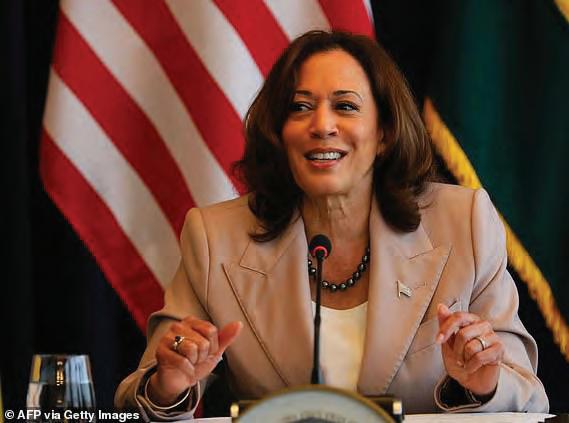
Africa to foster women’s economic participation, environmental stewardship, health, and freedom from gender-based violence, building on initiatives launched at the U.S.-Africa Leaders Summit.
Economic Participation
» Supporting Women Entrepreneurs through Digital Finance. In Lesotho, the Millennium Challenge Corporation (MCC) is partnering with the World Bank to launch the Digital Innovation to Improve Access to Finance for Women Entrepreneurs initiative, working with local financial institutions to pilot genderresponsive digital finance products for small business owners. By reducing the reliance on fixed-asset collateral, the pilots will address a key constraint for female business owners. The most effective products will be scaled up as part of a $25 million investment in women entrepreneurs through the Health and Horticulture Compact, signed by MCC and the Government of Lesotho in 2022.
» Promoting Women’s Land Rights. MCC announced the Government of Morocco’s December 2022 establishment of the Centre d’Inclusion des Femmes au Foncier (CIFF) Center for Women’s Inclusion in Land Rights, which was developed with support from MCC’s Morocco Employability and Land Compact, including an investment of $1 million for the Center. This Center will collect and disseminate data on land and women’s land use, support women to exercise their land
see page 88
87 March-April 2023 DAWN www.africabusinessassociation.org
1 Billion in Global Initiatives from page 87
rights, and strengthen land policy. Women comprise nearly half (41%) of title holders of land titled through the compact to date, in contrast to the roughly 1% that would have been eligible without claiming their inheritance rights.
» Advancing African Women’s Trade and Investment. USAID is committing $2 million in Gender Equity and Equality Action (GEEA) Fund resources to partner with agro-processing and garment firms in Kenya through the Imarisha Women’s Initiative, which helps women advance in their careers, improve their skill sets, and increase their income while creating more flexible and supportive workplaces. Part of the Africa Trade and Investment program, USAID’s signature effort to support the Prosper Africa initiative, and in partnership with the African Women’s Trade and Investment Project, this program promotes women’s participation in leadership and management positions in trade-related industries and sectors across Africa.
» Promoting Women-Owned SMEs. USAID announced $3 million in GEEA Fund resources for Ethical Apparel Africa (EAA) to accelerate the export capabilities of nine apparel manufacturers—primarily women-owned— in Benin, Ghana and Togo, through factory training, market facilitation via the African Growth and Opportunity Act, finance facilitation, and export capacity development. Over the next year, EAA firms will book a minimum of $10 million export orders through USAID support. EAA has pre-selected five Ghanaian firms that they will support over this one-year engagement, each of which are women-owned and employ majority women.
» Supporting Women Farmers. The U.S.
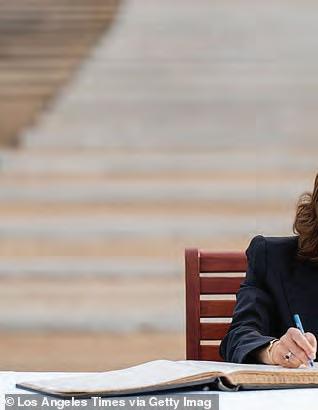
International Development Finance Corporation (DFC) has committed to loan $10 million to Kentegra Biotechnology to support the construction of a new facility to scale up production capacity of pale refined pyrethrum extract (PRE), a key ingredient in organic pesticides which is made from the pyrethrum flower sourced by Kentegra from Kenyan farmers. Kentegra currently works with 9,200 farmers—almost half of whom are women and Kentegra plans to increase the percentage of women it works with over the next five years —and DFC’s loan will provide women farmers with more predictable income, higher prices than alternative crop options, as well as training to implement best farming practices and financial planning tools to fully benefit from the increased incomes resulting from pyrethrum cultivation.
Environmental Stewardship
»Boosting Women’s Access to Electricity. USAID will invest $3 million in GEEA Fund resources to support the establishment of women-owned or managed cooperatives to expand electricity access across Zambia through the Zambia Electric Cooperatives Development Project. This project will address gender gaps in the energy sector and in sustainable electrification expansion by directly engaging rural households, particularly

88 March-April 2023 DAWN www.africabusinessassociation.org Governance - Harris
women, in the ownership of their local electric service provider, and enhance the economic empowerment of rural women by delivering affordable energy-efficient services and technologies for entrepreneurial activities.
» Advancing Women’s Engagement in the Energy Sector. Drawing on funding previously announced during the United Nations Framework Convention on Climate Change (COP27), USAID will invest $1 million in GEEA Fund resources to advance gender equality through efficient energy use in East Africa by scaling up productive energy use projects, building communities of practice, and increasing women’s access to financing for efficient appliances. USAID will also advance women’s leadership in the rapidly evolving electric power sector by educating the next generation of science and engineering experts through curriculum development, internships and fellowships, and leadership and empowerment training. The initiative helps increase economic opportunities for women while increasing productive energy use in East Africa and globally and is training the next generation of women in the complex skills needed in the rapidly evolving power sector.
Health
» Promoting Adolescent Health and Wellbeing. The Peace Corps is investing
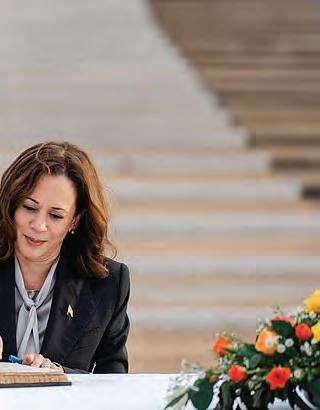
$750,000 per year for the next two years to expand its youth-related programming to tackle global health issues, including HIV prevention and care, malaria prevention and treatment, gender-based violence, sexual and reproductive health and rights, and economic empowerment. The program will run in a total of eighteen countries, the majority of which are in Africa, and will predominately serve adolescent girls and young women.
»USAID will invest $400,000 in its Youth Excel program in Tanzania, which educates adolescent boys and young men on positive gender norms, gender equitable and healthy relationships, economic productivity, and positive reproductive health for themselves and their partners through educational sessions delivered by positive male role models. The curriculum covers gender, violence prevention, addiction and alcohol abuse, soft skills, financial literacy, and puberty and reproductive health.
Gender-Based Violence
» Addressing Gender-Based Violence in Rural Communities. USAID is investing over $780,000 in GEEA Fund resources to address gender-based violence through the Resilient, Inclusive and Sustainable Environments (RISE) grants challenge. In Zambia, the RISE challenge will establish CommunityBased Fisheries Resources Management Committees, in which rural women will enhance their leadership, advocacy, and conflict management skills to address genderbased violence in the fisheries sector. In Kenya, the funds will support work to prevent gender-based violence and promote gender equality in conservancies.
https://allafrica.com/stories/202303290533.html
Image credits: taifadaily.com, newscentral.africa, newswind.co.uk, clipart-library.com
89 March-April 2023 DAWN www.africabusinessassociation.org
Black History Booms as States Restrict It
By Russell Contreras
RED STATES ARE LIMITING Black history lessons in public schools at the same time scholars are producing groundbreaking new works around art, slavery, civil rights, and the Great Migration.
Why it matters: A work on Black history has won a National Book Award every year since 2018 as historians find more stories that challenge the popular U.S. narrative. That's sparking a backlash.
Details: "South to America: A Journey Below the Mason-Dixon to Understand the Soul of a Nation" by Imani Perry won the National Book Award last year and was an immediate bestseller upon its release.
• Other recent works, like Erica Armstrong Dunbar's 2017 book on Ona Judge, a woman who fled enslavement from President George Washington, also have garnered national attention.
• A biography on Malcolm X and a book on McDonald's historic relationships in Black communities won Pulitzers in 2021.
• "Sweet Taste of Liberty: A True Story of Slavery and Restitution in America," by W. Caleb McDaniel, a meditation on reparations based on the story of a woman who survived kidnapping and re-enslavement, won a Pulitzer in 2020.
State of play: The boom results from new sources and scholars who entered graduate programs after segregation, Gerald Horne, a history professor at the University of Houston, tells Axios.
• The new generation of scholars also is responding to current events, from the backlash to Barack Obama's presidency to the rise of Donald Trump. "The times impact the way that history is written."
Yes, but: At the same time scholarship is expanding, schools' ability to teach some of the same themes and information is shrinking.
• At least 18 states have enacted legislation since last year to limit the teaching of "divisive concepts" or critical race theory, according to data from the National Conference of State Legislatures, the American Instructional Resources Survey and an Axios analysis of recent stories.
• Amid criticism from Florida Gov. Ron DeSantis (R) and other conservative politicians, the College Board changed the curriculum for its new Advanced Placement African American Studies course, excluding concepts such as Black Lives Matter and reparations.
The intrigue: The National Council for Black Studies, an organization dedicated to advancing Black Studies, is holding its annual conference next month at the University of Florida.
• It's the first in-person gathering for the organization since the pandemic, Amilcar Shabazz, a history professor at the University of Massachusetts Amherst, tells Axios.
• Scholars in Black Studies are coming to Florida in solidarity with other scholars in the state.
What's next: Shabazz and Horne said states' restrictions won't stop the momentum of exciting work in Black history, but could make it harder for new scholars to get jobs.
• "The discouragement is the highest for folks who are in the pipeline...the dissertation writers and the recent PhDs," Shabazz said.
Of note: The National Council for Black Studies this year is focusing on the 100th anniversary of the Rosewood Massacre of 1923 — in which a white mob violently attacked the predominantly African American town of Rosewood, Florida, and wiped it out.
• It's unclear whether teachers in Florida, under new restrictions, can even bring up the massacre without facing discipline.
https://www.axios.com/2023/02/06/blackhistory-boom-crt-ban-racism-censorship?utm_ medium=10today.us.tue.rd.20230207.436.1&utm_ source=email&utm_content=article&utm_ campaign=email-2022
90 March-April 2023 DAWN www.africabusinessassociation.org Governance
Gov. DeSantis: State NAACP Travel Advisory Proposal ‘A Joke’
By TheGrio Staff
FLORIDA’S NAACP wants the state to issue a travel warning in light of the governor’s policies targeting race and diversity in educational institutions
The Sunshine State’s NAACP chapter met in Orlando on Saturday, where its members unanimously voted to urge the organization’s national board to issue the missive, citing Florida Gov. Ron DeSantis‘ insensitivity when it comes to “issues facing people of color,” according to USA Today.
“Somebody’s going to have to stand up against the governor and his policies and make him do the right thing,” said Isaiah Rumlin, president of the Jacksonville-based NAACP branch, USA Today reported. He noted that issuing the advisory encouraging people not to visit the state would “have a vast impact on the economy” of Florida. DeSantis, on the other hand, scoffed at the Florida NAACP vote, asserting he would not squander time on it.
“What a joke,” he said Thursday. “Yeah, we’ll see how effective that is.”
“Our country, you know, it goes through all these — we get involved in these stupid fights,” DeSantis continued, according to USA Today. “This is a stunt to try to do that. It’s a pure stunt, and fine if you want to waste your time on a stunt.”
The governor vowed to ensure “we’re getting good things done here” as he emphasized his efforts to “continue to make [Florida] a great state.”
Rumlin – who claimed the joke is on DeSantis and his plans – cited several government measures that affect how educators can teach and discuss race in Florida schools.
DeSantis signed the Stop WOKE Act and forbade a new Advanced Placement course in African American studies, which critics say will force schools to whitewash unpleasant aspects of the country’s racial history. The governor is also
working to have all diversity, equity and inclusion initiatives discontinued at Florida’s colleges and has established an electoral police squad that has primarily targeted Black Floridians.
“This is not a stunt,” or a joke, contended Rumlin, noting that the NAACP intends to see the request through to the finish line, USA Today reported.

Hillsborough County NAACP president Yvette Lewis said efforts to limit the rights of Black and marginalized people precede this legislative session, the Tampa Bay Times reported.
In addition to arrests and convictions for voting fraud and erroneous redistricting plans that divided primarily Black voting areas, Lewis asserted the travel advisory request was also motivated by legislation violating people’s rights. She referenced a planned ban on abortions after six weeks and proposed restrictions on the use of preferred pronouns in schools.
“We are an organization that protects people’s civil rights,” said Lewis, the Tampa Bay Times reported, “and this is a first step to doing that.”
The activist said she hoped the warning would draw attention to what she described as an urgent situation that she worried would bring a repeat of an oppressive past.
“People are seeing what’s happening in Florida,” Lewis noted, according to the Tampa Bay Times, “and I hope that help is coming.”.
https://thegrio.com/2023/03/24/ron-desantis-callsstate-naacp-travel-advisory-proposal-joke/ Image credit: PR Newswire


91 March-April 2023 DAWN www.africabusinessassociation.org
Governance
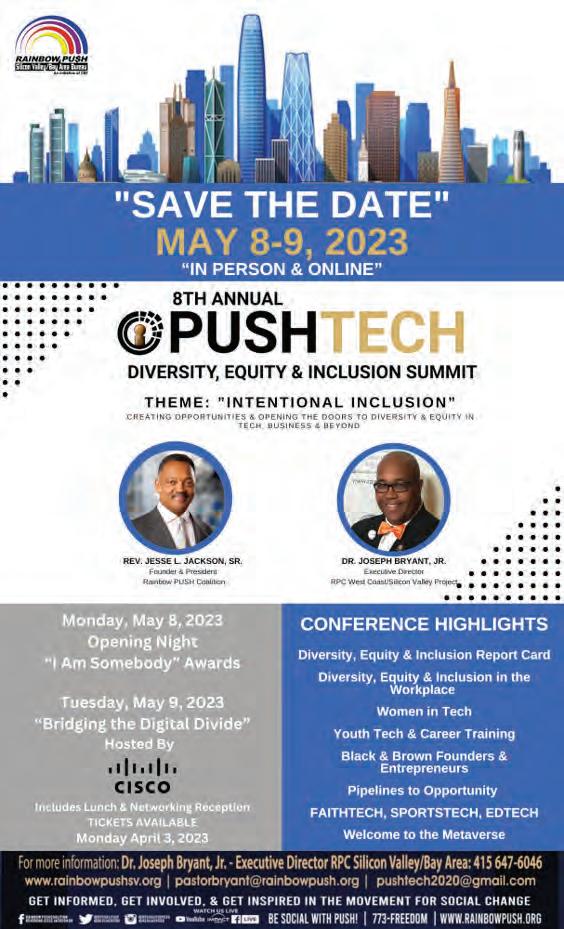
www.rainbowpushsv.org
pastorbryant@rainbowpush.org pushtech2020@gmail.com
African Stock Exchange/Bourse
• Algeria Algiers Stock Market
• Angola
• Botswana
Angola Stock Exchange and Derivatives
Botswana Stock Exchange
• Cameroon Douala Stock Exchange
• Cape Verde Islands Bolsa de Valores of Cape Verde (in Portuguese)
• Cote de Ivoire Bourse Regionale des Valeurs Mobilieres - UEMOA (Abidjan)
• Egypt
• Ethiopia
• Ghana
• Kenya
• Libya
The Egyptian Exchange
Ethiopia Commodity Exchange
Ghana Stock Exchange
Nairobi Stock Exchange
Libyan Stock Market
• Malawi Malawi Stock Exchange
• Mauritius Stock Exchange of Mauritius
• Morocco
Casablanca Stock Exchange
• Mozambique Bolsa Valores de Mocambique
• Namibia Namibian Stock Exchange

• Nigeria Nigerian Stock Exchange
• Rwanda
• Seychelles
Nigerian Stock Exchange
Rwanda Stock Exchange
Seychelles Securities Exchange

• Somalia Somali Stock Exchange
• South Africa
Bond Exchange of South Africa
Johannesburg Stock Exchange
Johannesburg Stock Exchange
• South Sudan
• Swaziland
• Tanzania
• Tunisia
• Uganda
• Zambia
• Zimbabwe
Khartoum Stock Exchange
Swaziland Stock Exchange
Dar es Salaam Stock Exchange
Tunisia Stock Exchange
Uganda Securities Exchange
Lusaka Stock Exchange
Victoria Falls Stock Exchange
• Zimbabwe Zimbabwe Stock Exchange
e
93 March-April 2023 DAWN www.africabusinessassociation.org Investment
Khartoum, Sudan Daily Maverick
Black-Owned Fintech Esusu Hits Unicorn Status With SoftBank-Led Round
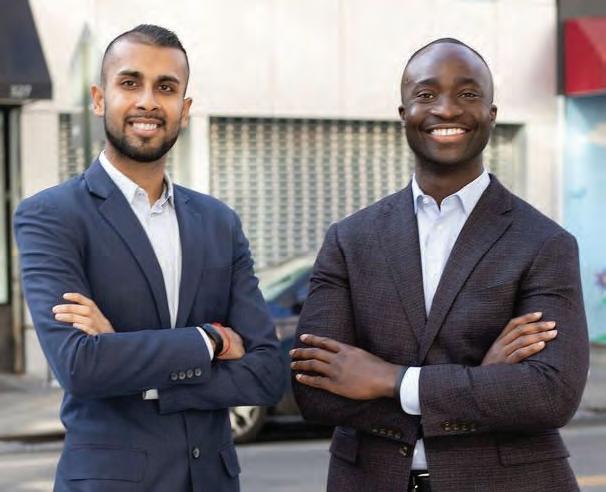 By Aysha Diallo January 27, 2022
By Aysha Diallo January 27, 2022
Wemimo said in a telephone interview. The company said that over 90% of renters do not currently get credit for making rent payments on time.
“If you want to buy a house and you don’t have a credit score, you’re not going to get access to it,” Wemimo added.
Esusu is currently available in 2.5 million homes across the U.S. and works with 35% of the largest landlords on the National Multifamily Housing Council list. The company generates revenue by charging landlords a one time on-boarding fee and then a small monthly fee for each unit using the service.
ESUSU , a financial technology company that aims to help bridge the racial wealth gap by reporting rent payments to credit agencies, has become one of only a few Black-owned startups to reach a valuation of $1 billion after closing a Series B round led by SoftBank Vision Fund 2. Just six months after its Series A, the New York-based company plans to use the
$130 million of new capital it received to triple its number of employees and “turbocharge growth through product innovation,” Esusu said in a statement Thursday. Founded in 2018, the company reports on-time rent payments to major credit bureaus in an effort to help renters improve scores and qualify for financial products.

“That’s the quintessential piece of credit scores, and that’s one of the biggest gaps we’re excited about,” co-founder Abbey
The latest funding round saw participation from Jones Feliciano Family Office, Lauder Zinterhofer Family Office, Motley Fool Ventures, Schusterman Foundation, SoftBank Group’s SB Opportunity Fund, Related Cos., and Wilshire Lane Capital. Existing investors include Concrete Rose Capital and Serena Ventures, a venture capital firm started by tennis champion Serena Williams that invests in diverse founders.
https://www.bloomberg.com/ news/articles/2022-01-27/blackowned-fintech-hits-unicornstatus-with-softbank-led-round Image: burbankhousing.org
94 March-April 2023 DAWN www.africabusinessassociation.org Investment
Esusu co-founders Abbey Wemimo, right, and Samir Goel.Source: Erica Westley Photography via Esusu
Idris Elba and Mo Abudu Partner to Help Develop African Film, TV Industry
 By Eileen AJ Connelly
By Eileen AJ Connelly
IDRIS ELBA AND MEDIA MOGUL MO ABUDU
on Thursday announced a partnership aimed at working to develop the television and movie industries across Africa and to bring "stories from Africa and the African diaspora to the world stage."
The "Luther" actor and "Queen Nzinga" executive producer said the effort would be made through their respective production companies, Green Door Pictures and EbonyLife Media to build capacity and foster authentic representation in global film and TV projects set for production.
The two described a two-fold approached that would bring education and mentoring initiatives to help both young people and older creative professionals the opportunity to showcase their skills and tell their stories, and assist in large-scale productions.
Abudu, who has Nigerian roots, has deep ties to "Nollywood," as the Nigerian film industry is known, producing multiple films in that space, including 2016's "The Wedding Party," which stood at the time as the nation's highest grossing film. She's also involved with Nigerian television, including "Desperate Housewives Africa" in partnership with Disney.
"We believe that Africa has the talent and the stories to captivate the world. It's our mission to offer the best in industry education, mentorship, and production opportunities, so that our graduates
can become valuable contributors to the global media landscape," Abudu said in a statement. "We plan to hit the ground running and explore the very best that African and Black stories have to offer global audiences."
Elba, who founded Green Door Productions in 2013 to work with emerging talent and produce thought-provoking content, lists "Luther: The Fallen Sun," Net flix's "Concrete Cowboy" and the forthcoming Apple+ series "Hijack" among its credits. He also has a record label, 7Wallace Music.
"I have always been passionate about using my platform to make a positive impact," Elba said. "By partnering with Mo, we aim to offer free, worldclass industry education to the next generation of storytellers and bring their authentic voices to the forefront. This partnership is a step towards creating a more inclusive and diverse media landscape, one that represents the voices and experiences of Africa and its diaspora around the world."
The pair are also hoping that global industry leaders and others, from governments to multilateral agencies, will join in their effort to grow talent and build capacity around the African continent.
https://www.msn.com/en-us/movies/news/ idris-elba-is-planning-to-open-a-film-studio-intanzania/ar-AA16ZGdL
95 March-April 2023 DAWN www.africabusinessassociation.org
Investment
Idris Elba and Mo Abudu © Provided by TheWrap
Two New Investment Funds: Kanary's Inc. and Phenomenal Ventures
Mandy Price Joins Less Than 20 Black Women Founders to Raise Over $10M After Kanarys, Inc.'s $5M Series A
By Samantha Dorisca
CO-FOUNDER AND CEO MANDY PRICE was one of 93 Black women to raise at least $1 million in funding in 2021. Today, she is announcing another substantial raise for Kanarys, Inc.
According to a press release shared with AfroTech, the diversity, equity, inclusion, and belonging (DEIB) technology company has raised $5 million in a Series A financing round. Since its inception, Kanarys, Inc. has raised $10.5 million in funding. Now, Price joins a select group of less than 20 Black women founders to reach this milestone.
“The momentum demonstrated through our Series A round underscores the importance and growth we’ve seen in DEIB solutions over the past several years. DEIB remains a critical driver to a thriving business, in every economic climate, and company leaders should continue to bolster their efforts when it comes to prioritizing DEIB,” Price said in a press release. “We’ve been on a mission since 2018 to develop and deliver data-driven technology tools that not only advance DEIB in the workplace but also create a culture of meaningful engagement across the global workforce. Our solutions empower companies to not only address the unique needs of their employees but also foster inclusion among their stakeholders and customers. This funding, along with the hiring of leading industry experts on our leadership team, will catapult us towards fulfilling our mission.”
The latest seed round was led by Seyen Capital. Portfolia Rising America, Rackhouse Venture Capital, Revolution’s Rise of the Rest Seed
Fund, StartFast Ventures, TechNexus Venture Collaborative, and Tech Square Ventures also participated in the round.
“As the leading provider of data-driven DEIB solutions, Kanarys demonstrates its value to companies and employees worldwide,” George Spencer III, Senior Managing Director of Seyen Capital, said in a statement. “Today companies are being held to higher standards when it comes to DEIB, and Kanarys has developed the platform companies need to manage DEIB and make accountability more transparent and reliable for company boards, managers, investors, employees, and other key stakeholders. I am confident that our investment will further advance greater equity and transparency in the workplace, and we are excited to see the impact our investment has on furthering their mission.”
Kanarys has allocated the fund to accelerate its platform and expand its organization by adding six industry leaders. The executive team will aid with DEIB, engineering, finance, operations, product marketing, and sales.
New team members are:
Albert Fong, Cecilia Choi, Chad Stoerp, Dawn Christian, D’ontreye Nero, Joe Fernandez
https://afrotech.com/mandy-price-kanarys-inchas-raised-5m-in-series-a-round?item=1
Image credit: Lori Wilson Photography
VC Firm Phenomenal Ventures Closes $6M Debut EarlyStage-Focused Fund
By Ngozi Nwanji
MEENA HARRIS , U.S. Vice President Kamala Harris’ niece, has officially entered into the investing space.
TechCrunch reports that the lawyer and
96 March-April 2023 DAWN www.africabusinessassociation.org Investment
entrepreneur’s Phenomenal Ventures, alongside her partner Helen Min, has publicly launched. The firm has closed a debut early-stage-focused fund that totals $6 million.

The outlet details that investors were firms 776, Tribe Capital, Slow Ventures, and founders from the likes of Dropbox, Quora, and Pinterest.

“There are funds of all sizes still being raised, we know that there’s money out there that is still being deployed and raised, but not many of them are led by solo GPs — even fewer are led by women, let alone women of color, or people like us who are women of color and aren’t career venture capitalists,” Harris said, according to the outlet.
Due to the fund, Phenomenal Ventures is now able to participate in rounds ranging from preseed to Series A.
“We really feel confident in our ability to succeed but also really wanted to start modestly and just do the work…despite some of the uncertainty around the economy,” Harris shared. “You can be
fundraising forever, especially in terms of what the economy looks like,” she added.
Since its founding, the joint VC firm has invested in 13 companies. The outlet notes that nine of them are led by underrepresented founders.
“Every company that Meena and I have worked for — as startups employees at Facebook, Slack, Dropbox, Uber, Plaid, Quora, AngelList, they are literally all by non-underrepresented founders — our networks very much reflect those companies and the networks we were a part of for so long, to say we’re going to turn [down] that deal flow that surfaces because of the network we’re a part of… I don’t think [that] super makes sense, especially not for fund one,” Min said. “Venture is all about leveraging the unique access that you have.”
https://afrotech.com/meena-harris-phenomenalventures
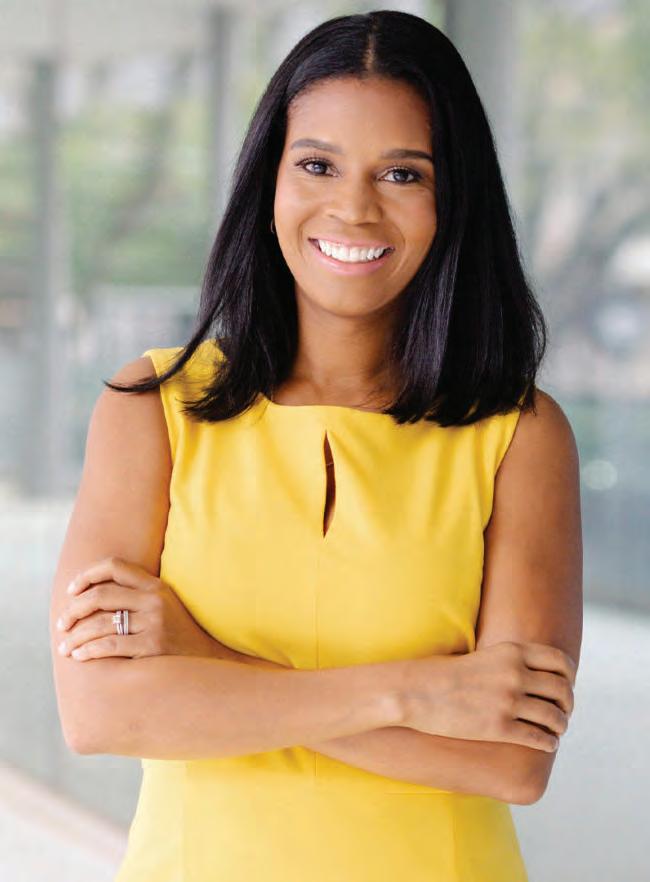
97 March-April 2023 DAWN www.africabusinessassociation.org
Image credit: Leon Bennett
Mandy Price
Meena Harris
Pressley and Booker Reintroduce Baby Bonds Bill, Attempt to Close Racial Wealth Gap
By Gerren Keith Gaynor
U.S. REP. AYANNA PRESSLEY (D-MA) AND SENATOR CORY BOOKER (D-N.J.) are reintroducing legislation that would establish federal baby bonds in an effort to close the racial wealth gap, theGrio exclusively reports.
Pressley and Booker recently introduced the American Opportunity Accounts Act, which would create a federally funded savings account for every American child. The two Democrats say they hope the bill will make “economic opportunity a birthright.”
“The racial wealth gap in America is the result of generations of precise and intentional policy violence, so we must be as intentional and as precise about advancing policies that address it head-on,” Pressley said in a statement.
“Baby Bonds are one of the most effective tools we have for closing the racial wealth gap and breaking the cycles of poverty and trauma
that have prevented Black and brown folks from thriving in this country,” her statement continued. Booker first introduced the American Opportunity Accounts Act in 2019 during the 116th Congress. He reintroduced it with Pressley in 2021 in the 117th Congress. In both sessions, legislators never voted on the bill and only referred it to House committees.
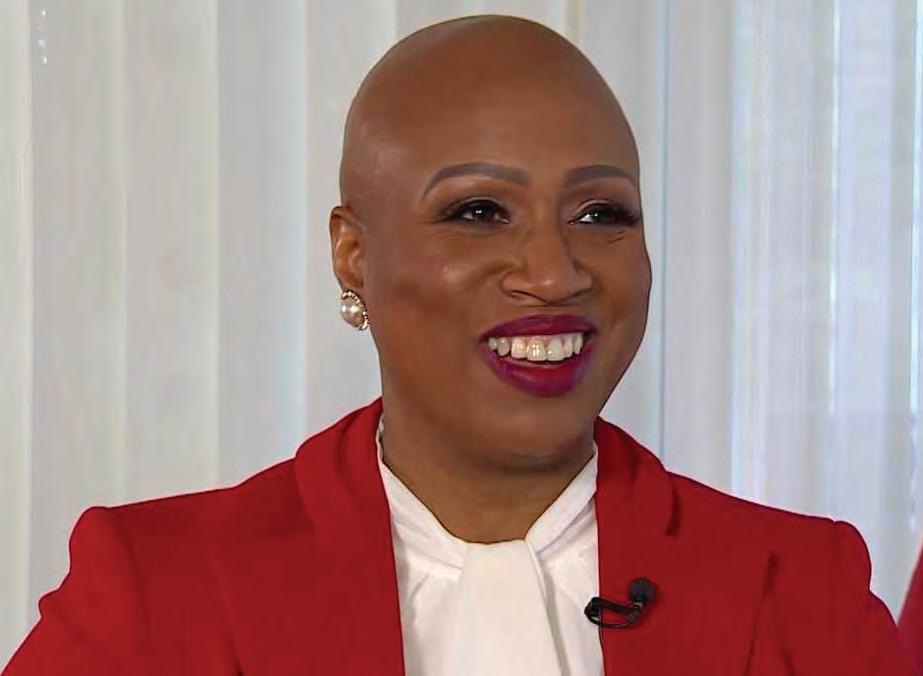
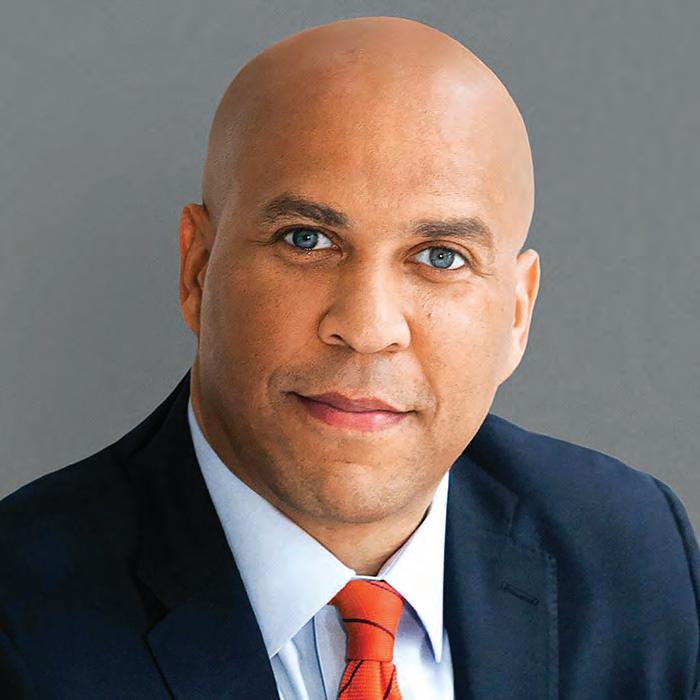
If congressional leaders pass the bill this time and President Joe Biden signs it into law, the federal legislation would authorize the Secretary of the Department of Treasury to transfer $1,000 into an account for every individual born after Dec. 31, 2023
Depending on a family’s income, the American Opportunity accounts would receive up to an additional $2,000 a year and accrue interest until the individual is 18 years old. Accounts for minors in a family of four that earns less than $25,000 a
98 March-April 2023 DAWN www.africabusinessassociation.org
Investment
(Left to right) U.S. Rep. Ayanna Pressley and Sen. Cory Booker will reintroduce the American Opportunities Accounts Act.
year could accrue as much as $46,215, according to the congressional offices.
At age 18, account holders can use the funds for eligible “wealth-building activities.” A “qualified expense” includes purchasing a home, funding higher education or investing in “financial assets or personal capital that provides long-term gains,” according to the bill.
The offices of Pressley and Booker explain other expenses that qualify include investing in a small business and saving for retirement.
“Americans today are having a harder time accessing homeownership, higher education, and a secure retirement than their parents did just a generation before them,” Booker said in a statement provided to theGrio.
“This is due in part to our upside-down tax code, which is great at preserving and building wealth for corporations and wealthy families, but fails Americans who are barely getting by and are unable to afford long-term investments to get ahead,” the statement continued. ‘Baby Bonds’ would fix our broken tax code by providing every American child with startup capital for their life.”
According to a 2020 report from the Brookings Institution, the racial wealth gap widened over decades and the COVID-19 pandemic only exacerbated the inequity. The public policy research firm cited data that, as of 2019, the median white household held nearly eight times the wealth of a Black household.
Andre Perry, a senior fellow at Brookings Institution, affirmed that policies like Pressley and Booker’s federal baby bonds bill could help address America’s racial wealth gap.
“Wealth divides in this country necessitate the need for a revised social safety net as well as different ways to build wealth in this country,” Perry said in a written statement. “Providing baby bonds based on income will help those who are not born into wealth to purchase a home, go to college or start a business without going into debilitating debt.”
While federal baby bonds would benefit all Americans, it would especially improve the economic conditions for Black and brown children. According to data published by Kaiser Family Foundation, Black and Latino households hold poverty rates of 21.7% and 17.6%, respectively, which is disproportionately higher than white households at 9.5%.
State and local legislators have introduced baby bonds in their jurisdictions, and the District of Columbia implemented the investment program last year. Lawmakers in Connecticut passed a bill to create a baby bond fund, but, reportedly, the governor’s office is stalling it. Other states that have proposed or flirted with the idea of a version of baby bonds include Washington, California, New Jersey, Massachusetts and Wisconsin.

In response to the growing movement, Pressley said, “It is no surprise that this idea has gained traction in states across the country.” She added: “Black lives and Black wealth matter, which is why Congress must pass our bill without delay.”
https://www.reuters.com/business/sustainablebusiness/world-bank-seeks-more-fundsaddress-climate-change-other-crisesdocument-2023-01-03/
Image credit: WCVB Channel 5 Boston thefightmag.com, https://www.tdameritrade.com
99 March-April 2023 DAWN www.africabusinessassociation.org
This Kenyan Woman is Making Waves in the Fintech Industry with her Ingenious Startup that Recently
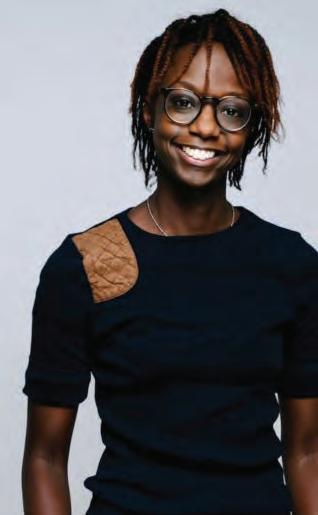
Raised $3M
By Abu Mubarik
KENYA’S FINANCIAL COOPERATIVES, credit unions and community banks comprise more than 10 million people with savings of $4.7 billion and an asset base of $6.54 billion. In 2017 alone, they contributed 5.72% of Kenya’s nominal GDP.
Despite the lucrative nature of the sector, they are largely excluded from the digital financial sector and rely on manual operations and processes. This often leads to inefficient operations, challenges with liquidity, and lack of proper data analysis as well as fraud.
This is where Cynthia Wandia comes in with Kwara, an online and mobile banking platform that caters to financial cooperatives, credit unions, and community banks. Prior to funding Kwara, Wandia started ASTRA Innovations in 2014 and remains in charge of the group’s business development and manages its strategic course.
The platform also seeks to enhance transparency and security for customers in community banks and small financial institutions. In addition, Kwara is designed with financial inclusion in mind. It is devised to help unbanked and underbanked individuals to build wealth together effortlessly. Also, the platform provides access to instant loans and third-party services such as insurance for union members.
Kwara recently raised $3 million in seed extension funding, bringing Kwara’s total funding

to $7 million. The funding round was led by existing investors such as DOB Equity,
Globivest, and Willard Ahdritz, the founder of Kobalt Music, and new backers such as One Day Yes, Base Capital, and fintech executives including Mikko Salovaara, the CFO of Revolut.
“We have spent the last three years uplifting the credit union sector in Kenya, becoming the leading core banking provider in Kenya. Our clients grow up to four times faster than other credit unions and serve members up to 100 times more efficiently,” Wandia said.
The Kenyan fintech also signed an exclusive
100 March-April 2023 DAWN www.africabusinessassociation.org Investment
Cynthia Wandia
digital solutions distribution agreement with KUSCCO, the umbrella body for Savings and Credit Cooperative Organizations (SACCOs) in Kenya. The deal came with the acquisition of KUSCCO’s subsidiary, IRNET, a software company for saccos. According to Wandia, the acquisition enables Kwara to place a digital banking experience in the hands of every credit union in Kenya, together with the most established credit union partner in Kenya (Kwara).
Wandia co-founded Kwara with David Hwan (COO) in 2019. Two years later, the startup raised a US$4 million seed funding round. Kwara has a presence in South Africa and the Philippines although Kenya remains its biggest market. It grew its clientele base to 120 from 50 at the end
of 2021, maintaining a 100% customer retention, according to Tech Crunch.

Now 36 years old, Kwara was inspired into entrepreneurship by her grandmother. She said her grandmother was a coffee farmer who worked with savings and credit cooperatives. She has been to several countries thanks to entrepreneurship. While traveling around, she led many projects that gave her the necessary skills to change the world.
https://www.msn.com/en-us/money/ smallbusiness/this-kenyan-woman-is-makingwaves-in-the-fintech-industry-with-her-ingeniousstartup-that-recently-raised-3m/ar-AA17d8EO Image credit: finparx.com, theexchange.africa
https://experience.afrotech.com


101 March-April 2023 DAWN www.africabusinessassociation.org
A $300 Billion Opportunity: Serving the Emerging Black American Consumer
There’s a big market to be unearthed if companies (Black-owned) meet the real needs of Black consumers
By Michael Chui, Brian Gregg, Sajal Kohli, and Shelley Stewart III (August 6, 2021 | Article)

FOR DECADES AND DECADES , Black consumers have been regularly overlooked by companies that don’t see them as a priority demographic. Black consumers continue to be underserved in areas such as food, housing, healthcare, broadband, and banking. Essential needs are going unmet because of decisions made by companies. Yet these companies may well be missing the chance to cultivate a significant emerging market. With a little ingenuity and deeper analysis, companies may find that serving the Black American consumer will allow them to tap into significant value while contributing to a meaningful economic revival.
Black households do have lower income and wealth. Despite being 13.4% of the US population, Black households accounted for just under 10% of the nation’s total spending on goods and services in 2019. Because Black workers bring home smaller paychecks, they have less money to work with every month, especially after accounting for debt.
Nonetheless, companies that interpret this data as proof that there’s little profit in serving Black consumers are making a big mistake.
Many years of underserving the Black community has created significant opportunities for companies that are willing to look beneath the surface. There are two significant strategies for companies to pursue: expanding local access to goods and services and creating offerings that are better tailored to the needs and preferences of Black households. We estimate that companies filling these needs could tap into $300 billion of value annually. That’s a significant reason for innovative companies, in the United States and globally, to compete for this market.
The State of the Black Consumer
There’s no denying that Black consumption has been constrained, and while it’s growing quickly that growth is starting from a lower base. The steadily rising costs of housing, healthcare, and higher education—needs that are foundational to the quality of life and the possibility of future mobility—are eating up a larger share of household budgets for all poor and middle-class American families, particularly for Black households: the share of expenditures Black households direct to these three categories rose from 38% in 1984 to 45% in 2019.
Our analysis
of publicly available but previously uncompiled microdata from the Census Bureau’s Consumer Expenditure Survey shows that at similar income levels, Black households spend a smaller share of their income than White households, although more goes toward the basics. This has not, however, translated into more liquid savings. More money in Black households goes to giving financial support to extended family, servicing higher student debt burdens, and paying higher interest rates on various consumer loans. McKinsey recently surveyed 25,000 Americans to get their views on economic opportunity and the obstacles they face to achieving it. Black respondents were most likely to say that their level of debt had increased
102 March-April 2023 DAWN www.africabusinessassociation.org Investment
l b tilil d
Combined spending by all Black households has increased 5% annually over the past two decades. It has outpaced the growth rate of combined spending by White households (3%).
over the past year, and they were 50 percent more likely than White respondents to say that they had student or medical debt.
Beneath these sobering realities, however, is a market with substantial buying power and influence—and plenty of upside for the future. In 2019, consumer expenditures by Black households totaled approximately $835 billion. Combined spending by all Black households has increased 5 percent annually over the past two decades. It has outpaced the growth rate of combined spending by White households (3%), driven mostly by faster population growth.
Black consumers are younger, more plugged into smartphones, and more brand-aware than other groups. The median age of Black Americans is 34, a decade younger than the median for White Americans. Black consumers are highly digital: they are more likely to own a smartphone, and they use their phones 12% more than White Americans. They are nearly three times more likely than White Americans to expect the brands they use to align with their values and support social causes.

nutrition, a lack of affordable rental housing, fewer healthcare providers, and gaps in broadband coverage.
Food. Most Americans take for granted the convenience of a neighborhood super-market with many well-stocked aisles and a bounty of choices. But buying healthy, affordable food is a harder task for the residents of many majority-Black communities. One out of every five Black households is situated in a food desert, with few grocery stores, restaurants, and farmers markets. Unspoken “supermarket redlining” in many Black communities means that food is more expensive, choice is limited, and healthy organic products are harder to come by.3 This can reinforce poor nutrition, especially when convenience stores, whose offerings may not be considered healthoriented, are more often located in Black neighborhoods.
How Black Communities are Underserved
Years of underinvestment by the private sector has left some Black communities with a dearth of retail options and key services. For Black households, this can translate into persistent inconveniences, such as tacking additional travel time onto errands. It can also have more serious implications: “food deserts” that contribute to poor
Housing. The US Department of Housing and Urban Development defines households as “cost-burdened” when they spend more than 30% of their gross income on housing—a tipping point that begins to squeeze their ability to spend on other categories. In 2019, 43% of Black households were costburdened, compared with just 25% of White households. This is especially acute among low-income Black renters—53.7% were cost-burdened in 2019, and that’s before the COVID-19 pandemic disproportionately hit Black incomes. Furthermore, a legacy of discrimination in housing markets results in limited opportunities for families of color to live in areas with higher-quality public schools. Much of the nation’s rental-apartment stock is geographically concentrated in ways that reinforce pockets of poverty and patterns of segregation.
Healthcare. Black Americans are nearly 2.4 times more likely than White Americans to live in a neighborhood with limited healthcare services. This trend exacerbates the other challenges Black patients face when interacting with the healthcare system, see page 104
103 March-April 2023 DAWN www.africabusinessassociation.org
$300 Billion Opp from page 103


use digital apps for e-commerce and financial transactions. Companies serving these consumers, therefore, need to design digital experiences and interfaces accordingly.
which cumulatively produce worse treatment outcomes. One in four Black respondents to a Kaiser Family Foundation survey in 2020 reported difficulties in finding conveniently located healthcare, and almost half reported difficulties finding healthcare they could afford. “Safety net” hospitals in both rural areas and inner-city neighborhoods are under financial pressure, and some have closed. The importance of healthcare access was underscored during the pandemic, when Black Americans were less likely than White Americans to be successful in their attempts to get tested or vaccinated. COVID-19 deaths were also higher in neighborhoods with socioeconomic vulnerabilities.
Broadband. Black households are 50% more likely than White households to live in areas with limited broadband service. In urban neighborhoods without existing networks, internet service providers often conduct credit checks or require cash deposits from new customers, policies that disproportionately turn away Black households. Gaps in broadband coverage and accessibility help create a digital divide that makes it harder for Black Americans to access information, hunt for jobs, do remote work, and engage in remote learning. Yet Black consumers are actually more likely than others to participate in e-commerce, despite disparities in broadband connections and computer availability. They have compensated for broadband gaps by becoming more “mobile first” than the rest of the population. Black consumers account for 23% of US cellphone sales, own smartphones at a slightly higher rate than the overall population, and are more likely than the average consumer to
Banking. Bank branches have been closing rapidly in recent years, with a 7% decline in the total number of physical banks from 2012 to 2017. These closures have increased the number of “banking deserts,” for example, census tracts with no bank branches within ten miles of the center. Black Americans are disproportionately affected by these banking deserts: according to FDIC data, nearly half of all Black households were unbanked or underbanked in 2017, compared with just 20% of White households. Closures of local bank branches place an outsize constraint on small businesses, which drives residents to turn to alternatives such as payday lenders.
Serving Black Consumers by Expanding into Low-access Neighborhoods
Sometimes the biggest driver of success is showing up. In many Black neighborhoods, residents are waiting for companies to do just that. Meeting the needs of those living in these underserved areas is both a moral and economic opportunity. In fact, legislation introduced in the US Congress would award credits and grants to companies that provide food deserts with healthy food. Site selection for retailers is not always guided by datainformed decision making. McKinsey has found that many chains choose new locations based on their existing footprint, expanding only into locations that match sites with currently successful stores.
Investment 104 March-April 2023 DAWN www.africabusinessassociation.org
n e d d s d y r sn y y w n o h y
Since retailers perceive lowaccess locations as risky or unprofitable, being the first to populate relatively empty retail landscapes falls low on the list of priority investments.
h
t nt
Yet our analysis indicates that these can be profitable moves.
whiich worse tre t atme
Much of the nation’s rentalapartment stock is geographically concentrated in ways that reinforce pockets of poverty and patterns of segregation.
Since retailers perceive low-access locations as risky or unprofitable, being the first to populate relatively empty retail landscapes falls low on the list of priority investments. Yet our analysis indicates that these can be profitable moves.
We used our proprietary Omni site-selection platform to analyze food deserts and the location of grocery stores in Washington, DC. Using mobile-phone data as an admittedly imprecise but directional proxy for foot traffic, we created a model illustrating a hypothetical scenario in which new grocery stores were sited in underserved parts of Southeast DC. We identified three locations in areas currently classified as food deserts with enough potential demand to capture up to $22 million annually while earning profits that are as good as or even better than those earned by existing stores. The results suggest that new grocery stores sited in food deserts could be as profitable as current stores, or even more profitable. The needs of residents are so great that first movers are likely to benefit from considerable loyalty and other significant advantages.
We believe that this kind of detailed analysis can help companies find many such opportunities across the United States. Some existing examples prove the case, including a successful Whole Foods location in Midtown Detroit. We also found fertile ground in East Liberty, a low-income neighborhood in Pittsburgh. In the early 2000s, the local development authority had success in attracting a Home Depot, with the city sharing some risk to overcome hesitation. The store eventually became one of the highest-volume locations in the region and spurred other development, including a new grocery store and an entire multitenant retail development.
There’s a caveat, of course. Community stakeholders, such as low-income renters who are especially vulnerable to displacement, may be divided on how retail development will affect them. Local leaders have to balance the benefits of development against the risks of gentrification.
Serving Black Consumers with Tailored Products and Improved Experiences
Many companies fail to give Black consumers what they actually want. Previously uncompiled
data from the 2020 McKinsey Consumer Sentiment Survey show that Black consumers are more open to switching what and how they buy than other demographic groups. They are less likely than others to be satisfied with the current offerings available to them, and 25% more likely to change buying behavior. Yet even after they switch, Black consumers are less likely to be satisfied with a new product. Clearly, they are not being offered the products and services they need
Serving the Black consumer well is entirely possible for companies that take the time to figure out the needs of what others may dismiss as a “niche” audience. Many products and services intentionally tailored to Black consumers have been immediately successful. Bevel, for example, is a brand of personal-care and grooming products

created by a Black founder; the idea was born out of his own frustration that shaving products made for White men did not work for him. Launched in 2013, the company was acquired by Procter & Gamble in 2018 and is now expanding to nationwide distribution. Similarly, Black women were long an afterthought for many major cosmetics companies. Singer and entrepreneur Rihanna saw an opening to create a brand centered on their needs and launched Fenty Beauty, with a signature foundation product offered in 50 shades and designed for all
see page 106
105 March-April 2023 DAWN www.africabusinessassociation.org
$300 Billion Opp from page 105
skin tones. Garnering rave reviews, the company was valued at $3 billion after just 15 months. Rihanna has since introduced Savage X Fenty, a lingerie line celebrating body positivity, which was quickly valued at $1 billion. Greenwood is a digital-banking service geared to Black and Latinx customers. Named to honor Tulsa, Oklahoma’s, “Black Wall Street,” the site of a notorious racial massacre in 1921, it has attracted financing from some of the nation’s largest traditional banks.
Seizing the opportunity
To gauge unmet demand, we launched a proprietary consumer survey of 6,200 US consumers in April 2021. The responses yielded some reasons for consumer dissatisfaction that are shared relatively evenly across racial groups; value for money was the biggest issue for both Black and White respondents across all spending categories (most acutely in housing). But Black consumers were far more likely than White respondents to say that current product and service offerings do not meet their needs, especially in personal-care products and services, banking and financial services, healthcare, and food. Black respondents also noted not seeing themselves in advertising and marketing campaigns, a lack of same-race business ownership, and a lack of company commitment to social justice.
Our analysis of the survey results suggests that Black consumers are willing to shift approximately $260 billion—about 30% of their current aggregate spending—to companies that can better deliver what they need. They’ll even pay up to 1.2 times more on average for offerings that are better suited to their needs and preferences. This could unlock another estimated $25 billion to $40 billion in net new spending. Together, these two figures add up to $300 billion in unmet demand. This is an invitation for innovative companies to compete and better meet the needs of Black consumers.
To win these customers, however, companies will have to alter status quo practices that have hurt their relationship with Black consumers. Retailers, for example, must eliminate the phenomenon of “shopping while Black.”
Black patrons are too often denied good customer service or are met with suspicion based on their race. They encounter different security protocols, including being trailed by security guards or having Black beauty products locked up while White products are not. In a 2018 Gallup poll, 59% of Black respondents said they had been treated unfairly in stores. Corporate parents can put a stop to the racial profiling of Black shoppers by establishing clear values and guidelines for store managers and frontline workers—and then enforcing those expectations across franchises.

Companies also have to look internally and confront their history of failing to serve Black communities. Retail redlining in the urban environment is the product of decades of policy and investment choices and risk-averse decisions on siting new stores. There’s no guarantee that technology will improve this situation: while companies are increasingly moving toward the use of analytics, the data they rely on may still “miss” Black consumers.
Lack of awareness is another part of the problem. There is a serious lack of diversity in occupations that shape decisions about which consumers to target with which products. Just 6.3% of marketing research analysts and 5.7% of marketing managers in the United States are Black. Not surprisingly, some brands have stumbled when speaking to Black audiences, particularly when trying to acknowledge social issues. If companies
106 March-April 2023 DAWN www.africabusinessassociation.org Investment
fail to act in a way that matches the sentiment of their campaigns, these attempts will come across as glib, calculating, or jarring.
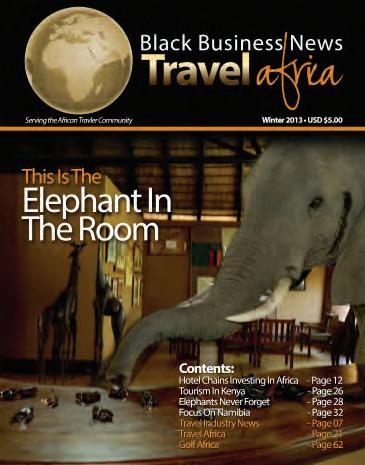
The best way for companies to avoid this kind of misstep is to have significant Black representation internally, especially in key decision-making roles affecting product design, R&D, site selection, and marketing. Consumer-facing companies that want to create inclusive campaigns may well want to seek agencies with multicultural talent.

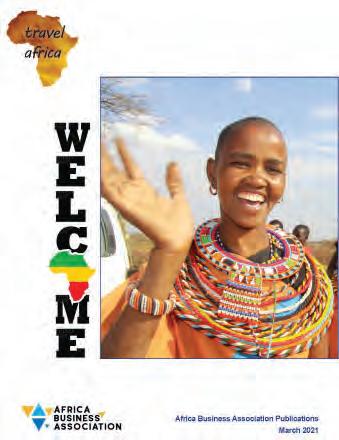
Companies should be encouraged by the success of brands that have profited greatly by marketing directly to the Black consumer. Procter & Gamble acquired Bevel, as noted above, but it also established an online beauty platform for women of color that produced enough insights for the company to launch a hair-care line. In 2018, the company released an Emmy Award–winning ad spot called “The Talk,” featuring Black parents discussing prejudice with their children.

Wooing the Black consumer is a $300 billion opportunity beckoning companies around the world. Those companies that respond must rigorously look within to ensure that they have the people, policies, and technology to understand a market they may well have overlooked. If they do, they could drive outsize impact and outsize profits.
For the full report on which this article is based, see “The economic state of Black America: What is and what could be.”
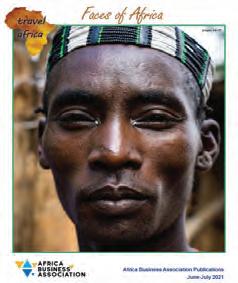
https://www.mckinsey.com/featured-insights/ diversity-and-inclusion/a-300-billion-dollaropportunity-serving-the-emerging-blackamerican-consumer
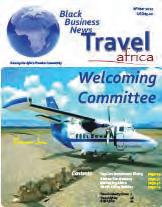






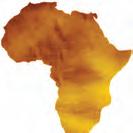


107 March-April 2023 DAWN www.africabusinessassociation.org
Image credit: Pexels, PR Newswire, africanamerica.org, Film Music Reporter, fx1019. ca Promoting Africa-focused Tourism Since 2011 Travel Africa www.africabusinessassociation.org travel africa
Cobalt Red:
How the Blood of the Congo Powers Our Lives
By Siddharth Kara
See related stories on pages 32, 60
Siddharth Kara is an author, researcher, and activist on modern slavery. He is a British Academy Global Professor and an Associate Professor of Human Trafficking and Modern Slavery at Nottingham University. Kara has authored three books on modern slavery and won the Frederick Douglass Book Prize. Kara’s first book was adapted into a Hollywood film, Trafficked. A feature film inspired by Cobalt Red is currently in pre-production.
Below, Siddharth shares 5 key insights from his new book, Cobalt Red: How the Blood of the Congo Powers Our Lives

1. You cannot conduct your daily life without a mineral called cobalt.
Cobalt is a vital component to almost every lithium-ion rechargeable battery made today. That means cobalt is used in almost every smartphone, tablet, laptop, and electric vehicle that is used by billions of people around the world. Cobalt allows the batteries in these devices and cars to hold maximum charge while retaining thermal stability. Without cobalt, we would all be plugging in our gadgets and cars much more often, and eventually, those batteries might catch on fire. Electric vehicles in particular are driving the future demand for cobalt, as the battery packs in each EV require up to ten kilograms of refined cobalt. As the world transitions from fossil fuels towards clean energy, demand for cobalt is expected to soar by more than 300 percent by 2030.
2. Almost 75% of the world’s supply of cobalt is mined in the Democratic Republic of the Congo.
By virtue of geographic fluke, the DRC holds more cobalt reserves than the rest of the planet combined. As demand for cobalt grows, the Congo’s share of world production is expected only to increase,
unleashing a scramble to dig cobalt out of the ground as quickly as possible. The Congo’s cobalt mines are located in the southeastern corner of the country near the Zambian border in an area called the Central African Copper Belt. An old colonial mining town called Lubumbashi is the administrative head of the Congo’s mining operations. Chinese companies dominate mining production in the region, controlling fifteen of the nineteen major copper-cobalt mining concessions in the DRC. These concessions are enormous—some of them are as big as a European city. Most of the production is centered around a town called Kolwezi. Type in that name to Google Earth and Zoom in. You will see giant open-air pit mines swallowing the city. The level of environmental destruction is startling.
3. Cobalt mining in the Congo is a human rights and environmental catastrophe.
There are hundreds of thousands of people in the Congo who dig for cobalt by hand, with shovels, pickaxes, and rebar. They are called artisanal miners, although this quaint term belies the miserable conditions under which they toil. Artisanal miners are responsible for 30 percent or more of the Congo’s total cobalt production. These men, women, and children as young as six dig for cobalt in highly hazardous conditions, suffering toxic contamination from cobalt dust, injuries from pit wall collapses, and worst of all, they are buried alive in tunnel collapses. There are ten to fifteen
108 March-April 2023 DAWN www.africabusinessassociation.org Investment
thousand tunnels dug by hand in the region, some of them are up to sixty meters deep as artisanal miners delve for higher grade sources of cobalt so that they can try to earn more money. None of these tunnels have supports, and based on the many months I have spent on the ground in the Congo, I can assure you that one of these tunnels collapses every week, burying alive everyone inside, including children.
“As demand for cobalt grows, the Congo’s share of world production is expected only to increase, unleashing a scramble to dig cobalt out of the ground as quickly as possible.”
For their backbreaking and hazardous work, artisanal miners are paid just few dollars per day, as they feed crucial cobalt up the chain to tech and EV companies worth trillions. To make matters worse, industrial mines have clear-cut millions of trees and dumped toxic contaminants and heavy metals into the earth, air, and water across the Congo’s mining provinces… all so that we can transition to greener sources of energy—green for everyone but the people in the Congo.
4. Companies at the top of the chain perpetuate fictions about conditions at the bottom.
The companies that sell us our rechargeable gadgets and electric cars all claim to have zero tolerance policies on child labor. They claim that the human rights of all who work in their supply chains are protected, all the way down the mining level. They will even suggest that their particular supply chains do not contain cobalt mined by peasants and children, and that the mines their supply chains operate sustainably.
Nothing could be further from the truth.
“The fictions promulgated atop of the cobalt chain are dispelled one by one.”
In Cobalt Red, I take you on a journey deep into the cobalt provinces to uncover the truth about the appalling conditions of cobalt mining, as told through the voices of the Congolese people who live, work, and die mining our cobalt. You learn, for instance, that every ounce of cobalt scrounged out of the ground by artisanal miners is purchased by industrial mining companies and mixed with their production. You also learn that artisanal miners are encouraged to dig on almost every industrial mine in the Congo…and why not? It is a way of boosting production at virtually no expense.
The fictions promulgated atop of the cobalt chain are dispelled one by one.
5. History is repeating itself in the Heart of Darkness.
This is not the first time the Congo has been pillaged for its resources, and that, too, relating to automobiles. In 1885, a German man named Benz developed a car with an internal combustion engine and wooden wheels suitable for slow speeds. In 1888, a Scotsman named Dunlop invented rubber tires that could support higher speeds.
King Leopold of Belgium had just gotten his hands on the entire Congo region in 1885 as a personal colony, and it just so happened that the Congo had one of the largest rubber tree forests in the world. Leopold deployed a mercenary army that terrorized and tortured the native Congolese people to extract rubber in one of the most ruthless episodes of slavery in history. Joseph Conrad was in the Congo at the time, and what he saw inspired his excoriating meditation on the colonial desecration of Africa: Heart of Darkness
Over a century later, we are in the midst of a new automobile revolution, the transition from gas-powered cars to electric vehicles to help meet climate sustainability goals following the Paris Accords. The Congo is once again sitting on a vital resource needed for this second automobile revolution, and once again the people and environment of the Congo are being plundered without mercy. It is the latest chapter in a long history of torment in the heart of darkness.
https://nextbigideaclub.com/magazine/cobalt-redblood-congo-powers-lives-bookbite/39754/

109 March-April 2023 DAWN www.africabusinessassociation.org
SOLO FUNDS SEEMS to have a lot to celebrate.
According to a press release shared with AfroTech, it is now the first Black-owned personal finance platform to reach over one million registered users.
“We are innovating and thriving where companies have failed,” Rodney Williams, Co-Founder and President of SoLo, said in a news release. “Reaching this milestone is a testament to our members and a pivotal moment in our history, where we have finally created a winning solution for the communities we represent. We are extremely appreciative of this moment and opportunity.”
As AfroTech previously reported, founders Rodney Williams and Travis Holoway created the
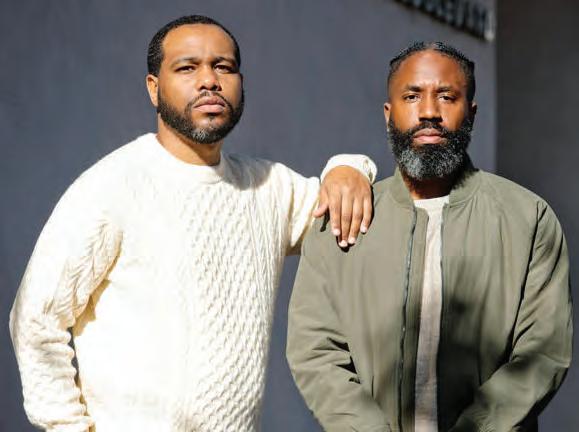
fintech platform to help cash-strapped Americans who are in dire need of emergency capital.
Their platform allows users to get a loan in as little as 30 minutes directly from their phones. Additionally, it offers a protection plan for those who cannot repay their loans
Already, according to a press release, 600,000 in loans have been funded, with over $300 million in transaction volume. In addition, 82% of registered users are from underserved zip codes.
“For us, this is huge. I think about what the community bank is supposed to do, and they’re supposed to allow lending and borrowing in
Solo Funds co-founders Travis Holoway and Rodney Williams
110 March-April 2023 DAWN www.africabusinessassociation.org Investment
© Provided by Afrotech
SoLo Funds Becomes First Black-Owned Personal Finance Platform With One Million Registered Users
By Samantha Dorisca
the community. It’s supposed to empower the individual and build the community. So, that is what we are doing in a different way,” Rodney Williams told AfroTech previously in 2021.
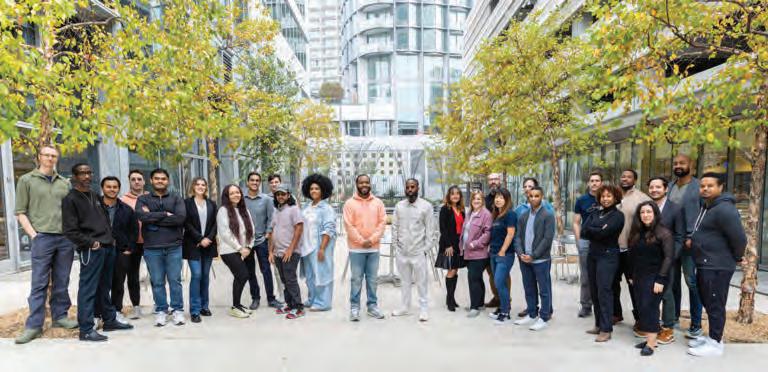
The growing interest surrounding SoLo Funds is seen in their latest milestone with 1.3 million downloads, as of this writing.
Additionally, the platform has also attracted investors such as Serena Williams’ Serena Ventures, Richelieu Dennis, Tim Weatherspoon, and his wife, Kelly Rowland, and more.
“SoLo is transforming the lives of everyday Americans with democratized access to capital

and returns that’s truly rooted in community. Community finance is working and SoLo is proof of that,” Serena Williams, Managing Partner at Serena Ventures, said in a news release. “We are proud to stand behind SoLo as it continues growing at an incredible pace and focuses on giving underserved groups and individuals the tools they need to thrive financially.”
https://www.msn.com/en-us/money/other/solofunds-becomes-first-black-owned-personal-financeplatform-with-one-million-registered-users/ar-AA182Q 09?ocid=msedgdhp&pc=W069&cvid=e0082560d380 4834b7989ea009940595&ei=31
111 March-April 2023 DAWN www.africabusinessassociation.org
Bernice King, Other Black Investors Make History Buying White-owned Bank
By Abu Mubarik
Edited by DAWN staff
A GROUP OF BLACK INVESTORS
based in Atlanta, GA has agreed to buy a white-owned bank, Holladay Bank & Trust, and convert it into a Black-owned one. The investors include Dr. Bernice A. King, a daughter of civil rights icon Dr. Martin Luther King Jr; Ashley D. Bell, a former White House policy adviser, and former NFL player Dhani Jones.
They plan to rename the institution Redemption Bank, according to Atlanta Journal-Constitution (AJC). What is more, the investors want to target financial services to Black communities historically underserved by financial institutions, providing online banking services and small business loans.
The deal, which is awaiting regulatory approval, will mark the first time Black investors purchased a non-Black bank. It will also be the first time in American history that an existing commercial bank would become a Black-owned Minority Depository Institution (“MDI”) through acquisition, a statement by Redemption Holding Company said.
“There’s never been a Black bank created through the acquisition of a non-Black bank,” Bell told Americanbanker. The platform adds that the investors plan to build the $68 millionasset institution into a national Small Business Administration 7(a) lender.
Bell will act as the executive chairman and CEO of Redemption Holding Co. while King will serve as the bank’s senior vice president for corporate strategy and alliances and sit on its advisory board.
Bell and King previously co-founded the National Black Bank Foundation, which has steered $600 million of deal flow into Black banks since 2020,
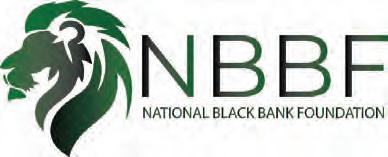
according to the statement. Data cited by AJC shows that in 2001, there were 48 Black-owned banks insured by the FDIC, however, that number has reduced to about 20 now.
Bell told AJC that more Black banks are critical for financial inclusion and wealth generation. He explained that the U.S. system has historically denied Blacks the opportunity to build wealth.
“This system has offered no grace and no mercy for Black people in our country,” Bell said. “We think that having a bank called Redemption, where grace and mercy will be bountiful for people who need it, is important.”
Holladay currently has only one branch and according to Federal Deposit Insurance Corp records, it currently has only 10 employees and ended 2022 with $68 million in loans and other assets under management. Holladay’s current management and staff will remain until the conclusion of the deal. They will be complemented by an experienced management team.
Dr. Bernice King and Ashley Bell are changing the mortgage loan industry with their other Fintech platform, Ready Life, which offers a path to homeownership that excludes credit scores from eligibility requirements.
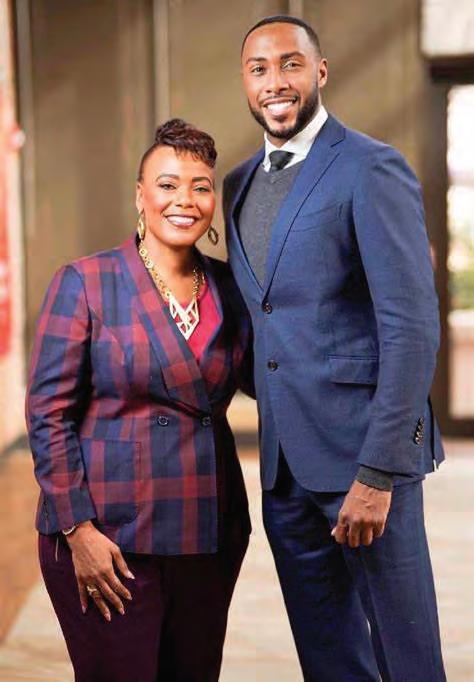
https://www.msn.com/en-us/money/ other/solo-funds-becomes-first-black-ownedpersonal-finance-platform-with-one-million-registeredusers/ar-AA182Q09?ocid=msedgdhp&pc=W069&cvid =e0082560d3804834b7989ea009940595&ei=31
Image credit: eurweb.com, TheGrio

112 March-April 2023 DAWN www.africabusinessassociation.org Investment - Interview
Alleged Security Breach Leaves Millions of Dollars Missing from Flutterwave Accounts
By Tage Kene-Okafor
LAST MONTH, FLUTTERWAVE, Africa’s largest startup by private valuation, was involved in a hack that resulted in over ₦2.9 billion (~$4.2 million) missing from its accounts, according to local tech publication Techpoint Africa
According to the documents seen by the publication and reviewed by TechCrunch, unknown actors transferred the funds across 28 accounts in 63 transactions in early February. Police investigations are ongoing as Flutterwave, via legal counsel and law enforcement parties, has filed a motion and seeks to freeze accounts across 27 financial institutions that interacted with the missing funds, Techpoint Africa reported.
Several tweets regarding the alleged hack have also come up over the weekend. Some provided information about the hack, while others complained about frozen accounts that might be related to the hack. According to Techpoint Africa, the motion filed that 107 accounts, including the fifth beneficiaries of those accounts, are to be placed on lien/Post-No-Debit (PND). This directive restricts bank customers from withdrawing funds from their accounts.
The cause and method of the attack remain unclear. However, one of the postulations from online commentary is that the hack might have been socially engineered, meaning that merchants’ keys were compromised, allowing the hackers to access the monies in their Flutterwave accounts.
Meanwhile, Flutterwave, via a statement on the matter, has denied that it was hacked.
At Flutterwave, we understand that our customers’ personal and financial information is of the utmost importance. We take this responsibility seriously and understand that any potential security breach can cause anxiety and concern among our customers. We want to reassure you that Flutterwave has not been hacked. As a financial institution, we monitor transactions through our
You may have recently heard some claims on Flutterwave's security. We want to assure you that Flutterwave has not been hacked, and no customer funds were lost.

Thank you for choosing us
Read more here : http://bit.ly/flwsecurity
transaction monitoring systems and 24-hour fraud desk and review any suspicious activity. We collaborate with other financial institutions and law enforcement agencies to keep our ecosystem safe and secure.
During a routine check of our transaction monitoring system, we identified an unusual trend of transactions on some users’ profiles. Our team immediately launched a review (inline with our standard operating procedure), which revealed that some users who had not activated some of our recommended security settings might have been susceptible.
We want to confirm that no user lost any funds, and we take pride in the fact that our security measures were able to address the issue before any harm could be done to our users.
Our commitment to keeping our users’ financial information safe and secure is why we invest heavily in security initiatives such as periodic audits, certifications, and licenses such as the PCI-DSS & ISO 27001. These are in line with global best practices in information security management.
We want you to continue to trust us and feel secure in using Flutterwave for your business needs. Our commitment is to enable your business growth while keeping your financial information safe and secure..
https://techcrunch.com/2023/03/05/allegedsecurity-breach-leaves-millions-of-dollarsmissing-from-flutterwave-accounts/ Image credit: Flutterwave
Investment 113 March-April 2023 DAWN www.africabusinessassociation.org
Report Shows Black Investors are Laying the Foundation for a More Inclusive VC Industry, but They Could Use Some Help
By Samantha Dorisca
BLCK VC, a nonprofit organization committed to enhancing the presence of Black investors in the venture capital (VC) industry, has recently released its annual edition of the State of Black Venture Report in partnership with Silicon Valley Bank.
The report, released on Feb. 22, sheds light on the current state of the Black venture ecosystem, analyzing various trends in leadership and representation within the industry.
According to a study conducted by Accenture, and shared by BLCK VC, Black investors exhibit a higher tendency to invest in Black founders.
The Crunchbase data obtained by BLCK VC, which had a sample pool of 113 Black investors, also mentioned that women and Latinx founders are more likely to receive funding from Black investors.
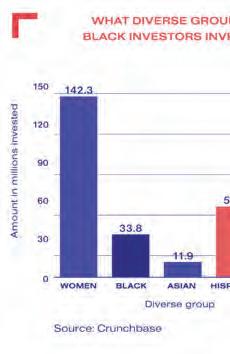
Furthermore, BLCK VC’s 2022 report showed Black investors left their firms or launched their own funds to achieve partner status at an increasing rate.
However, in its 2023 report, it decided to “look at these trends across varied career paths of Black investors to offer a more nuanced picture of the existing barriers.”
That said, within the past year, 57.5% of the sample has been promoted from analyst and associate positions while 42.5% have not, signaling a “positive trend” for those at the junior level.

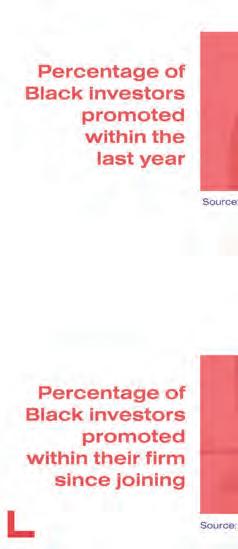
“It is crucial to acknowledge that most investors
in our sample have yet to be promoted within their firms at all. This suggests that Black investors often leave their firms in search of advancement, underscoring the need for clear career advancement paths and leadership development opportunities for Black investors within
It’s clear that there’s much more work to do to alleviate the current difficulties that minority entrepreneurs face in the venture ecosystem.
An associate at March Capital believes the best way to help diverse junior investors thrive is by providing mentorship.
“The venture industry has done a decent job of providing initiatives and support to seniorlevel Black investors, but I believe there should be an equal initiative to bring
114 March-April 2023 DAWN www.africabusinessassociation.org Investment
in diverse, junior investors, and then provide a very specific and very clear pathway to promotion for them so that they can grow within an organization,” Maya Matthews said, according to the report.

The report notes that 72.4% of Black juniorlevel investors are mentored by Black investors. However, to accelerate growth, it is important to ensure support expands beyond just Black investors.
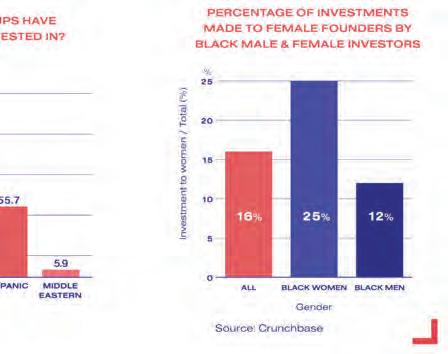
“Mentorship is critical because venture is ultimately an apprenticeship business,” Adam Kiki-Charles, a senior associate at Equity Alliance, said in a statement. “There’s stuff you can learn on your own, but a lot of education comes through experience, and the one thing that can help accelerate growth, particularly when it’s experiential, is being able to lean on other people who’ve been there already. So there’s obviously some aspects of this job that you only learn by doing, but having someone to save you from pitfalls and who can break down the rationale behind decisions, I think, is really valuable.”
https://www.msn.com/en-us/money/companies/ report-shows-black-investors-are-laying-thefoundation-for-a-more-inclusive-vc-industry-butthey-could-use-some-help/ar-AA189vsU

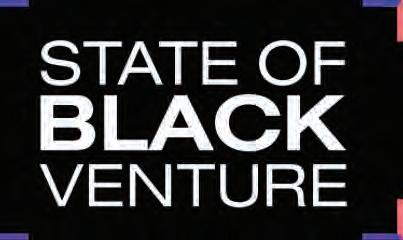
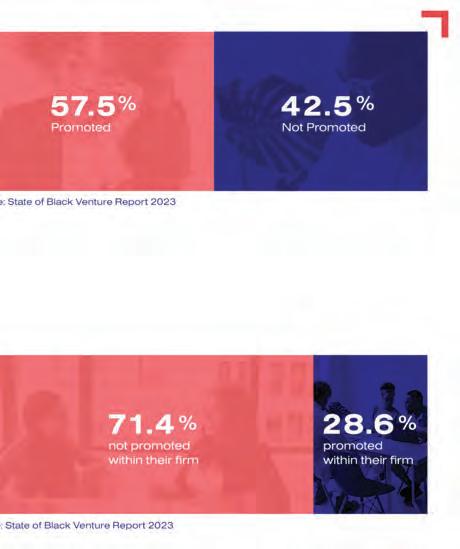
115 March-April 2023 DAWN www.africabusinessassociation.org
Google Meet’s 360-degree Virtual Backgrounds Move With You During Video Chats
 By Trevor Mogg
By Trevor Mogg
FOR THOSE WITH messy bedrooms or who simply want to retain an element of privacy during video chats, various videoconferencing tools have long offered ways to replace the real background with a virtual one.
Now, Google Meet has taken this one step further and launched 360-degree video backgrounds that use your Android or iOS device’s gyroscope to make a virtual background move with you instead of having it as a static image.
Current options put you in a temple or on a beach — in other words, locations that are likely to be dramatically different from your home office or living room, or whichever place you usually conduct your video chats from.
Google announced the new feature on its website, and included an example showing a man speaking from a sun-kissed lagoon.
Truth be told, the eye-catching scenery and abundance of movement may prove rather distracting for others in the call, but perhaps that distraction will fade after a short time. Also,
we’re assuming that the person with the background won’t really be moving around quite as much as the person in Google’s demonstration clip, which should limit any distraction.
It’s worth noting that an administrator has the ultimate say as to whether those in a call can replace their real backgrounds with virtual ones or use special effects.
Google Meet’s 360-degree video backgrounds are available now on Android and iOS devices for all Google Workspace users, and also for those with personal Google accounts.
In other recent updates to Google Meet, the web giant made improvements to reduce the visual glitches that can sometimes appear between the outer edges of a call participant and their virtual background.
And last month Google

also introduced emoji reactions to let call participants react to each others’ contributions.
With so many people switching to remote working during the early stages of the pandemic in 2020, it was rival application Zoom that became the go-to tool for those wishing to make video calls for work. The sudden change in work styles, and the massive success of Zoom, prompted Google and others to revamp their own videoconferencing tools to make them more useful in work and personal settings.
https://www.digitaltrends. com/mobile/google-meetintroduces-360-degree-virtualbackgrounds/
Image credit: ecruitmentcave. com, techjuice.pk

116 March-April 2023 DAWN www.africabusinessassociation.org Technology/Science
Pharrell
Williams' Black Ambition
Announces
its Third Annual Prize Competition to Award $1M
 By Ngozi Nwanji
By Ngozi Nwanji
Additionally, Black Ambition will provide HBCU students and alumni with the opportunity to win an HBCU Prize. The grand prize winner is set to receive up to $200,000.
ON MARCH 1, BLACK AMBITION announced that applications for the third annual Black Ambition Prize competition are now open until May 8, according to a press release shared with AfroTech.
The grand prize winner will receive $1 million, and at least 15 additional teams will receive prize awards of $15,000 to $250,000.
The press release detailed that Black Ambition has awarded funding and resources to 65 prize winners — totaling $6 million.
“We’ve accomplished so much in such a short time, and it’s been amazing to see our impact so far. Every year just gets better,” Williams said in a press statement. “It’s not just about creating space for our Black, Hispanic and HBCU entrepreneurs, it’s about equity, it’s about giving them the tools, resources and hands-on mentorship to excel uninterrupted. I am constantly blown away by the ideas and businesses that our applicants have developed and created.”
What’s more, finalists receive guidance from top-tier mentors to support their ventures.
“As we approach year three of the Black Ambition Prize, we continue to build on our legacy of supporting and empowering Black and Hispanic entrepreneurs to achieve unparalleled success,” Hatcher said in a press release. “This year presents even greater urgency with reports showing a drastic decline in funding for diverse founders in the venture space. The work that we’re doing is more important than ever. This year’s Prize is designed to provide a plethora of resources and opportunities to Black, Hispanic, and HBCU founders, allowing them to transform their innovative ideas into successful and impactful businesses.”
To be eligible, participants must:
• -Have or aspire to achieve a national or global business reach for their product and/or service
• -Have at least one founder or co-founder that identifies as Black/ African/African American and/or Hispanic/Latino/a/Latinx
• -Have a member of the founding team that is defined as having a senior role, such as a VP or C-level role
To be eligible, teams must have:
• At least one current HBCU undergraduate or graduate student (full-time or part-time)
• One recent alum within five years of graduation or one former student within five years of attending the institution who is a member of the founding team
• An HBCU-affiliated individual that identifies as Black/ African/African American and/ or Hispanic/Latino/a/Latinx
In addition to the prize competition, Black Ambition has launched an HBCU preaccelerator program. The press release detailed that Black Ambition is co-sponsoring an eight-week So Ambitious HBCU Pre-Accelerator Program, launched in partnership with 3 Day Startup and Cinematica Labs.
Applications open on March 1 and close on March 20 for the accelerator program.
To learn more, click here
https://afrotech.com/pharrellwilliams-black-ambition-thirdannual-prize-competition

117 March-April 2023 DAWN www.africabusinessassociation.org Technology/Science
Pharrell Williams and Felecia Hatcher, CEO
Inside NASA’s Big Plan to Bring the Inter
By Rebecca Heilweil
HUMANITY IS GOING BACK TO THE MOON
and this time we’re bringing the internet.
Last year, NASA launched Artemis 1, the first in a series of missions that aim to return American astronauts on the lunar surface, and, eventually, establish a permanent U.S. base camp. Now, the agency is preparing for an equally important objective: making sure that when future astronauts do finally land on the moon, they’ll be able to post a selfie.
The U.S. space agency is in the early stages of developing LunaNet, a nascent but critical plan to build an internet network for the moon. Of course, the effort is about far more than just allowing astronauts to snap a few selfies. Compared to the historic Apollo missions, which focused on bringing humans to the moon for the first time, the Artemis program has loftier goals. NASA is planning to construct a wide range of infrastructure on and around the moon, including a human habitat, a new space station, and a lunar web service that can keep everything connected.

“On Earth now, we also have all the cellphone towers and WiFi hotspots and things to give us network connectivity, and that really changed the way that we go about our daily lives,” says Dave Israel, a principal investigator and division architect at the NASA Goddard Space Flight Center. “What we want to do is make that experience possible for the astronauts and robotic missions that are going to the moon, and then—in the future—to extend it up to Mars and wherever we’re going to go.”
There are challenges, though. Transmitting data between Earth and the moon isn’t exactly easy, particularly from the lunar south pole and the far side of the moon, which doesn’t directly face Earth. Transport presents another hurdle: Trips to the moon aren’t too frequent, so actually transporting the lunar internet equipment may take quite some time. Several upcoming launches— including the crewed Artemis II mission currently scheduled for 2024—will involve demonstrations of moon communications technology. Still, Israel
says he doesn’t anticipate things getting fully up and running until later this decade.
ONE BIG STEP FOR SPACE INTERNET
Here on Earth, we’ve used satellites in our orbit to connect the web (especially on planes) for years. And companies like SpaceX, OneWeb, and Amazon are currently in the process of building out networks of thousands of satellites in low-Earth orbit to provide even faster service from space. The International Space Station is also hooked up to the web. Unfortunately, the same can’t be said about the moon.
“The data rates that customers are currently getting on the moon on is like dial-up—it’s not even like dial-up—it’s like dial-up you’re fighting to get access to,” explains Kelly Larson, the CEO of Aquarian Space, a startup that focuses on lunar communications.
To improve service, NASA is planning to launch lunar satellites that will connect with each other, and then back to communications infrastructure on Earth. Relay spacecraft will be
118 March-April 2023 DAWN www.africabusinessassociation.org Technology/Science
particularly helpful for the harder-to-reach areas of the moon, like the far side and the lunar south pole, which the space agency is hoping astronauts will eventually explore. NASA will also deploy a series of ground stations, which will essentially work like cell towers, on the lunar surface. In theory, lunar communications will work less like a phone line and more like an internet network.

Private companies have a role to play in building this new internet infrastructure. Aquarian Space, for example, is planning to launch its first lunar communications satellites in the second quarter of 2025, and eventually hopes its tech will eventually offer a 100 megabit-per-second, 24-7 lunar surface. NASA is also working with Nokia to build a 4G cellular network for the moon. The company has already won a more than $14 million contract from the space agency, and its first base station—along with radio equipment—should be delivered to the moon via a SpaceX rocket scheduled to launch sometime next year.
“It doesn’t look that different to us compared to a mine or a rig or a remote wind farm or a factory,”
explains Thierry Klein, the president of Bell Labs Solutions Research at Nokia Bell Labs. “It just happens to be very far away. It just happens to be very harsh. But from a communication perspective, it just looks like the extreme version of what we do every day.”
The European Space Agency is working on a parallel project, called Moonlight, which aims to recruit companies to build lunar telecoms infrastructure, too.
Much of the motivation behind the moonshot internet service is actually about basic logistics. As human visitors and robots start trekking across the surface of the moon in greater numbers, they’ll need a communications network to help them with directions—somewhat like the global positioning system (GPS) we use here on Earth. The future LunaNet may also play a role in keeping a standard time on the moon, which will be critical to scheduling activities on the moon’s surface and in lunar orbit. The web service could also help monitor astronauts’ health and track the equivalent of lunar weather, explains Israel.
“We’re planning and expecting to see lots of high data rate video coming back from the moon, and for those of us on Earth to really be able to experience along with the astronauts when when they’re there,” he says.
NASA is hoping that the network will expand as activity on and around the moon grows. The agency expects that with the arrival of Lunar Gateway, its new lunar space station, the moon will need about 210 megabits per second and 4.6 terabytes per day, according to a slideshow created by the space agency last year. By 2035, or around when NASA anticipates gearing up for a human mission to Mars, the moon may need as much as 950 megabits per second and 12 terabytes a day.
Even in the short term, demand for lunar internet is expected to rise. There were only 13 assets, including several lunar landers and rovers, on and
see page 120
rnet to the Moon 119 March-April 2023 DAWN www.africabusinessassociation.org
Internet on the Moon from page 119
around the moon in 2021, according to Aquarian Space. The company says that projections show that by the end of the decade, there may be between 200 and 250.

SKY-HIGH GEOPOLITICAL STAKES
Whoever shapes the internet on the moon will hold a remarkable amount of power, from dictating how network providers work together to handing out lunar web addresses. While the U.S. is racing to corral other countries and space agencies under the umbrella of its Artemis Accords—a set of international principles meant to guide exploration and development of the moon and outer space— there’s no guarantee that everyone will sign on. Notably, Russia and China are collaborating on their own lunar projects.
“The moon is the eighth continent for Earth
It will matter which country is able to offer internet capabilities that can address the needs of a diversity of actors that are planning on getting to the moon in the next decade,” says Namrata Goswami, a space policy expert and author of Scramble for the Skies: The Great Power Competition to Control the Resources of Outer Space. “The country that will be able to offer the most cost-effective lunar internet package will win the race.”
Of course, it might be a while before the lunar internet seems that pivotal, especially in our daily lives. At least in the beginning, much of the network will facilitate communications between robots and professional astronauts, and will primarily assist missions taking place hundreds of thousands of miles from Earth. In many ways, this major expansion of the web will initially be invisible, and limited to a few government agencies and companies. But that doesn’t bother the people working on LunaNet. They’re hoping that the future of moon internet will mirror the story of the original web, which got its start in the 1960s as a way to send information between a network of computers. At the time, no one was thinking about Facebook and Uber, but it was that decades-old core technology that eventually enabled these services, which, in turn, changed the world. People like Israel, the investigator from NASA, believe their work will similarly serve as a technical foundation for the moon, and, eventually, the rest of the solar system. “Taking a selfie, and then saying, ‘Hey, check it out, here’s me on the moon,’ and clicking send,” he says. “I’m part of making that happen.”
https://www.fastcompany.com/90855630/nasaplans-to-bring-internet-to-the-moon
Image credit: NASA/Reese Patillo, tempo.gsfc. nasa.gov, esc.gsfc.nasa.gov, Behance
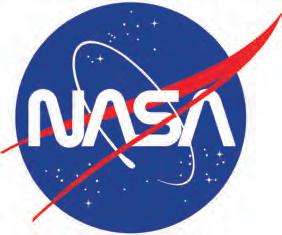
120 March-April 2023 DAWN www.africabusinessassociation.org Technology/Science




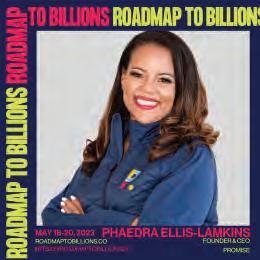
121 March-April 2023 DAWN www.africabusinessassociation.org Roadmap
the largest conference of
founders" will be held May 18-20, 2023 at the Brooklyn Navy Yard. Register NOW!
to Billions "
black female tech
Fearless Foundation and Amazon's Black Business Accelerator Award $1 Million Dollars for Their Black Women Entrepreneurs Grant Program
 From BLACK ENTERPRISE Editors
From BLACK ENTERPRISE Editors
FEARLESS FOUNDATION , the philanthropic arm of Fearless Fund, the first venture capital fund built by women of color, for women of color, has partnered with Amazon’s Black Business Accelerator for a multi-phase grant program that will bolster Black women-owned, consumer product-based business.
Through this unique cohort, Black womenowned businesses are receiving grants in amounts between $10,000 – $20,000, in addition to enrollment in Amazon’s Black Business Accelerator, which is dedicated to providing growth opportunities for Black-owned product-based businesses selling in Amazon’s store. This marks a significant opportunity for greater representation in retail as only 6% of US retail businesses have a Black owner, despite Black Americans representing 14% of the US adult population as of data from 2020 (Hello Alice).
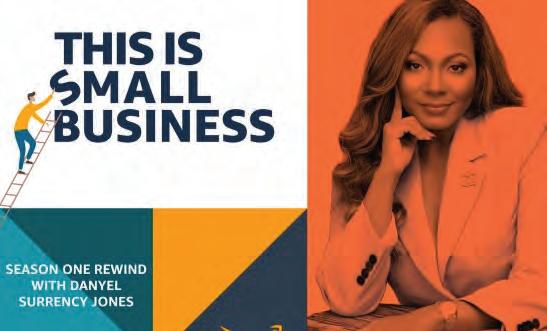
“We are excited to enroll business grant recipients in Amazon’s Black Business Accelerator, giving each brand access to an unparalleled network of mentors that will allow them to reach their professional goals,” says Arian Simone, CoFounder and General Partner of Fearless Fund.
Mission-driven partnerships are critical to stimulating economic growth. We are excited to partner with the Fearless Fund to support 75 incredible Black women entrepreneurs in achieving their dreams. By participating in Amazon’s Black Business Accelerator, founders will access a suite of resources, including financial assistance, business education and coaching, and marketing support. BBA supports the success
of Black-owned businesses by providing a place for their businesses, to start, scale, and create a community to encourage and inspire them along the journey. We believe, when we knock down barriers for Black-owned businesses, through those learnings, we unlock the door for all small businesses to thrive. We stand firm in our vision to target systemic barriers and leverage our entire community to create sustainable pathways to equity that build generational wealth for not only Black-owned businesses and Black women-owned businesses, but all underserved businesses,” says Danyel Surrency Jones, Director, and Head of Amazon’s Black Business Accelerator.
Grant Recipients:
◊ Kimberly Shamsiddin, Al Shams Abayas
DAWN www.africabusinessassociation.org 122 March-April 2023 Technology/Science
◊ Roshonda Coleman, Anointed Hands Salon & Products
◊ Brittny Phillips, Articulate Hands
◊ Ife Obi, Back To You by The Fit In
◊ Sophia Danner-Okotie, Besida
◊ Kimba Williams, KUSHAE
◊ Kelli Palmer, Breedlove Beauty Co.
◊ Myriam Simpierre, Buy Better Foods Corporation
◊ Dana Harris, Coffee Treasures In A Box
◊ Felicia Jackson, CPRWrap, Inc.
◊ Karen Flowers, Curl House
◊ Iyonna Woods, Fancy Free Hair & Skin
◊ Melissa Samuel, Finesseyourclaws LLC
◊ Gineen Cargo, Gavin Christianson Bridal
◊ Kristen Dunning, Gently Soap
◊ Melaina Glanton, Goddess Beauty Skincare
◊ Keicha Danzie, Good Boy Goodies
◊ Colette Glover-Hannah, Hannah’s Shoebox, LLC
◊ Ashley Milligan Nesbit, Healthy Muhf#@kin Hair
◊ Hope Webb, Imani Girl Boutique LLC
◊ Tyler Clark, Inspire by Tyler
◊ Nikia Londy, Intriguing Hair
◊ Krystle McKay, K.Lorayne Apparel
◊ Abena Slowe, Karité LLC
◊ Keya Martin, Keeyahri
◊ Keva Johnson, Keva J Swimwear
◊ Kimo Bentley, Kimo Bentley MedSpa
◊ Mia Campbell, KING ME Custom Jewelry
◊ Sherrie Wilson, Krowned
◊ Arah Sims, Kyutee Beauty
◊ Kimberley Napoleon, Loc’d n Naturally
◊ Ariane Turner, Look Good Live Well
◊ Sierra Breckenridge, Mama Sisi LLC
◊ Megan Smith, Megan Renee LLC
◊ Krystal Duhaney, Milky Mama
◊ Onaedo Achebe, Minti Oral Care **
◊ Wendy Ann George, Mosheen Spice Naturals
◊ Jennifer Peets, Naked Bar Soap Co.
◊ Chrissy Cabrera, Naturally London
◊ Rasheedah Loharsingh, Naturals Republic Inc.
◊ Nikita Johnson, Nikita’s Beauty Bar
◊ Taylor Long, Nomads Swimwear LLC
◊ Olatomide “Tomide” Awe, Olori
◊ Nadine Joseph, Peak and Valley
◊ Rachel James, Pear Nova
◊ Twana Moore, Personally She
◊ Piper Barley, Posh Hair District
◊ Taylor Freeman, Pynk Matrixx
◊ Onikeh Brown-Wilson, Satin Pavement
◊ Cynthia “Cindy” Tawiah, Shades Of U
◊ Shika Myrickes, Shika and Company Extensions

◊ Jasmine “Symoné” Gates, Sincerely, Bädé
◊ Skye Loy, SkyeLight
◊ Tenita Strand, Status Co. Leather Studio
◊ Tamekia Geer, TamGee Artistry Studio
◊ Erika Collins, The Hanan Project
◊ Jade Akinrolabu, The Lazy Hat
◊ Erika Massaquoi, THE OULA COMPANY
◊ Kamilah Campbell, The Pink Locket
◊ Ashli Goudelock, The Tsuri Company
◊ Markea Dickinson-Frasier, Thermaband
◊ Valerie Blaise, VAVVOUNE
◊ Jasmine Lewis, Vie Beauty
◊ Leah Hernandez, Young Authors Publishing
◊ Donnya Negera, YUUMA
https://www.blackenterprise.com/fearless-foundationand-amazons-black-business-accelerator-award-1million-dollars-for-their-black-women-entrepreneursgrant-program/ Image credit: stitcher. com, sell.amazon. com

123 March-April 2023 DAWN www.africabusinessassociation.org
DON’T EVER LET SOMEONE
tell you your “little talent” won’t take off. Just ask Georgiana Viou
Viou is a self-taught African chef from Benin who just received a star from the Michelin Guide, according to The Associated Press. Known as the holy grail of cooking, Viou received the star for her cuisine at her restaurant, Rouge, located in Nimes, France. A total of 44 stars were awarded, however, Viou stands out as being awarded as the only woman working single-handed.
The 45-year-old is proud of her Benin heritage, and has already published several books. Viou described her food as a mix of
SELF-MADE: African SelfTaught Chef Awarded Star by Michelin Guide
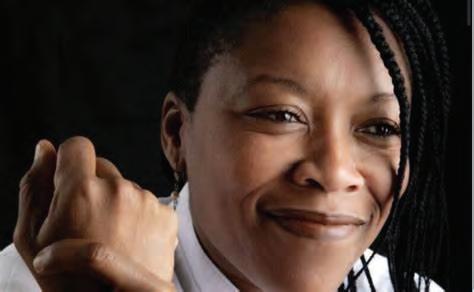 By Sharelle Burt
By Sharelle Burt
over. She climbed the ladder in the culinary world and started to make a name for herself.
French Mediterranean drizzled with Benin’s feel good texture, crowned for her “singular cuisine … celebrating her Mediterranean environment and Benin roots.” The chef said she was overwhelmed by this recognition. “Today is really top,” Viou said. “At Rouge, we’re not a team. We’re a family,”
Her cooking journey started by watching her mother, who owned a small restaurant in Cotonou, Benin; but that wasn’t always her dream. The Seattle Times reported Viou came to France in the late 90’s hoping to become an interpreter. She landed a job at a communications agency until her love for cooking took
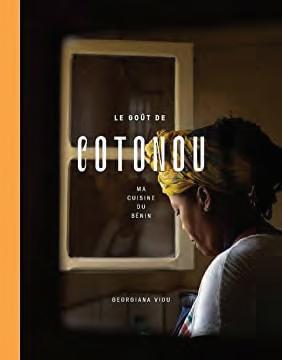
Just last year, Viou was on the jury of the hit TV show MasterChef, years after being a contestant. She thanked her grandmother for giving her the strength to persevere, as the culinary industry can be looked at as an all-boys club. She claimed to not like being categorized due to her skin color to gender, saying that “it’s completely ridiculous.” Viou wants the food to speak for itself.
Viou stands on the shoulders of other women and self-taught chefs who have walked away with a star. Anne-Sophie Pic has won three times and Eric Girardin started his career as an electrical engineer.
https://www.blackenterprise. com/self-made-african-selftaught-chef-awarded-stars-atmichelin-guide/


Books: https://www.amazon. com/stores/Georgiana-Viou/ author/B0052EO9F6
Image credit: objectifgard.com
124 March-April 2023 DAWN www.africabusinessassociation.org Lifestyle/Culture
PHARRELL WILLIAMS HAS
been named the newest men’s creative director of Louis Vuitton.
The award-winning producer and creative made it official in a post shared across social platforms.
The title was previously held by the late Virgil Abloh, who became the first Black designer to be positioned as a creative director at the company, before his passing in 2021 from cancer.
Williams will take on the torch in already familiar territory, having already collaborated with the brand in 2004 and 2008 with his “1.1 millionaires” glasses. USA Today reports Abloh had pulled
Pharrell Williams Succeeds the Late Virgil Abloh as the Men's Creative Director for Louis Vuitton
By Samantha Dorisca
the eyewear for his very first collection with the

luxury fashion house.
According to a statement, Louis Vuitton was drawn to Williams for his creative endeavors in music, art, and fashion, which has placed him as a global icon for over two decades.
“The way in which he breaks boundaries across the various worlds he explores, aligns with Louis Vuitton’s status as a Cultural Maison, reinforcing its values of innovation, pioneer spirit, and entrepreneurship,” the statement read.
“I am glad to welcome Pharrell back home, after our collaborations in 2004 and 2008 for Louis Vuitton, as our new Men’s Creative Director. His creative vision beyond
fashion will undoubtedly lead Louis Vuitton towards a new and very exciting chapter,” said Pietro Beccari, Louis Vuitton’s Chairman and CEO, in a statement.
Williams’ first collection with the luxury brand is slated to be revealed in June during Men’s Fashion Week in Paris.
Williams’ work in fashion extends to the streetwear brand Human Made, created in partnership with Japanese designer Nigo in 2010. The pair are also co-founders of the Billionaire Boys Club, created in 2005, which spawned the following:
Ice Cream Bee Line
Billionaire Girls Club.
https://afrotech.com/pharrellwilliams-is-the-mens-creativedirector-of-louis-vuitton?item=2
Image credit: Highsnobiety
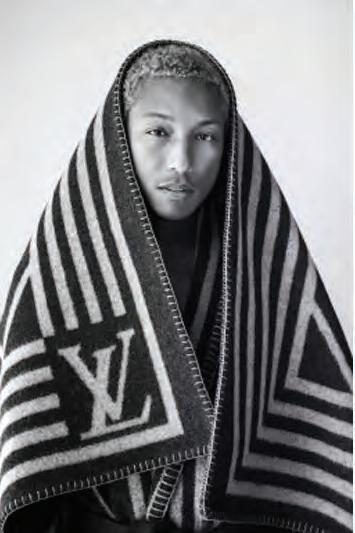
125 March-April 2023 DAWN www.africabusinessassociation.org Lifestyle/Culture
For International Wome
Amal Clooney, Melinda French Gates, and Michelle
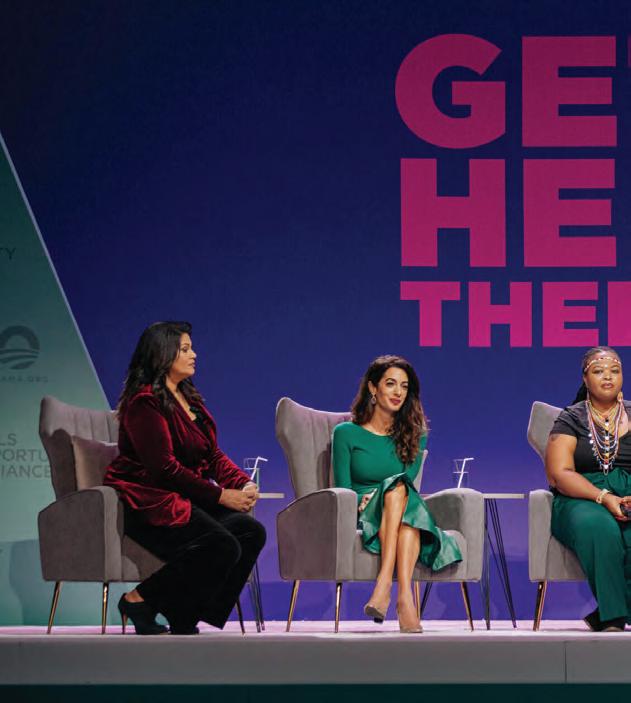
IT WAS THE MIDDLE of the night in Kenya, and 11-year-old Miriam was hiding outside a stranger’s house, waiting to talk to the woman who lived inside. Miriam hadn’t met her before, but she knew her name: Dr. Kakenya Ntaiya, who ran a school for girls at risk of child marriage.
When Dr. Ntaiya emerged, Miriam told her everything—how she’d just finished fourth grade, how her father had died in an accident, how her family was running low on money, and how, to help pay the bills, they were planning to marry her off for a dowry. Miriam had already seen her friends marry and quit school. She was desperate to avoid that—and Dr. Ntaiya was her only hope.
Each year, an estimated 12 million girls around the world, including in the United States and Europe, find themselves in Miriam’s situation because they’re caught in a web of economic, educational, and cultural systems that deprive them of choices and opportunities.
Globally, child marriage is one of the biggest threats to girls’ empowerment and education. As the data shows, marrying young has dire consequences: Child brides are more likely to leave school, experience violence, struggle to earn an income, have an unintended pregnancy, and suffer a miscarriage or die during pregnancy.
But when girls go to school, we are all better off: poverty goes down, economies grow, and babies are born healthier. The ripple effects extend throughout countries and across the globe.
As climate change and natural disasters threaten crop yields, COVID-19 continues to constrain businesses and livelihoods, and inflation raises prices and pushes people into poverty, the pressure on families only grows. And that means
their daughters will continue to be used as pawns in an economic and sociocultural game in which they have little or no power.
That’s something Dr. Ntaiya knows too well.
When she was just 5 years old, she was engaged to be married. Like Miriam, she desperately sought a way out and knew that education was her best solution. So she made an impossible decision. At 12 years old, she agreed to undergo female genital mutilation (FGM) if her father allowed her to complete her education. He agreed.
Years later, she founded an organization to protect girls from child marriage, abuse, and FGM, and set them on a path to higher education. What did she call it? Kakenya’s Dream
When she met a panicked Miriam outside her
126 March-April 2023 DAWN www.africabusinessassociation.org Lifestyle/Culture
• Amal Clooney is a human rights lawyer and c
• Melinda French Gates is founder of Pivotal Venture
• Michelle Obama is the former First Lady of the Unit
e Obama Share 3 Ways to Help End Child Marriage
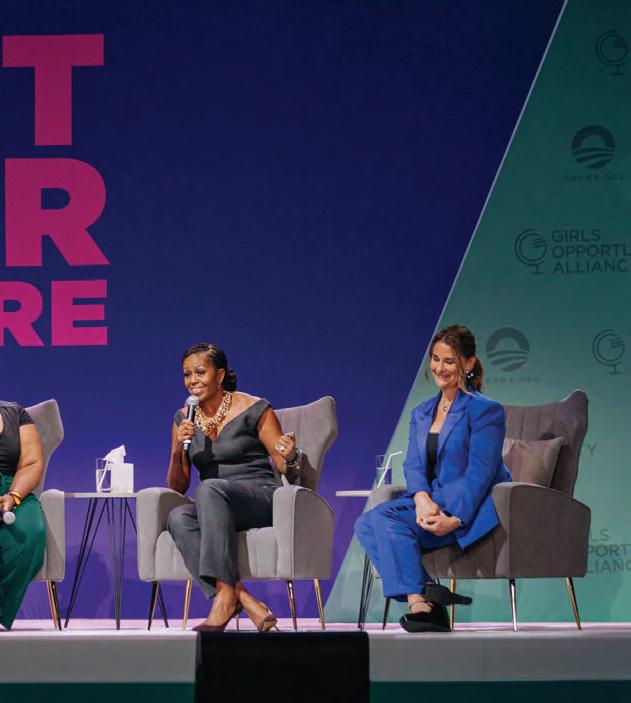
house, it was an easy decision for her—yes, of course Miriam had a place at Kakenya’s Dream. Yes, of course she could get her education.
The three of us hear stories like Miriam’s as a call to action. Our partnership is grounded in our belief in the value of every girl and a shared commitment to seeing girls everywhere reach their full potential. Child marriage is a barrier to the better, more equal world girls deserve. That’s why our organizations—and our partners at Girls First Fund, Girls Not Brides, and VOW for Girls are joining forces to help end the practice once and for all.
Together, we are working to increase funding for this issue, support civil society-led efforts, and amplify the voices of the girls and leaders
who are driving real change in their countries and communities.
We know this is not an easy endeavor—there are many social, religious, and cultural norms that have upheld child marriage over centuries. But we also know that change is possible. There are interventions that work to reduce these marriages— and ultimately, will end them altogether. We’re focusing on three.
First, we are joining women and girls in taking legal action to advocate for their rights.
In far too many countries, child marriage is legally permitted. Often, girls themselves are leading efforts to reform these laws and increase girls’ access to education. For example, a courageous group of girls led by a young woman named Memory Banda successfully persuaded the Parliament of Malawi to adopt a constitutional amendment raising the legal age of marriage to 18 in 2017. Collective action and strategic litigation have also improved child-marriage laws in Uganda, Zimbabwe, Indonesia, and elsewhere.
We’re also teaming up with local leaders to reform discriminatory laws and ensure that women and girls have access to legal information and services so they can exercise their rights. For instance, in the African Court of Human and Peoples’ Rights, a landmark case challenged Tanzania’s policy of banning married and pregnant girls from school. The government has since announced a U-turn on this policy, which impacts 1 in 4 adolescent girls in the country. And we are supporting the establishment of “women for women” legal-aid clinics to connect women and girls to lawyers who
see page 128
en's Day
2023
- March 8,
127 March-April 2023 DAWN www.africabusinessassociation.org
co-founder of the Clooney Foundation for Justice es and co-chair of the Bill & Melinda Gates Foundation ed States and founder of the Girls Opportunity Alliance
Michelle Obama Melinda French Gates
End Child Marriage from page 127
can support them at no cost.
Next, we are supporting grassroots organizations that are transforming their communities.
Grassroots organizations like Kakenya’s Dream are part of a movement of organizations on the ground that have proven their ability to change hearts and minds.
In Nepal, the Janaki Women Awareness Society teaches young girls about their own rights and how to push for them within their families. Their approach is to coach girls through the process of self-advocacy and help them avoid marrying until they are ready. In Uganda, Resilient Women’s Organization (RWO) runs a shelter for girls who have escaped gender-based violence, are experiencing crisis pregnancies, or have removed themselves from abusive circumstances. Without RWO, these girls and young women would have no place to turn.
Finally, we’re working to equip girls and families with the most powerful tool to prevent child marriage: an education.
Keeping girls in school, particularly secondary school, is one of the surest ways to prevent child marriage. And educating girls in one generation can delay marriage across several generations. Today, more than 100 million girls are out of school, and it’s critical that their families and communities see their education as a basic right and important investment in our shared future. When girls are educated, they succeed. And in turn, we all do.
In the years since Miriam first met Dr. Ntaiya, she’s not only completed school, she’s married a man she loves — a man she chose. They’re raising livestock and harvesting sugarcane to earn money. And they’re raising a family together, too.
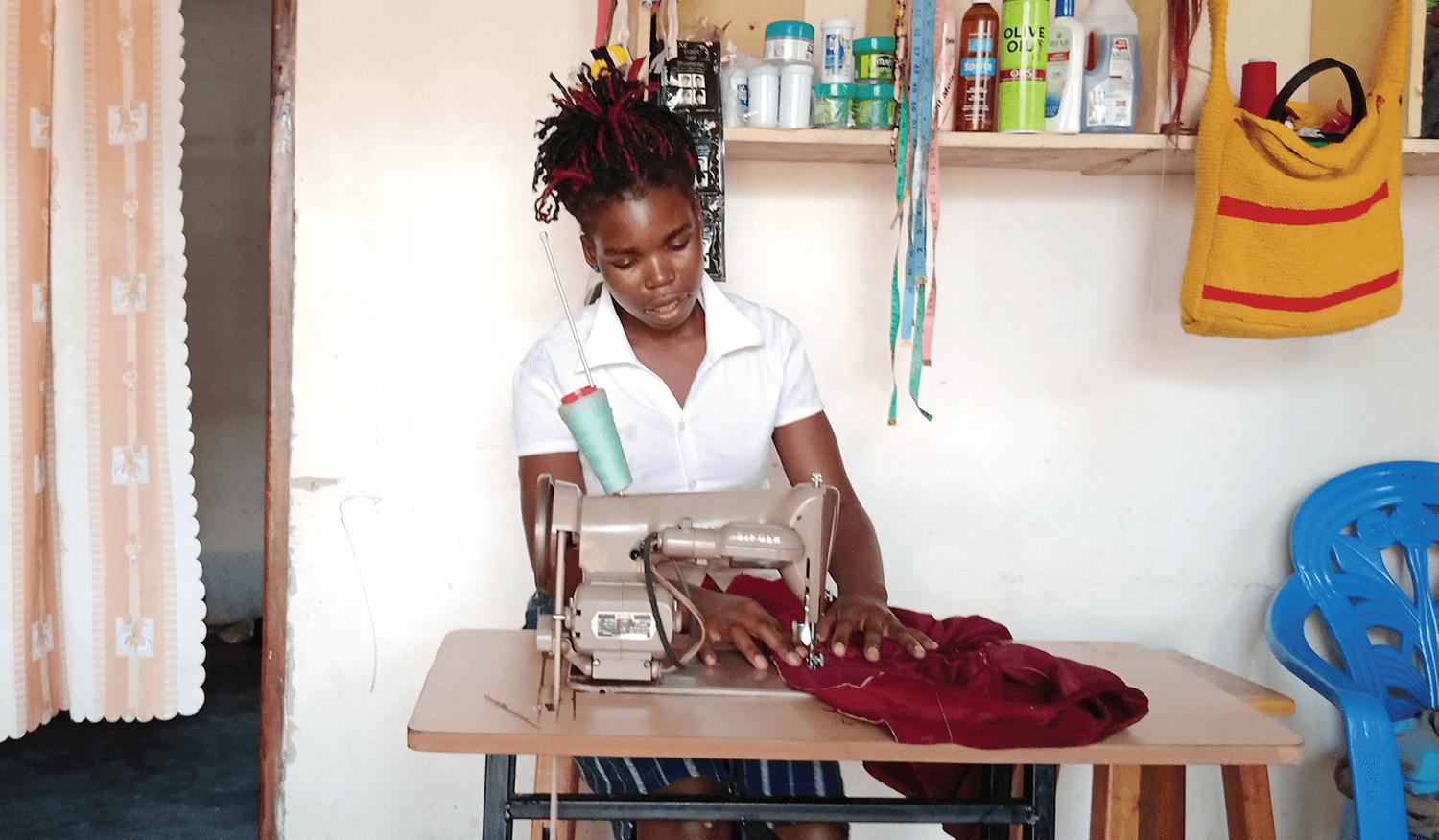
There are millions of stories like Miriam’s, and each of these girls deserves the same chance to live a life worthy of her dreams. That is only possible in a world without child marriage. We hope you’ll join us in taking action to end this practice and unlock a more equal future.
https://time.com/6260844/ending-child-marriageamal-clooney-melinda-french-gates-michelleobama
Image credit: cfj.org, resilientwomenuganda.org
128 March-April 2023 DAWN www.africabusinessassociation.org Lifestyle/Culture
Resilient Women's Organization
Eve
L. Ewing
Becomes


First Black Woman to Write Main ‘Black Panther’ Comic Series
By Amber Corrine
IN 2023, BLACK HISTORY is still being made — even in the comic book space.
Marvel Comics has now enlisted Chicago writer, scholar and organizer Eve L. Ewing as the first Black woman to pen a Black Panther comic under its titular series.

“The watershed moment comes less than 30 years after Black writers were not allowed to direct the flagship comic,” states Shine My Crown.
The super hero Black Panther made its debut in 1966 as part of the 52nd issue of the Fantastic Four comic. The character, originally named “Coal Tiger,” was created by Jack Kirby and the issue was written by Stan Lee. Now the hero will receive its next storyline from a Black woman.
In Ewing’s interview with Comic Book, the “Ironheart” penciler spoke on the historic Marvel opportunity and how she plans to “not reboot, but build” upon the Wakanda world, “in continuity.”

Paying homage to Black women who have added pen game to the character’s storyline before her, she stated to CB: “I’ve actually been thinking about it less in terms of those qualifiers, just because the Wakandan space is an arena where there have been several Black women writers – from Yona Harvey to Roxane Gay to Nnedi Okorafor – and also because I’m so excited that some awesome Black women, Black non-binary writers, and just dope people of color, in general, have come on board at Marvel even since I was first writing ‘Ironheart’ in 2018.
“More than anything, I’m bowled over at the opportunity to write such a marquee character. I see it as a big responsibility,” she added. “Black Panther is a tremendously important legacy character for Marvel fans, but moreover, the character has become one of the most important icons in pop culture for people of the African diaspora all over the world.”
Speaking to what she plans to expound upon in the forthcoming comic series, she stated that the focal point will elaborate on T’Challa’s story, and show a side of the powerful Wakandans, “as you’ve never seen them before.”
“As always, you can expect some unexpected visitors from various corners of the Marvel universe,” she revealed. “Virtually everything in this arc will be about T’Challa, and Wakanda, as you’ve never seen them before. New friends, new foes, but all with the goal of doing some worldbuilding in Wakanda and filling out the fabric of the nation in what I believe are some pretty cool new ways.”
The next Marvel Comics series in the Black Panther franchise is expected to release this June, with Ewing’s opining arc as “noir.”

https://www.vibe.com/news/entertainment/ eve-l-ewing-first-black-woman-black-panthercomic-1234729588/#!
Image credit: crownschool.uchicago.edu, Marvel Comics

129 March-April 2023 DAWN www.africabusinessassociation.org Lifestyle/Culture ld
Cool New Experiment Explains Why We Evolved Curly Hair
By Carly Cassella
TO OTHER PRIMATES, humans must look extremely odd. We are the only species with a general lack of fuzz, and yet for some reason, we have a whole bunch of hair sprouting from random spots on our body, like the summit of our heads.
Scientists still don't really understand why that is, but new evidence supports the theory that our scalp hair evolved to help us stay cool
This built-in sun-guard might seem like an obvious benefit to a generous mop, but science needs hard data. When a thermal manikin was given a wig of human hair to wear in a climatecontrolled chamber, researchers
found the manikin did not absorb as much heat as when it was bald.
Researchers tested multiple different types of wigs on the manikin, including ones with straight hair, loose curls, and tight curls.
Ultimately, the wigs all performed in similar ways when under the hot lights of lamps, but tightly curled hair was the best at keeping the manikin cool from the 'solar' radiation above.
The results, which are yet to be peer-reviewed but are publically available on the pre-publish server bioarxiv, suggest that any type of barrier on the top of the head reduces heat gain from the Sun and, in turn, the need to sweat.
The findings suggest that scalp hair evolved in response to our species' upright posture and our increasingly large brains.
"[T]he emergence (or retention) of scalp hair may have struck an optimal balance between maximizing heat loss across the large surface area of the body and minimizing solar heat gain on the small surface area of the


scalp, directly over the brain," researchers write.
"Tightly curled hair may provide an additional reduction in heat influx beyond the capacity of typically straight mammalian hair."
Tightly curled hair is a trait not seen in any other wild mammal. Clearly, there's something about the human experience that gives preference to this type of scalp coverage
For years now, scientists have hypothesized that scalp hair, specifically curly hair, evolved as a thermoregulatory response. But experiments in 1988 found that bald men sweat two to three times more than men with scalp hair. At first, this was used to argue that hairless heads are better off at keeping the head cool.
A more recent study in 2010, however, found that bald heads simply absorb more heat, requiring more sweat in turn.
130 March-April 2023 DAWN www.africabusinessassociation.org Lifestyle/Culture
The current experiments are the first to explore how scalp hair affects a person's overall thermal load, not just a body's sweating response.
"Our findings confirm that, regardless of texture, hair acts as a barrier that decreases heat loss from the body (in this case, the scalp) to its surroundings," researchers write.

Tightly curled hair, however, doesn't lie flat, which means it allows the scalp to 'breathe' better, while still protecting it from the Sun
As the curliness of a wig is increased, experimenters found less sweat evaporation would
have been needed to shed heat from the scalp, thereby conserving water and energy.
A manikin in a climatecontrolled chamber is, of course, not wholly realistic. Further research should be done outside with human participants to see how scalp hair might have evolved to function in a more natural setting.
In a hypothetical sense, however, the findings of the current experiment give credence to the idea that human hair evolved to adapt to a bipedal lifestyle, especially in hot and arid regions where drinking water was scarce.

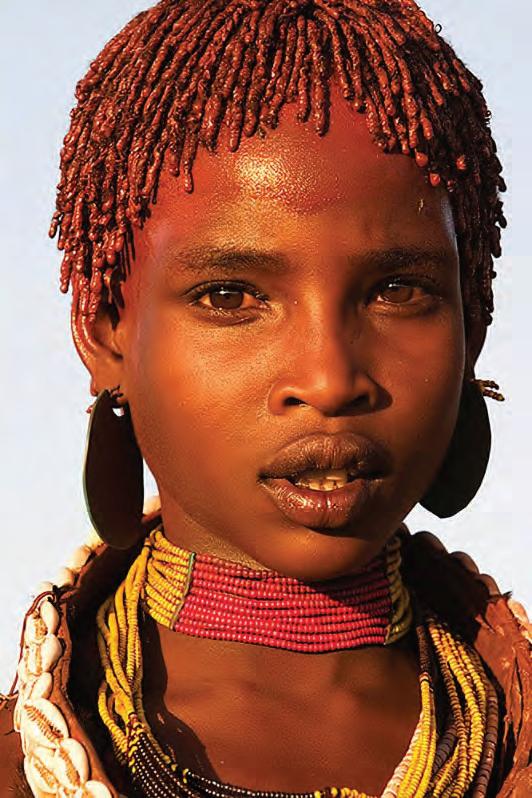
In this environment, experts think curly hair might have allowed our ancestors the ability to partake in longer, "strenuous physical activity before needing a drink of fresh water."
Maybe a frizzy head in high humidity isn't such a curse after all.
The study was published in bioRxiv.
https://www.sciencealert.com/coolnew-experiment-explains-why-weevolved-curly-hair
Image credit: @beautyspaceke, The YOU, okclipart.com, egyptsearchreloaded.proboards. com, egy-king.com, Pinterest
131 March-April 2023 DAWN www.africabusinessassociation.org
Excitement as Rwanda Receives NBA Africa Sports Facility
By Amon Nuwamanya
SPORTS ENTHUSIASTS were ecstatic this week as Rwanda received a sports facility that will allow aspiring athletes to have their chance at the game, thanks to partnership between Rwanda and NBA Africa.
NBA Africa, an academy established by the National Basketball Association (NBA) to promote the basketball game on the African continent, on Friday handed over a newly-renovated indoor basketball court in Kigali, located at Lycée de Kigali, which youngsters will take advantage of.
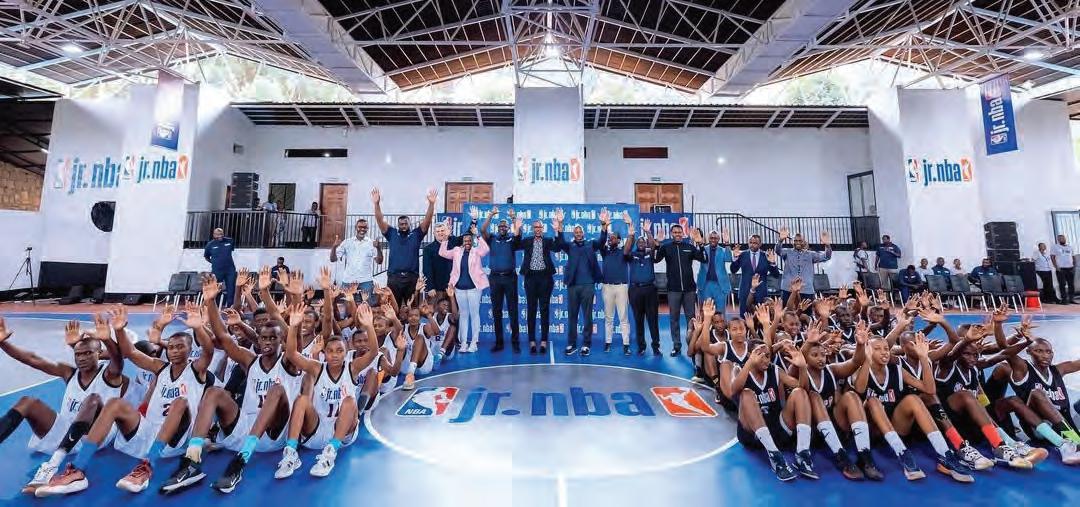
The court, which will benefit more than 4,000 youth from Kigali and the surrounding communities will Provide More Opportunities for Thousands of Rwandan Youth to Learn and Play the Game.
The court, was unveiled by the Minister of Sports Aurore, Mimosa Munyangaju, FERWABA President, Desire Mugwiza, NBA Africa CEO Victor Williams, NBA Africa Head of Strategy and Operations George Land, and NBA Africa Head
of Basketball Operations Franck Traore, among other officials.
The court, was unveiled at a ceremony held at Lycée de Kigali by Rwandan Minister and other basketball leaders from NBA africa and FERWABA
Speaking at the launch, Minister Munyangaju said that Rwanda is grateful for the trust and continued commitment from partners like NBA Africa, which are playing a role in taking Rwandan basketball to a new level.
“We strongly value the partnership with NBA Africa, which has made it possible to celebrate the milestone today and we are happy that its fruits are clear to the Rwandan community,” she said.
“This gymnasium and the support you provided is a clear demonstration of your belief in the potential of our young basketballers,” she added.
On behalf of the government of Rwanda, Munyangaju pledged to take good care of the facility so that it serves “its purpose to the fullest”,
132 March-April 2023 DAWN www.africabusinessassociation.org Lifestyle/Culture
calling upon youngsters to work hard, learn from their seniors who will be playing league matches at the court and try to reach the top.
Munyangaju said that Rwanda is grateful for the trust and continued commitment from partners like NBA Africa, which are playing a big role in taking Rwandan basketball to a new level.
“This project was undertaken to strengthen
◄
Aurore, Mimosa Munyangaju with NBA stars while visiting USA
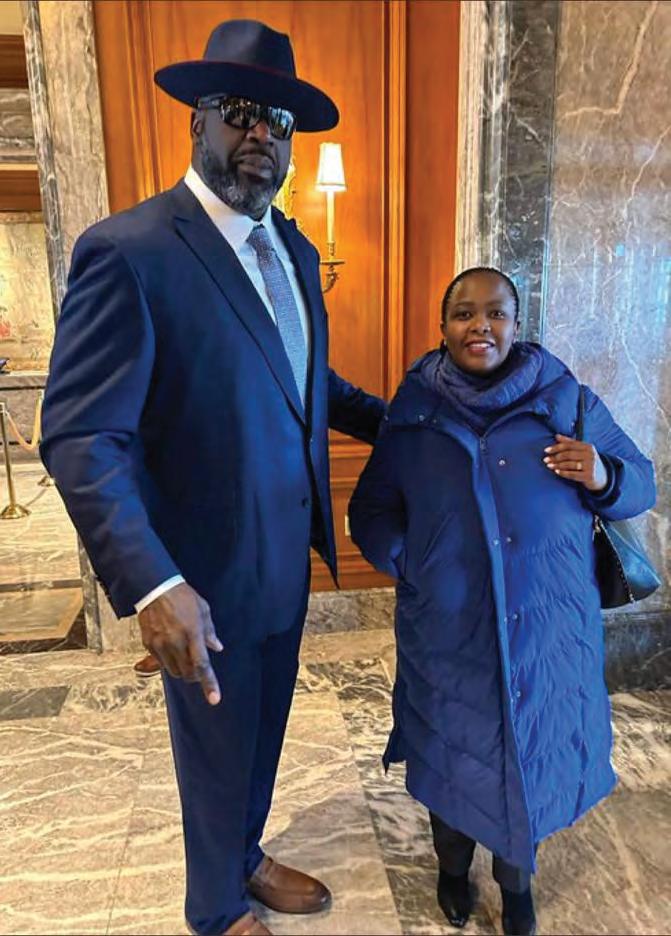
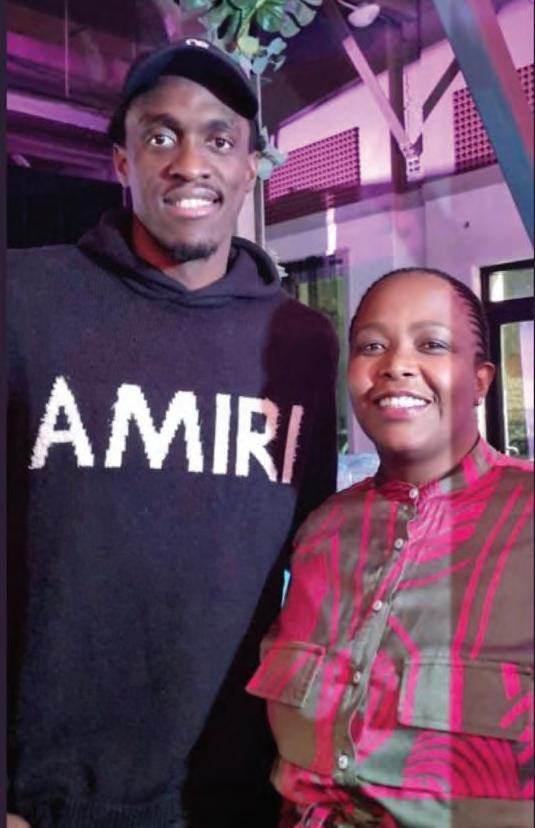
the ongoing partnership between NBA Africa and Rwanda Basketball Federation, and to provide top-notch infrastructure for talented and aspiring basketball players to nurture and showcase their skills and abilities,” said Mugwiza.
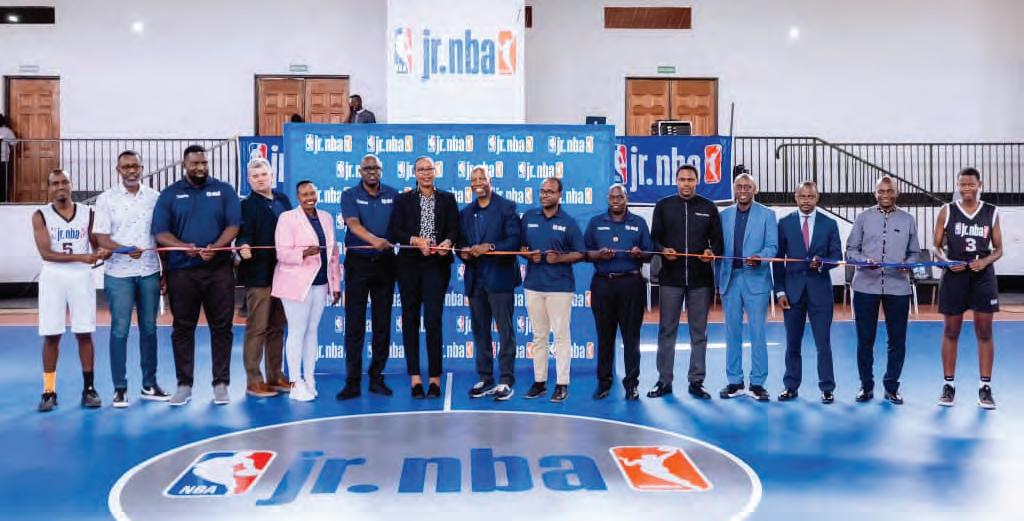
“We have made it our utter responsibility with the support of our partners to continue investing in court infrastructure development until the basketball of Rwanda soars to greater heights. This is just the beginning.” he added.
https://www.ktpress.rw/2023/02/excitement-asrwanda-receives-nba-africa-sports-facility/ Image credit: ...
133 March-April 2023 DAWN www.africabusinessassociation.org
Minister of Sports
◄ Newlyrenovated indoor basketball court in Kigali, located at Lycée de Kigali
Ruth Carter’s ‘Wakanda Forever’ Costumes are a Masterclass in Female Vulnerability and Strength
By Elizabeth Segran
BLACK PANTHE R’S SEQUEL , Wakanda Forever, is a superhero movie, but it is also a lot more than that. In many ways, it’s a quiet meditation on grief
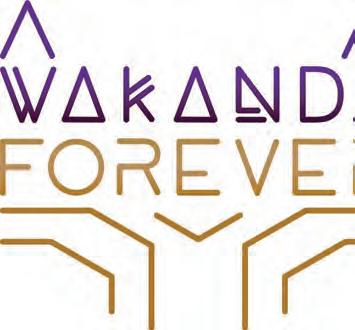
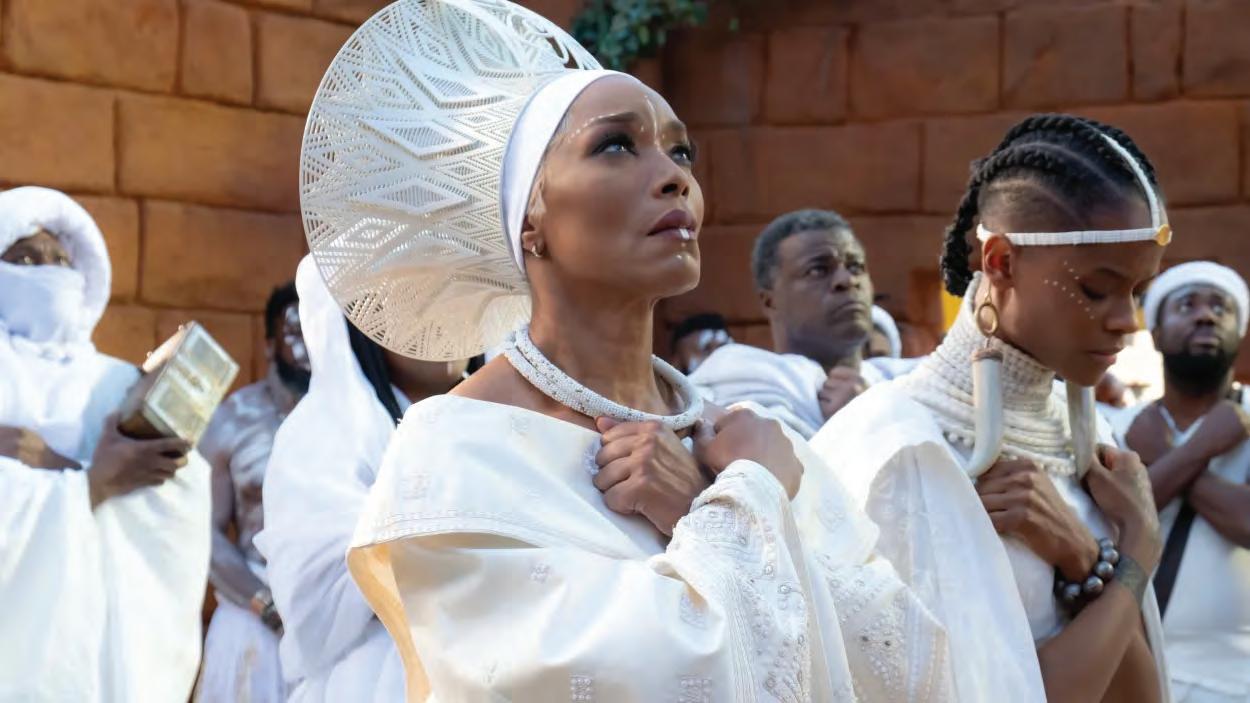
The movie opens with a funeral scene. The

Black Panther—King T’Challa of the African nation of Wakanda—has just died. His kingdom, and his loved ones, are struggling to go on without him.
Ruth Carter, the film’s costume designer, was tasked with conveying this grief through
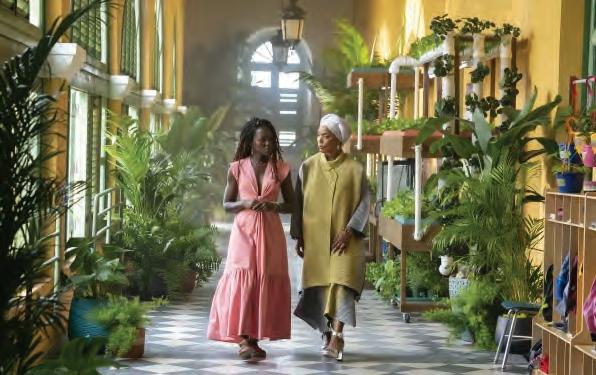

134 March-April 2023 DAWN www.africabusinessassociation.org Lifestyle/Culture
the characters’ outfits. In both Black Panther movies, Carter uses the costuming to bring the audience into the lively, diverse African cultures that make up Wakanda, turning to historians and anthropologists in her research. (Carter won the Oscar for best costume design in 2019 for the first movie and has been nominated again for the sequel.) But in Wakanda Forever, she also uses clothing to express the characters’ inner lives and the bottled-up emotions many of them carry throughout the film.
As she began to delve into the psychology of the three female leads in the movie—King T’Challa’s mother, sister, and lover—she realized that she would need to illustrate how differently their grief played out. Carter skillfully uses costumes to
convey both the vulnerability and the strength of these women.
Carter says that much of the sadness we see in the film mirrors the collective grief the cast and crew felt in real life. Chadwick Boseman, the actor who played Black Panther in the first film, died in 2020. From the start of filming, the cast and crew were mourning together. Carter says that the funeral scene was full of raw emotion. “There was all of this energy,” she says. “We all thought, I need to move and dance to celebrate Chadwick. It was cathartic.”
But, at the same time, Carter points out that grief is also very personal. And each of the three women closest to King T’Challa have very different journeys as they mourn.
Queen Ramonda, the king’s mother, played by Angela Bassett, feels she must go through mourning rituals to process her loss, so she can be strong for her people who now rely on her. Throughout the movie, she is portrayed in a white gown with a white headdress. Carter says that the outfit was inspired by African tradition. “White and red are the colors of mourning in African societies,” she says. “Queen Ramonda has the beautiful embroidery and embellishments of a queen, and everything is on a bright white fabric.”
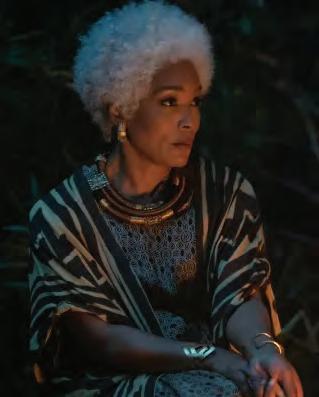



But while the costume conveys power and strength, Carter made very considered decisions to signal that she is also vulnerable and weak. Carter had learned from African historians that family members sometimes shave their heads after a loved one dies. In the first movie, Queen Ramonda had dreadlocks, but in this one, her hair is short and white, peaking out from under the headdress. “I thought it was important to see her Afro,” Carter says. “It’s an Easter egg. If you’re in film school studying this movie, you would see that
see page 136

135 March-April 2023 DAWN www.africabusinessassociation.org
she had cut her hair.”
Carter was also deliberate about putting Queen Ramonda in sleeveless dresses because her bare arms look defenseless, like she has shed her armor. “There is a theme of exposed arms,” Carter explains. “We have her carrying the casket and sitting at the throne with her shoulders exposed. We’re communicating that through symbols that show these women vulnerable, exposed, but also strong and beautiful.”
Shuri, T’Challa’s sister, played by Letitia Wright, is struggling with her emotions. She doesn’t feel like she can delve into her sadness, or she’ll “burn the world and everyone in it,” she tells her mother Carter found ways to communicate Shuri’s pentup grief. In the funeral scene, for instance, Carter dresses her in a shroud, hood, and a cape that has a subtle pattern of four hearts that connect in the middle. It’s like her sadness is hidden in the texture of the garment.
Throughout Wakanda Forever, Shuri wears more
muted colors than she did in the first movie, from gray plaid dresses to purple tracksuits. But Carter says that for her more private moments, she wove white outfits into Shuri’s wardrobe—during conversations with her mother or when she’s dreaming— suggesting that Shuri is mourning in private. “We see her looking for the answers to her grief, and she’s wearing white in these moments,” Carter says. “The white clothes of mourning are a through line, continuing the emotion we feel at the funeral.”
Meanwhile, Nakia, T’Challa’s romantic partner, played by Lupita Nyong’o, has chosen to leave Wakanda to grieve alone. In fact, she doesn’t even come to the funeral. In the movie, we see her in Haiti, running a school. She’s wearing a peach sundress that’s distinctly bright compared to Ramonda and Shuri; later, when she is sent on a mission to save Shuri, she also appears in colorful dress.


Carter wanted to convey Nakia’s ability to grieve freely by herself. “Nakia has this easy, nononsense, organic vibe,” says Carter. “She’s away from the world. But at the same time, she’s trying to do something positive with her life and find joy.” This is particularly important for Nakia because it is revealed at the end of the movie that she had a child with T’Challa, and she is trying to give him a happy childhood in Haiti.
The costumes in Wakanda Forever do a lot of work to express the inner lives of the characters, who are each struggling in their own way and on a journey of healing. In many ways, it also allowed the actors—and the audience—to process their own emotions over the loss of Boseman. “I’m really proud to have had the opportunity to celebrate Chadwick,” she says. “This movie really was for him.”
https://www.fastcompany. com/90858948/ruth-carterswakanda-forever-costumesare-a-masterclass-infemale-vulnerability-andstrength
Image credit: Annette Brown/© 2022 Marvel, © 2022 Marvel
136 March-April 2023 DAWN www.africabusinessassociation.org Lifestyle/Culture
Wakanda Forever from page 135
The World’s Largest Naval Base gets its First Black Woman Commanding Officer, Captain Janet Days
By Mildred Europa Taylor
6th and 5th Fleet Areas of Operation.
Days also deployed to Kabul, Afghanistan as the joint staff, J7 liaison officer to the International Security Assistance Force headquarters, Wavy. com said. She has also served as the director of maritime warfare at Surface Warfare Officers School, where she trained surface warfare department heads.
Before starting her naval career, Days graduated summa cum laude from Old Dominion University in 1999 with a bachelor of science in business. She also obtained a master of business administration from the Naval Postgraduate School and is a graduate of the Joint and Combined Warfighting School at Joint Forces Staff College.
CAPTAIN JANET DAYS made history recently when she took command as Naval Station Norfolk’s 51st commanding officer. The 54-year-old Chicago native became the first African-American woman commanding officer in the 106-year history of the world’s largest naval base.

Days was the base’s executive officer. She relieved Captain David Dees, who will assume duties as the Chief of Staff for Commander, Navy Region Mid-Atlantic.
Days’ father, George Hanks, also served in the military. “I watched a strong role model as I was growing up and it was in my father,” Days said. She and her siblings were put into foster care for some time during what she described as “some unfortunate instances” in her family. She would join the Army before later joining the Navy.
Days has been on tours aboard various ships, including USS Simon Lake, USS Mahan, and USS Forrest Sherman. According to Wavy.com, Days has deployed twice. The first was to the U.S. Central Command area of responsibility to conduct theater security cooperation and the second was to the U.S. Southern Command area of responsibility to conduct counter-narcotics operations. She was also executive officer and commanding officer of USS McFaul, deploying independently to the U.S.
Becoming Naval Station Norfolk’s commanding officer is huge considering that was impossible decades ago. Officer positions in the U.S. Navy were in the past not available to Black men. The Navy, in fact, suspended the enlistment of Blacks.
In January 1944 when sixteen Black men arrived for officer training at the Great Lakes Naval Training Station in Illinois, it was the climax of a four-year campaign by civil rights leaders, ordinary citizens and the black press, who had called on the Navy to change its segregated practices during World War II.
At the beginning of the war, Black men in the Navy were only allowed to hold jobs as cooks and cleaners. The Navy, said to have been the most segregated branch of the U.S. armed forces, did not think its Black members should mix with Whites.
Naval Station Norfolk where Days serves covers more than 6,200 acres. It has 326 tenant commands with over 600 facilities. Over 67,000 personnel, including military and civilian personnel, work there. With 13 piers and an 8,000-foot airfield, Naval Station Norfolk also supports 63 ships, 188 aircraft and 18 squadrons.
https://www.msn.com/en-us/news/us/the-world-s-largestnaval-base-gets-its-first-black-woman-commanding-officercaptain-janet-days/ar-AA17dHF6
137 March-April 2023 DAWN www.africabusinessassociation.org
Lifestyle/Culture
Capt. Janet Days (Photo – Naval Station Norfolk)
BAL 2023: ‘Africa Shouldn’t only Export Basketball Talent’ - Amadou Gallo Fall
By Joshua Adetunji
THE PAN-CONTINENTAL CLUB competition, which is entering its third year, tiped off in Dakar on 11 March and repeats last year's format, with 12 teams split into two regional conferences battling it out to make May's play-offs in the Rwandan capital, Kigali.
With each team only allowed to recruit a maximum of two non-African players for its 12-man roster, the hope is that increased exposure to high-level competition will improve standards across the board when it comes to homegrown talent.

'The talent is here in Africa'
Fall, who helped set up the BAL project, believes the first two editions have already had a tremendous impact on basketball culture in Africa.

"Teams in general are working hard to get organised," he told BBC Sport Africa.
"To position themselves to have a chance to win their local championship and qualify for the Basketball Africa League
''We believe in basketball in Africa," he added.
"This is why we've been involved here for many decades. We focused on making sure that we lay the foundation, we put in the first basic elements that you need for long-term sustainability.
"That is how to make the game accessible, for you to have more young boys and girls who will be bouncing the ball, getting interested in playing basketball.
"The talent is here in Africa.''
For Fall, the next stage of the project is to stop that talent draining overseas, as has happened with players in the past, many of them never to return.
"Africa needs to make sure that we don't only export talent, but we should also build valid value around our talent," said the Senegalese, who worked as an administrator for NBA side the Dallas
Mavericks for eight years before taking control of NBA activities in Africa.
"It's just a question of bringing the expertise and creating the environment."
BAL's leading lady
The opening fixture of this year's BAL sees Senegal's AS Douanes up against debutants Abidjan Basket Club Fighters of Ivory Coast.
The Fighters may be new to the competition but their coach, Liz Mills, is not, having led Moroccan side AS Sale last season. The Australian also had a spell in charge of the Kenyan national team and has been working in men's basketball in Africa for over 10 years.
"We're feeling very confident, knowing that we've been at this level before, and we're really excited to be playing in the first game of the tournament," she said.
"Over the last two decades we have competed in the Africa Champions Cup, which was a competition before the NBA and Fiba [basketball's governing body] merged into the Basketball African League, as well as imports that bring a vast wealth of experience.
"We're going to see some upsets, we're going to see some surprises. Obviously, there's some favourites, but I think realistically we're definitely one of the teams that could win the title."
While Mills has years of experience to call on, South Africa's BAL representatives, the Cape Town Tigers, are mere cubs by comparison.
"We don't have a national league that's playing yearly like a lot of these countries do," head coach
138 March-April 2023 DAWN www.africabusinessassociation.org Lifestyle/Culture
Raphael Edwards told BBC Sport Africa.
"Our team is only 18 months old. And in our first season, we came from not playing competitive basketball, just practicing with each other, to go all the way to the quarter-finals."
Having surprised a few people by making last year's play-offs, the Tigers were quickly slapped down in the play-offs, crushed by US Monastir by a 39-point margin.
"They overpowered us in the fourth quarter," admitted Edwards.
But the upward trajectory of a new team such as the Tigers is exactly the kind of development those behind the BAL were hoping for - and Edwards believes their progression is clear to see.
"We're much improved since then. We've had tons of friendly games to prove that, with Petro de Luanda, with the NBA Academy, other teams from Mozambique.
"We're getting closer to playing a great brand of basketball."
One competition, two conferences
The Fighters and Tigers were two of six teams who had to go through qualifying rounds to reach BAL (the others being Stade Malien of Mali, Uganda's City Oilers, CFV Beira of Mozambique and Guinea's Seydou Legacy Athlétique Club).
The other six teams qualified through their national leagues.
The 12 qualifiers have now been split into the Sahara Conference, which is the one taking place in Dakar in March, and Nile Conference, which will play out in late April and early May.
BAL president Amadou Gallo Fall presented 2022 winners US Monastir with their trophy after the Tunisians beat Angola's Petro de Luanda in the play-off final in Kigali
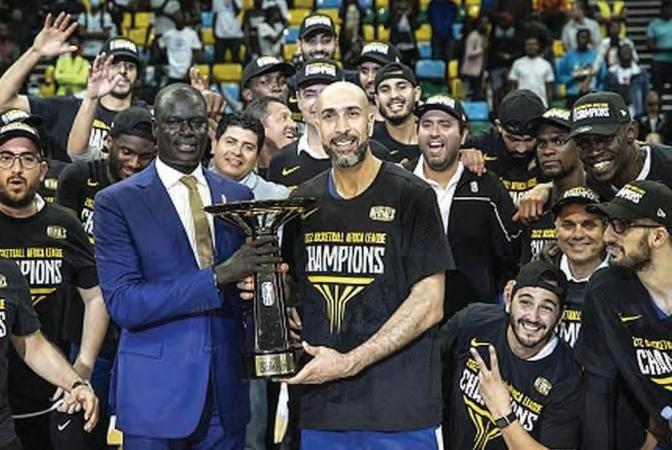
SAHARA CONFERENCE (11 - 21 MARCH)
ABC Fighters (Ivory Coast), AS Douanes (Senegal), Kwara Falcons (Nigeria), REG (Rwanda), Stade Malien (Mali), US Monastir (Tunisia)
NILE CONFERENCE (26 APRIL - 6 MAY)
Al Ahly (Egypt), Cape Town Tigers (South Africa), City Oilers (Uganda), CFV Beira (Mozambique), Petro de Luanda (Angola), SLAC (Guinea)
The top four from each conference will progress to the quarter-finals of the play-offs in Kigali, with the final taking place on 27 May.
"Anything is possible," according to Mills.
"On any given day, anybody can beat anybody. That's the beauty of African basketball."
Most of the non-African players in the competition are, perhaps unsurprisingly, from the United States.
Despite wanting BAL to be a springboard for African talent, Fall claims the international stars are also proof of progress.
"US basketball players have always been in demand everywhere around the world. We want high quality players to want to come and play in our leagues," he explained.
"Players wouldn't have considered Africa in the past because of economic and other factors. I think it's a great sign that they actually want to come and play.''
https://www.bbc.com/sport/africa/64892885
https://www.nba.com/news/bal-set-to-return-forthird-season-2023
Image credit: usglc.org
139 March-April 2023 DAWN www.africabusinessassociation.org
America’s First Celebrity Chefs Were Black
By Glynn Pogue
A Black History Month dinner series celebrates Hercules Posey and James Hemings, who cooked for two of the USA’s earliest presidents and made valuable contributions to American cuisine.
AS A YOUNG BLACK GIRL growing up in the melting pot of Brooklyn, New York, my classmates often teased that I had “no real culture.” I couldn’t point directly to a country of origin the way they seemed to. I had no connection to extravagant carnivals and colorful flags. And the divide widened when it came to food; next to the bangin’ beef patties, jollof, and rotis of my Caribbean and African classmates, my grandmother’s mac and cheese and collards felt standard and unspecial. To my peers, I was “just American,” with nothing to distinctively mark as my own. Dinner recently at Los Angeles’s Hatchet Hall showed me the lie. Seated at Hatchet Hall’s family-style table, my hands criss-crossed with other diners’ as we passed around deep dishes of smoked pork crown roast, mashed rutabaga in cultured butter, creamy mac and cheese, and beef-fat potatoes. “Can you put a little mac on my plate?” we asked. And “are you finished with the rutabaga?” The meal was reminiscent of dinners at my grandmother’s house, brimming with the kind of comfort foods that make you fantasize about going home and hitting your pillow. And over three hours and eight courses, every inspiration was entirely American, and specifically contributed to our country’s culinary history by black folks. The dinner was one of a series Hatchet Hall started in 2019, called Hemings & Hercules in honor of Hercules Posey (whom the supper club refers to as Hercules Ceaser) and James Hemings, America’s first celebrity chefs and the enslaved property of two of our earliest presidents.
Hemings & Hercules is the brainchild of Martin
Draluck, Hatchet Hall’s young, black chef de cuisine. Draluck was introduced to Hemings and Hercules while doing research for the restaurant’s supper club, Fuss & Feathers, and was moved to create a series around the chefs. “I thought their stories were hidden gems, and a part of history more people needed to know,” he says.
Hatchet Hall, a 128-seat restaurant in the Culver City section of Los Angeles, has been telling stories through its wood-fired “Heritage American” food since it opened in 2015. In 2018, chef-owner Brian Dunsmoor created the supper club to explore the recipes and techniques of America’s earlier days. The name Fuss & Feathers is inspired by General Winfield Scott, a known food enthusiast nicknamed “Old Fuss and Feathers,” for his insistence on military formality. Scott’s legacy is complicated by his military tactics, including his role in President Andrew Jackson’s “Indian Removal” policy, and his leadership in the Mexican-American war.
“When we kicked off Fuss & Feathers we really wanted to pull the blinders back on American cuisine, even if some of our history included negative connotations,” Dunsmoor says. “We did a lot of research when looking into a name for Fuss & Feathers — George Washington, Thomas Jefferson, even Abraham Lincoln all had controversial associations tied back to history. The goal of the series has always been to try to give credit to the people who influenced our foodways including Natives, Africans, Caribbean and Europeans who all contributed to American cuisine.”
Hercules worked for George Washington for 30 years, between the president’s home and Philadelphia and his plantation in Mount Vernon, before he escaped in 1797 during the chaos of Washington’s birthday celebration. Hemings, meanwhile, the brother of Sally Hemings, cooked for the third president of the United States for
140 March-April 2023 DAWN www.africabusinessassociation.org Lifestyle/Culture
◄ Hemings & Hercules explores American history through dishes like black-eyed pea pancakes inspired by Hercules Caesar, George Washington’s chef Gari Askew/Hatchet Hall


The supper club theme was the brainchild of Hatchet Hall chef de cuisine Martin Draluck. Gari Askew/Hatchet Hall
24 years. Hemings & Hercules is shining a necessary light on these chefs’ creations, and those from countless, nameless black cooks putting it down in the White House kitchen and America at large. The
see page 142
141 March-April 2023 DAWN www.africabusinessassociation.org
First Celebrity Chefs from page 141
contributions those chefs made to our culinary tradition are essential to American culture, but their stories are often obfuscated by history
“The bottom line is these chefs and cooks are responsible for food we still eat today in American culture, not just black culture,” Draluck says. “Everyone wanted to know what the president was eating. What was on his table? Hemings was sent to Europe for culinary training, and he brought back knowledge of how to use the sous stove, which was the precursor to the stovetop. He brought back recipes for mac and cheese, ice cream, waffles, and so much more. If you pick these dishes apart, you see all these influences.”
When Jefferson was appointed minister to France in 1784, he took Hemings with him. Only 19 years old at the time, Hemings’s task was to master the French style of cooking. While in France, Hemings apprenticed with well-known French caterers and pastry chefs and became the chef de cuisine at Hôtel de Langeac, America’s first royal embassy. He was paid a wage of 24 pounds a week, comparable to free white servants at the time, and yet he was still considered property. Under French law, Hemings could have claimed his freedom at any point, but he didn’t. Hemings ultimately negotiated his freedom on the terms that he taught others at Monticello how to cook in his French-Virginian, or Lowcountry, style, often associated with seafood-rich dishes of Southern coasts. After Hemings left Jefferson, Edith Fossett, an enslaved cook on Jefferson’s plantation Monticello, traveled to the White House to teach Jefferson’s new white chef Hemings’s Virginian-French fusion, and from there it spread worldwide. “Our dinner series allows us to give credit where it’s due,” says Draluck.
With few remaining menus or written recipes from Hercules or Hemings still around, the Hemings & Hercules dinners are mostly “inspired” by these chefs’ cooking. Draluck spent the better part of a year researching to develop the menu. “Just like so many inventions by black people in America, the history has either been washed away or wasn’t recorded,” he laments.
The dinner itself is a means of documentation
and preservation, and it unfolds like a carefully told story. At $100 a seat, the meal is served in the restaurant’s “Family Room,” a private space tucked behind a barn door near the entrance. There’s a spirit of calm and warmth in the room. It feels familiar. The tablescape features dripping candles and dried flowers, and at each place setting sits a detailed timeline of Hemings’s and Hercules’s lives in relation to major historical events. In the background, Donny Hathaway croons. “Music-wise, we try to keep it as black as possible,” Draluck says.
Draluck greets the room at the start and end of the dinner, but much of the night is moderated by a Hatchet Hall team member named Andre, who guides us through the meal employing oral storytelling with historical anecdotes along the way. As Andre tells the stories behind each dish, I feel a sense of pride, especially when he emphasizes words like “us” and “we,” as in “We brought this food here.”
Dinner opens with silver-dollar-sized black-eyed pea pancakes, served alongside a pepper jam and a small side of vinegary fermented greens. This particular dish is a nod to the black-eyed pea fritters enslaved Africans would eat in the fields and an ode to Hercules, who Draluck says would’ve cooked more “rustically” than Hemings. After the black-eyed pea pancakes comes cured salmon on a small, charred plank of wood. Fishing was a lucrative practice on George Washington’s Mount Vernon plantation, and it required massive amounts of slave labor to clean, preserve, and pack the fish into salt barrels. Fish was also a significant part of the enslaved workers’ diet.
Then there’s the pepper pot, most traditionally known as a thick stew of beef tripe, vegetables, and pepper. The one served at Hemings & Hercules is a juicy beef and vegetable broth made with fresh vegetables, and is a reference to the influence of French and Caribbean culture in Philadelphia following the Haitian slave rebellion and the French Revolution. As the story goes, Hercules was a flashy guy who could often be spotted in Philadelphia’s market — one of the largest in the world at the time — dressed in fly threads, walking with a gold-handled cane. Hercules purchased his looks with money earned from selling leftovers
142 March-April 2023 DAWN www.africabusinessassociation.org Lifestyle/Culture
and kitchen waste, which was a privilege sometimes given to those in his position. As we sipped the soup directly from small wooden bowls, we were encouraged to imagine the aroma of the pepper pot sold in the market Hercules perused for produce.
The chicken roulade that makes up another course is based on a dish Hemings cooked for Thomas Jefferson, James Madison, and Alexander Hamilton as they came to the Compromise of 1790. As Charles A. Cerami writes in Dinner at Mr. Jefferson’s: Three Men, Five Great Wines, and the Evening That Changed America, Hemings served “Capon stuffed with Virginia ham and chestnut puree, artichoke bottoms and truffles with a bit of cream, white wine, and chicken stock,” along with “a calvados sauce made with the great apple brandy of Normandy.” Hatchet Hall’s recipe is rendered nearly identically to Hemings’ dish.
As we dine on roulade, Andre underscores that this food shouldn’t be discounted or overlooked as “slave food.” The dishes and preparations by these chefs were sophisticated and complex, and required real culinary prowess. Food historian Adrian Miller, author of the The President’s Kitchen Cabinet, confirms the influence of black cooks at the highest levels of American culinary tradition. Even after slavery, however, many of the cooks in the White House continued to be hidden, as European chefs were hired to cook for high-end affairs and the inaugural banquets reported on in the press.
Hemings and Hercules were the beginning of a long history of black chefs in the White House, and soul food dishes typically associated with black culture were a favorite. Says Miller: “There’s a very strong undercurrent [of Soul Food] throughout the White House history. If you had Southern-born presidents, the Southern soul food influence was strong to the extent that those foods overlap. Greens and things like possum and pig’s feet were served.” However, Miller notes that first lady
Jacqueline Kennedy’s preference for European food shifted the direction of White House cooking. “1960 is where you start to see the break, and African-American White House chefs move into the rear view.”
We cap off the dinner with Hemings’s Snow Eggs. One of only two surviving recipes attributed to the chef, the dessert is an English custard with poached egg whites made to look like little eggs. It’s served with a small leaflet containing Hemings’s recipe and directions on one side and Draluck’s reinterpretation on the other.
Seeing Draluck’s version of Hemings’s dish made me regret never learning my grandma’s recipes. Because like those of Hemings, Hercules, and now Draluck, her recipes held stories — stories of my people, our history, American history. Those cooking techniques have deep roots that, although entwined with the thorns of slavery and injustice, are no less worthy of being claimed with pride by black Americans. The taunts the kids on the playground tried to throw at me were baseless. I think of the toast one of my fellow diners made at the start of our meal, just before we each packed a black-eyed pea pancake with jam and greens. “Happy Black History Month, ya’ll,” he said. “This is America, not the one they propagate.”
https://www.eater.com/2020/2/27/21153157/ america-first-celebrity-chefs-hercules-poseyjames-hemings-la-dinner-hatchet-hall

143 March-April 2023 DAWN www.africabusinessassociation.org
Hemings & Hercules, Hatchell Hall Essence
Chef Marcus Samuelsson Elevates Diversity of Culinary World
By Gary Gerard Hamilton The Associated Press
MARCUS SAMUELSSON IS KEEN on leading with intention. That focus is seared into the delectable dishes prepared at his popular restaurants, but it is also expressed with his staffing.
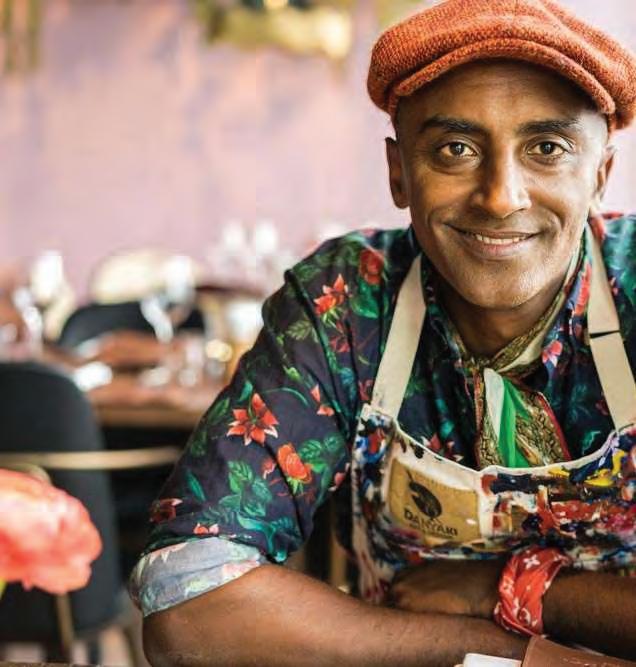

“My restaurants are a reflection of the society we’re living in. (At) Hav & Mar, we decided on Black leadership, female leadership, because there was a void for it. Red Rooster opened in Harlem because we wanted to create jobs within our industry for Black and brown individuals,” said Samuelsson, a multiple James Beard Awardwinning chef. “I love food and I want to gear it towards … everybody, but the opportunities should also be a little bit more evenly distributed.”
To honor trailblazing restaurants founded by women and people of color, Samuelsson and fellow chef Jonathan Waxman host “Seat at the Table,” an eight-part Audible original series that premiered toward the end of last year. In the series, chefs, along with many involved in the inception of their restaurants, present an oral history of some of America’s most iconic eateries such as New York’s groundbreaking Jezebel, started by Alberta Wright, Washington, DC’s Ben’s Chili Bowl, by the Ali Family, and The Slanted Door, created by Charles Phan in San Francisco. Food serves as the roux of the podcast, while the impact the establishments have had on their communities and adds the shrimp, sausage and potatoes.
“Coming out of Black History Month, going into Women’s (History) Month, I felt it was really necessary to share this, that we know our Black stories are not monolithic,” said
Samuelsson, who was born in a hut in Ethiopia but raised in Sweden after his birth mother died during a tuberculosis epidemic in the early ’70s. “I always feel like when you enter a restaurant, you’re entering a piece of American history … that’s really what we want to capture in ‘Seat at the Table.’ It’s beyond the food — it’s really the people that make it so special.”
Samuelsson spoke with The Associated Press about his mission to elevate women and people of color, selecting restaurants for the podcast and diversity in the culinary world. Answers may have been edited for clarity and brevity.
AP: You’ve mentioned your goal is to elevate women and talented, diverse people. Why is that part of your mission?
SAMUELSSON: As a Black chef that has

144 March-April 2023 DAWN www.africabusinessassociation.org Lifestyle/Culture
privileges and a platform, it’s very important to me that I’m setting the standard and creating jobs for other Black culinarians. One of the reasons why we always have open kitchens is the staff knows they’re on a stage but also so the customer can see who cooks and works for them in the dining room. Same thing with Hav & Mar where our mission is to uplift women of color in leadership.
AP: How did you choose the restaurants?

SAMUELSSON: I didn’t by myself. It was a constant back-and-forth with my partner in this, Jonathan Waxman. He didn’t just read about these chefs, he came up with these chefs. But he knew these stories, and we would never gotten as close to these incredible stories without Jonathan’s work.
(Chef) Thomas Keller doesn’t do a lot of interviews, but he talked to Jonathan. And that’s why that story about The French Laundry is so unique. And Charles’ (Pham) story, that’s a story about the Vietnam War and how a true immigrant tale starts and how a restaurant maybe was not the way that they thought they would be in business, but it became a way of living for him and his family.
AP: What commonalities do you share with the chefs featured in the podcast?

SAMUELSSON: The desire
that you want to share your narrative. … I share that piece with Charles, of course, being an immigrant, feeling the love for America is sometimes misunderstood also.
Leah Chase (of Dooky Chase) has always been my mentor and somebody I admire so much. But I feel, also, Alberta Wright and Jezebel — I was a kid growing up right across the street from Jezebel in Hell’s Kitchen in New York City. And I know if I wouldn’t have met Ms. Leah Chase, I wouldn’t have met Alberta Wright, I would’ve never created the Red Rooster or Hav & Mar, my restaurant here in Manhattan. I owe a lot to that generation of incredible Black women.
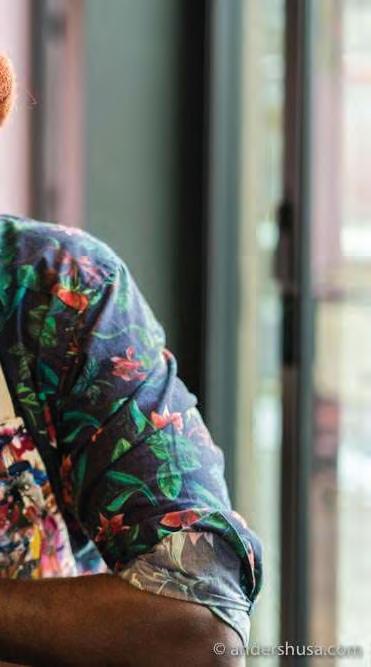
AP: How would you rate the culinary world when it comes to diversity?
SAMUELSSON: Food is part of society … so we’re improving. We got a ways to go. And part of doing this doc with Audible was to really acknowledge how much labor, how much incredible Black restaurants that were in America that never got acknowledged.
America’s history in terms of diversity is very complicated. But it’s heading — through a lot of work by effort, by a lot of people — in a better direction. I’m a firm believer in that, even if you (have to) to work at it every day, we’re heading towards a better experience as people. And it’s important because as diversity goes in America, the world is looking at America. So, it’s very, very important to get these small wins because the rest of the world is taking note. As a Black person growing up outside of America, I know this firsthand.
https://nationalpost. com/pmn/ entertainmentpmn/chef-marcussamuelsson-elevatesdiversity-of-culinaryworld
Image credit: zealays4. blogspot.com, ny.eater.com, audible, andershusa.com
145 March-April 2023 DAWN www.africabusinessassociation.org
Hav & Mar
The Untold Stori
By Sarah Durn
IN
SCRAWLING CURSIVE
, an English enslaver named Robert Norris, captain of the slave ship
The Unity, wrote an entry in his log marked June 6, 1770: “The slaves made an Insurrection which was soon quelled…with the loss of two woman slaves.” On June 22, “the slaves attempted another Insurrection after the death of a girl slave.” Then again, four days later on June 26, “a few of the slaves got off their Handcuffs but were detected in Time.” That’s three uprisings on one ship, in less than a month, all involving female African captives. Historian Rebecca Hall, author of the graphic novel Wake: The Hidden History of Women-Led Slave Revolts, says that’s not an anomaly; enslaved women and female captives led numerous uprisings, such as those onboard The Unity.
In her new book, Hall opens with a “measured use of historical imagination,” working with her illustrator, Hugo Martínez, to visualize how the women on board The Unity fought back in 1770. It wasn’t hard to do, considering that 227 of the African captives on board were sold to Norris in Abomey, the capital of Dahomey, where women were trained
as skilled warriors “There were constant revolts,” says Hall. Atlas Obscura spoke with Hall about why she’s drawn to these women, such as “the Negro Wench” who led a 1708 slave revolt in New York City, and their enduring legacy. What is it about female warriors that have drawn you to their stories?
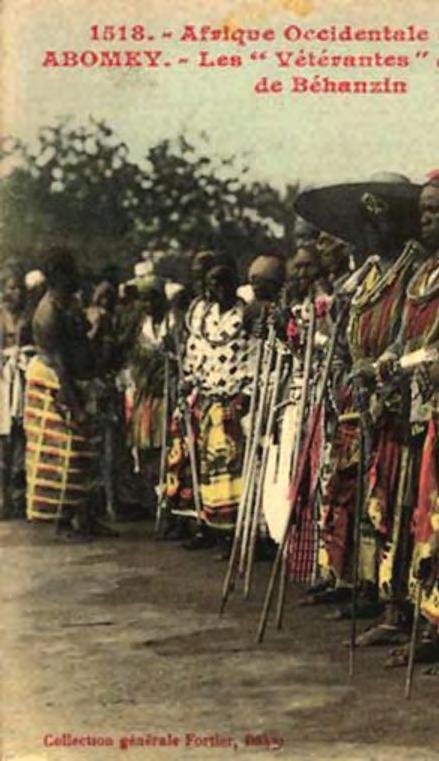
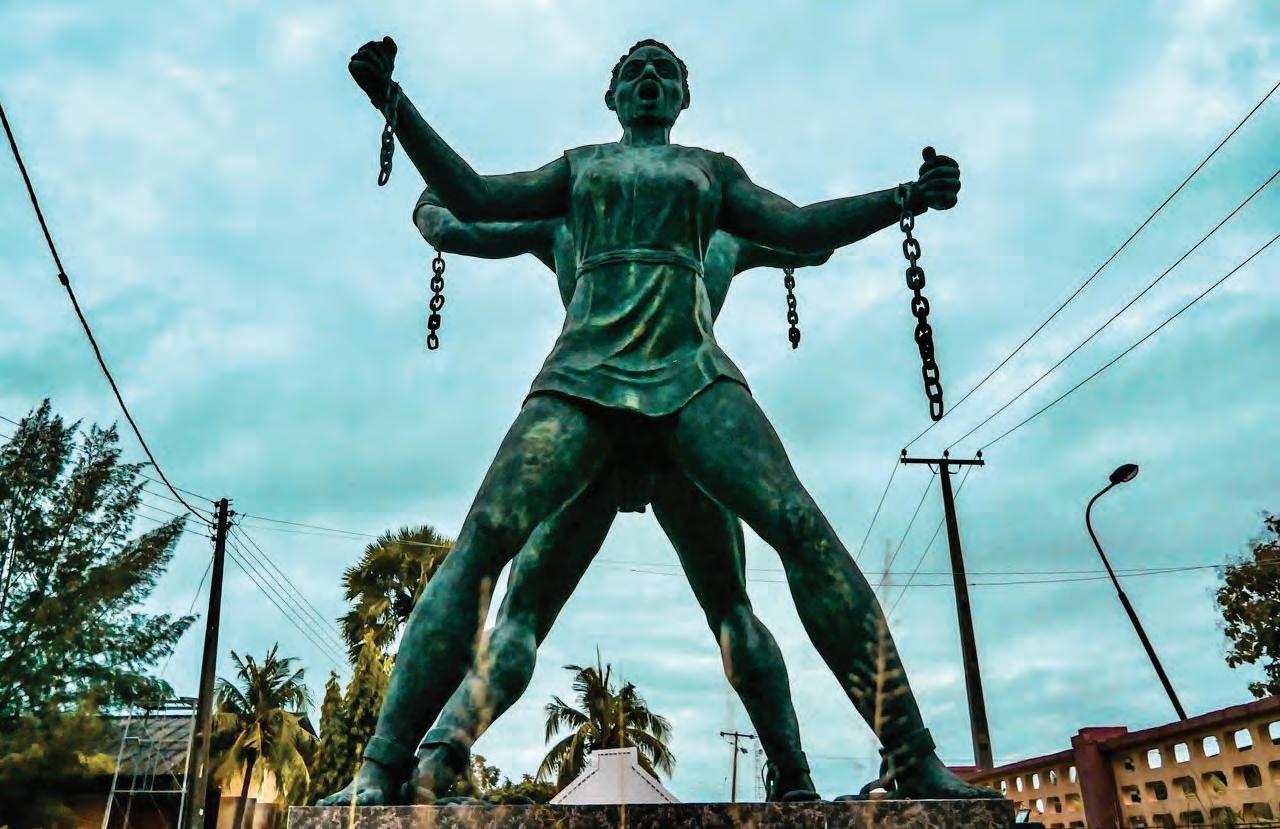
Since I was a little kid, I remember watching women who fought back on TV. I watched Charlie’s Angels and The Bionic Woman. I’ve always been drawn to women warriors because I find the idea of women fighting back in that way very inspiring.
I’m interested in women warriors also as a historical category of analysis. I’m fascinated by the ways in which women warriors are valorized and disavowed at the same time. There are women warriors throughout history, but what happens is that the history is erased or the women become some kind of exception: She became this
146 March-April 2023 DAWN www.africabusinessassociation.org History
This colossal freedom statue stands in front of Nigeria's Badagry Heritage Museum in Lagos State. Badgery, a small town near Nigeria's border with Benin, was the site of a large slave port. SOLASLY/CC BY-SA 4.0
Some of the last women warrior PUBLIC DOMAIN
es of the Women Who Led Slave Revolts
Fiend,” so that’s what I call her. How do we know a woman led this revolt in 1708?
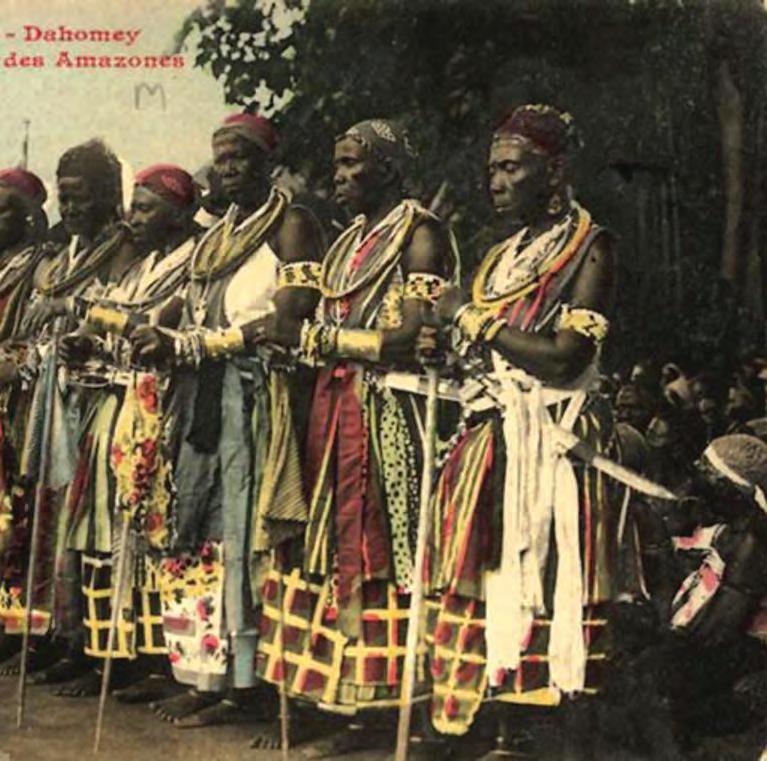
There was one newspaper in the British colonies. It was The Boston Weekly Newsletter. So there are a couple of articles that describe what happened and talk about her. There’s a correspondence between Lord Cornbury, who was then governor of New York [and New Jersey], to the Privy Council in England describing the events. [There was also a 19th-century book, written by a selfstyled historian, called The Annals of Newtown.] It describes this revolt and the family that was killed: a man, his wife who was pregnant, and five kids. So those are all the sources related to that incident, and they all refer to this woman—the “Negro Wench” or the “Negro Fiend.”
Your book opens with a female-led revolt on a slave ship. How did you learn about women’s involvement in ship insurrections?
way because her husband died and she had to take over leadership. It’s always tied to a woman’s role. She ends up becoming the exception that proves the rule over and over again that women aren’t warriors. In my own research in recovering the women who led slave revolts and participated in slave revolts, there was such pushback because people couldn’t even imagine the concept. What’s the first woman-led slave revolt you uncovered?
A woman led a revolt in what’s now Queens [in New York City]. It was in the city of Newtown, which is [now] Elmhurst. She led a revolt and she was captured. She was burned at the stake and the men who were involved in the revolt were hanged. And I would love to tell you her name, but it’s not preserved. She was referred to as the “Negro
There’s this incredible database. It’s called the Trans-Atlantic Slave Trade Database, a searchable database of over 36,000 slave ship voyages. Historians using it found that there was [about one revolt for every ten voyages], which is much higher than anyone expected, because it’s basically suicide. Then they were like, “Okay, so what’s the difference between ships that have revolts and ships that didn’t have revolts?” The only statistical difference was the more women on the ship, the more likely a revolt. And then they just dismissed their own findings by saying, “But we all know that women weren’t involved in this kind of militant fighting.”
What might explain why more women on a ship made a revolt more likely?
[The slave trade] was a highly regulated business. So the rule was when you’re on the coast of West Africa and you’re loading captives onto your ship, everyone was kept below deck and in chains,
see page 148
147 March-April 2023 DAWN www.africabusinessassociation.org
s of the Dahomey Kingdom were photographed in 1908.
Slave Revolts from page 147
because there was a risk of what’s called a “cutoff,” where men and women would come and attack the ship and try to free the people on board. So to avoid that, [enslavers] kept everybody chained below deck. But once the ship was in the Atlantic, they took all the women, unchained them, and put them on deck, which is where the weapons were. It was about sexual violence and control, but it was also dismissing women as potential danger sources. A lot of these slavers died because they didn’t take [these women] seriously.
Why are there such detailed records of slave ship insurrections like those on board The Unity in 1770?
The reason why these revolts were documented was for insurance purposes. So Lloyd’s of London or [another insurance company] would insure slave traders and their ships and their so-called
cargo. One of the things they would insure them against was something called the insurrection of cargo—which is crazy if you think about it because how can cargo insurrect? So [enslavers] needed to document every revolt, and that’s why there are such good records on it.
What’s the most important thing readers should know about female-led slave revolts?
Slave revolts, generally speaking, are so important and underappreciated in the Atlantic world [and] British-American history. So, first of all, I would like people to know that there were slave revolts. There were constant revolts. And that these revolts put so much pressure on—and helped to bring about the end of—the slave trade and the institution of slavery itself. I want people to know that we’ve been fighting this whole time.
https://www.atlasobscura.com/articles/womenled-slave-revolts

148 March-April 2021 DAWN www.africabusinessassociation.org History
On December 27, 1831, some 60,000 enslaved men and women started a rebellion in Jamaica that took British forces five weeks to quell. This painting depicts enslaved people destroying Roehampton Estate in northwestern Jamaica. PUBLIC DOMAIN
Celebrations
African Diaspora Independence Days
J
R CAMEROON - J . 1, 1960
R HAITI - J . 1, 1804
D R SUDAN - J . 1, 1956
F
G GRENADA - F 07, 1974
R T GAMBIA - F . 18, 1965
SAINT LUCIA - F 22, 1979
DOMINICAN REPUBLIC - F . 27, 1844
A R EGYPT - F . 28, 1922
WESTERN SAHARA - F . 28, 1976
M
K MOROCCO - M 2, 1956
R GHANA - M 6, 1957
S MAURITIUS - M 12, 1968
R TUNISIA - M 20, 1956
R NAMIBIA - M 21, 1990
A
R SENEGAL - A 4, 1960
S N Z MOROCCO
(M ) - A 7, 1956
R ZIMBABWE - A 18, 1980
MOROCCO (S S Z , M ) - A 27, 1958
R SIERRA LEONE - A . 27, 1961
R TOGO - A 27, 1960
M
P ' D R ETHIOPIA -
M 5, 1941
R CUBA - M 20 ,1902
S ERITREA - M 24, 1993
C - R GUYANA - M 26, 1966
R SOUTH AFRICA - M 31, 1910
J
NIGERIA (B C N ) - J 1, 1961
A A ' R V
(J ) - J 19, 1865
R MOZAMBIQUE - J 25. 1975
D R MADAGASCAR -
J 26, 1960
R DJIBOUTI - J 27, 1977
R SEYCHELLES - J 29, 1976
D R CONGO
(KINSHASA) - J 30, 1960
MOROCCO (I ) - J 30, 1969
R BURUNDI - J 1, 1962
R RWANDA - J 1, 1962
D R SOMALIA - J 1, 1960
D P R
ALGERIA - J 3, 1962
R CAPE VERDE - J 5, 1975
F I R COMOROS - J 6, 1975
R MALAWI - J 6, 1964
C THE BAHAMAS - J 10, 1973
D R SÃO TOMÉ AND PRINCIPE - J 12, 1975
R LI BERIA - J 26, 1847
A
R BENIN - A . 1, 1960
R NIGER - A . 3, 1960
P D R BURKINA
FASO - A . 5, 1960
G JAMAICA - A 06, 1962
R CÔTE D'IVOIRE (I C ) -
A . 7, 1960
R CHAD - A . 11, 1960
CENTRAL AFRICAN REPUBLIC - A . 13, 1960
R CONGO (BRAZZAVILLE) -
A . 15, 1960
R GABON - A . 16, 1960
R TRINIDAD AND TOBAGO - A
31, 1962
S
K SWAZILAND - S . 6, 1968
F S C ST. KITTS
J
DAWN www.africabusinessassociation.org 149 March-Apri 2023
AND NEVIS - S 19 1983
G BELIZE - S 21, 1981
R MALI - S . 22, 1960
R GUINEA-BISSAU - S . 24, 1973
R BOTSWANA - S . 30, 1966
O
CAMEROON (B C S ) -
O . 1, 1961
F R NIGERIA - O . 1, 1960
R GUINEA - O . 2, 1958
K LESOTHO - O . 4, 1966
R UGANDA - O . 9, 1962
R EQUATORIAL GUINEA - O . 12, 1968
R ZAMBIA - O . 24, 1964
G ST. VINCENT AND THE GRENADINES - O 27, 1979
MOROCCO (I Z , T ) -

O . 29, 1956
N
G ANTIGUA AND BARBUDA -
01 N 01, 1981
C DOMINICA - N 03, 1978
P ' R ANGOLA - N . 11, 1975
R SURINAME - N 25, 1975
I R MAURITANIA - N . 28, 1960
BARBADOS - N 30, 1966
U R TANZANIA - D . 9, 1961
R KENYA - D . 12, 1963
LIBYA (S P ' L A
J ) - D . 24, 1951
www.thoughtco.com/chronological-list-of-africanindependence-4070467
www.caribbeanelections.com/education/ independence/default.asp
Examples of the artistry of designer Soraya da Piedadeon of Angola on display at an Africa Fashion Week showing in Ghana. https://www.instagram.com/ sorayadapiedade/ coclescarlos.blogspot.com

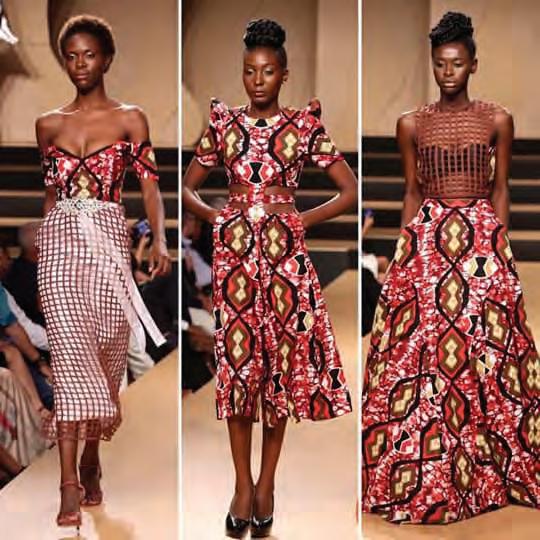
DAWN www.africabusinessassociation.org 150 March-Apri 2023
D
Agriculture - Business - Commentary
Development - Education - Governance
History - Investment - Lifestyle/Culture
- Technology/Science
"Awakening the African Giant Within"
The Africa Business Association (ABA) is pleased to invite you to be an integral part of our publication the DAWN - Awakening the African Giant Within. DAWN is a voice through which public and private entities and people share pertinent information and market business and investment opportunities in Africa and the African Diaspora. Gain access to these trillion dollar markets via ABA DAWN outreach and advertising opportunities.

• Outreach to Africa Business and Investment
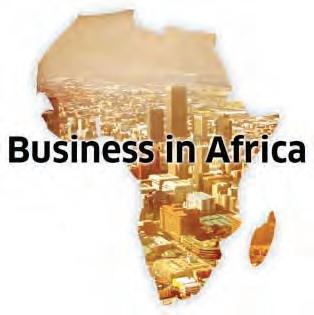
• Outreach to Diaspora Business and Investment
• Advertorial/Feature story advertising
• Profiles
• Bid and Tender opportunities
Our readers are Diaspora Africans, African small business owners, African American Chambers of Commerce members, business owners, corporate buyers, prime contractor’s, importers-exporters, community organization members, elected officials and civic/social leaders in Africa and the United States. Don’t be left out. Advertise in this door opening publication. 1-240-467-6811

Reserve Your Ad Space Today!
+1 (240) 467-6811 or E-mail:
Advertising Opportunities Full Page w/Feature Story US$3,500 Full Page US$3,000 Advertorial or Titled Article US$3,000 Half Page US$1,500 Spot Ad US$ 500 Marketing Massage with website link US$ 185 ********Rates Subject to Change********* 151 March-Apri 2023 DAWN www.africanbusinessassociation.org
Call:
DAWN@AFRICABUSINESSASSOCIATION.ORG
DAWN
Célébrez en Rosé

Celebrate in pink at black-owned picnic-style wine and music fes val. 3 sites. Ages 21+ Only Houston Botanic Garden, Houston, TX
Saturday, April 29, 2023
The Meadows at Piedmont Park, Atlanta , GA
Sunday, May 7, 2023
Merriweather Park at Symphony Woods, Columbia, MD
Sunday, May 28, 2023
Informa on and Tickets Here
Roadmap To Billions|NYC 2023

Brooklyn Navy Yard
Brooklyn, NY USA
May 18 – 20, 2023
Panels, Pitch Conpe on, Networking
Informa on and Tickets Here

Afro Na on Portugal 2023
June 28-30, 2023
Por mao, the Algarve, Portugal
Informa on/Tickets Here
BlerDCon - Fae'd to Black

Hya Regency Crystal City
Arlington, VA USA
July 7 – 9, 2023
Highlightsand celebrate Blerd culture, explore a marketplace of ideas and sharing culture h ps://blerdcon.com/
Events 152 March-Apri 2023 DAWN www.africanbusinessassociation.org
Events









 Vice President Kamala Harris Visits Africa, March 2023
Vice President Kamala Harris Visits Africa, March 2023














 From Carl West,
From Carl West,


































 By Stacy Jackson
By Stacy Jackson










 By Tommy Mello
By Tommy Mello













































 By Panuka Farm April 2, 2023
By Panuka Farm April 2, 2023









 By Christina Larson and Patrick Whittle
By Christina Larson and Patrick Whittle














 By Cooper Inveen
By Cooper Inveen












 By Sughnen Yongo
By Sughnen Yongo

 By Associated Press
By Associated Press

















 By Aysha Diallo January 27, 2022
By Aysha Diallo January 27, 2022

 By Eileen AJ Connelly
By Eileen AJ Connelly












































 By Trevor Mogg
By Trevor Mogg












 From BLACK ENTERPRISE Editors
From BLACK ENTERPRISE Editors


 By Sharelle Burt
By Sharelle Burt



























































